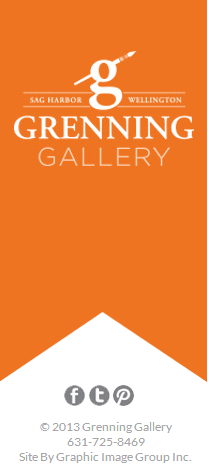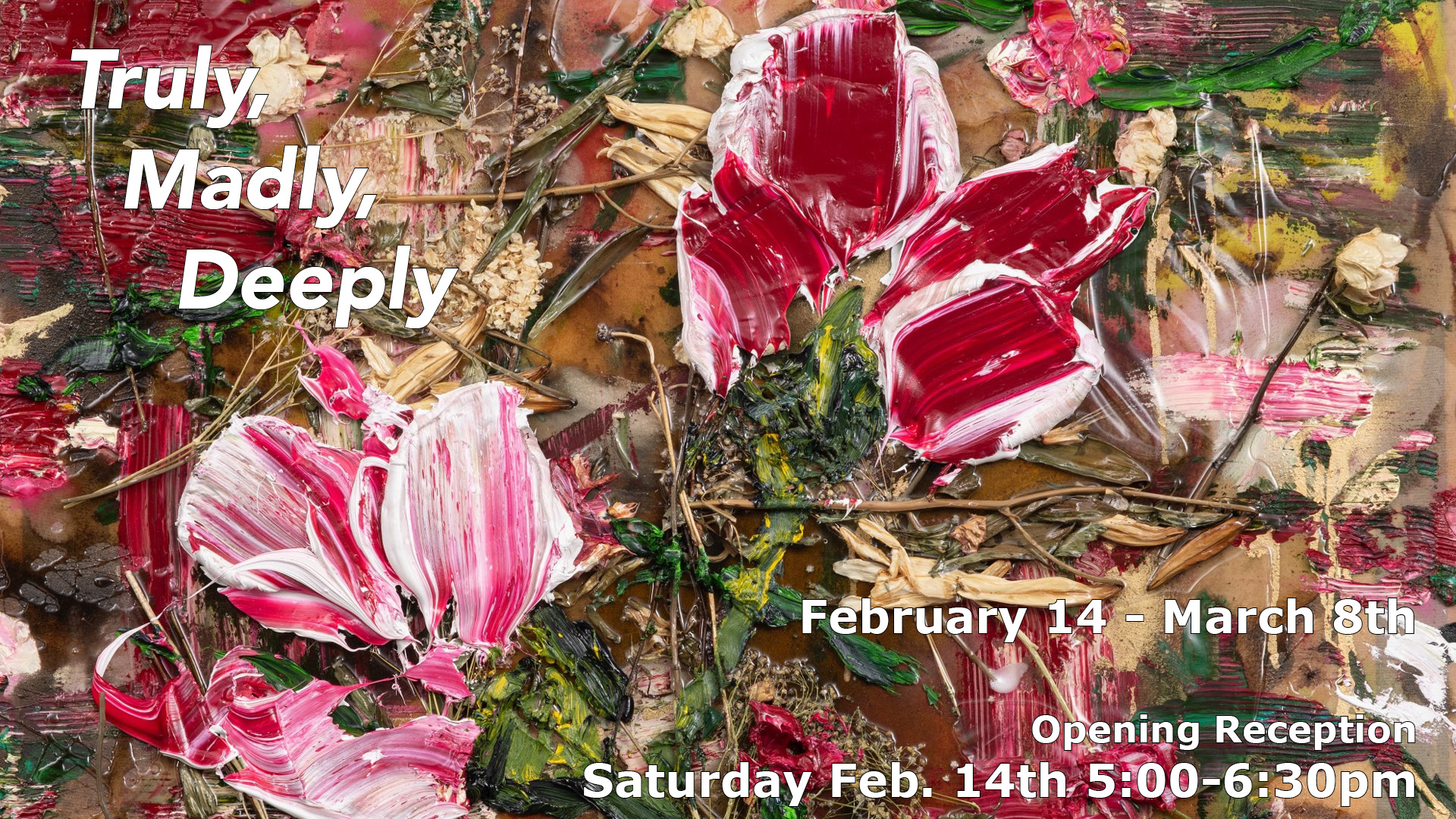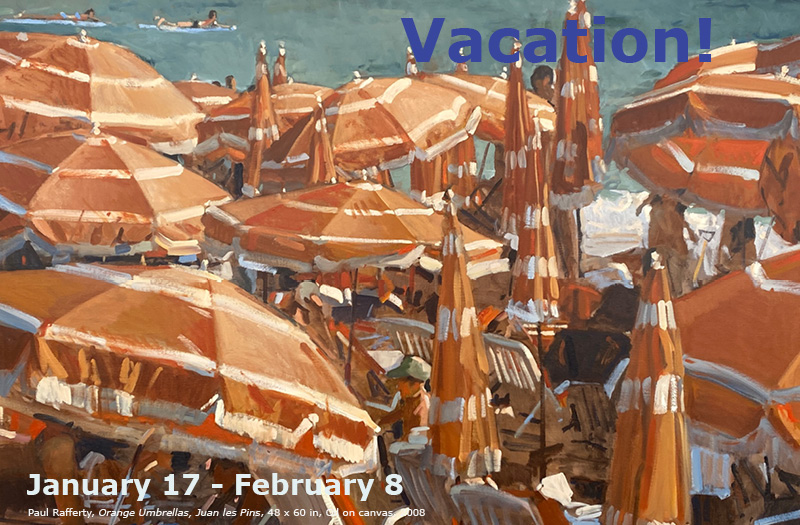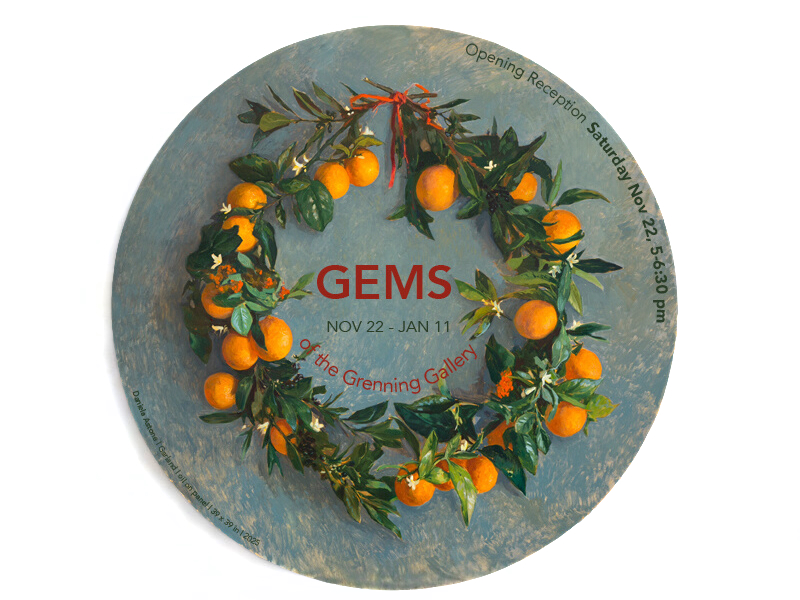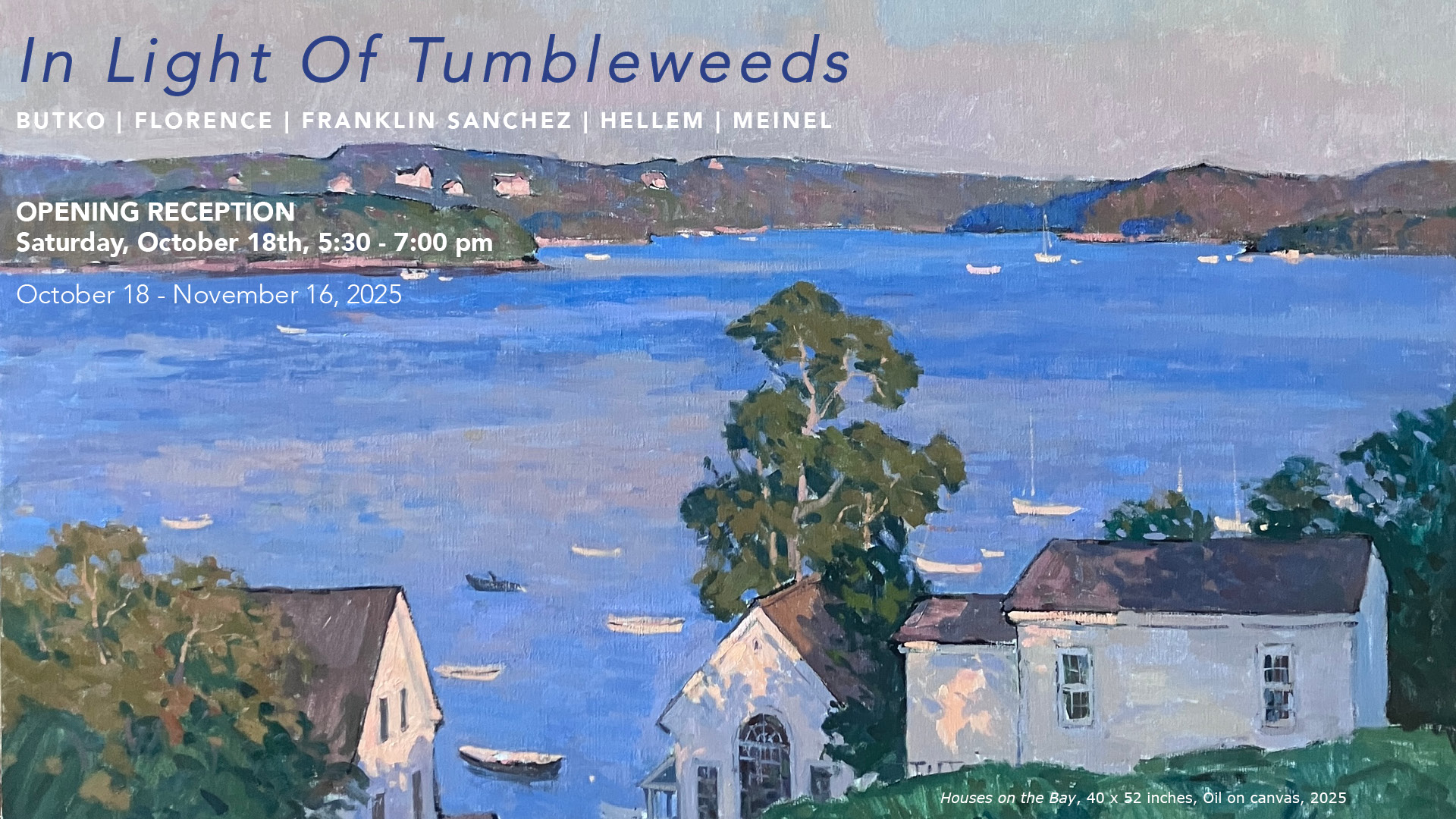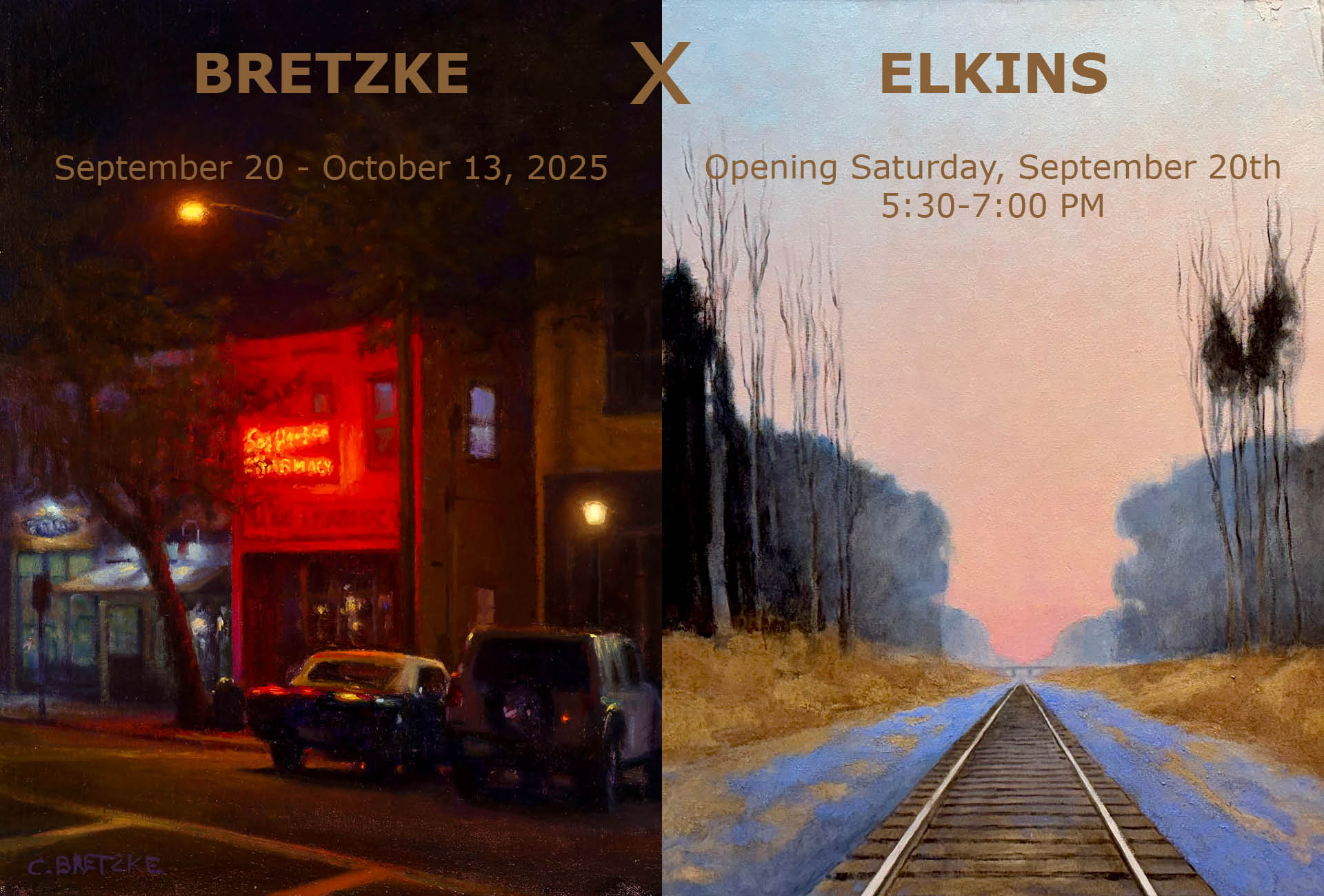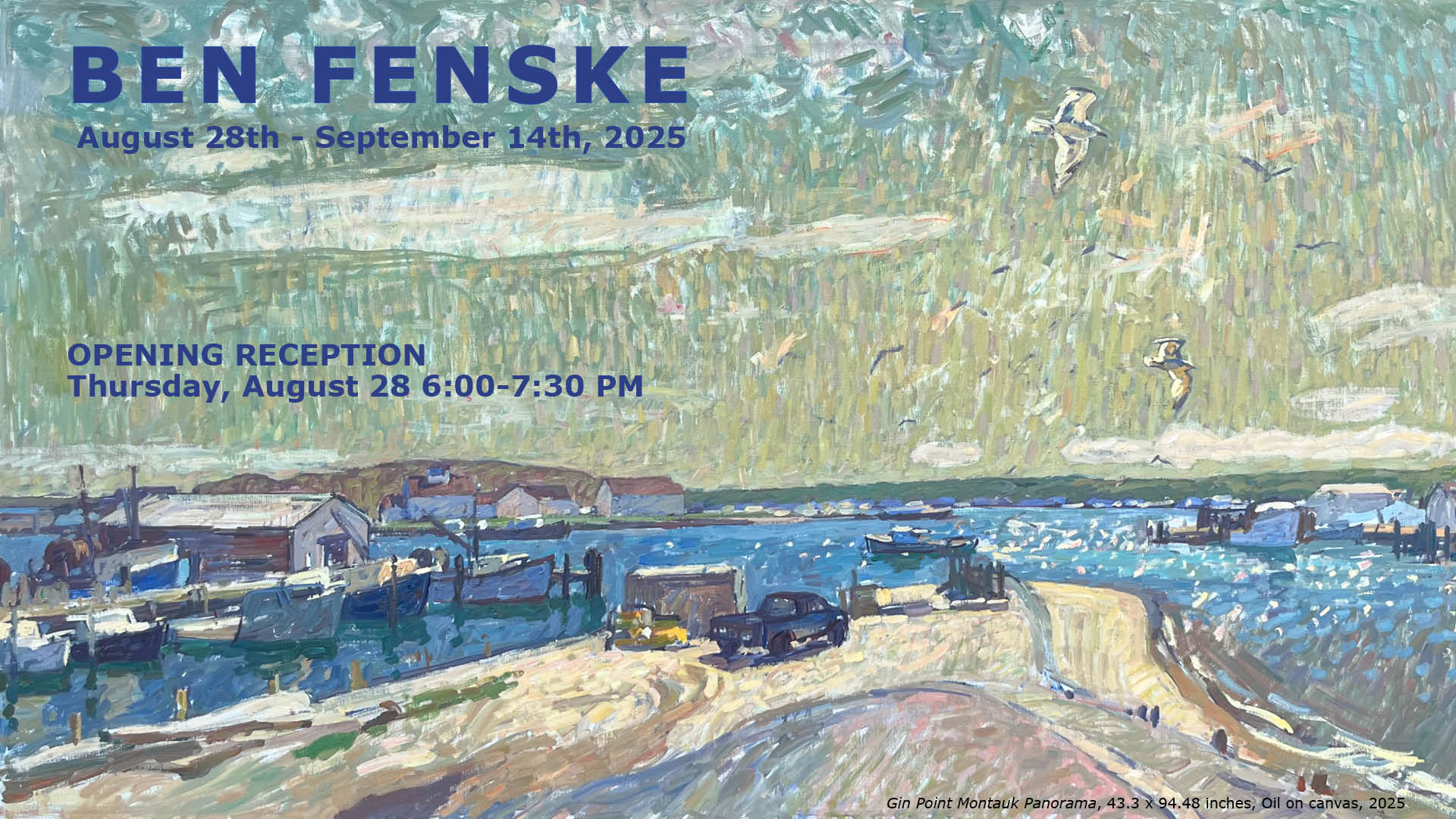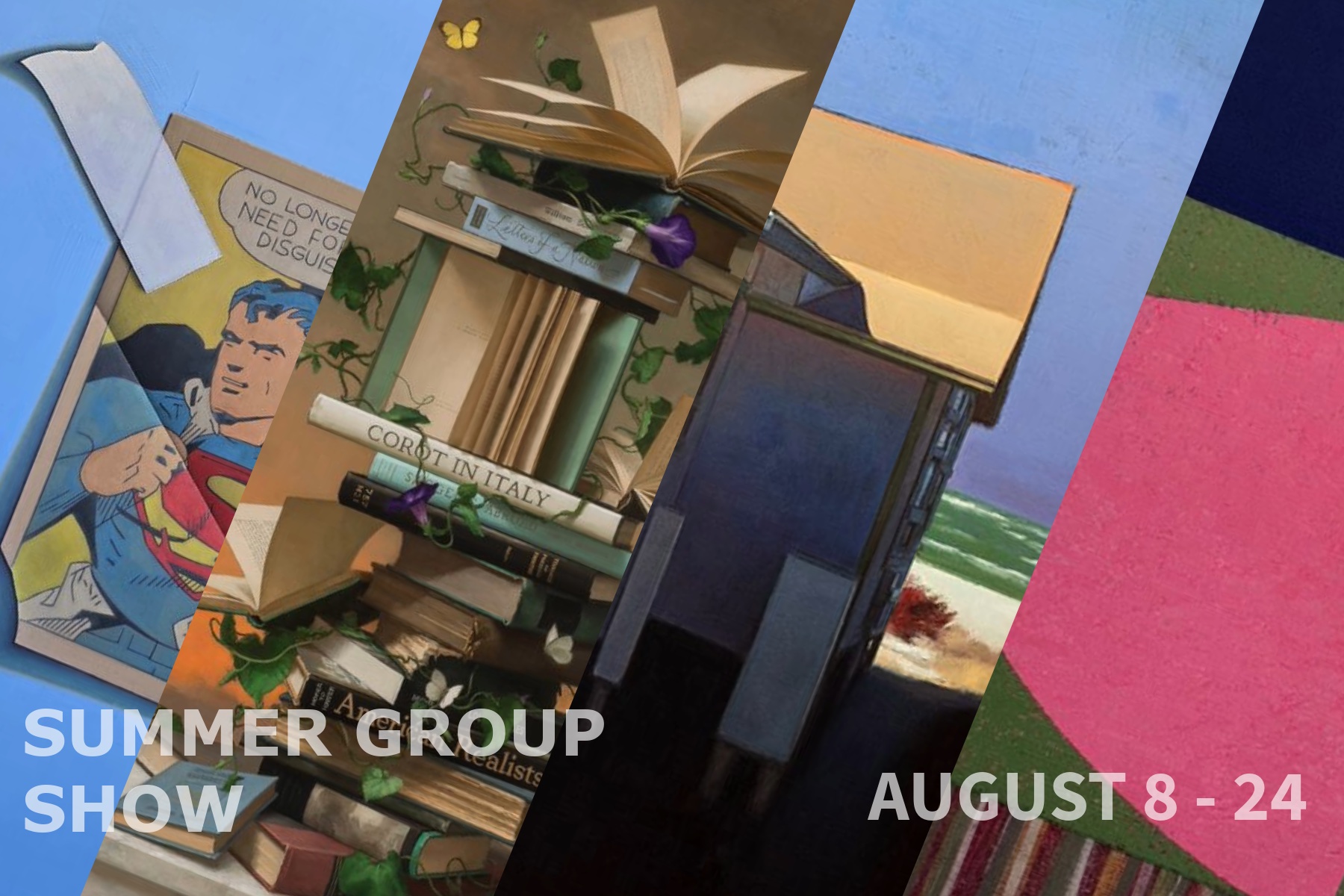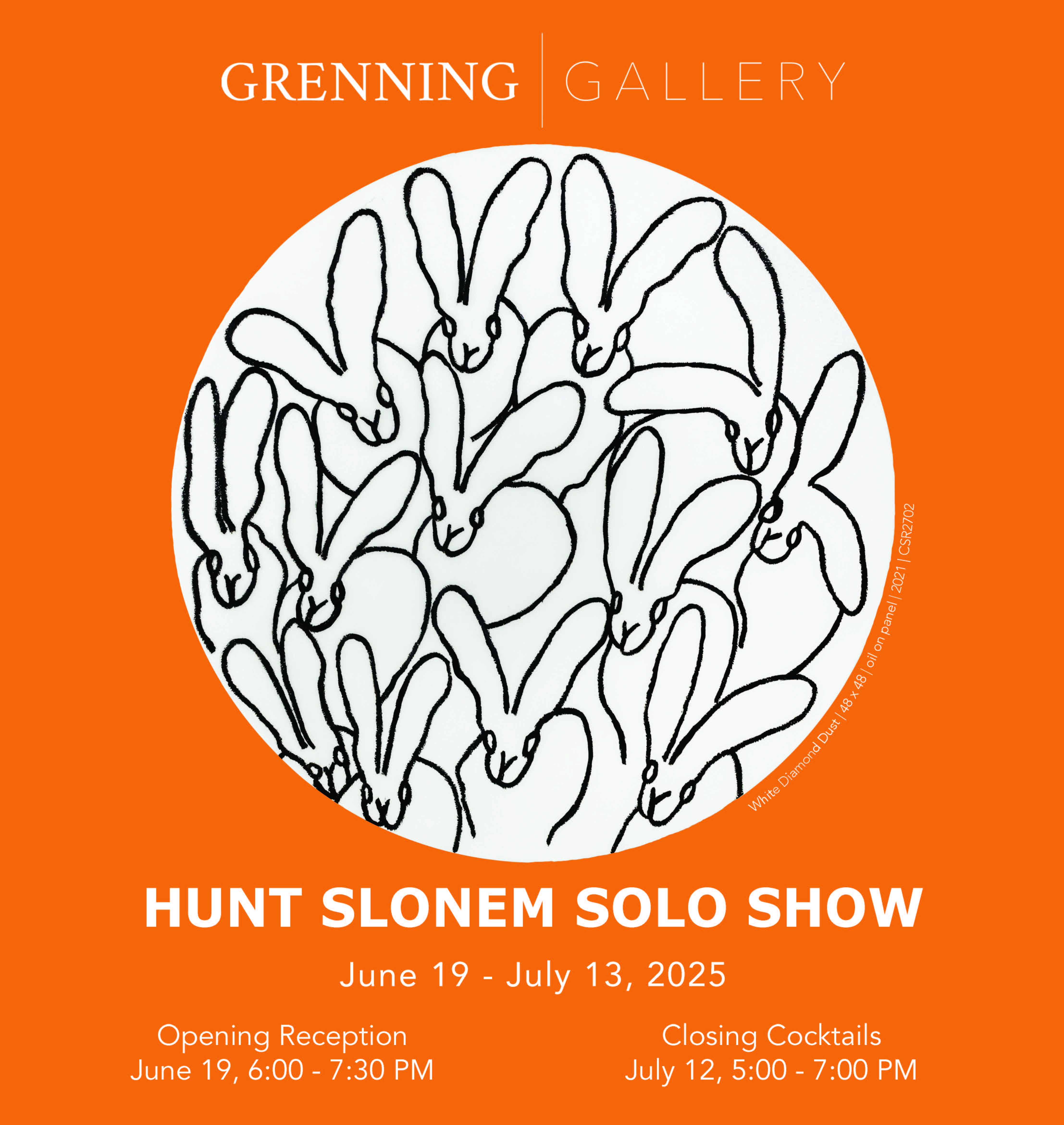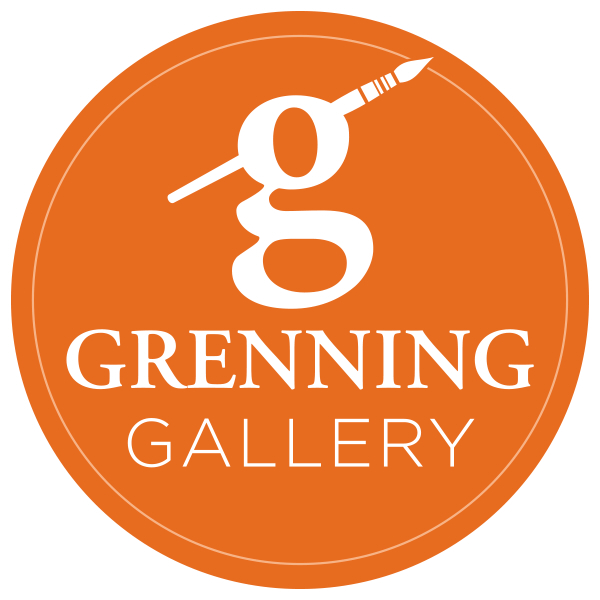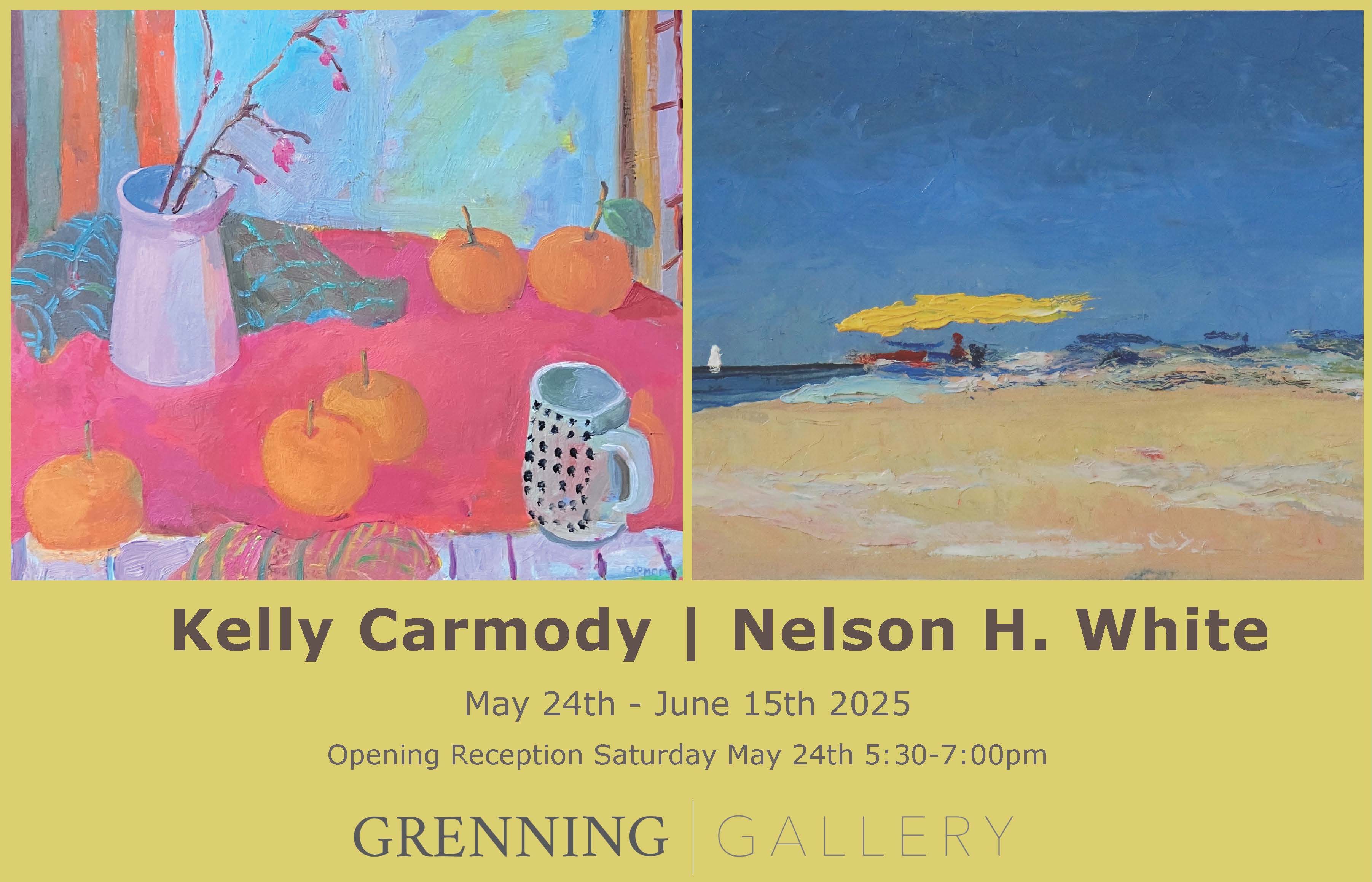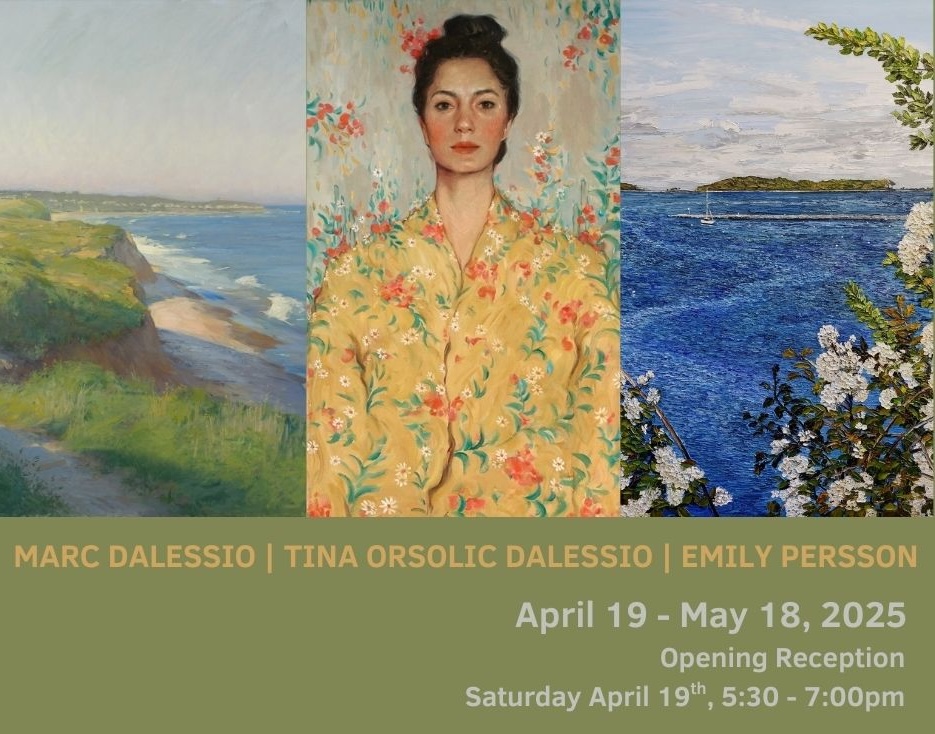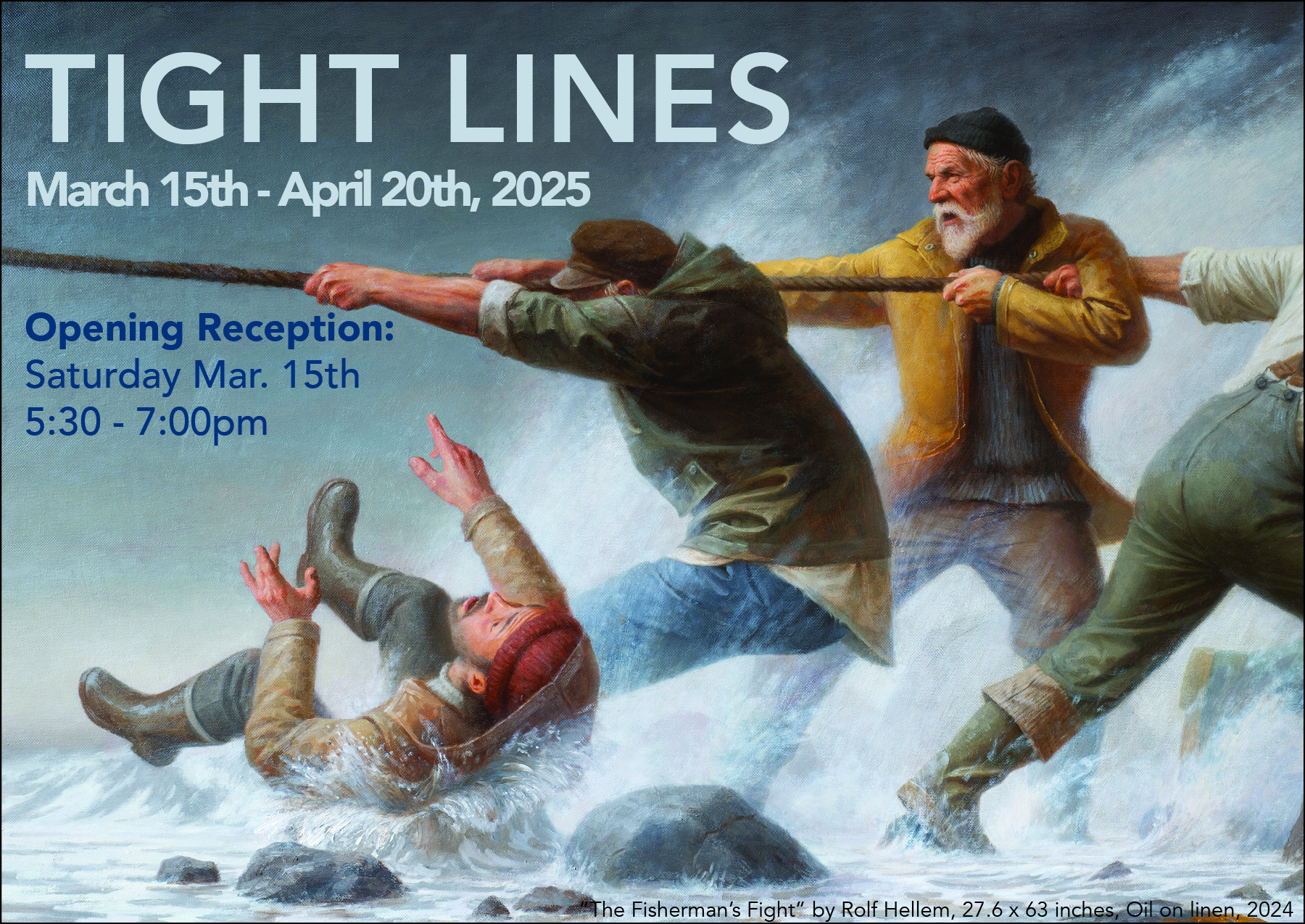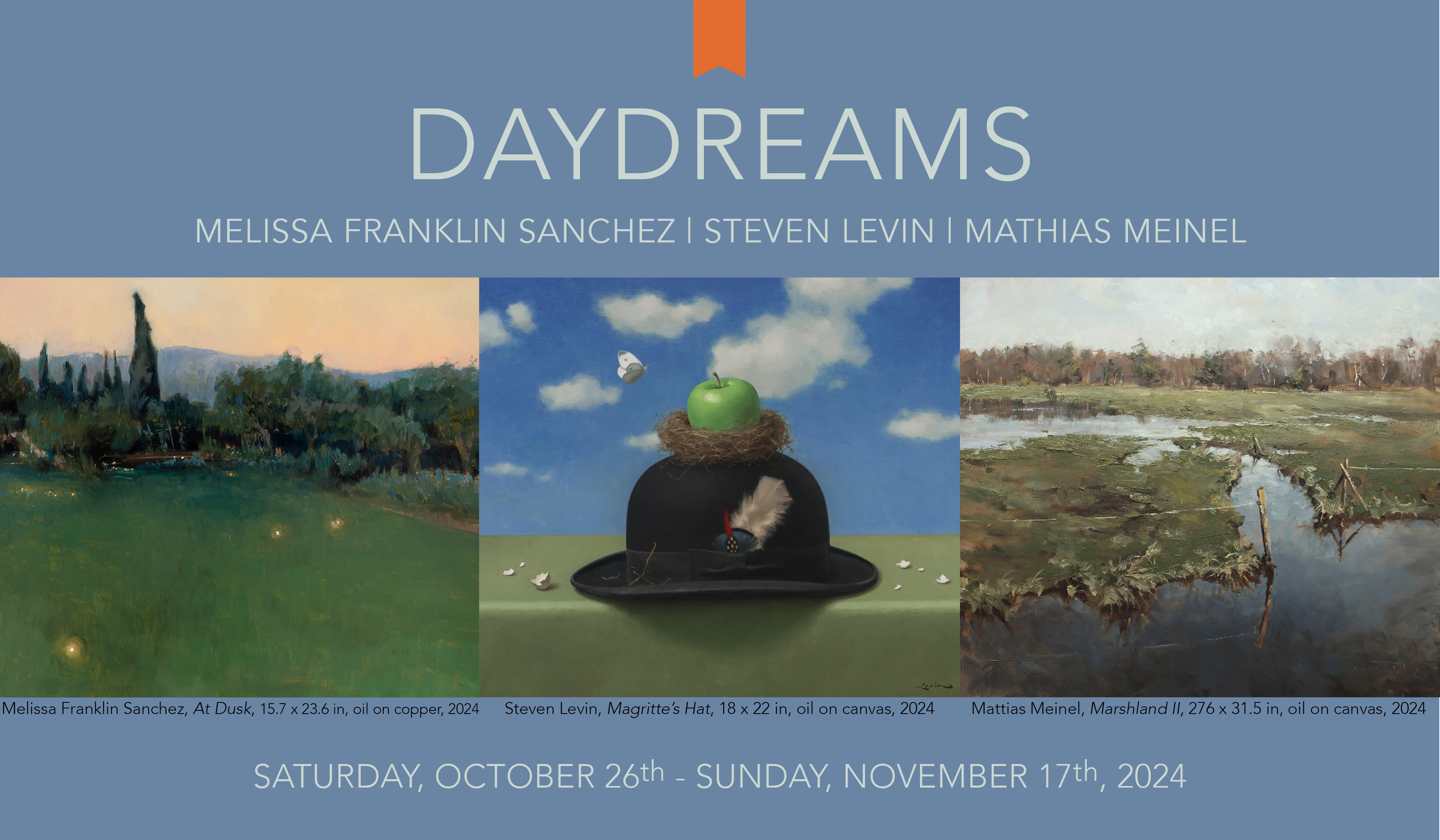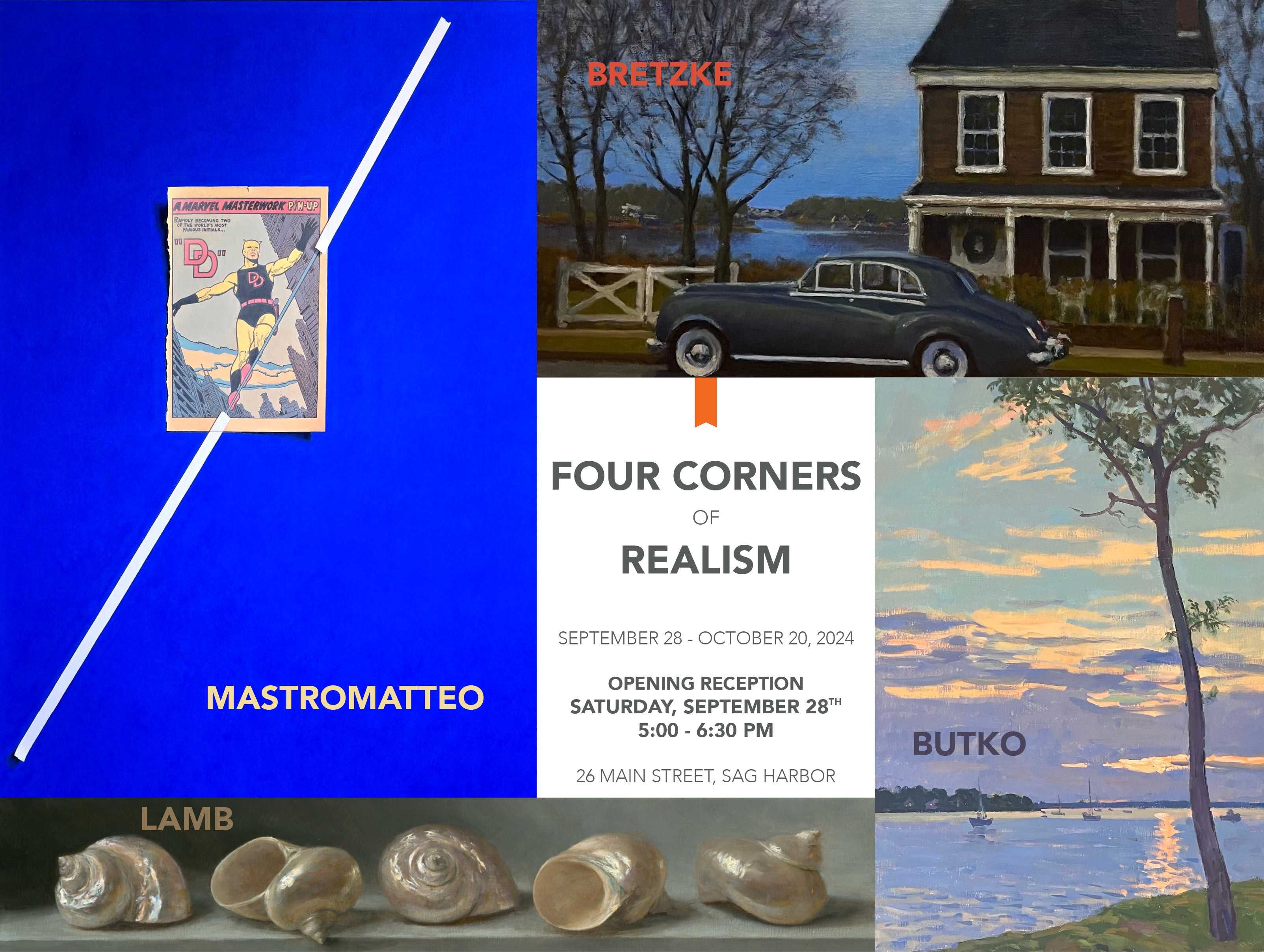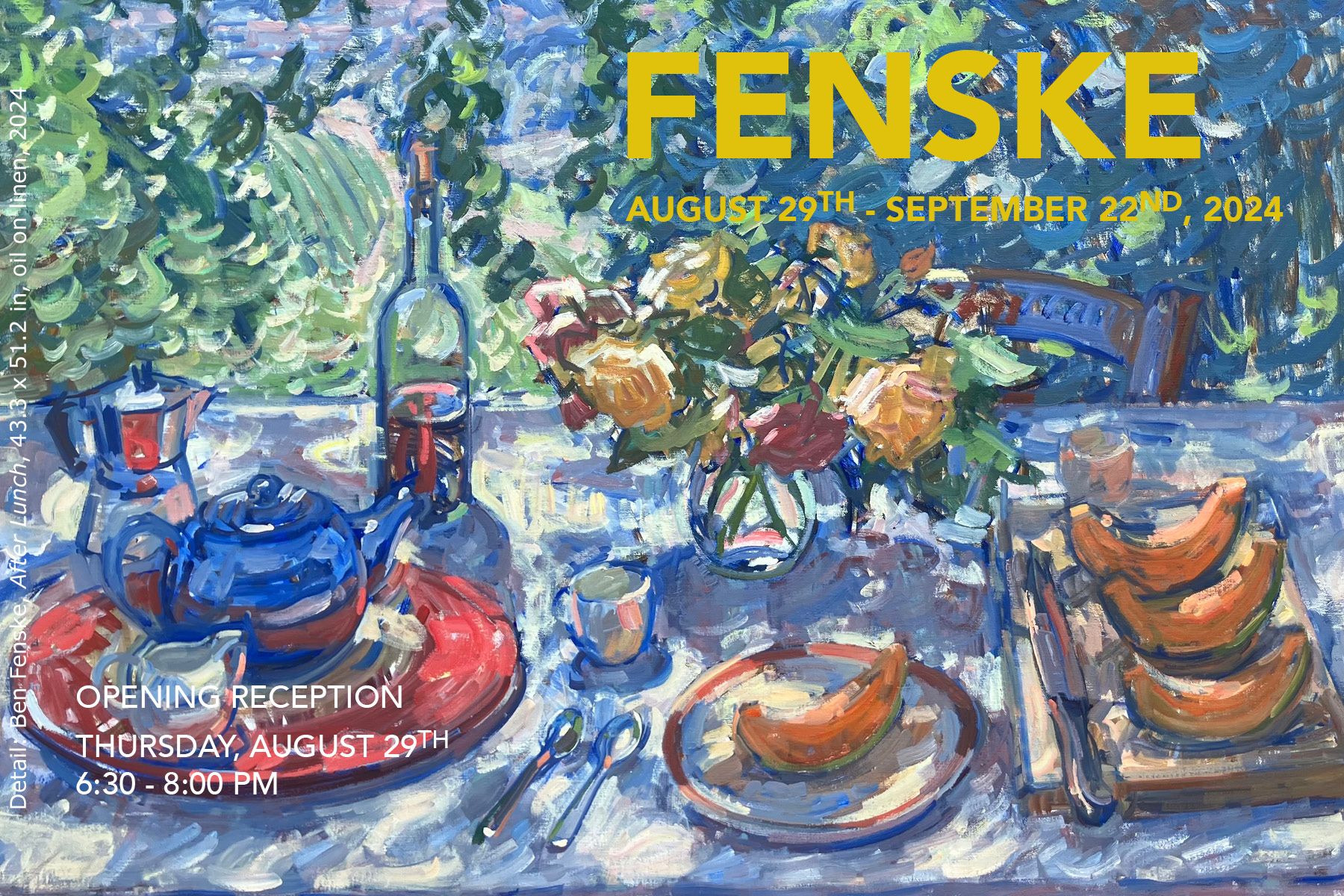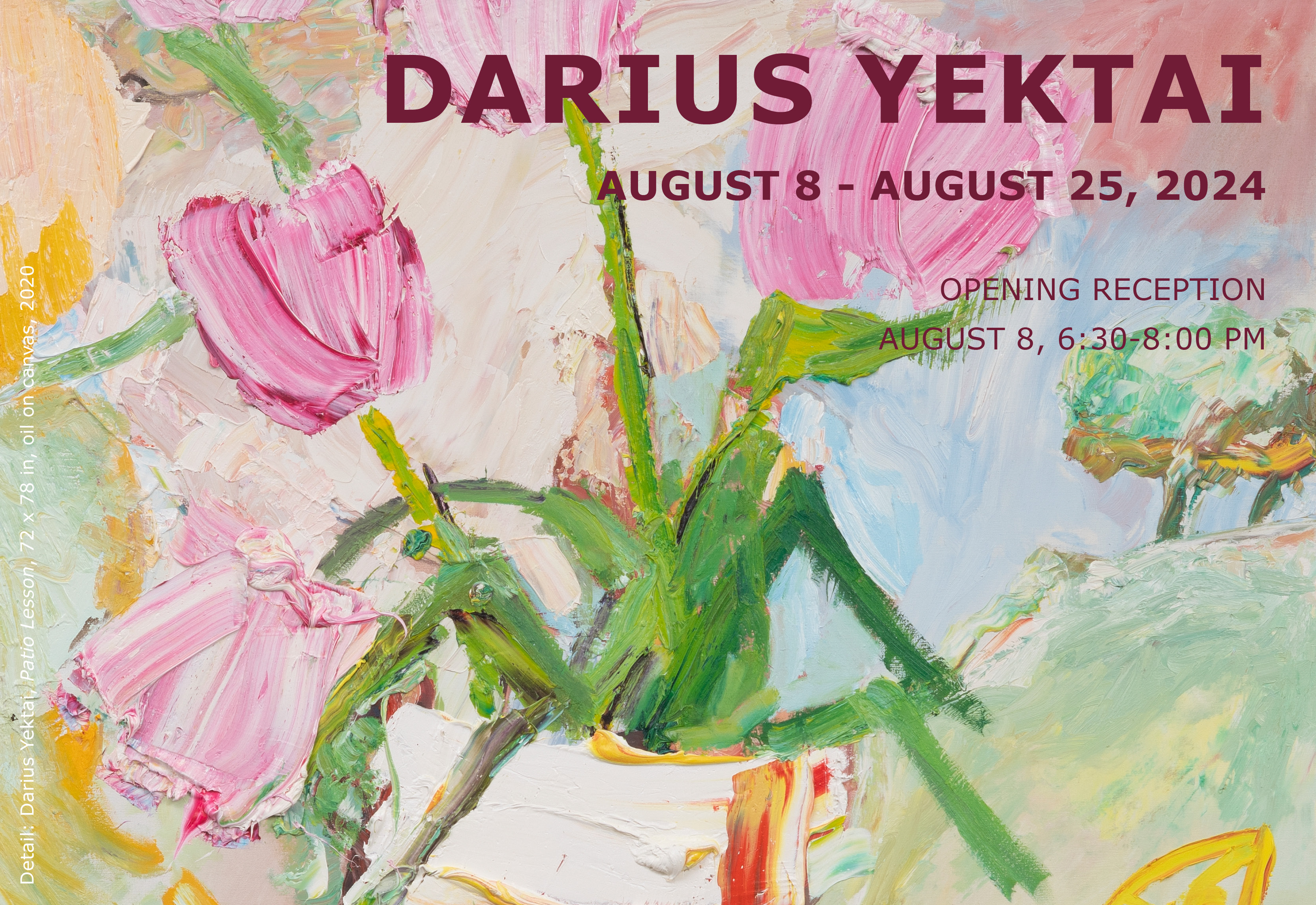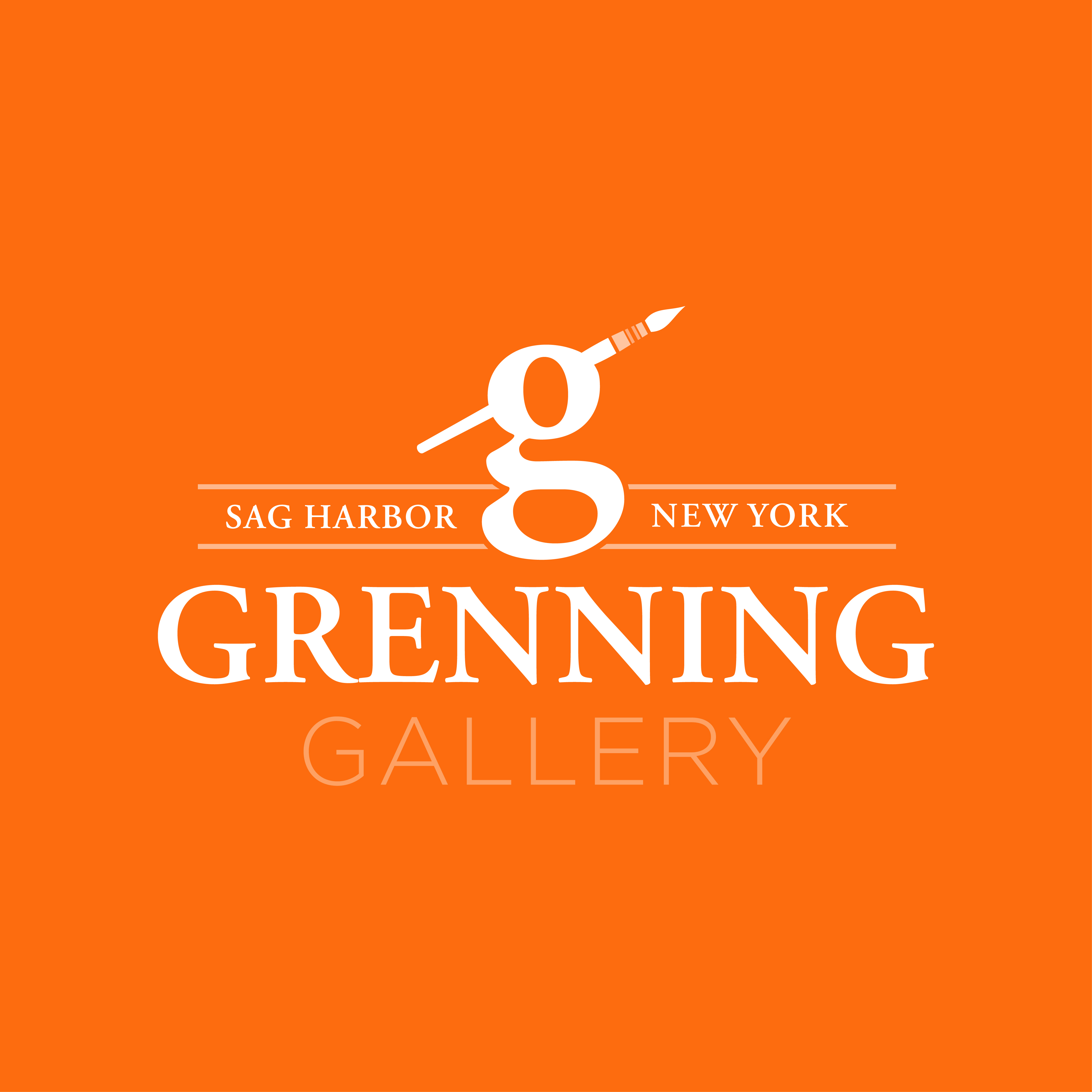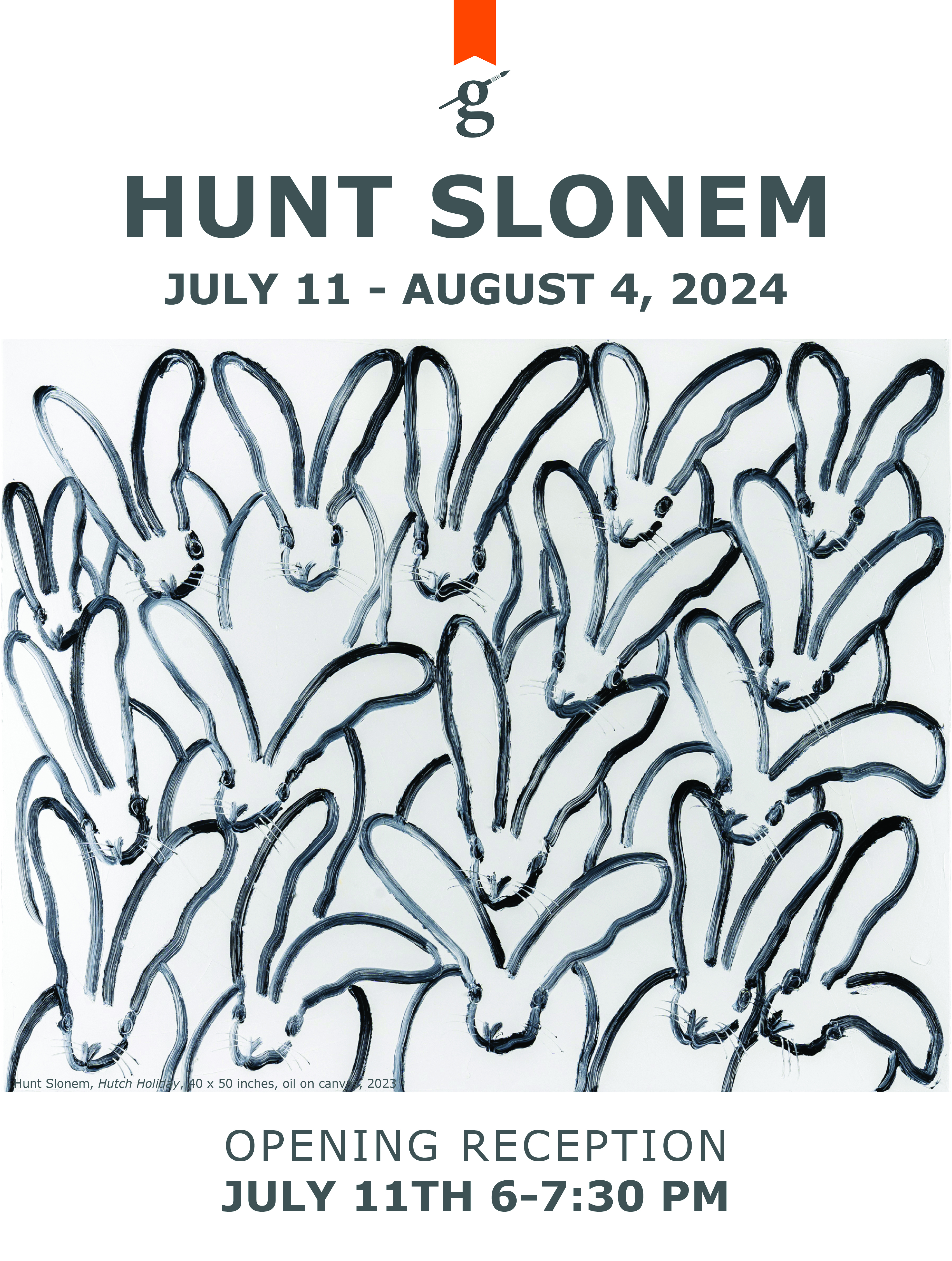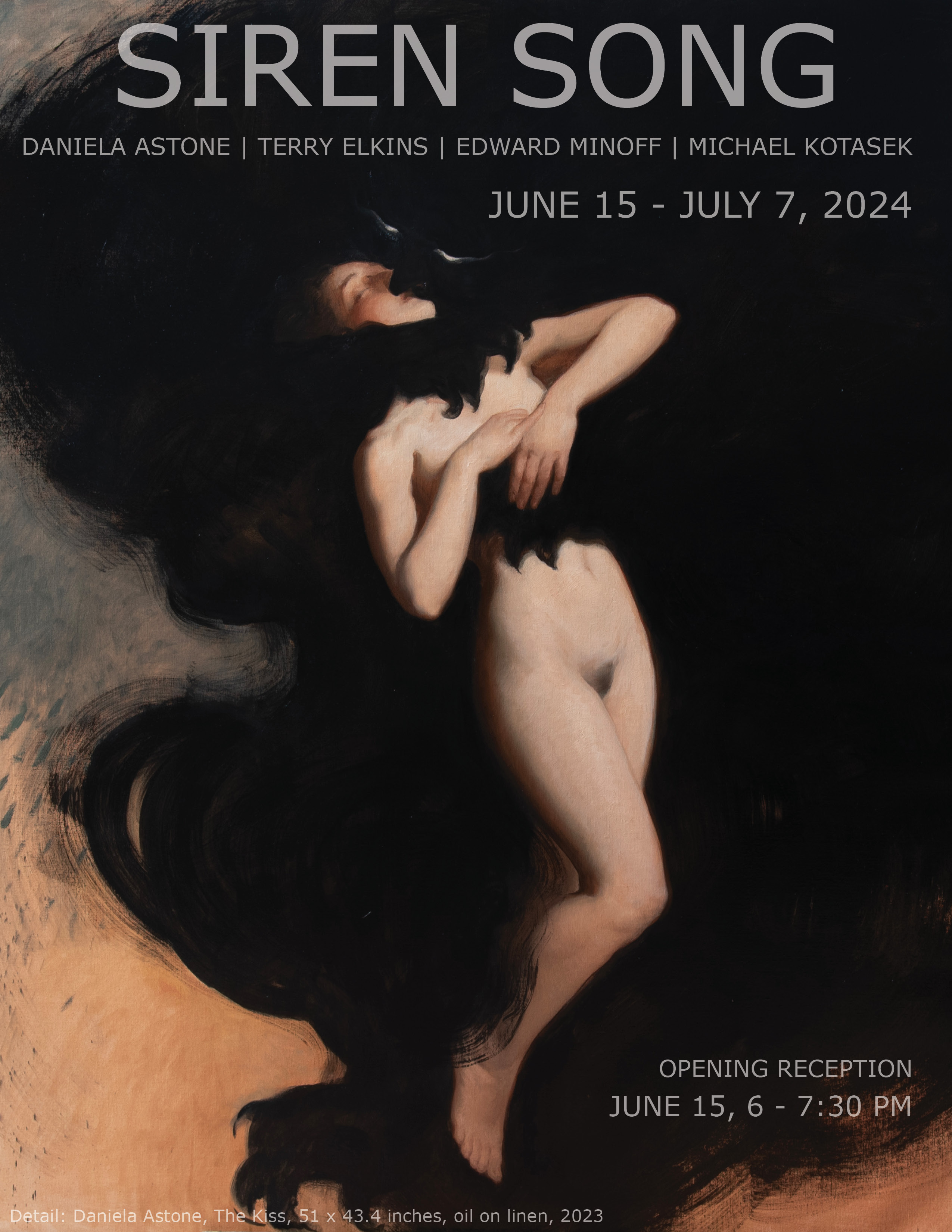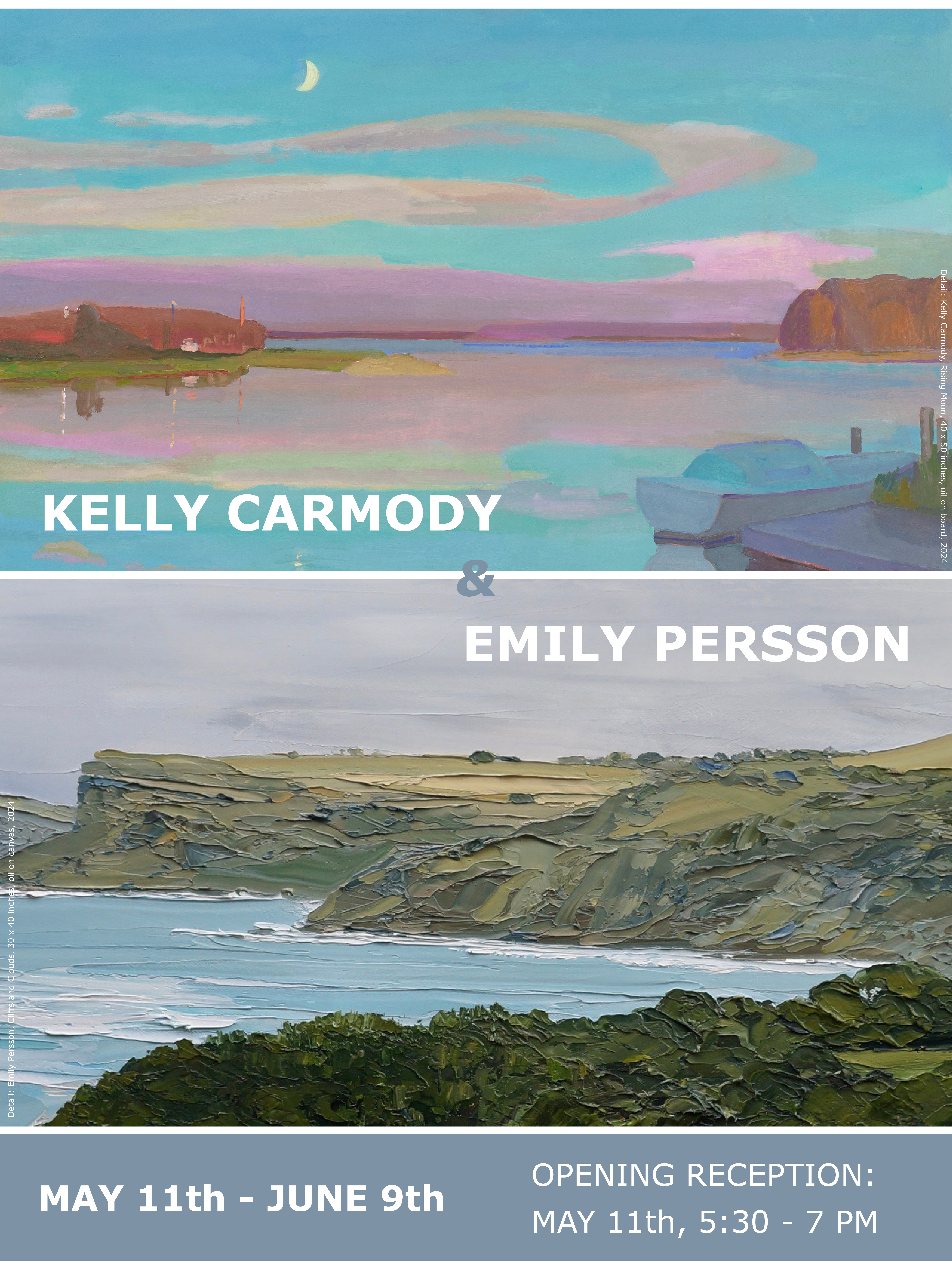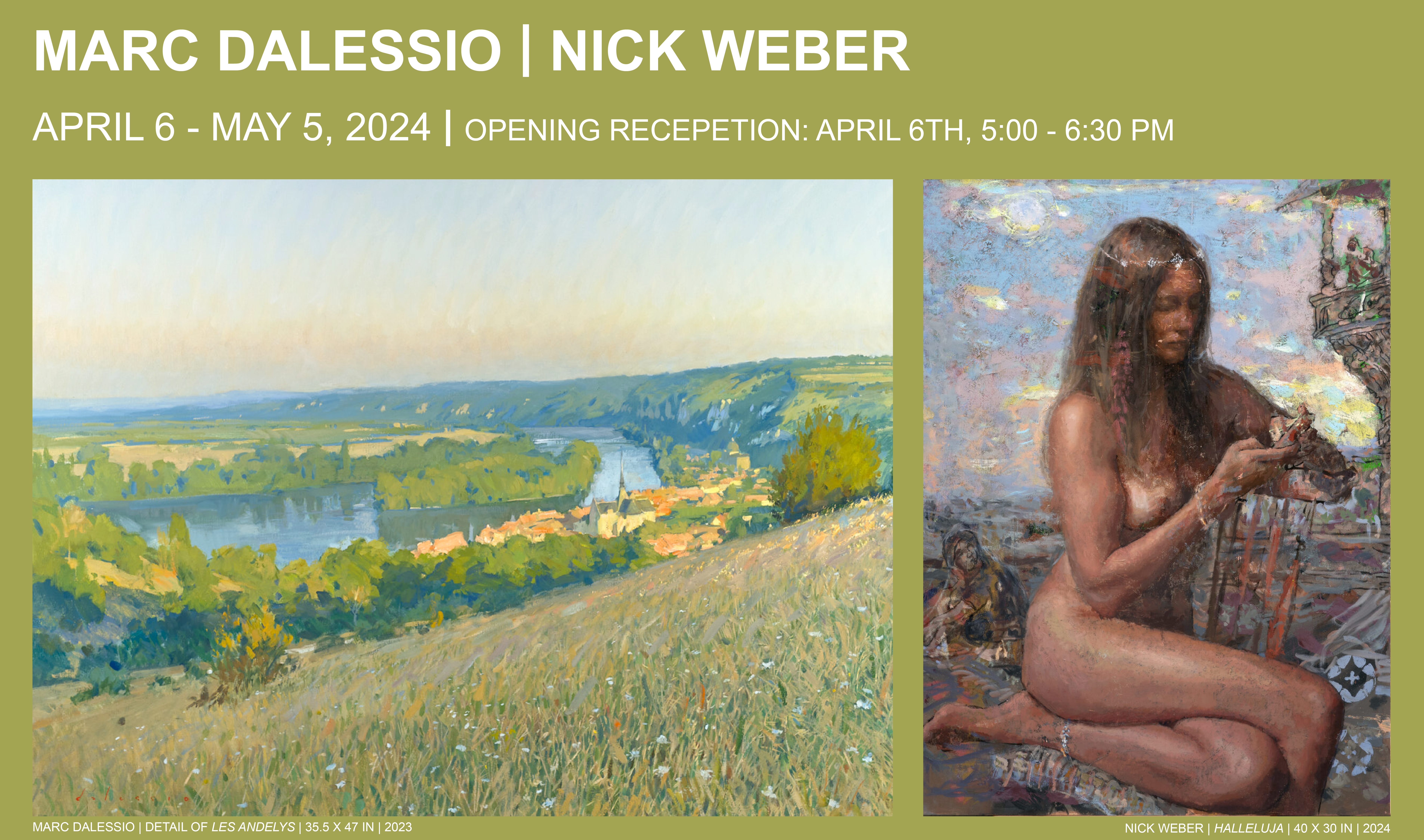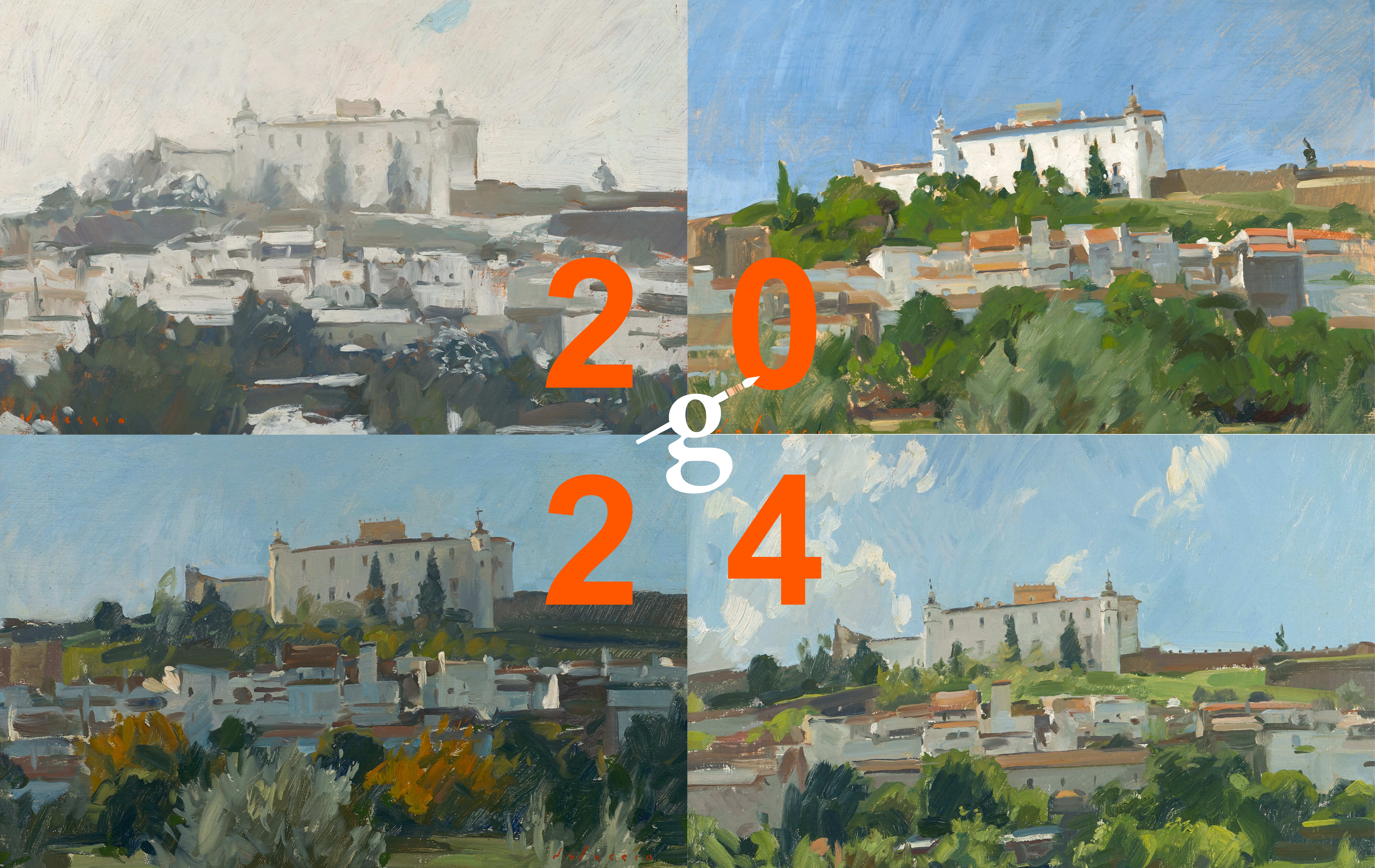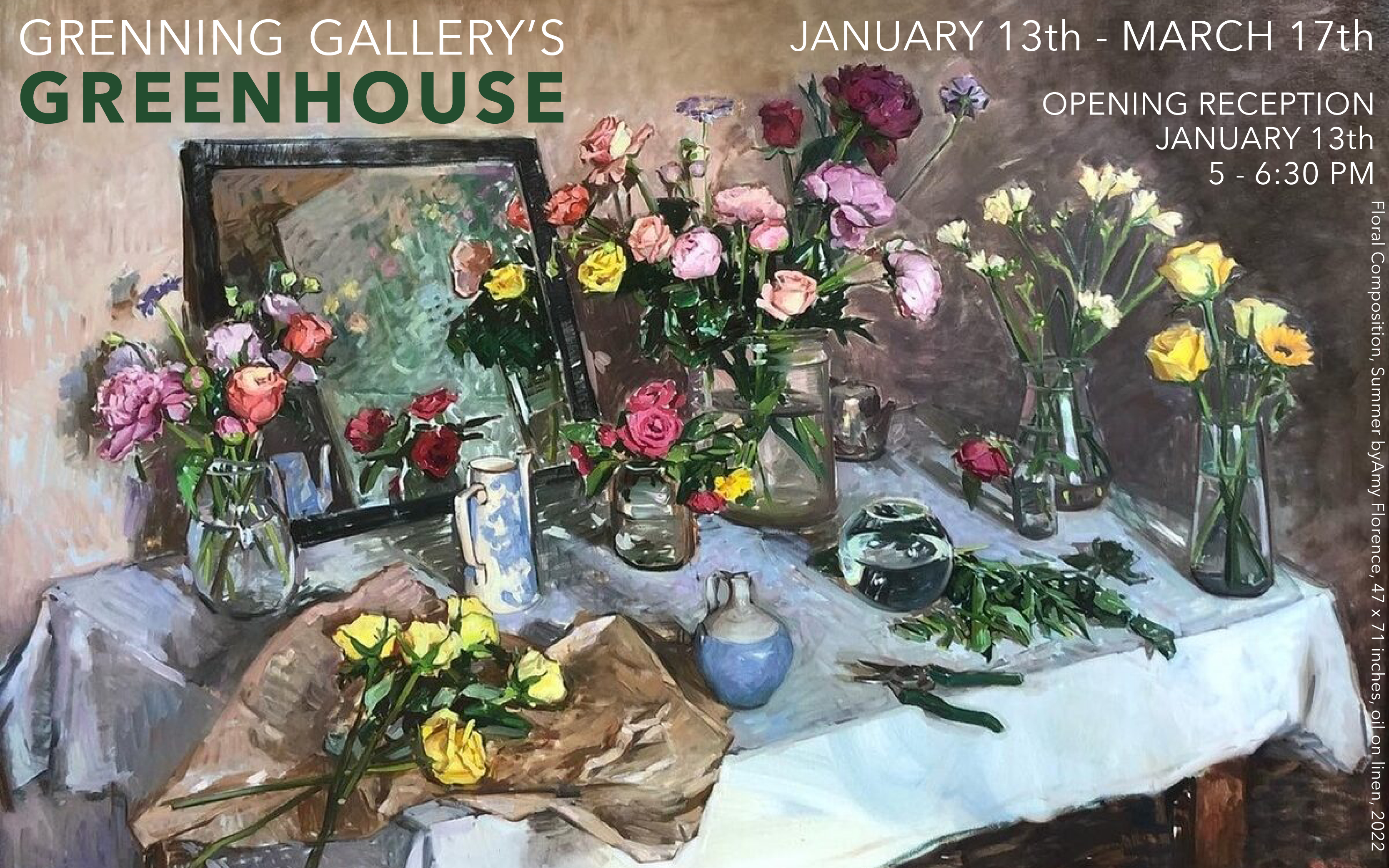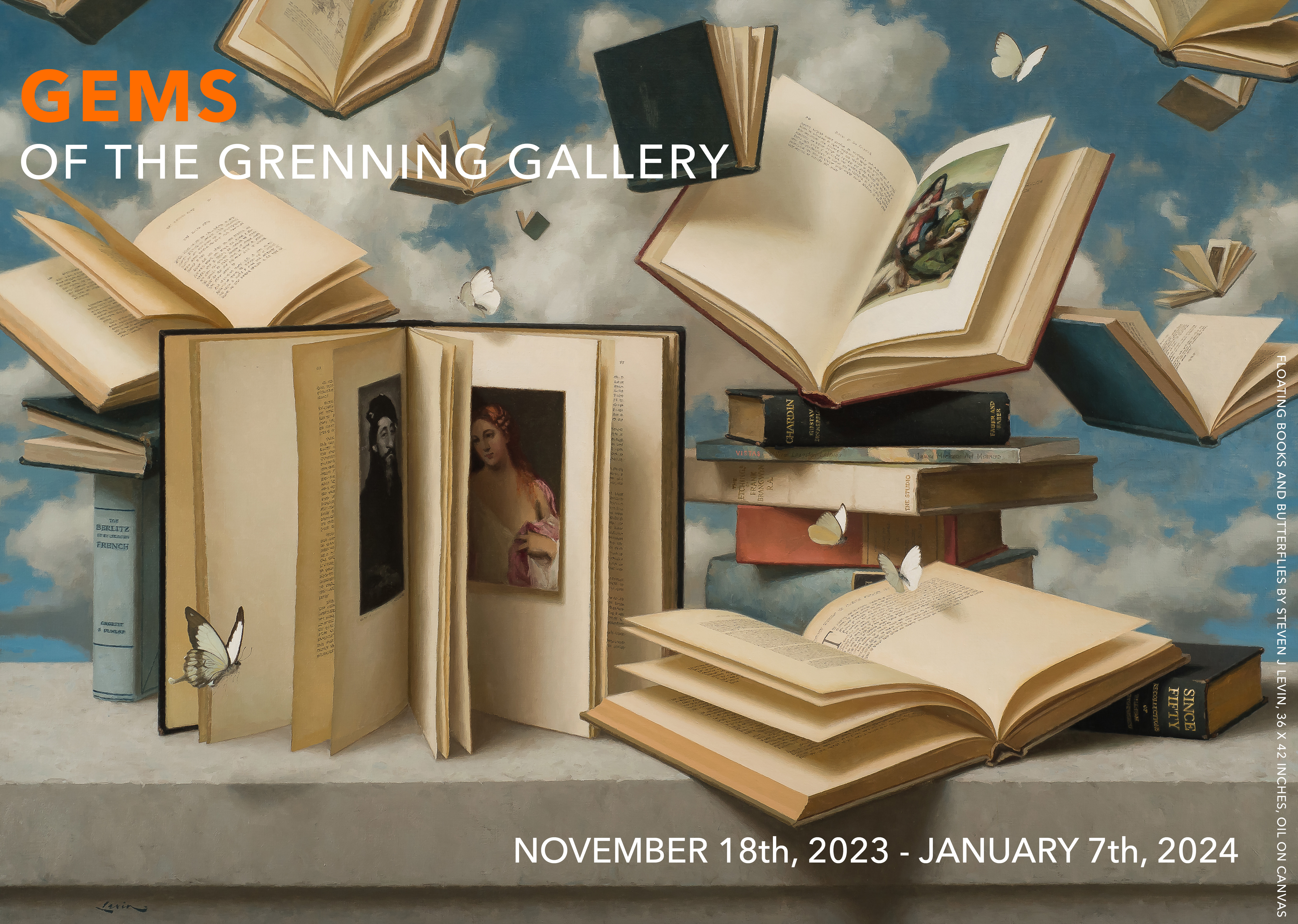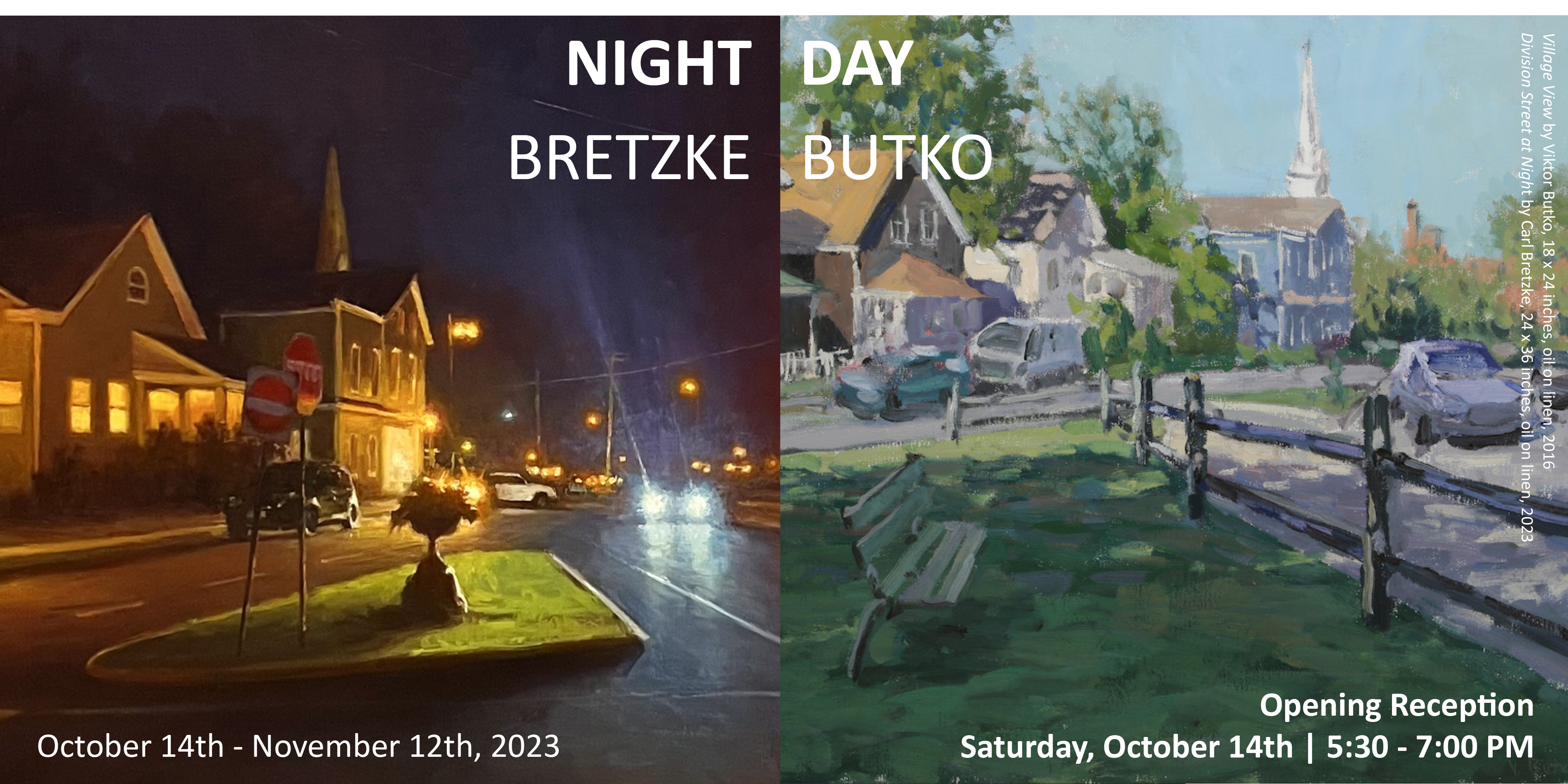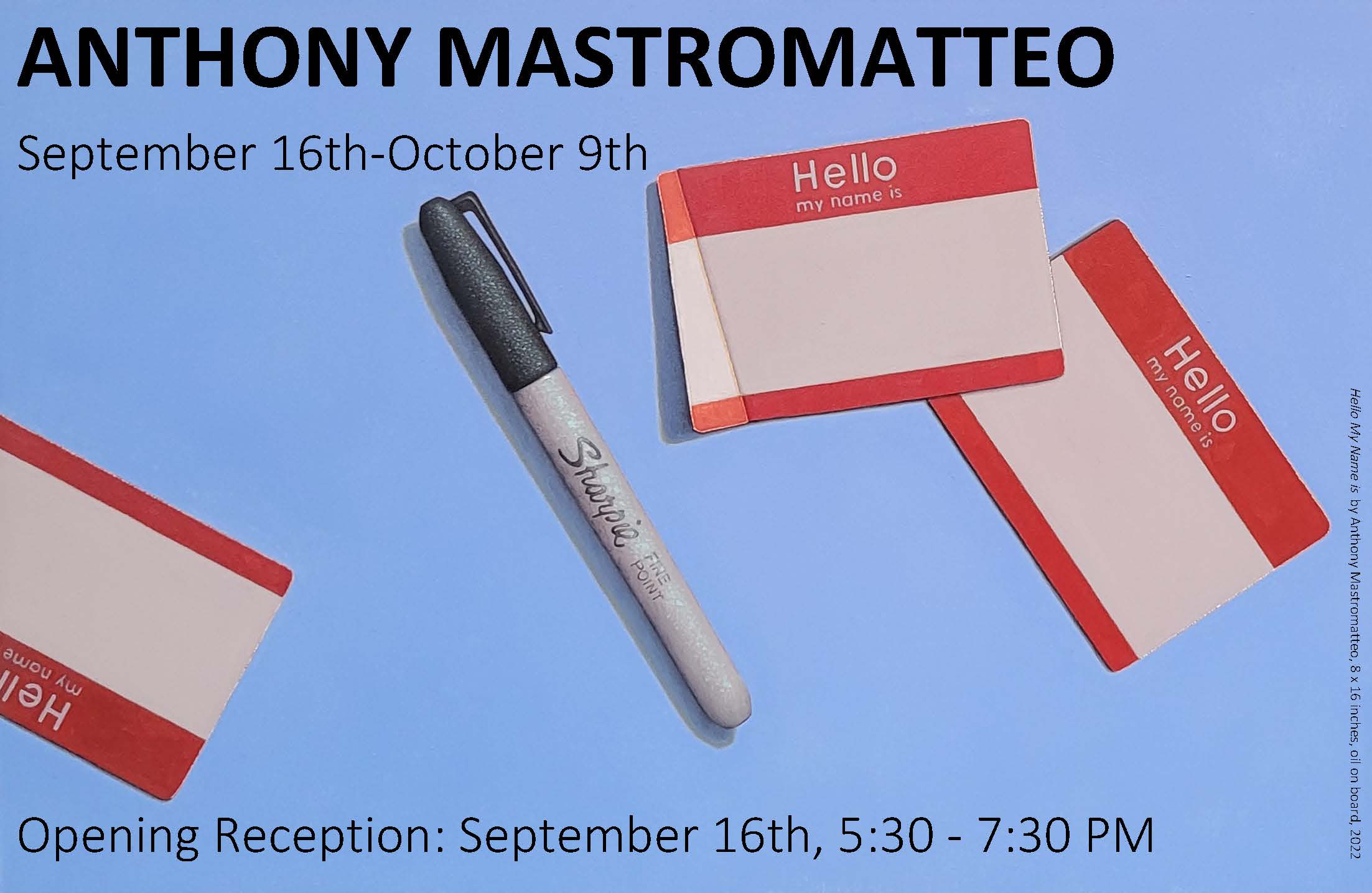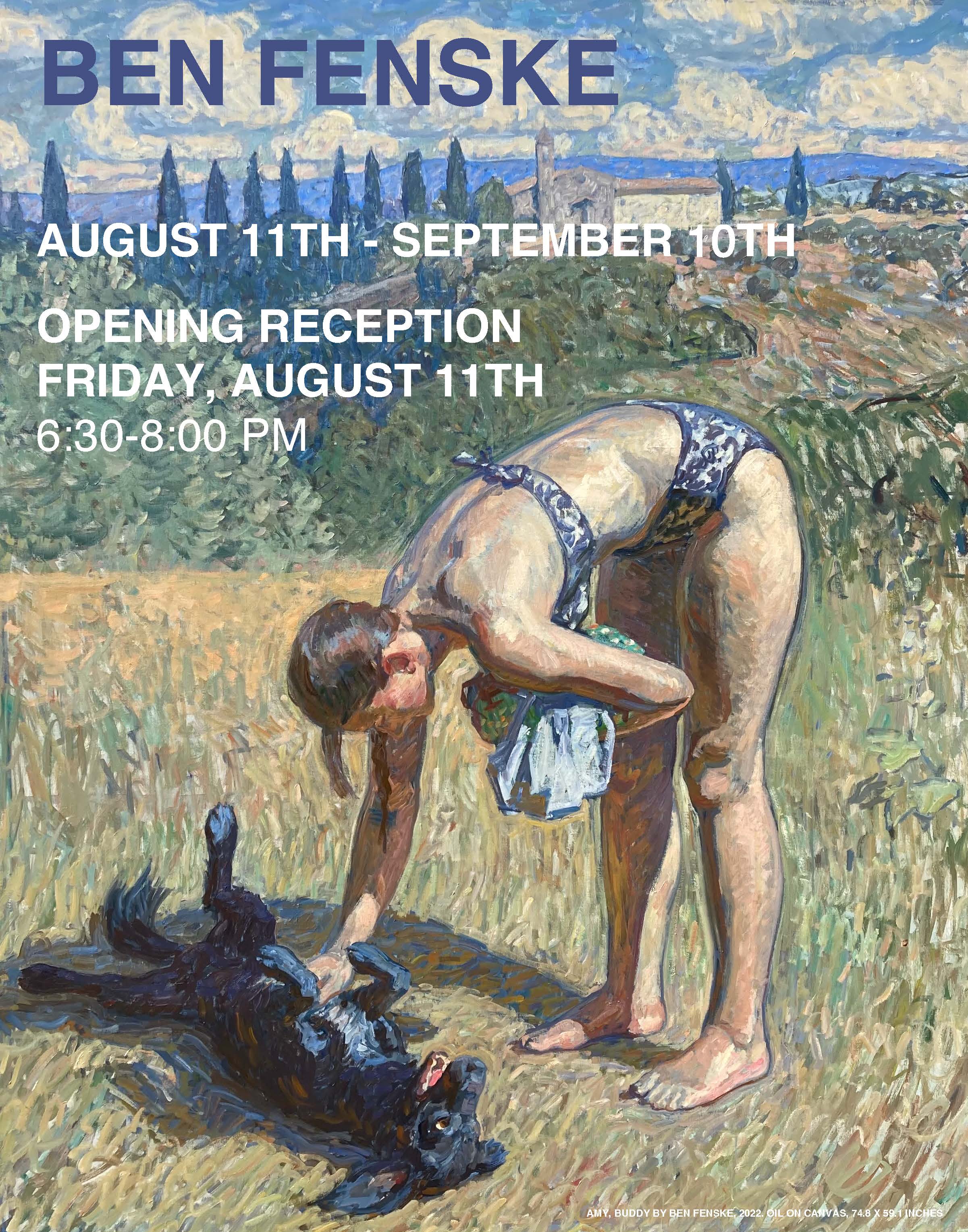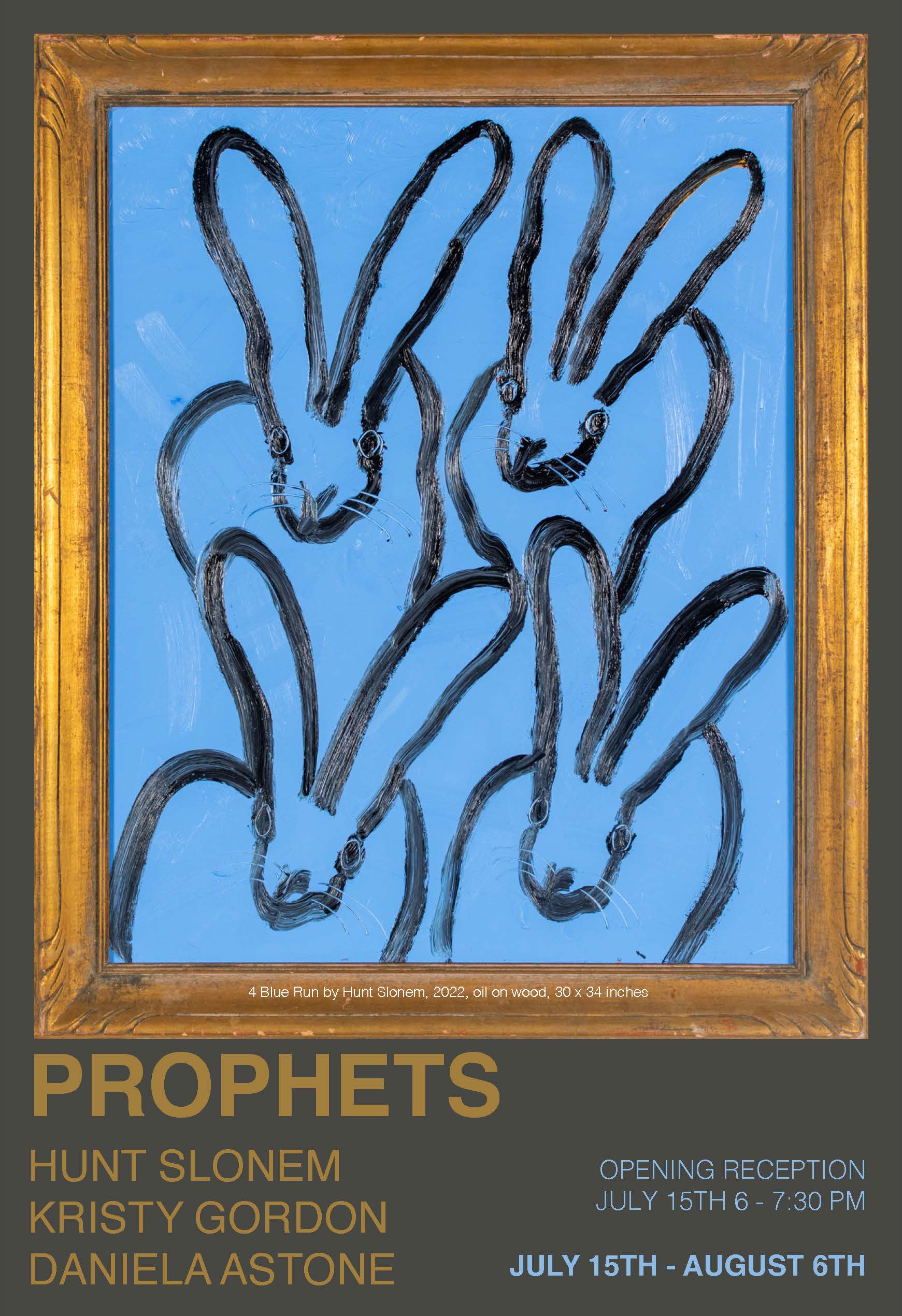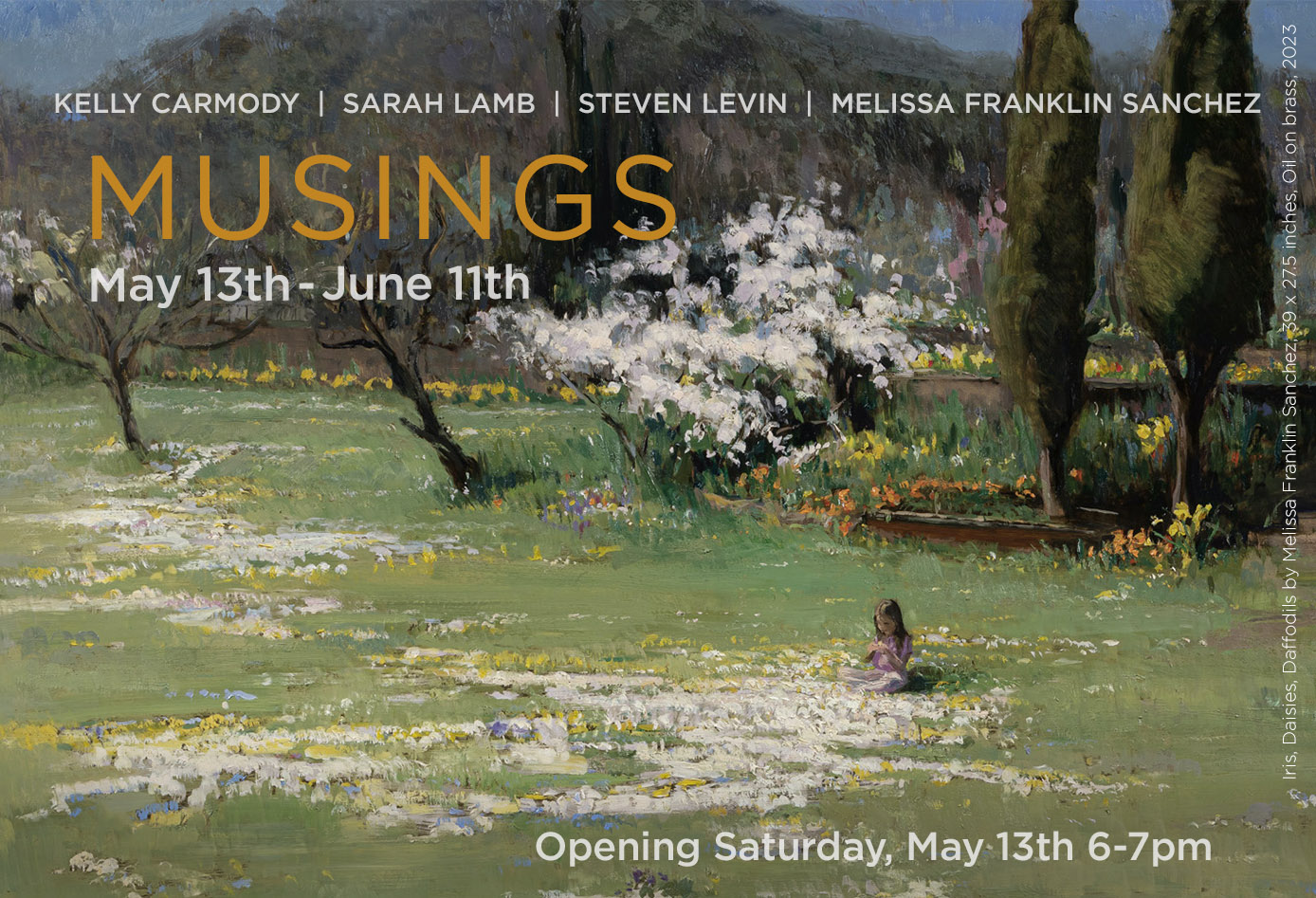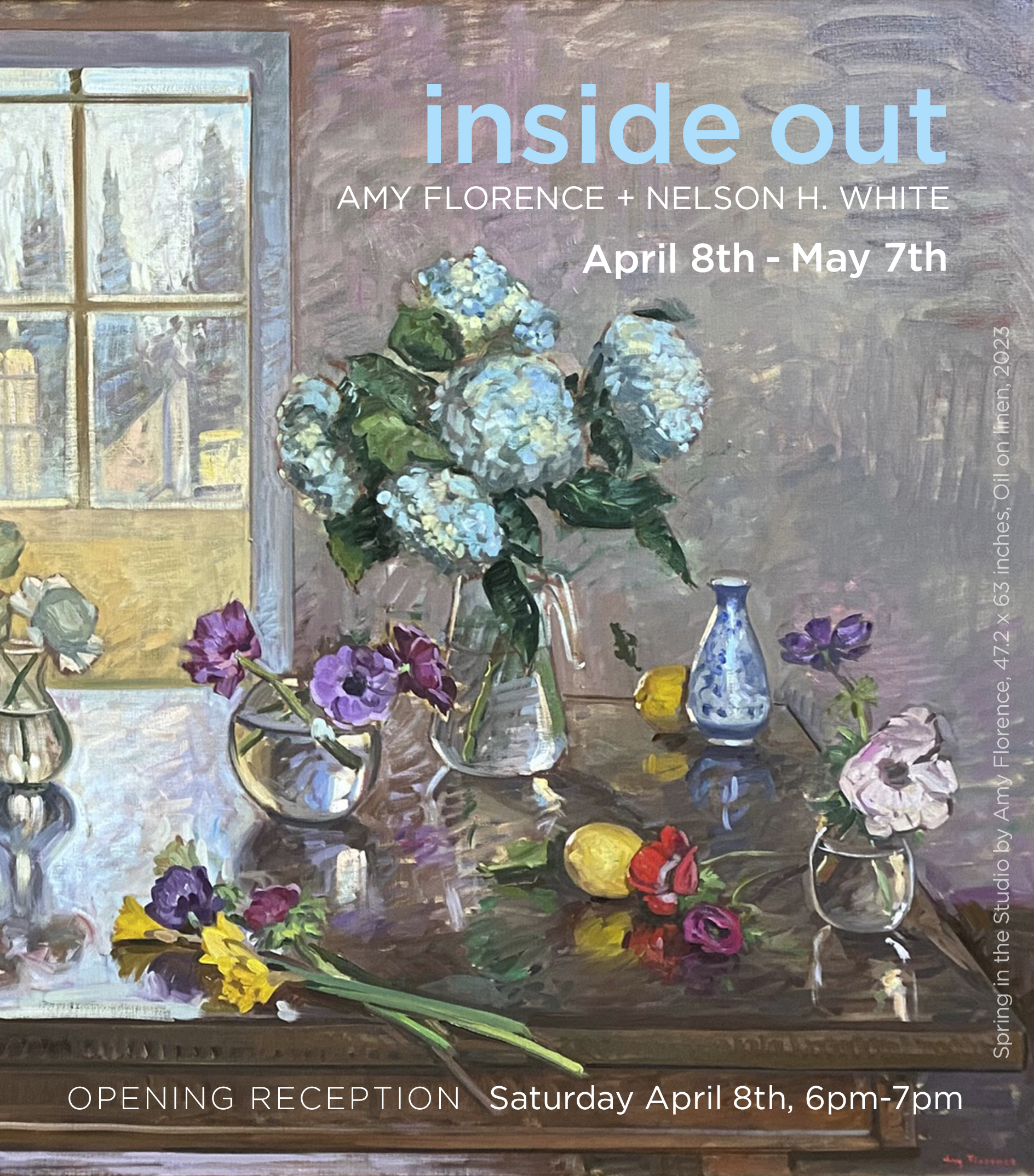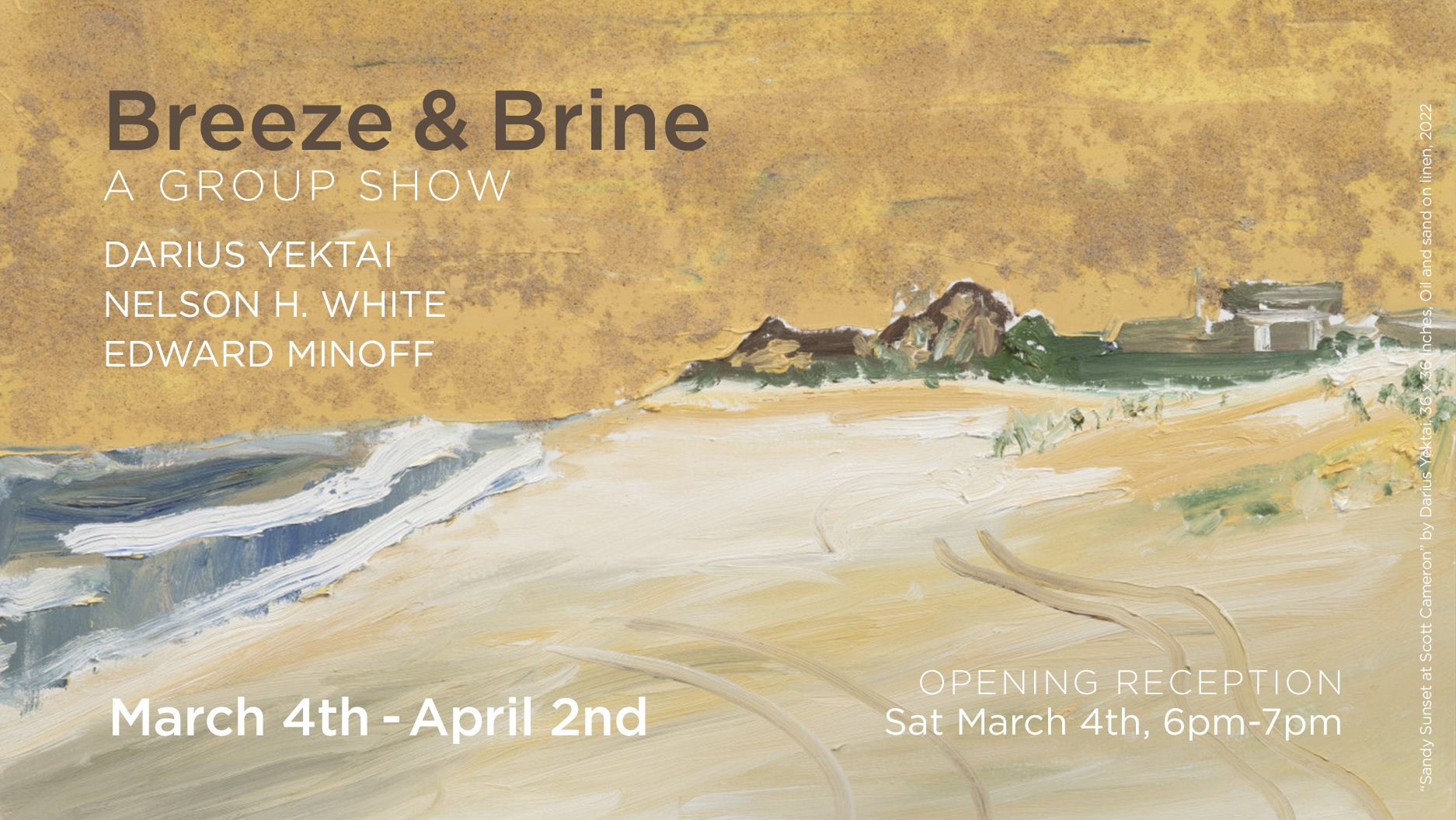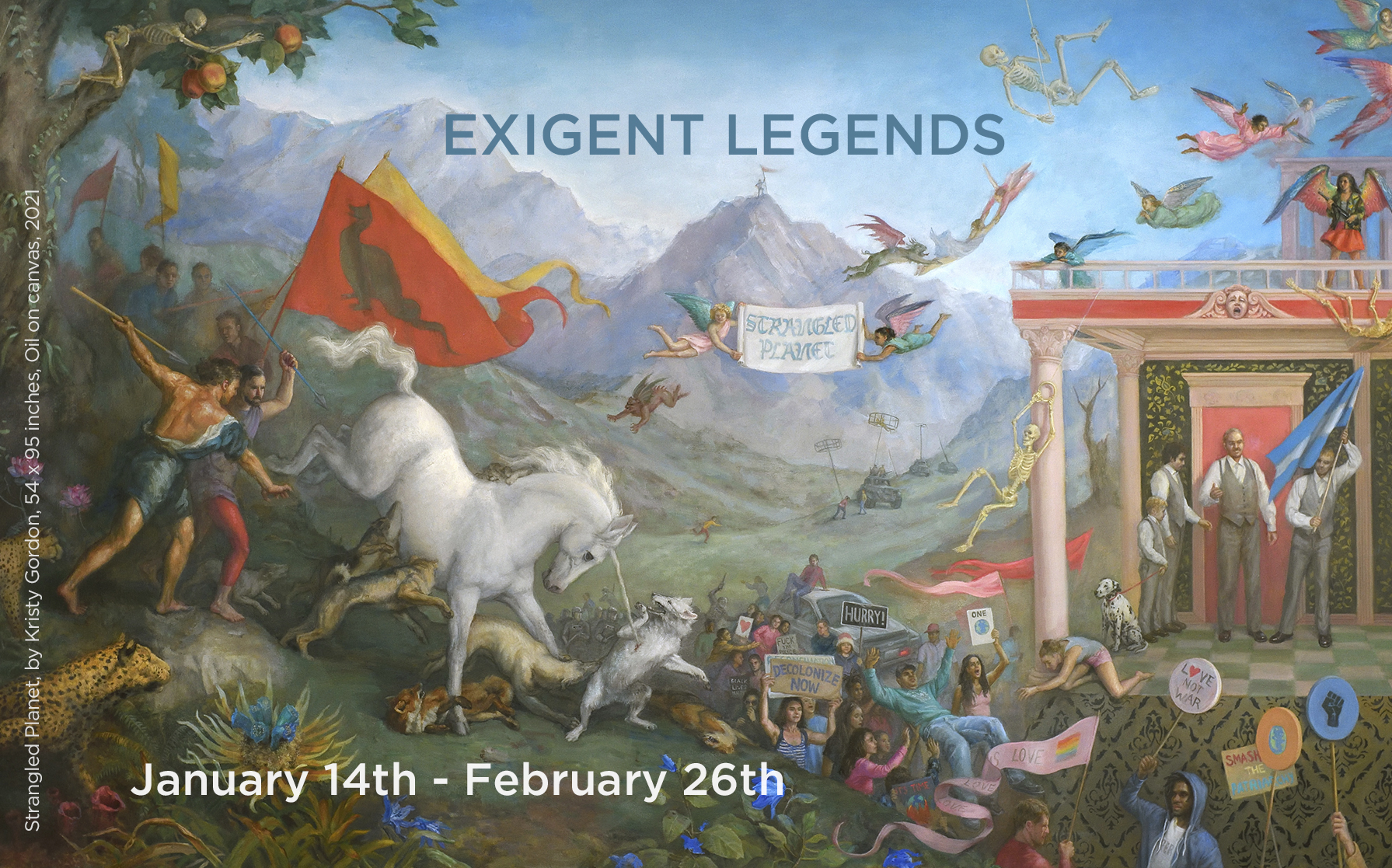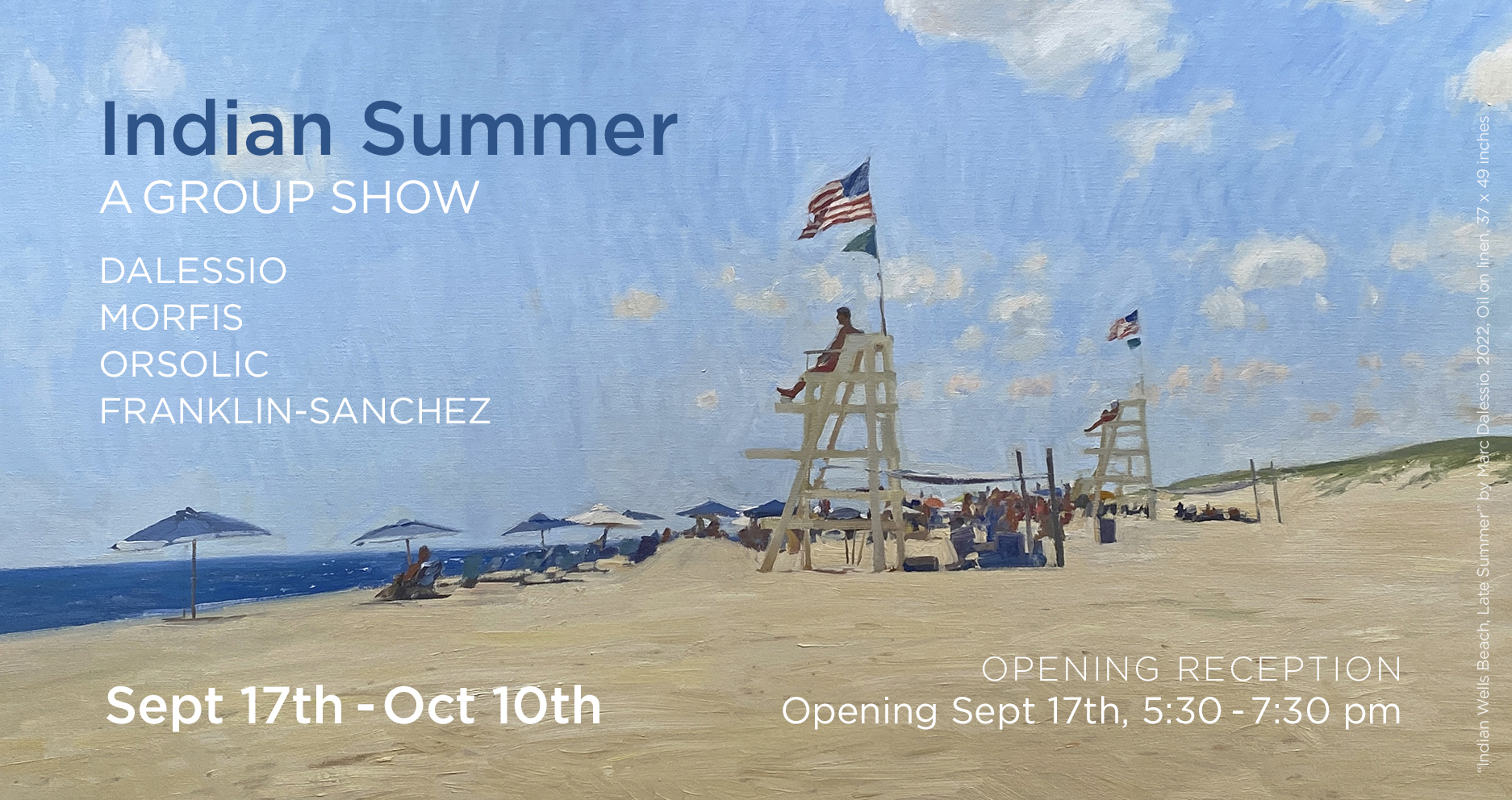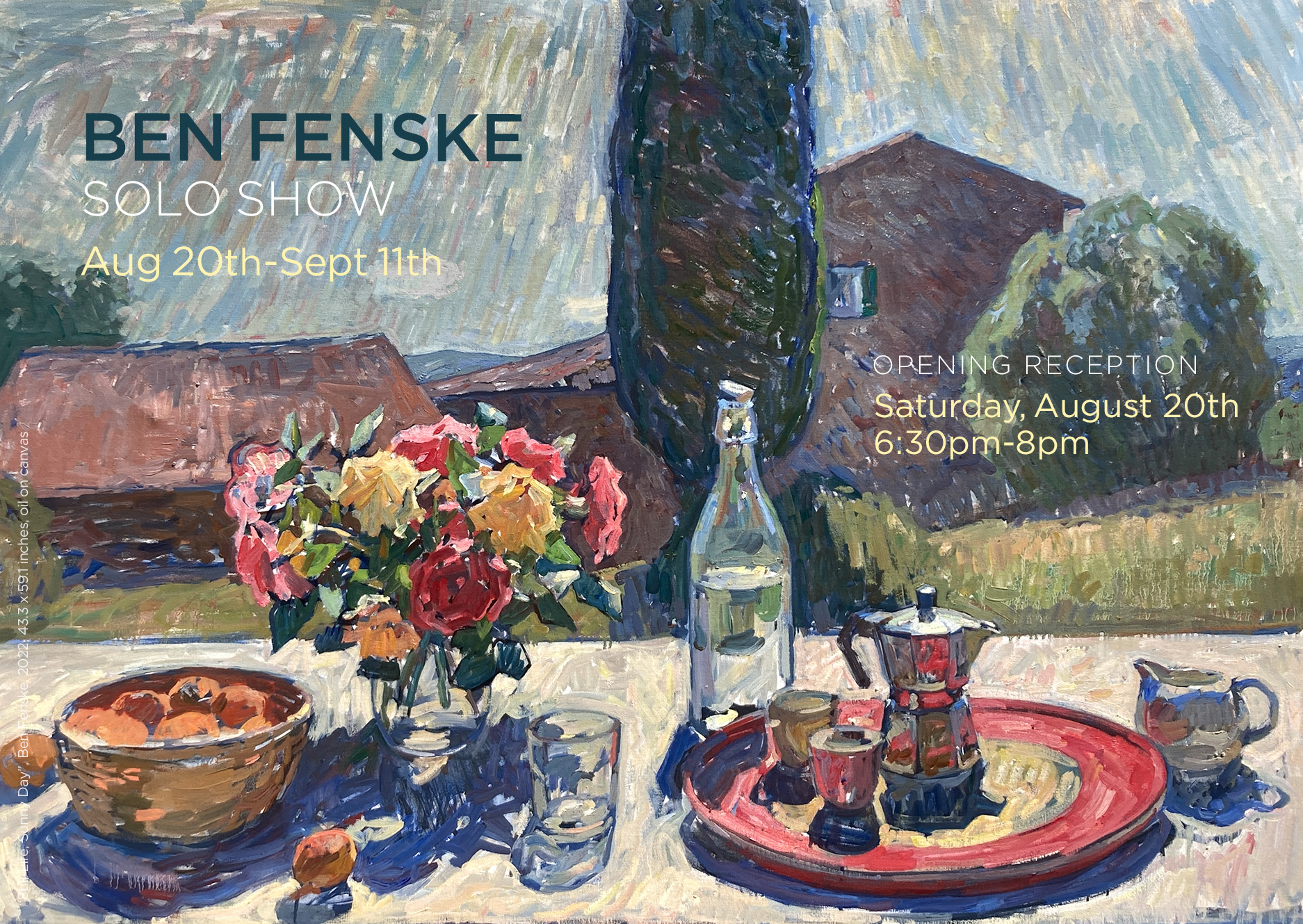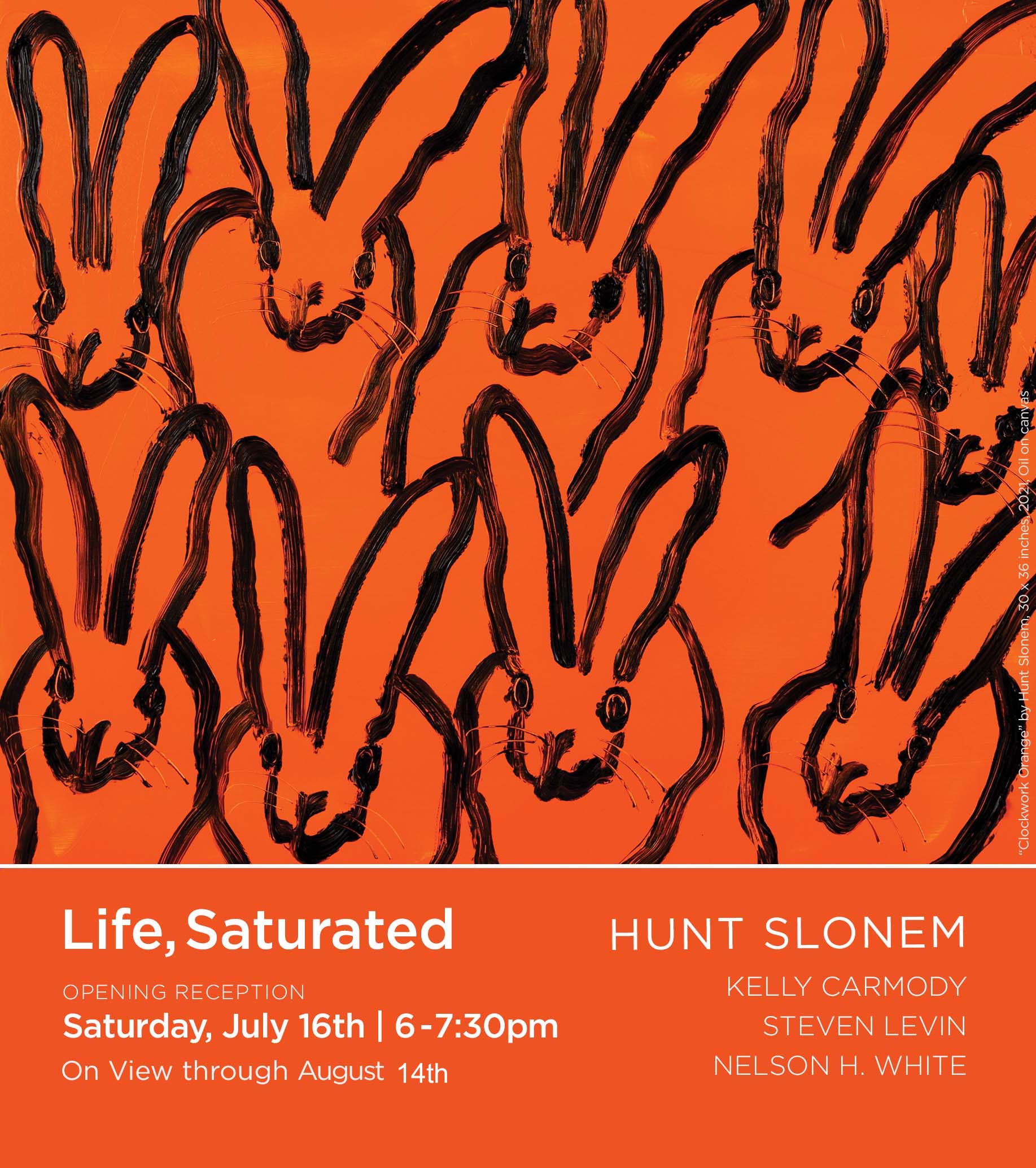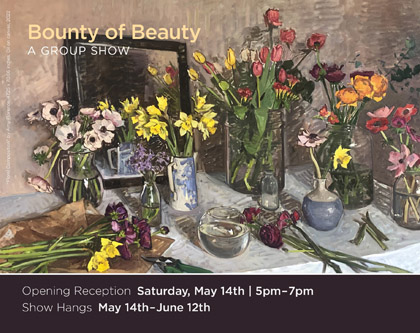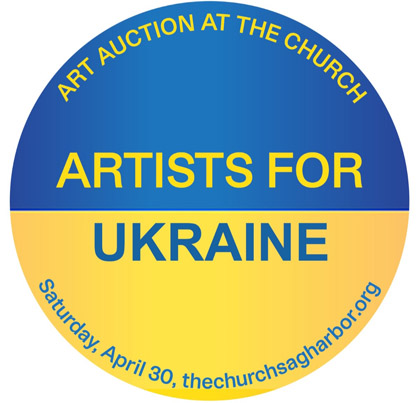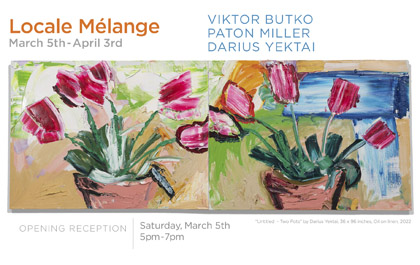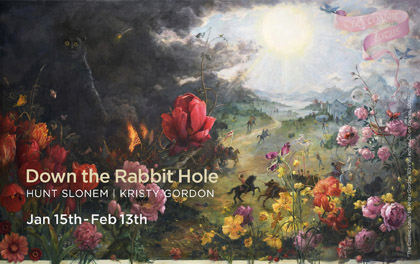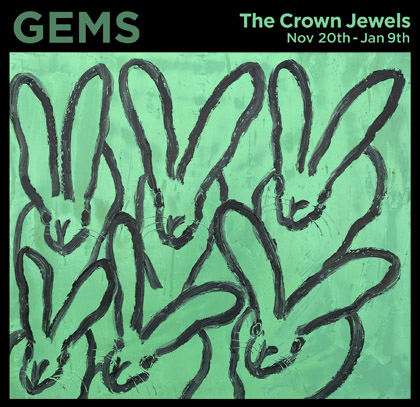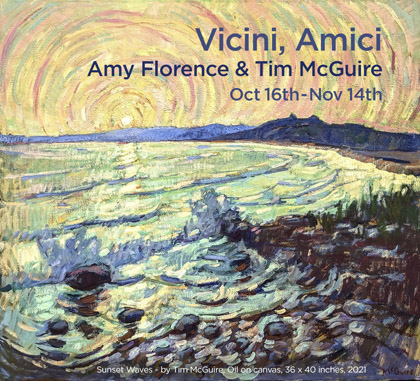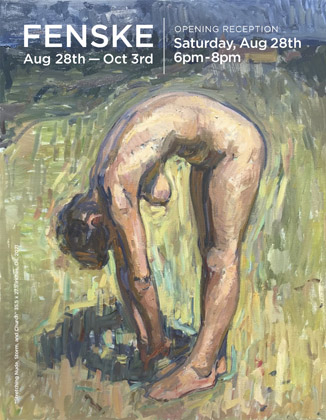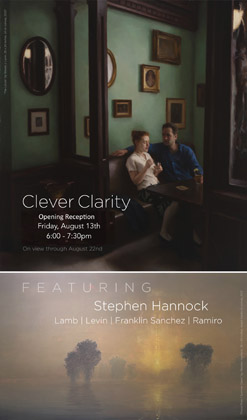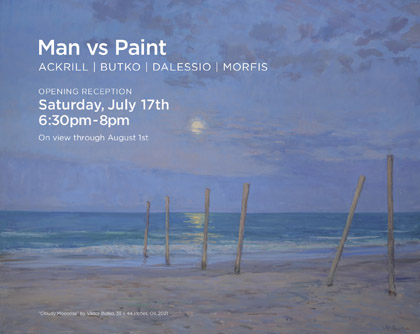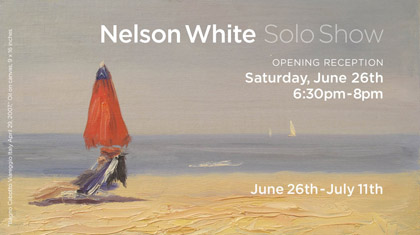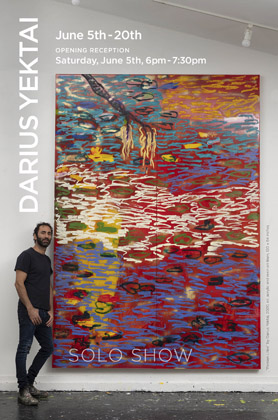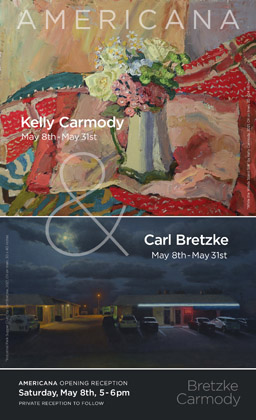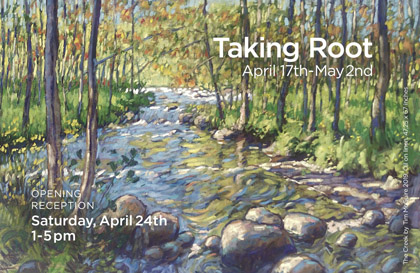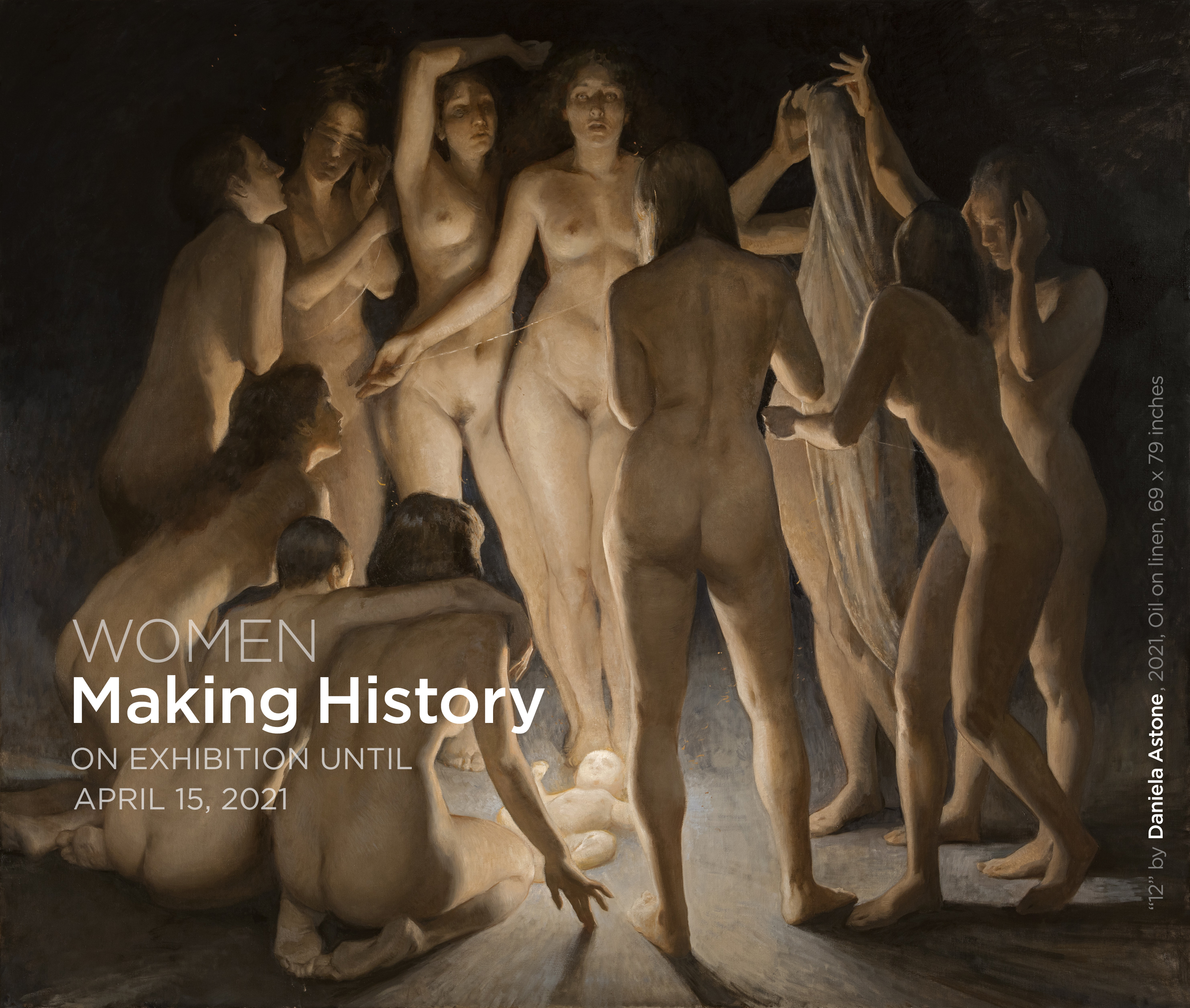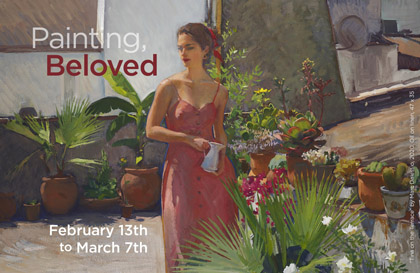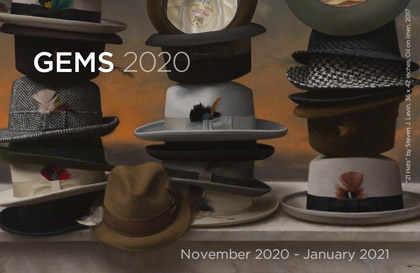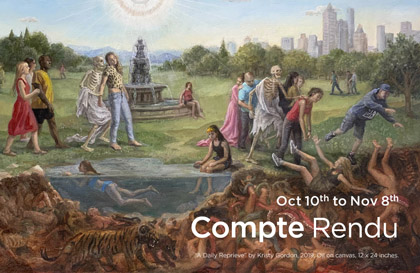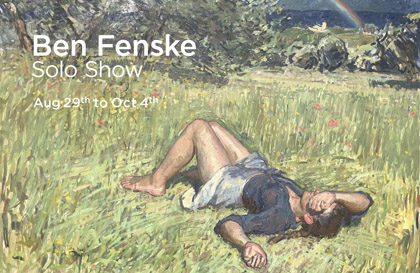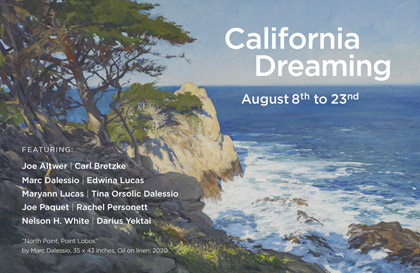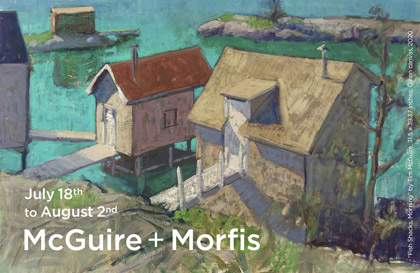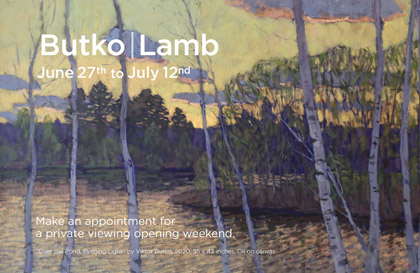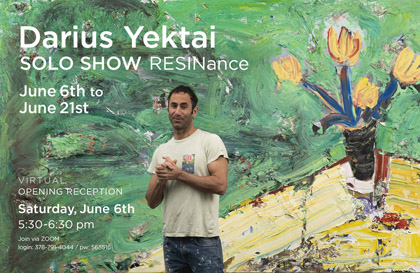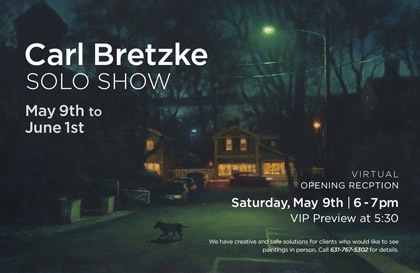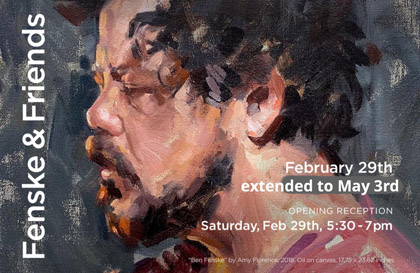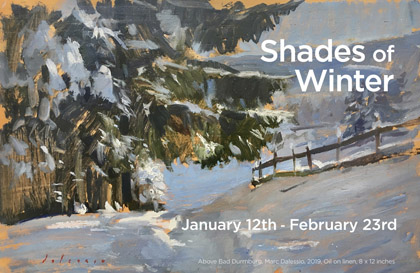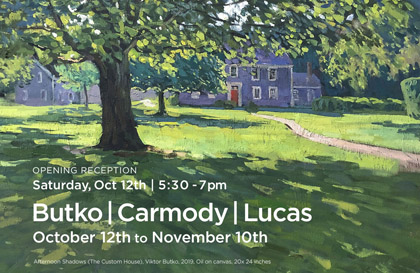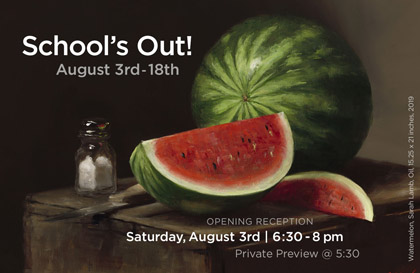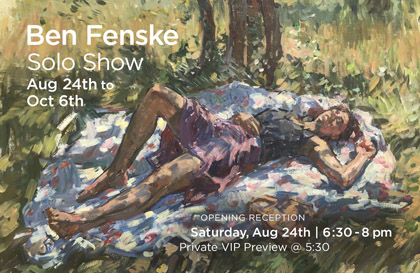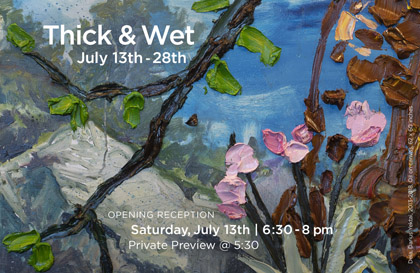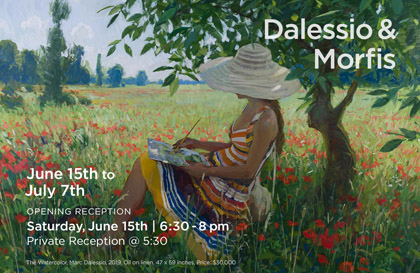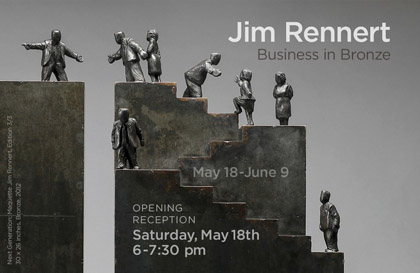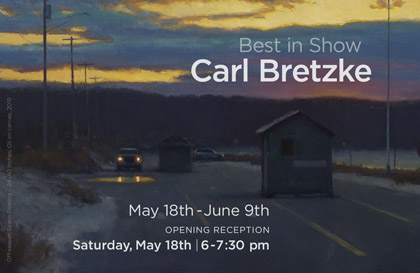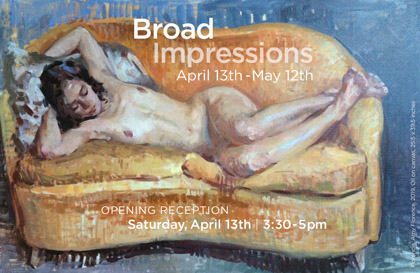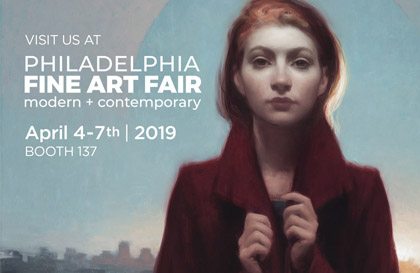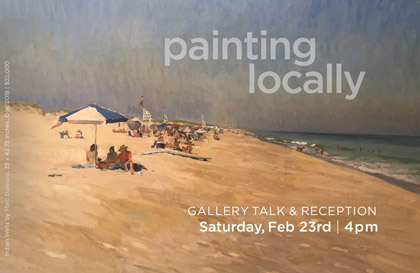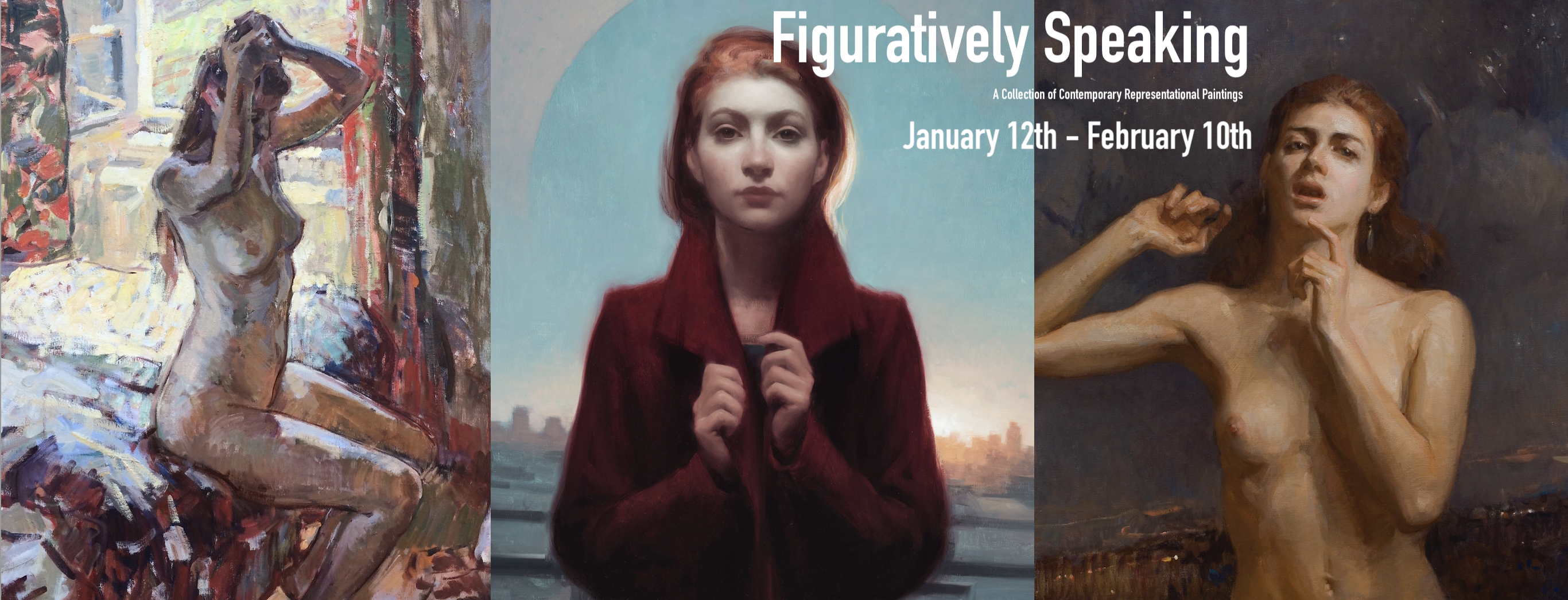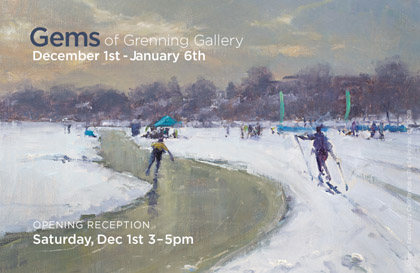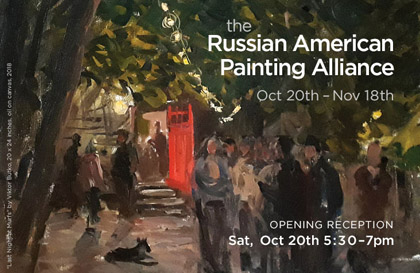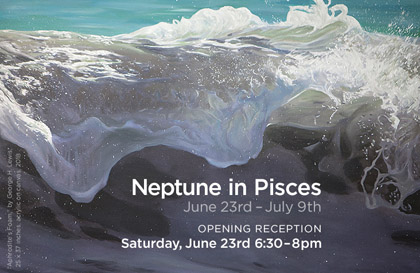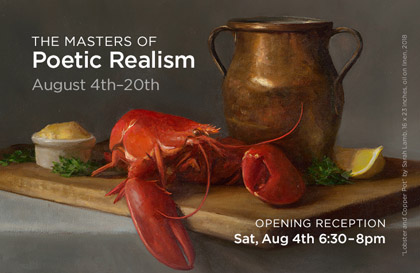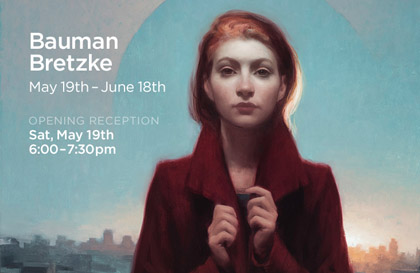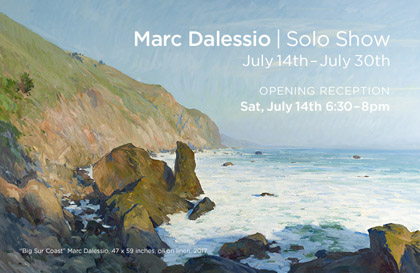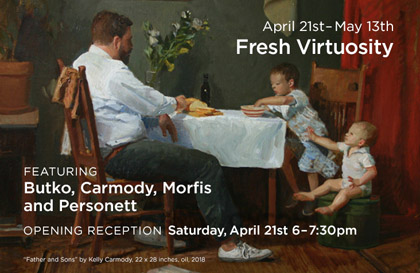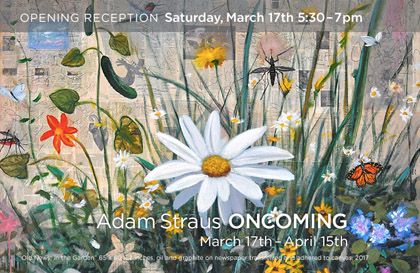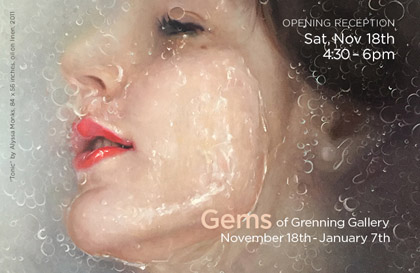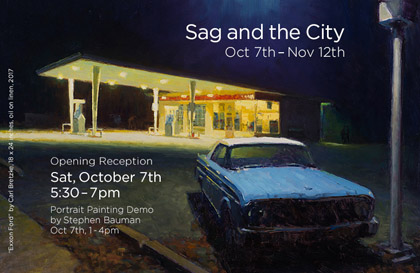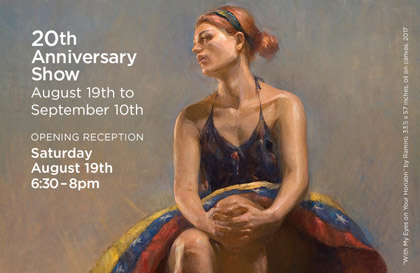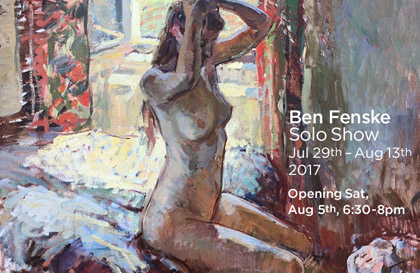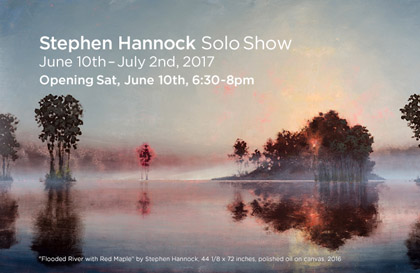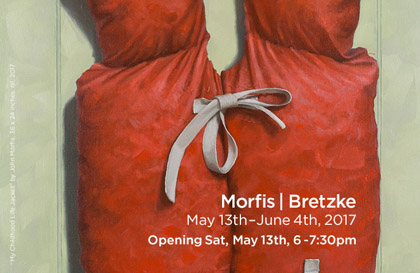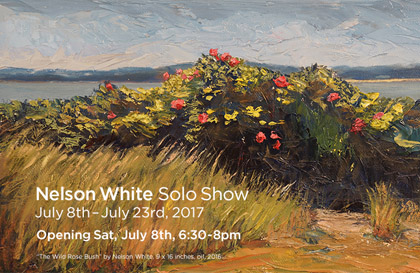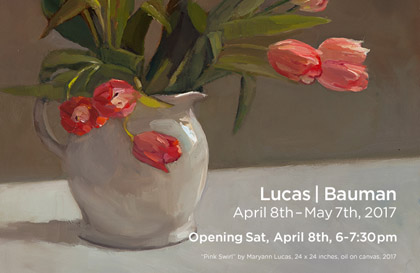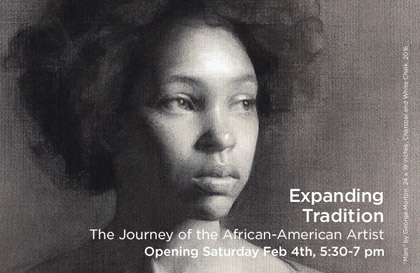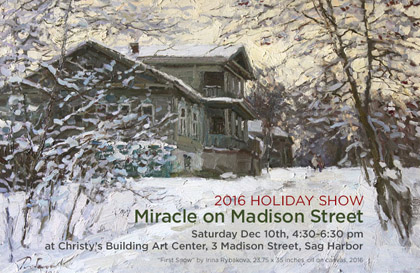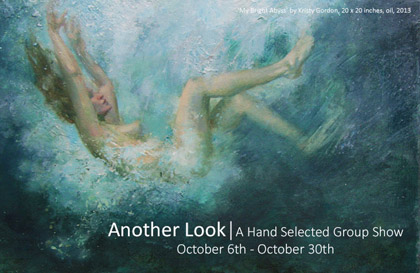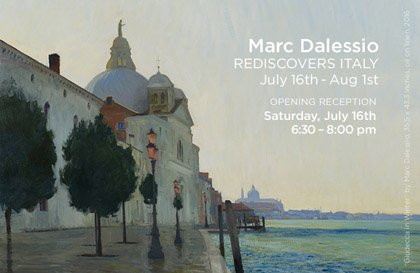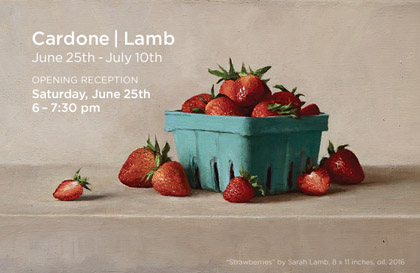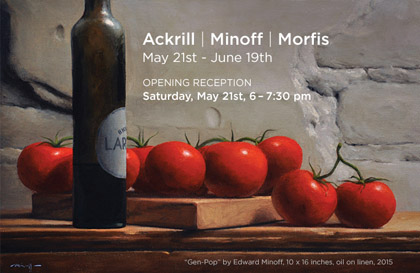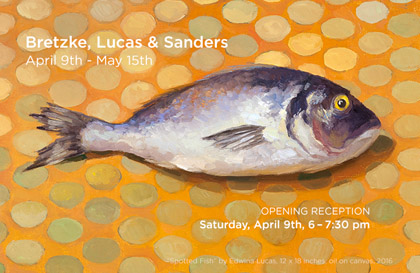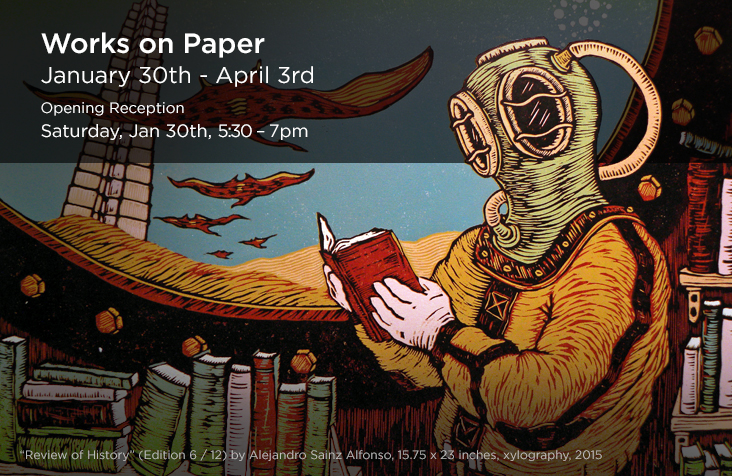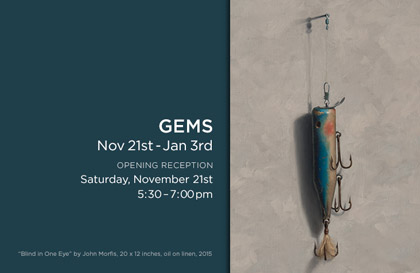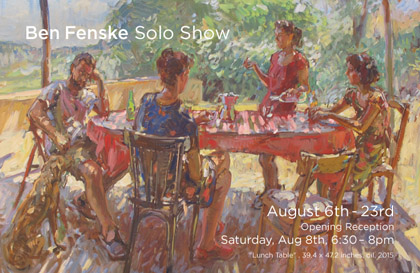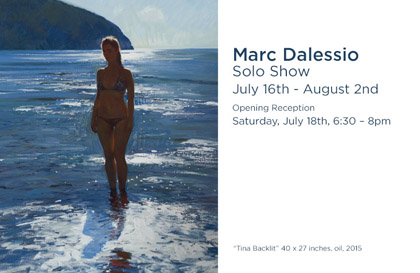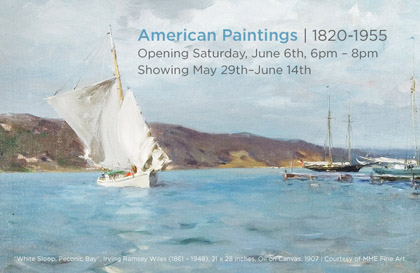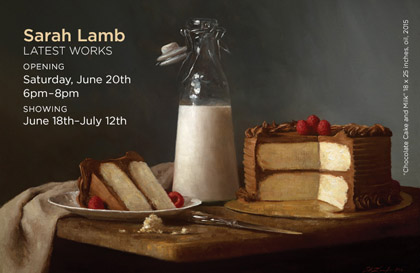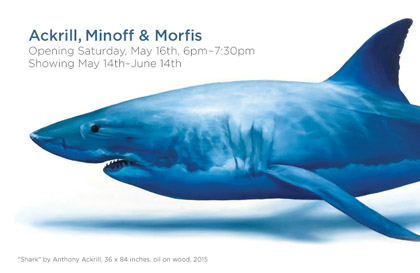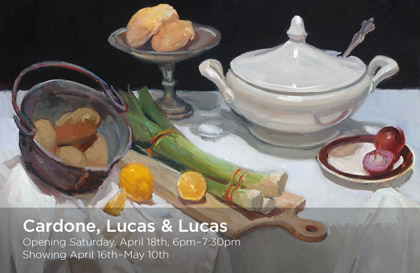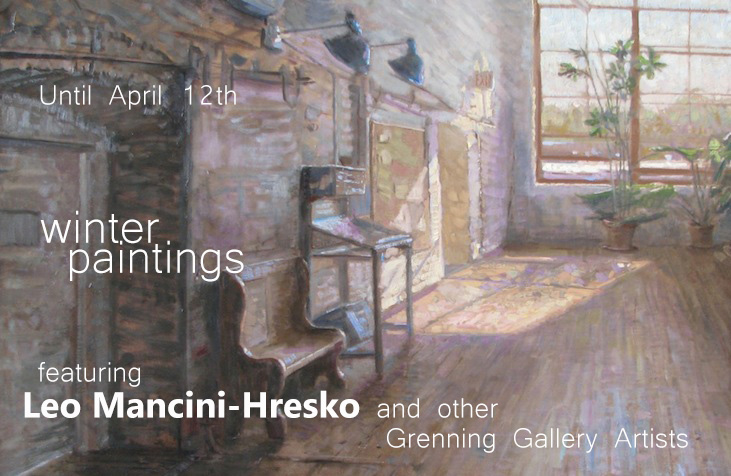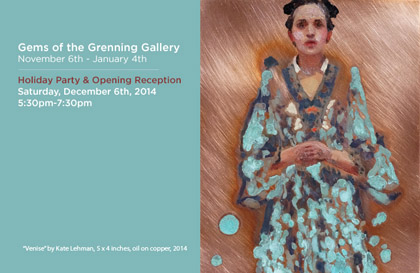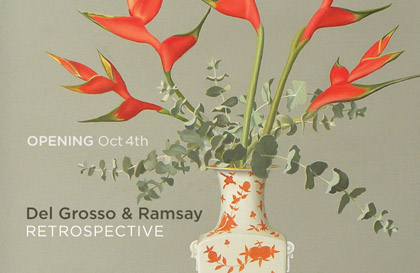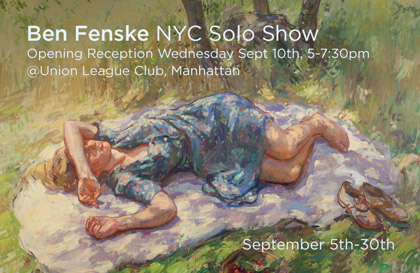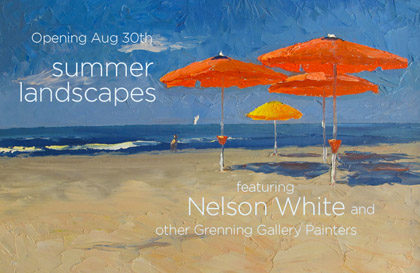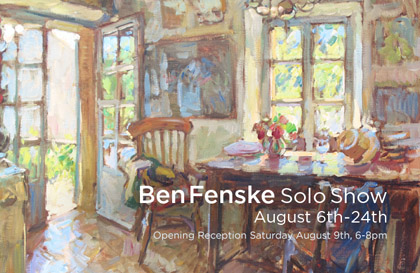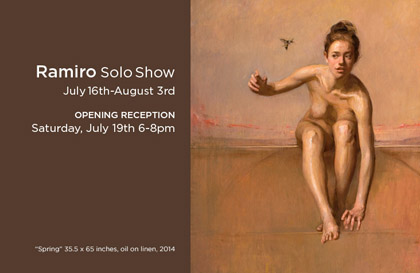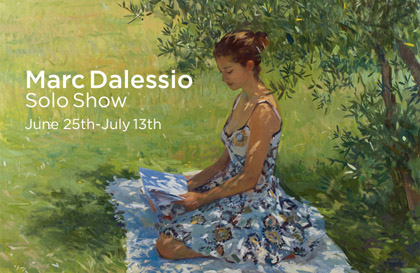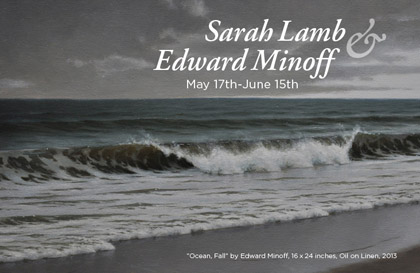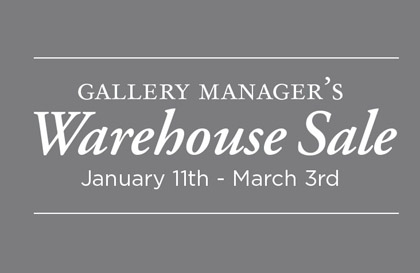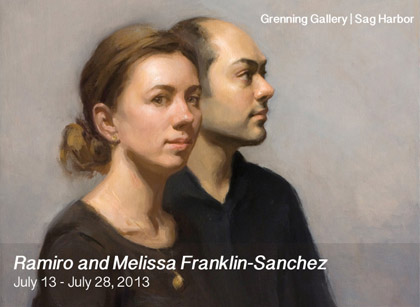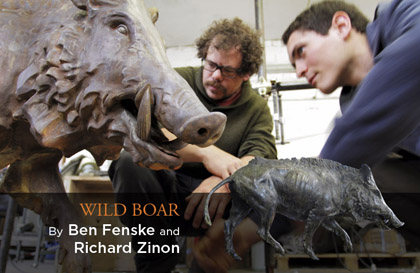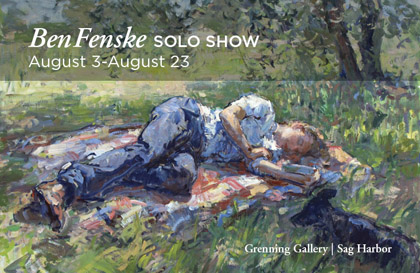EXHIBITIONS
Truly, Madly, Deeply
February 14 - March 8
The Grenning Gallery is pleased to announce our new exhibition, Truly, Madly, Deeply; a group exhibition anchored by the latest paintings from Darius Yektai, and fascinating figurations from Daniela Astone – this exhibition gives form to one of the most influential human emotions: Love. A selection of works from Amy Florence, Anthony Ackrill and Steven Levin will also be on view. Please join us on Valentines Day, Saturday February 14th, for an opening reception, 5:00-6:30pm at 26 Main Street, Sag Harbor, NY, 11963. The exhibition will hang through Sunday, March 8th, 2026.
Vacation!
January 17 - February 8, 2026
The Grenning Gallery is pleased to announce our next exhibition, Vacation! A group exhibition highlighting paintings of various destinations around the world.
GEMS of the Grenning Gallery
November 22, 2025 - January 11, 2026
The Grenning Gallery is excited to present Gems of the Grenning Gallery, our annual holiday exhibit featuring a variety of small-scale paintings from several artists, including local, domestic, and international talents! Staff will search our inventory for the best little gems from renowned GG artists such as Hunt Slonem, Ben Fenske, Daniela Astone, Kelly Carmody, Marc Dalessio, Sarah Lamb, and Sag Harbor’s Darius Yektai. Fresh works will be unveiled by Terry Elkins, Amy Florence, Kristy Gordon, Doug Reina, and Nelson H. White. Finally we are pleased to introduce works from emerging artist Robert Elliott. This collector of artworks will be accessible to all, with prices ranging from $500 to $50,000. As a “Cash & Carry” show, collectors can take their paintings home the same day they purchase. The exhibit runs from Saturday, November 22nd through Sunday, January 11th, 2025. A reception is scheduled for Saturday, November 22nd, from 5:00pm to 6:30pm.
In Light of Tumbleweeds
October 18th - November 19th, 2025
The Grenning Gallery is pleased to announce our next exhibition, In Light of Tumbleweeds: a group show presenting the latest work from contemporary painters, Viktor Butko, Amy Florence, Rolf Hellem, Mathias Meinel, & Melissa Franklin Sanchez. This exhibition highlights the beauty and culture that emerges after the Hamptons’ busy season ends. Many visitors ask year-round residents, “Oh, so you live here year-round…?!” and “What is it like in the off-season?” as if they can’t fathom life going on after the beach gets windy and cold. Well, these cooler months allow us locals to dive into our passion for the East End, and the quiet allows us to thoroughly enjoy our chosen East End lifestyle. Fishermen continue to fish, farmers continue to harvest, equestrians tend to their horses, and a walk down Main Street is a saunter - finally no longer a congested struggle. This exhibition celebrates the beauty of the offseason and the spiritual importance of slowing down.
Please join us at the Opening Reception on Saturday, October 18th, from 5:30 to 7:00 pm at 26 Main Street, Sag Harbor, NY, 11963. The exhibition will hang through Sunday, November 16th, 2025.
In his 9th year exhibiting at Grenning Gallery, Viktor Butko (b.1978, Moscow) delivers a stunning series of landscapes; each painting providing the viewer with a moment of awe and a deep exhale. Butko has a way of capturing scenes at their ideal hour. Whether it’s the low sun in the mornings, the high sun of the afternoon, or the setting sun of the evenings, Butko has mastered the soothing sense of wonder evoked by being outside and enjoying nature.
Butko’s largest landscape this year, “Summer Evening Over the Harbor” presents a vast blue sea at the foot of a hill. The foreground is structured with typical New England homes, catching the last bits of dappled light from the setting sun. Trees reach upwards with all their green leaves still intact. The sea is quiet, and although most of summer’s moorings have been abandoned, a scattering of modest sailboats and dories bob along the water. The distant horizon consists of verdant hills and valleys, catching that golden sunlight and casting shadows in their wake. The sky above delicately shifts in hue.
“Sunset at Dering Harbor” features a vibrant array of colors as a pink sun meets the horizon; purple clouds stretch across the candy-sprinkled sky. Again, Butko has created a scene that makes the viewer feel blessed to witness this majestic moment; the only other bystanders are the four gangly trees intersecting our view.
Rolf Hellem (b.1998, Norway) delivers a pair of new oil paintings that share sentiments of leisure and resilience. A beautiful seascape presents a marina of sailboats at rest, glowing in the evening sunlight. Another painting depicts a sun-soaked man in his dory, a cigarette in his mouth, intently focused on the fishing net in his hands. Not only is the beautiful setting a wonder to behold, but it is also an abundant resource for the locals who spend hours collecting home-grown sustenance. We, of course, see more of this hard labor in Hellem’s “Fisherman’s Fight” paintings, which we will pull out from the racks, having first exhibited them in February of this year.
Amy Florence (b.1989, London) is known at Grenning Gallery for her affectionately rendered compositions of flowers, which we are fortunate to exhibit; her 2 latest florals present wildflowers, centrally configured – each bouquet a trophy in honor of the field she picked them from.
Another series we’re putting forth from Amy Florence in this exhibition is her Equine Series. Horses have been depicted by artists since the prehistoric caves of Lascaux; the imposing four-legged animal served as a symbol of man’s dominance over the environment. Horses have also served as symbols of wealth and power, with regal paintings of kings atop horses in battle, to portraits commissioned of noblemen posing atop their stately steeds. Florence, however, is not painting the equine subject as a symbol of status or domestication; she is alternatively studying them in their natural routines. Florence studied the anatomy of horses for months via books and by spending time on a friend’s farm. She copied several sketches made by Munnings to prepare for painting horses from life. After she witnessed the creature’s day-to-day habits, she chose to convey them just as they are: standing in their stables, trotting through a grassy plain, or taking solace in the shade for a bite of hay. Florence implements her new knowledge on the anatomy, textures, and temperaments of these magnificent animals. We are also pleased to share several paintings of Sag Harbor that Florence created on her most recent trip here.
Year after year, Melissa Franklin Sanchez (b.1984, England) has successfully captured the importance of introspection and immersing oneself in the comfort of their surroundings, both in nature and in her home with her family. At first glance, “Self Portrait in My Garden” looks simply like a landscape; her grassy backyard is a lush carpet of green and dotted with glowing fireflies. Yet within the boundaries of her green garden towards the back edge, we discover a silhouette of the artist. She places herself into the landscape as an ode to this sanctuary she’s cultivated, where she spends time with her children, their imaginations able to thrive.
Inside her home, there are flowers from her special garden, trimmed and arranged in some of the many vessels’ artists collect and utilize in their still life compositions. At the stairs, Franklin gazes upward to see (and hear) her husband playing violin against the natural light behind him. The staircase is ornate, with blue and white decorative tiling, or Azulejos; each step up is a tender craft to behold.
Finally, we will be showing the works of Mathias Meinel (b.1981, Germany), a relatively new artist who debuted here in Autumn 2024. These wetscapes of his homeland are a proud love letter to his surroundings. Meinel uncovers the beauty of a flooded field under grey skies and looks closely at what lies beneath the surface of a muddy puddle. These paintings are not glorified representations, but they are honestly observed and true, and therefore glorious.
Bretzke | Elkins
September 20th - October 13th
The Grenning Gallery is pleased to announce our next exhibition, a two-person show presenting the latest work from contemporary realist painters, Carl Bretzke and Terry Elkins. Please join us, and meet local artist Terry Elkins at the Opening Reception on Saturday, September 20th, from 6:00 to 7:30 pm at 26 Main Street, Sag Harbor, NY, 11963. The exhibition will hang through Monday, October 13th, 2025.
Both Bretzke and Elkins are masters at observing their surroundings; Bretzke is known for his alluring and scenic nocturne paintings. This year, we are thrilled to have several new nocturnes from Bretzke, set here in the village of Sag Harbor! Elkins is known for his prismatic landscapes, with vast skies and clean lines to direct our gaze. Both artists focus their eyes on what some may consider mundane scenery, and they amplify the charm that caught their interest, obliged to share the beauty they see.
Ben Fenske Solo Exhibition
August 28 - September 14
The Grenning Gallery is pleased to announce our 18th Annual Solo Exhibition, showcasing latest works by the brilliant impressionist painter, Ben Fenske. Please join us and meet the artists at the Opening Reception on Thursday, August 28th from 6:00 to 7:30 pm at 26 Main Street, Sag Harbor, NY, 11963.
The exhibition hangs through Sunday, September 14th, 2025.
Summer Group Show 2025
August 8th - August 24th
The Grenning Gallery is pleased to announce our Summer Group Show, showcasing the varied talents of Anthony Mastromatteo, Doug Reina, Steven Levin, and introducing Gene Johnson. Please join us and meet the artist at the Opening Reception, Friday, August 8th from 6:00 to 7:30 pm at 26 Main Street, Sag Harbor, NY, 11963. The exhibition hangs through Sunday, August 24th, 2025.
While these artists have diverse interests and ways of expressing themselves, we find similarities in their use of color, form, and content. The Grenning Gallery’s Summer Group Show this year has a retro, mid century aesthetic that calls our attention to angularity, symmetry, balance, while also highlighting the subtle impact of color in paintings. These painters remind us that painting, while technique is interesting to behold… it is also a form of media that can be utilized by the artist to communicate sophisticated and abstract ideas. To put it simply; a picture is worth a thousand words.
Anthony Mastromatteo’s (b. 1970, OH) thoughtful and hilarious trompe l’oiel paintings deliver dramatic pop art laced with political messages and philosophical questions. These paintings not only mesmerize us with his precise detail, but captivate our intellectual attention. Mastromatteo, cleverly, uses humor to disarm the viewer, making gentle suggestions that invite the viewer to investigate their own interpretation of the media he uses. Mastromatteo is a master of light, shadow, and realistic texture. Upon viewing these paintings, we see how they are truly a “trick of the eye”. Viewers are often deceived, and look at these paintings from the side, hoping to find the paper’s edge coming off the surface, only to discover it is, in true trompe l'oeil fashion, completely 2-dimensional.
In many paintings, Mastromatteo uses the iconic 1950’s DC comic cartoons as a vessel for his witty communication. The accessibility of the content Mastromatteo uses serves to draw in the unsuspecting viewer, and his unbelievable skill of representation holds their fascination long enough to stimulate questions: What does this mean? What is he trying to say? The subtlety of this messaging is what keeps Mastromatteo’s work engaging and interesting. Many “pop” artists choose to put it all out of the table, relying on shock, provocation, or boldness to grab the viewer. Mastromatteo is more subtle than this… He leads with a playfulness; the element of fun and humor in his work makes these paintings attractive and stimulating. How deeply the viewer chooses to engage with the ideas he communicates is up to them; the longer one stands in front of one of these paintings, the more there is to see.
Steven Levin’s (b. 1964, MN) paintings combine his impressive skill for realism with a flare for the surreal. Levin is part of a group of contemporary painters who choose to practice classical realist painting techniques, and as such, his grasp of realism informs his artistic choices. In other words, Levin knows the rules, and when he breaks them, we understand this is intentional. His unique compositions remind us of Rene Magritte in their whimsy, yet Edward Hopper in his ability to capture perfectly “American” moments. Levin also has the rare skill of recreating realistic and unique human dynamics through body language in his figurative works. In “Balcony” he is capturing the nuances of what, on the surface, appears to be a snapshot of a mundane social interaction. With a keen eye, we observe the two figures, she, looking off towards the horizon, lost in thought, he, looking directly at her from above. Her arms are crossed to him, turned away, while he braces the railing behind him, hand in pocket, open to her. The subtle indicators of emotion and attitude in his paintings is not only the hand of a skilled painter, but the eye of an anthropologist.
In this show, he reveals the newest of his ever popular Books and Butterflies series, the content itself a metaphor for the transformative influence of language and literature, a message in favor of education and refinement. Levin exhibits his talent and his well trained hand with these complex still lifes, and the scene is elevated by the strange liminal background, often a sunset and/or a water horizon. We find several artists in this show rely on the horizon line to stabilize a more unconventional composition, especially in the work of new artist, Gene Johnson.
While the paintings are literally representational, often depicting exteriors of buildings, corners, or unique architecture, Doug Reina’s (b. 1959, NY) strategic flattening of shapes and emphasis of lines and angles guide these paintings into the realm of delightful abstraction. If the viewer steps back and unfocuses their eyes, ignoring Reina’s skillful details, what one will find is a sophisticated composition of shapes, light, and shadow, not unlike Richard Diebenkorn’s earlier work. Reina chooses subjects and scenes that display sharp, dramatic lighting, which cast dark shadows, creating triangles and lines that interact with the rich local color blocking around it. The artist uses our distinct East End architecture and deep rich palette as fodder for his large scale paintings.
Reina’s precision as a painter is what qualifies this work to be included in the Grenning Gallery - but it is Reina’s ability to capture the emotion of our local East End essence, in these large scale canvases, which is something we have rarely seen! Reina’s series hints at the influence of Edward Hopper’s paintings, which captured glimpses into other people's lives he passed by in bustling New York City.
The Grenning Gallery is pleased to introduce Gene Johnson (b. 1945, NJ), who has been painting and showing his work in NYC and Mexico for over 40 years. Johnson’s geometric abstractions investigate shape relationships, balance, and color. Johnson’s surfaces are tactile, uniform, and shift from shape to shape, giving the composition 3-dimensional distinctions that go beyond the lines of separation. Though they appear completely abstract, these compositions are influenced by Johnson’s lifetime of access to the Mexican mountainscape, and we consider them to toe the line between geometric abstraction and a Diebenkorn landscape.
These paintings often, if not always, contain a horizon line to ground the space, poetically referencing realistic shadow and light. Viewing these paintings through this context creates a generous image. They transcend the graphic 2-dimensional composition we initially see, and open into an illusion of a landscape. The tension between subtle representation of real space, and abstract distortion made by liberal color and texture, is what makes these paintings grab one’s attention. When standing in front of Gene Johnson painting one steps forward, then steps backwards, and then one keeps coming back, reveling in the color and shapes.
Darius Yektai Solo Show
July 17th - August 3rd
The Grenning Gallery is pleased to announce our 6th Annual Solo Show for Darius Yektai. Please join us and meet the artist at the Opening Reception, Thursday, July 17th from 6:00 to 7:30 pm at 26 Main Street, Sag Harbor, NY, 11963. The exhibition hangs through Sunday, August 3rd, 2025.
Darius Yektai’s new body of work requires us to take a literal step back; These paintings are large and bold; colors synthesizing an abstract song about nature and emotion. The landscape plays the role of background, rooted in observational elements like branches, willow leaves, mountains, and horizon lines, combined with rich colors and gestural brushwork. Up close, we can investigate his decisions in the artistic process, but from afar, we recognize the prodigious skill of an abstract composer.
Yektai returns to an iconic subject; He has reignited our passion for the water lily landscape, with these rich, moody, powerful paintings. In Pond, the resin Yektai uses is poured onto the canvas and does not reach the edges; instead, it pools in the center, demonstrating the dramatic effect that the resin has on these paintings. The color appears richer and darker, as if it’s been varnished over. In person, this painting displays the inviting juxtaposition of two surfaces the artist plays in: the wet appearance of reflective resin, and dry, flat linen canvas.
Darius Yektai is delivering unexpected compositions, engaging and sensual surfaces, and creating powerful color pairings. We experience these paintings twice; The first time, as an image, the second, as a tactile surface. Moreover, his paintings often transcend the 2-dimensional plane and lean towards the sculptural. The textures, patterns, and materials in these paintings add so many layers to this work that, even after seeing them a hundred times, we can still notice something new. The generous nature of these paintings is part of what makes collectors of Yektai’s work fall in love with them.
Many of these paintings combine still life and landscape in an exciting and unorthodox style that Yektai has been developing for over 30 years. His thick impasto brushwork facilitates a tension between representation and abstraction. Pink Hydrangeas in a Clay Vase is grounded by the still life in its center; While the table fashioned with canvas strips creates structure and weight, the top half demonstrates Yektai’s affinity for organized chaos, mimicking a shower of leaves, water, and branches, all while withholding the detail we’re looking for. As a result, these paintings captivate our curious gaze as we search for something to hold on to and imagine the movement behind each mark.
In several paintings, Yektai extends the image over the edge and onto the frame; literally coloring outside of the box. This method invites us to reconsider the role of framing; here he demonstrates that even when he’s painting a classical subject - a vase on a table - he won’t be bound by what is traditionally considered the visual container of his image. This technique extends the image in a daring and physical way.
Yektai’s unbounded creative process is breathing new life into these textbook subjects. He is prodding the viewer to question their ideas on what a still life is, what a landscape is… that these subjects can instead be tools that plunder your preconceptions instead of reinforcing them.
In MilkyWay Stargazers, Yektai switches his gaze, from looking down onto bodies of water adorned with waterlilies and willow trees, to looking up at the vast, wide open night sky. Ironically, the artist chose white pebbles to convey the shimmering galactic trail of the Milky Way. Tiny stones that are usually situated on the ground to be stepped upon are instead thrown into the sky. Forms of shooting stars and ambiguous constellations are depicted through cutouts in the base of the “canvas,” which in this case, is cardboard. Two silhouettes stand before the composition, gazing straight ahead at the sky above them. The resin poured atop the cardboard darkens the composition to a rich brown - reflecting the setting of the painting’s environs, including any viewer that comes to greet the painting.
WhiIe we appreciate Yektai’s naturalist impulse to create landscapes and still life paintings that are inspired by his direct observation, we admire his creative risk-taking even more. Many artists are attracted to finding a lane, where they find their paintings garnering the most success, where the sales are most lucrative, and then stay there. Darius Yektai, however, finds his path by following his own creative curiosity and dives deeper into that path, regardless of the viewers’ response to the work. He bravely keeps searching, painting, and collaging with new and found materials as he explores any creative lead. He is game to accept the challenges that come up in his intellectually open and flowing process. As a result, a visit to his studio is always packed with surprises, even for us, who visit every few weeks!
Hunt Slonem Solo Show
June 19th - July 13th
The Grenning Gallery is pleased to announce our Annual Solo Show for Hunt Slonem! Please join us and meet the artist at the Opening Reception, Thursday, June 19th from 6:00 to 7:30 pm at 26 Main Street, Sag Harbor, NY, 11963.
The exhibition hangs through Sunday, July 13th, 2025. There will be a Closing Party on July 12, from 5:00 to 7:00pm. The Grenning Gallery will have Slonem works on display and available for viewing all year round.
The Grenning Gallery was founded to represent painters with a naturalist impulse. Hunt Slonem despite his distinct style with bold colors and thick brushwork, is no exception. Slonem’s work stands out to us for its spiritual inspiration and steadfast aesthetic. His work is not only grounded in a deep respect and awe of nature, but the man himself is a deeply spiritual person; His artwork is an expression of the life he leads. Slonem nurtures a mystical connection with all that he loves, thus his process of art-making is a ritual in and of itself.
In this year’s show, we have selected a series of wide ranging subjects, yet they are linked by their sensitivity to color and light. His paintings, while they appear simple in subject, are charged with the artist’ joy, love, and pure fascination. The result of this artistic process is paintings that infuse a room with vibrant, positive energy.
In Slonem’s larger works, the populated space of his paintings is both maximalist and minimalist. His iconic repetition birds, bunnies, and butterflies, often transcends ordinary subjects and transforms into a mesmerizing pattern. By filling a canvas with the same subject in this repetitious way, Slonem’s paintings become a mantra – quieting the senses, captivating the viewer with rich flora and fauna. These paintings are puzzles we can’t help but try to figure out. This approach to his subjects, combined with his many processes of handling the paint, results in truly hypnotic compositions, both aesthetically pleasing and critically engaging.
Hunt Slonem remains nature’s devotee when it comes to the subjects of his paintings. His loyalty to his birds, bunnies, and butterflies give us insight into the mind of the artist, his message, and his process. Playful, joyous, even childlike on the surface, these paintings are warm and welcoming. However, when we look closely and consider why he chooses these animals, we find a profound underpinning to his work.
The rabbit is a timeless symbol of purity, innocence, and vulnerability. The bird represents freedom and hope, and the butterfly, of course, symbolizes transformation and rebirth. These symbols are so pure they need not be tainted nor obscured; His pop-art adjacent style showcases this message with concise clarity. Such simplicity evokes a natural, instinctual skepticism from viewers, effectively grasping our attention with its boldness. A simple realist painting of a rabbit may not hold the contemporary viewer for very long, but Hunt Slonem’s work is challenging the modern instinct to overlook the natural environment. Instead, he invites us to look deeper.
During his time studying abroad in tropical climates such as Mexico and Nicaragua, he recalls a single moment when he was in a jungle surrounded by butterflies;
“…Each more iridescent and gorgeous than the next. The memory stayed with me for my whole life, and I just painted them over and over again…Hardly a day goes by that I don’t reference this experience.” explained Slonem.
Hunt Slonem’s dedication to recalling and representing the energy of these experiences is what makes his work so enchanting. Laura Grenning, the founder of Grenning Gallery, has always had an animist understanding of all paintings, since the inception of the gallery in 1998. Grenning believes that the viewer’s feelings when looking at a painting are akin to the feelings that the painter had when they were creating it. In the context of Hunt Slonem, we recognize the pure joy and connection that he channels during his creative process, and that by returning to these familiar subjects, he is also returning to those profound memories of his youth. Slonem’s spirituality is imbued into each of his paintings, and in kind, these paintings reward the viewer in unexpected and deeply moving ways.
This explains why many collectors of Slonem’s paintings often come back for more after buying just one small bunny. Demand for his work remains strong after over 40 years of showing. Slonem’s paintings can be found in over 250 museums around the world, and he is represented in over 80 galleries globally. The unapologetic and infectious joy from these paintings is something we just can’t take our eyes off of.
Summer Events 2025
June 19th - September 14th
This summer's events calendar is full of exciting events, including Opening Receptions, Studio Visits, Closing Parties, Art Fairs, and more.
Please note that our Opening Receptions will be held on THURSDAYS this Summer!
JUNEHunt Slonem Solo Show
Opening Reception: Thursday, June 19th, 6:00pm-7:30pm@ Grenning Gallery, 26 Main St, Sag HarborThe exhibition is on view June 19th, 2025 - July 13th, 2025JULYHampton's Fine Art Fair
July 10th - 13th, 12:00pm-6:00pm @ Southampton Fairgrounds, 605 County Road 39, Southampton, NYSpecial appearance by Hunt Slonem for a book signing, Friday, July 11th at 4:00pmTo secure your ticket, call us at the gallery 631-725-8469 or email info@grenninggallery.comClosing Party: Hunt Slonem Solo Sow
Saturday, July 12th from 5:00pm-7:00pm@ Grenning Gallery, 26 Main St, Sag HarborDrinks, hor d'oeuvres, and live music to celebrate the end of Hunt Slonem's Solo ShowDarius Yektai Solo Show
Opening Reception: Thursday, July 17th, 6:00pm - 7:30pm@ Grenning Gallery, 26 Main St, Sag HarborThe exhibition is open July 17th, 2025 - August 3rd, 2025AUGUSTSummer Group Show: Steven Levin, Anthony Mastromatteo, Doug Reina & introducing Gene Johnson
VIP COCKTAIL PARTY - Invite Only
Thursday, August 7th from 6:00pm-8:00pmSpecial VIP preview of our Summer Group Show, with artists Tony Mastromatteo, Doug Reina, Steven Levin, and new artist Gene Johnson. This event is private invitation only.Opening Reception: Friday, August 8th, 6:00pm - 7:30pm
@ Grenning Gallery, 26 Main St, Sag HarborThe exhibition is open August 8th, 2025 - August 24th, 2025Ben Fenske Solo Show
Opening Reception: Thursday, August 28th, 6:00pm - 7:30pm@ Grenning Gallery, 26 Main St, Sag HarborThe exhibition is open August 28th, 2025 - September 14th, 2025Carmody | White
May 24 - June 15, 2025
The Grenning Gallery is pleased to unveil CARMODY | WHITE, an exhibition celebrating two classically trained painters who’ve redirected their skilled hands to soften, allowing them to dive into their curiosity about uncommon color associations found in nature, which now drive their compositions. This exhibit will hang from Saturday, May 24th, through Sunday, June 15th, 2025. Please join us for an Opening Reception on Saturday, May 24th from 5:30-7:00 pm, both artists will be present.
We are also pleased to see that after over 100 years of painting on Shelter Island, the White family will be honored with a museum show! The Shelter Island History Museum will be hosting Generations of Shelter Island Impressionists, an exhibition of paintings from our own Nelson H. White, his father Nelson C. White, and his grandfather Henry C. White. The exhibition opens Saturday, June 28th, and hangs through October 11th. The museum is located at 16 South Ferry Road on Shelter Island, NY.
Kelly Carmody (b. 1977, Massachusetts) continues to assert herself as ‘king of her canvas’ with her latest body of work. Rooted in realism, Carmody’s compositions start very traditional in subject and composition; however, she further transforms her skilled hand by painting a single subject in multiple mediums and palettes and then using her sketches reference; Carmody’s new process has unearthed a unique point of view that feels both contemporary and harkens back to the studio’s of Henri Matisse, or Pierre Bonnard. Carmody has created a world that is beautiful, pleasant, and abundant. A sundrenched porch is adorned with pillow-tufted benches and a table of neatly arranged flora in vases. Plates of peaches are ready to be served, and books are plentiful.
Carmody’s paintings play with this tension between flatness and depth as she translates subject into sketch, sketch into painting, and painting into another painting. She often selects compositions with distant backgrounds, close foregrounds, and complex middle ground subject matter. The spaces are skillfully done, attributing a similar level of detail to each plane, yet remaining distinct with clear relationships. To achieve this level of cohesion in complexity speaks to Carmody’s restraint and skill for impressionism.
The women in Carmody’s paintings are pensive, often lost in thought, settled onto chairs near unfinished activities; an open book downfacing on her lap, arms crossed near a bowl of cut fruit, a butter knife left on an empty plate. Surrounded by a rich palette and soft light, the figures in these paintings have a relaxed, contented, contemplative ease that vibrates from the painting and into the space around them.
The composition for Pink Reflection began with the plein-air pastel drawing above which Carmody created sitting on the bridge at Dering Harbor, Shelter Island. In the pastel, we see a colorful sky with clouds scattering just after sunset. The horizon is intersected by masts from an assortment of sailboats. In the foreground, water runs out from beneath the bridge she sits upon, flowing into the harbor, the current accentuated by a simplistic design of little V shapes. As a poet does, when they go to write a line….Carmody translated this plein air sketch onto a canvas, she made decisions to omit a lot of what she saw on site. She emphasized the stillness of the harbor, where the pink sky casts a bright reflection onto the water’s surface. The sailboats intersecting the horizon were entirely omitted, heightening a sensation of peaceful contemplation. The movement in the foreground is only annotated by her echoing the pattern of arrows pointing us toward the direction of the water’s current. What started as a plein air pastel, sparked by an interesting light effect, resulted in a studio painting that emanates light itself.
Lifelong painter Nelson H. White (b. 1932, Connecticut) is widely appreciated for his loyalty to natural landscapes and intimate impressionism. His loose brushstrokes are skillfully applied, consistently capturing a quiet, relaxed atmosphere, whether that be on a beach in Italy or a view of the bay from Shelter Island. White communicates nature’s serenity through his spacious compositions and subtle details.
White uses impasto and texture to communicate atmosphere, which is unique to his work. In Dering Harbor 07.30.2022, the movement in the sky made by a palette knife translates to windy, overcast weather, a detail which might be lost on the viewer had the sky been rendered with smooth, consistent brushstrokes. Changes in his approach to painting reflect reality, time, and environment, allowing him to return to the same subjects again and again, finding a new painting every time. This skill is reflective of White’s deep presence with nature and ability to translate sense into image, something that is well earned after painting en plein air for over 70 years!
White also exhibits skillful restraint in his paintings, his experience as a seasoned painter allows him to decide how much detail a painting needs in order to express the true feeling of a scene. In The Red Umbrellas, his brushstrokes are precise, the distant forms of walking figures are distinct, the shadows of beach chairs inform us exactly of the suns position. In this painting, the texture of the paint is smooth and even, allowing the precise details of his subject to shine. Adversely, in The Road, Shelter Island, N.Y. 06.05.2024 White takes the opposite approach, abandoning strict detail for thicker paint, letting texture speak first, the full composition singing to subject, scene, and impression. It is for this intelligent handling of his subjects and paint that Nelson H. White has been a cherished artist for the Grenning Gallery since it's inception in 1997.
Nelson H. White has been painting professionally since the 1960s and studied with the world-famous Pietro Annigoni, after growing up in a family of painters. His father, Nelson C. White (1900 – 1989), and his grandfather, Henry C. White (1861-1952), both painted and are considered part of the Connecticut Impressionist School. His grandfather sailed over to Shelter Island in 1908 and bought a healthy tract of land on Menantic Creek and built a family “fishing homestead” on the water. While the whole family visits and paints on the property like their forefathers, the community is grateful that the White family has recently gifted most of the open space to the Community Preservation Fund.
Dalessio | Oroslic | Persson
April 19th - May 18th, 2025
The Grenning Gallery is pleased to present three varied talents, Marc Dalessio, Tina Orsolic Dalessio, and Emily Persson.
This exhibit will hang from Saturday, April 19th, through Sunday May 18th.
Please join us for an Opening Reception on Saturday, April 19th, 5:30 – 7:00 PM.
Tina Orsolic-Dalessio (b. 1983, Croatia) is branching out of her traditional approach to painting, by taking command of paint and her passion for naturalism and channelling it into the realm of abstraction and surrealism. Having graduated from the Florence Academy of Art in 2018, Orsolic is classically trained and has excelled in capturing natural realism in her paintings. These stylized figurative paintings aim to communicate more directly the ideas Orsolic has expressed in her work in the past; using shape, color, and gesture to communicate emotion and achieve a dreamlike atmosphere unbound by the limits of realism. By integrating the figure directly into her landscapes, Orsolic holds a light to our spiritual connection to nature.
In her artist statement, she notes, “This reemerging naturalistic movement that I consider myself a part of, rests on humility and acknowledgement of how precious, beautiful and fragile our world is. As an artist who considers it her mission to inhale the beauty that surrounds her, and exhale it as art, I hope to gently remind others of that same truth regarding the miracle and delicacy of human condition.“ Orsolic sheds light on her painting, Dance, depicting a woman in a long, striped dress, her skirts flaring in her movement, surrounded by a rich blue forest grove and bright gold sky. Flecks of golden light and light-blue stream down around the figure, mixing with the patterns of her skirt, making her one with the landscape.
Again, Orsolic places herself in ornate golden settings in both Irises and Dreams; in which stylistic details remind us of the Vienna Secession; the late 19th-Century movement famously led by Gustav Klimt, which aimed to break free from traditional art institutions rigid historical styles, enforce a certain open-mindedness, and reflect the spirit of the current time. Not only is the artist placed within these decorated surroundings, but she is dressed to the nines in patterned dresses. In Irises, she stands amidst a flowering of blue irises; a blue that is replicated in her underdress peeking-out along her collarbone. One could consider that she is a blooming iris herself. In Dreams the figure appears to be gracefully falling backward; at ease, as if she’s sure she will make a soft landing. She is set within a delightfully obscure setting, where it appears gemstones are raining from the sky and the world is made of wheat. Along with recognizing the powerful influence of artists that came before her, Orsolic also considers the impact of other art forms, such as music. The coupled paintings, “Clair de Lune” and “Reverie” are in reference to the sensations evoked by these classical compositions of the same names, illustrating through abstract shape and color the synesthetic effect music can have on the listener.
The final self-portrait of this series, Chrysalis, is unlike the previous paintings both in shape and in premise, standing at over 5 feet tall and only 20 inches wide. “In this painting, I am slowly emerging from a transitional state and into a version more free and more in tune with my ever-evolving self." This evolution can easily be traced from top to bottom of the composition. Up top, we see a realist portrait of the artist; her hair pulled tightly out of her face into a traditional bun atop her head. Her face is exquisitely rendered and captures her likeness in true naturalism. Behind her portrait, is a backdrop adorned with tiny red florets, as if the artist is standing in front of a mural or wallpaper. As our eye stems downward, it becomes unclear where the backdrop ends, as the red florets appear to gather around her shoulders and continue to blossom atop her yellow cape-dress. The further we descend, the larger the blossoms become, and once at the bottom’s edge, it appears a garden of green and red has been planted among a golden sky. This self-portrait encapsulates Orsolic’s decision to take her academic training beyond realist perfection. This whole series of paintings opens a much wider dialogue for the viewer to ponder.
One year after her first visit to the East End, Emily Persson (b. 1991, Melbourne) delivers luscious paintings of our locale as seen through her fresh eyes. Persson thoughtfully captured both the picturesque vistas and sweet microcosms of our environs; translating, and transmuting through her very specific and personal palette-knife technique. Her generosity with the paint and layering of colors emphasizes the forms of our local landscape in ways that remind us how beautiful Sag Harbor truly is.
Persson’s generous application of the paint not only draws us in, but also connects us to the artist's hand and, by extension, her presence in the scene itself. Hailing from Melbourne, Australia, Persson’s genuine curiosity and appreciation for our East End landscape draws our attention to moments that we may often take for granted; the reflection of a docked boat in the water, the view of wind-rippled Peconic bay through blossoming flowers, a garden full of bright roses… Beauty that surrounds us even in the off season that, as we rush about our busy lives, Persson’s paintings ask us to slow down, to cherish, to stop and smell the roses.
In Solo Sailing Past Havens Beach Emily Persson presents a portrait of a long-standing native tree. This tree, a detail of the landscape easily overlooked, Persson chooses this as her focus; the attention itself drawing out the beauty of the mundane. Her handling of the paint can be studied throughout this composition. From the delineation of each blade of tall, dry grasses in the foreground, to the thick layers of woody bark coating the tree’s trunk. Smooth swathes of blue and white give the sky its vast domain, which is intersected by the reaching branches and the fluttering green leaves of our subject. Finally, a single sailboat rests along the water’s surface; reasserting our place in Sag Harbor.
In Roses on Roses, Persson’s skillful employment of the palette knife shines as she produces layer upon layer of rose petals, each repetitious mark rippling throughout the painting in similar effect. Her cohesive style unites the composition, creating a vibrant impression of light, shadow, and the beauty of spring. The tactility of Persson’s paintings introduces an unexpected and engaging element to these familiar scenes of the local Sag Harbor landscape.
Marc Dalessio (b.1972, California) is one of the world's leading plein air painters and is known internationally for his supreme skill and passion for capturing the present. This year, we are lucky to receive two studio paintings of Montauk’s cliffs, and of Main Street Sag Harbor. Furthermore, we will unveil new plein air paintings from his travels around Europe, from Italy, Spain, and France. Marc Dalessio dedicates his focus to light, color, and the subtle beauty of his subjects.
His plein air landscapes, which range in subject from exotic locations around the world to his own backyard, attempt to capture both the present and the history of the environment, touching our soul with his own unique view. In “Mont-Saint-Michel” he turns his attention to this historic sanctuary in Normandy, its stunning location off the north-western coast of France. In this painting, the eponymous landmark sits a journey away from his vantage point, largely observing the open land around it. In all his works, his dedication to capturing the light, color, and the subtlety of his subjects, enraptures even the most casual observer.
In Rome Sky, Dalessio toes an intriguing line, his landscapes both impressionistic, subtle, and soft, but also deeply real and accurate. His interest lies not on the landmarks of this historic city, but in the subtlety of light through the clouds above the complex geometry of the Italian cityscape overall. Here he combines elements of representation with what look playful brushstrokes, all the while, each precise mark is actively bringing the environment to life. This skillful act of knowing just how much detail to provide, and what to withhold, is a testament to Dalessio’s mastery through his 30+ years of painting.
In Marc Dalessio’s seascapes and horizons, we see his enthusiasm for deciphering all the effects of light. He recognizes that a bright sunny day is not just expressed through the sky, but the sparkles in the sand, the water, the glare of a far-off window. In The Beach at Saint-Malo, the sun is even reflected off the brims of beach umbrellas, drawing the light in the clouds down to the wet sand on the beach, and ones eye is drawn back to the white mark on the horizon in the far-off mountains. These details are what truly bring us into the scene, the sea air, the breeze, the smell of sunscreen, all of which is shared with us through Dalessio’s sharp eye, and his passion for painting out in nature.
Tight Lines
March 15 - April 13, 2025
The Grenning Gallery is pleased to present our latest exhibition: Tight Lines; A group exhibition showcasing contemporary paintings executed with precise detail, largely inspired by the lives and lore of fishermen, and the sea. Anchored by our newest (and youngest) artist, 26-year-old Rolf Hellem, who’s upbringing in Norway influenced these major works. Also on view are works by Daniela Astone, Marc Dalessio, Terry Elkins, John Morfis, and Rachel Personett.
This exhibit will hang from Saturday, March 15th, through Sunday, April 13th. Please join us for an Opening Reception on Saturday, March 15th, 5:30-7:00 PM.
Rolf Hellem (b 1998, Norway) grew up on the coast in Norway, in a small town above the Arctic Circle. He has fond memories of taking trips to Lofoten, the group of islands above Norway’s mainland, known for its tranquil natural beauty and historic fishing villages. Hellem would fish with his family, and would come across the local fishermen tending to their daily tasks. Whether it be before the sea outing, as seen in “Anticipation”, where they sit along the dock, patching up holes in their nets, chatting and smoking a pipe, or after the catch, when they pull the boat back onto shore in “The Fishermans Fight”… Hellem offers both quiet contemplation and active labor in his largest figurative compositions. Although originally inspired by his time in Norway, we have no trouble associating them with our local traditions here in Sag Harbor.
Hellem studied in the classical academic tradition for the last 6 years at The Chiaroscuro Atelier in Florence, Italy, which focuses on painting from direct observation, and mastering structures of the human anatomy from any and all angles. Due to this demanding and exacting training, Hellem is now able to paint figures from his imagination. All of the figures portrayed are inspired by the fishermen he would see growing up, but are totally invented in his own mind. Hellem used his brother as a model to render the strained muscles of the many gripping forearms and planted feet in “The Fishermans Fight.” The clothes were found and recorded while shopping in many thrift stores. Now that Hellem has formed this entirely original cast, he is able to tell stories with each character. Of course, great paintings from art history were also on Hellem’s mind when conceiving “The Fisherman’s Fight”, most notably from Ilya Repin’s “Barge Haulers on the Volga”. Hellem is a sharp, precise, and detail-oriented person. Very inspired by 19th century paintings – “I want to find this path that is a mix of 19th century style, with badass brushstrokes – like Repin, from afar it looks refined and upclose its wild brushstrokes.”
Marc Dalessio’s (b. 1972, California) “Volpaia with Trees” is one of the most ambitious landscape paintings we have ever handled, and we are pleased to include it in this show. His ‘tight lines” can be seen in his extraordinary accuracy to the scene – not only in lines and drafting, but also his polished rendering of the atmosphere. Dalessio’s high level of craft combined with his obedience to nature as his guide to color, light, value, and tone allows the viewer to truly enter this scene when standing in front of it. Dalessio is well known for his precision and excellent composition, yet this works stands above even his high standard of work. Rarely have we ever seen any painting of this quality in this scale, at nearly 10 feet wide x over 6 ft tall! Also on view will be a selection of Dalessio’s masterful plein air paintings from around the world, from California, to Long Island, as well as Europe’s many beautiful beaches and coastal ports.
Daniela Astone (b. 1980 | Pisa, Italy) inspired by her dreams, presents surrealistic compositions of figures floating in water. For Dancing Love, Astone brought professional dancers into her studio and let them improvise as she painted them. She decided to paint this particular position the dancers held for only a moment in a larger canvas because she loved the way the dancers' bodies intertwined in not a typical freeze-frame grande jete or lift. She placed the dancers in deep water as part of her surrealistic series of figures floating through ethereal space. Les Deux Moités, or, The Two Halves, continues this theme. A man and a woman, fitting perfectly together with ease, share a tender embrace. Their bodies float above the sea floor and glow against the dark blue background. Although surreal in subject matter, Astone’s figures are executed with precise accuracy in color values as well as anatomical form. Also on view from Astone, are her plein air paintings of local Sag Harbor spots known for prosperous fishing – under the Bridge, or at the still-water’s shore.
Terry Elkins (b. 1951 | Mississippi) was drawn to the East Coast to forge his career as a painter. When Elkins first came to the South Fork of Long Island in the late 1980’s, the culture was slow-paced, humble, and centered around an economy of independent fisherman. Every day, Elkins would witness Baymen set out to sea in their dories, to cast nets offshore and earn a living from their catch. Elkins began drawing on maps soon after he moved into his Sagaponack studio in 1988. Former resident Neil Williams left behind a set of nautical charts covering eastern Long Island, Maine, Nantucket, Martha’s Vineyard and Cape Cod, which became his canvas.
Elkins says: The charts helped orient me to a coastal geography where I was, surrounded by ocean, bays, coves and inlets. I began to use the charts as a background for images that might be seen throughout these locations. This developed into a series of drawings on charts of lighthouses and other nautical imagery, like dories and ships. Composition is an important aspect of combing the two mediums, collage and drawing. For instance, I’m using a chart of Marshall Point for the lighthouse there. The drawing needs to work with the open areas of water juxtaposed with island shapes. The collage is the fun part while the drawings can take days and weeks to develop. It’s important that one doesn’t overpower the other. That balance gives the image a better sense of space within the borders.
John Morfis (b 1976) continues to work hard at tackling the art of trompe l'oeil. One of the interesting things about Morfis, is the unique items he chooses to paint. They range from old tools to crab shells, and more often than not, his chosen subjects are sentimental objects; old fishing paraphenalia from his childhood, or humble clothing from a beloved family member. "Paul's Jacket" is the largest canvas Morfis has delivered to date. A classic red tartan flannel zip up jacket his late Uncle Paul used to wear, hangs on a wooden hanger from a single nail in the wall. All of which is depicted against a grey backdrop, true to Morfis's signature style.
Rachel Personett (b. 1991, Hawaii) having travelled the world for most of her life, as the daughter of a pilot, Personett naturally draws inspiration from landmarks and unique locations from her travels. For instance a lighthouse, or a large rock formation like “Arch Rock” in Oregon, or “St. Michael Mount Nocturne” outside Cornwall England. Each of these sites serve as a beacon to the mainland.
Self-Care; An Exhibition of Self Portraits
January 18 - February 23, 2025
SELF CARE; A group exhibition showcasing recent self-portraits and intimate views of the artist’s studio or workspace.
The Grenning Gallery is pleased to present our first exhibition of 2025: SELF CARE; A group exhibition showcasing recent self-portraits and intimate views of the artist’s studio or workspace.
This exhibit will hang from Saturday, January 18th, through Sunday, February 23rd. Please join us for an Opening Reception on Saturday, January 18th, 5-6:30 PM.
Furthermore, please join us again on Sunday morning 11 am-1 pm at the studio of Maryann Lucas and Edwina Lucas; both of whom are exhibiting studio interiors/exterior paintings for Self-Care. This mother/daughter duo wants to extend an invitation to the public, to enter and tour their creative space. Call or Email the gallery for the studio address.
Laura Grenning always says, “We sell painters, not paintings”; the sentiment being that a painting is just one single moment in an artist’s oeuvre. Each sale is an investment towards the artist’s ability to paint again.
Self-care is the conscious practice of taking care of yourself to promote health and well-being. A self-portrait can be an instrument to get to know oneself, a way of exposing one’s inner self, via their own likeness. A self-portrait is a map of your intimate world, a statement of intentions, a testimony about who you are and how you show yourself. To look within is not always pleasant; some might avoid it at all costs; yet this examination of one’s self is paramount to the phenomenon of Self-Care.
Grenning Gallery Manager, Megan Toy, has spoken with numerous artists about creating self-portraits – and the overall response has been apathetic. Some say, “It’s what you paint when you don’t know what else to paint”; others say, “I don’t want to look at myself”. It makes perfect sense because it takes a great deal of discipline to create a successful painting. The choice to have yourself as the subject can prove difficult, as it not only demands a specific sense of self-scrutiny and observation, but a sense of accuracy and, maybe above all, accountability. How critical is one to oneself? Are details exact or omitted? Glorified or exaggerated? How does the medium affect the overall image?
The answer to these questions varies, between diverse stylistic qualities throughout more than a dozen artists.
GEMS of the Grenning Gallery
November 23, 2024 - Januray 5, 2025
The Grenning Gallery is pleased to present Gems of the Grenning Gallery, our annual holiday exhibition featuring a variety of small-scale paintings from several artists, both local, domestic, and international! Grenning Gallery staff will scour our inventory for the best little gems from esteemed GG artists including Hunt Slonem, Ben Fenske, Daniela Astone, Marc Dalessio, Sarah Lamb, and Sag Harbor’s own Darius Yektai. Brand new paintings will be unveiled by Kelly Carmody, Terry Elkins, Amy Florence, Edwina Lucas, Maryann Lucas, Rachel Personett, and Nelson H. White. We are excited to welcome two new artists to the gallery: locally based, Doug Reina, and Florence-based ex-pat, Rolf Hellem. This exhibit will hang from Saturday, November 23rd through Sunday, January 5th, 2025. A reception will be held all day on Black Friday, November 29th.
Daydreams
October 28th - November 17th, 2024
The Grenning Gallery is pleased to present the latest paintings from three exemplary artists; Steven J. Levin, Matthias Meinel, and Melissa Franklin Sanchez in DAYDREAMS. This exhibit will be on view from Saturday, October 26th through Sunday, November 17th.
The work of all three of these artists in the exhibit have a dream-like quality, while still being representational—rooted in direct observations of nature. Steven Levin (b. 1965, Minnesota) is known for his expertly crafted realist compositions, however, his work plays with surrealism and even the uncanny. Mathias Meinel (b. 1981, Germany), in his first Grenning Gallery show, paints watery landscapes en plein air, bringing to mind the feeling of long walks, where nature allows the space for one’s mind to wander. Melissa Franklin Sanchez’s (b. 1984, England) paintings have an element of magical realism, enhanced by the hazy and reflective metal (copper and brass) she often paints on instead of canvas.
In an ode to one of the masters of surrealist dreamscapes, Steven Levin’s Magritte’s Hat he paints Magritte’s famous hat and apple from The Son of Man. As if it were an oversized egg, the apple sits comfortably in a bird’s nest. Levin loves to play with the visual similarities between feathered hats and birds’ nests. He calls it a “visual pun.” On the ledge the hat is sitting on, an eggshell has been broken out of, but—like the face in The Son of Man—no bird is in sight. Instead, a butterfly flutters above the nest.
About “The Son of Man” Magritte said "Everything we see hides another thing; we always want to see what is hidden by what we see. There is an interest in that which is hidden and which the visible does not show us. This interest can take the form of a quite intense feeling, a sort of conflict, one might say, between the visible that is hidden and the visible that is present."
The perfect, even surrealistic, sky in Magritte’s Hat, is again on view in White Peonies with Ribbon. In the foreground, a luscious bouquet of white peonies erupts from a traditional glass vase. From buds eager to burst on the left, to the growing and fully open flowers that look almost as if they are breathing, to the falling flowers and their lost petals; the whole lifecycle of the flower is on display.
In the largest work we have from Levin this year, he returns to a favorite subject: museum interiors. Three portraits by Rembrandt and three museumgoers populate the canvas. Interestingly though, the portraits seem to be more present than the people. One woman gazes, not at the paintings but off towards another seated woman who is engrossed in her phone. The man in the scene casually looks at one of the portraits from the side. The figures in the portraits meanwhile seem far more grounded and aware, watching the people and even us, the viewers.
In a similarly muted mood, Message shows two people in an office with a bird in between them, flying in from the window. There is something uncanny about this image. Perhaps it is that there are two people in a room overly focused on ‘communicating’ yet completely unaware of each other and nature. We also noticed that there are two paintings on the wall in front of the man, yet he is staring straight into the blank wall in between. We can’t help but see a visual similarity to the Renaissance paintings where the Virgin Mary receives the news that she is pregnant. Perhaps Levin is using this white dove as an emissary from Nature begging the 21st century couple to wake up to nature and humanity?
Melissa Franklin Sanchez’s hints of magical realism invite her viewers’ minds to wander into her luminous paintings, suspending their disbelief while they watch flowers grow from floral carpets and walls, or simply travel over to the Italian countryside where the artist lives. She paints real places, like her home, backyard, and still-lifes, painted from life. She faithfully represents her subjects yet manages to conjure an otherworldly dimension on her copper and brass canvases.
Summer Over Bridgehampton depicts an evening on the beach from when Franklin Sanchez and her family visited us this summer. We feel the warm air turn cooler as the sun goes down. The water is so inviting, it is as if we can just dip our toe in from the gallery.
In Beauty Takes Time, Franklin Sanchez turns to a scene we love seeing every year: the view from her window. This painting is a reminder to slow down in step with nature. Little sprouts are starting to grow on the windowsill but will take time until they are as magnificent as the flowers on the desk. There is also a magical iris growing in the negative space to right of the desk.
We are excited to introduce Mathias Meinel (b. 1981, Erzgebirge, Germany) to Grenning Gallery’s followers. After finding his images on Instagram in 2019, Gallery Manager Megan Toy felt compelled to reach out to Meinel. At the time, we were curating an early summer group show titled “Thick & Wet,” which unveiled new works from Grenning Gallery stable, Nelson H. White, and our first time handling the works of Darius Yektai and Emily Persson. Although it was too last minute to get Meinel on the roster for “Thick & Wet,” Toy continued to follow his career, and purchased a small Meinel for her personal collection in 2021. We approached Meinel again in late 2023 to see if we could incorporate him into our 2024 calendar, and we are thrilled to have over a dozen original oil paintings, carefully sent from Germany.
Meinel excels at observing and depicting the textures of the natural world around him. His watery landscapes of meadows and flooded fields bring a sense of calm and quiet. In Meadow with Marguerites IV and V Meinel sets the viewer sitting or lying amongst the wildflowers, enveloped in the tall grass. We can almost hear the gentle swaying and swishing of the meadow in the breeze as the rest of the world slips away.
Meinel is particularly deft at capturing the beauty of a wet landscape, not a seascape, but a muddy, puddle-strewn field. In Marshland I, we see a reflective foreground of flooded grassland, leading up to a horizon of baren trees and an overcast sky. In Grass Tuft I, Meinel zooms in on his wetland subject, honing-in on the beauty of an ordinary spot of grass, surrounded completely by silvery blue water. Beneath the surface, Meinel hints at the swallowed earth sleeping in the shallows.
Four Corners of Realism
September 28th - October 20th, 2024
The Grenning Gallery is pleased to present the Four Corners of Realism, our most recent group exhibition highlighting the latest work of Anthony Mastromatteo, Viktor Butko, Carl, Bretzke, and Sarah Lamb. This exhibition will open on Saturday, September 28th, with a public reception from 5:00-6:30 pm. All are invited to attend and meet three of our four exhibiting artists.
Towards the end of the 20th Century, a groundswell of interest created a proliferation of classical ateliers. When an artist decides to enroll in a classical atelier, they are determined to learn how to paint in the Realist style. An atelier will teach an artist the traditional methods gleaned from the masterminds of the Renaissance, from accurate drawing, the study of human anatomy, a deep study of the relationships of values, refined methods of blending pigments, etc. After completing their academic training, an artist is most likely painting with a limited palette to exemplify a seriously observed subject and portray them in the most naturalist way possible. This study often yields muted still-life paintings of fruit beside wine, or a figure standing nude in contrapposto, against a neutral backdrop. These academic paintings are of course well done, and sincerely impressive. However, the path an artist takes forward, after their training, is what most interests us at Grenning Gallery; Where an artist takes their training, and how one will become king of their canvas. This show compares four distinct pathways of four accomplished Mid-career painters. Whether it be finding a brighter, more vibrant palette, painting outdoors amongst the elements, or taking a highly refined approach and applying it to an obscure or clever subject.
Two artists in this exhibition hail from Water Street Atelier, a classical painting academy in New York City founded by Jacob Collins in the late 1990’s (now in a new location and known as Grand Central Academy). Sarah Lamb (b.1972 | Virginia) mastered her training and has become Nationally known for her striking still lives, which capture an object’s luscious texture with intricate detail, and as king of her canvas, Lamb’s work exudes elegance. Her colors are natural, and her compositions appear somewhat traditional, yet entirely fresh. This year, Lamb has delivered three stunning new compositions. In “Shells” Lamb has arranged five pristine pearlescent seashells atop a minimalist grey ledge. Each shell appears utterly unique, with distinct curves, points, and caverns. However, it is the artist’s divine compositional choices that convince the viewer these shells are each one of a kind. These may be five of the exact same shell, simply arranged in their distinguishing poses. It is Lamb’s excellence in formulating her subject that results in a completely thought-out, and expertly executed masterpiece.
More than two decades ago, Anthony Mastromatteo (b. 1970 | Ohio) studied alongside Lamb at Water Street Atelier. Although he received the same training under Jacob Collins, Mastromatteo has taken his paintings to an entirely different realm. His work is technically refined, and beautifully composed, yet suffused with a deep knowledge of art history and philosophy. His paintings are not the typical structure for a realist painter, in contrast, they consist of bright colors, utilitarian props like masking tape, and usually an element of pop-culture. Irony is never lost on this artist, who cleverly declares that “Trompe L’Oeil was the first Modernist movement” and proves his claim via his own hyper-realist oil paintings which force the viewer to dive deep into their psyche; discerning reality from artifice in various subjects both foreboding and sometimes hilarious.
“Vertigo” does what is impossible to do in real life—it makes eternal the moment before this comic clipping of Daredevil inevitably folds over because of the way it is taped—aesthetically rather than functionally. The painting is forever held in suspense. Daredevil, blindly walking the tightrope between two buildings is suspended as well. The anxiety of everything crashing down and falling apart represents a vulnerable side of Mastromatteo’s state of mind as an artist, even as a person. However, there is so much opportunity when you are on the precipice. Daredevil might just get to the other side safely and become “the world’s two most famous initials” as the comic states. And Mastromatteo, in the process of creating a painting (a process of self-doubt and trial and error) might just create his own “Marvel Masterwork.”
Viktor Butko (b. 1978 | Moscow) received his training first from his classically-trained mother and grandfather, and then formally at Moscow’s Academic Art Lyceum at the Russian Academy of Arts. In Butko’s training, he learned to paint strictly from direct observation. He applies his knowledge of value and color to compositions of the world around him. Butko spends lots of time each year on Shelter Island, painting views at their golden hours. Sunset Shelter Island shows an idyllic setting, where the viewer is situated on the grass, beside a tall tree at sunset. The sky evolves from bright blue to a clouded purple and bright orange where the sun peaks out. The sea is cloaked by the shadowed clouds, and hints of sailboats at rest adorn the horizon. Butko’s expert composition with the attenuated backlit tree is just one of many markers of his classical training.
Carl Bretzke (b. 1954 | Minnesota) has been honing his craft as a painter for decades, without a degree from a classical atelier. Instead, Bretzke earned his skills while receiving training from Plein Air Painters of America’s signature artist, Joseph Paquet. Bretzke has won awards for his esteemed abilities as a plein air painter, but sometimes, Bretzke will take his work back to his studio. Swimming against academic traditions, Bretzke sometimes works from a photograph, which is fitting due to the cinematic quality of his compositions. As a young man, Bretzke worked part-time assisting a professional photographer. This experience explains his outstanding and consistent compositional sensibility. We are grateful for Bretzke’s ability to apply observational disciplines when he is back in his studio, as he has delivered three brand new Sag Harbor scenes despite not having been to Long Island since 2022.
In Long Island in December Bretzke presents a Sag Harbor home on Capitan’s Row on a cloudy December day. An old Rolls Royce parked out front adds luxury and nostalgia to an otherwise humble landscape. Sag Harbor cove glistens blue in the background; still waters reflecting the overcast sky above.
Ben Fenske Solo Exhibition
August 29th - September 22nd, 2024
The Grenning Gallery is pleased to present its 17th Annual Solo Show for Ben Fenske! The show will be on view from August 29th - September 22nd. Please join us for the opening reception on Thursday, August 29th, 6:30 - 8:00 PM.
It’s that lovely time of year, when the humidity tamps down, a cool breeze picks up, the sun remains whole past 7 pm, and the bustling jam-packed streets on the South Fork start to feel a bit emptier. After the high season of summer begins to slumber, a singular unassuming dynamo finally lands from overseas to unveil his latest series of impressive neo-impressionist paintings. Ben Fenske (b.1978, Minnesota) is known for his spectacular paintings of familiar, commonplace subjects. The moments Fenske chooses to capture are seemingly simple; pretty flowers, a sumptuous lunch setting, or a woman seated beside a window, reading a book, or taking an afternoon nap. Outdoors, he paints her walking a dog along the hills of Tuscany, standing along the Harbor’s shoreline, fixing up her hair, bending over to collect seashells, or again, taking an afternoon nap, but this time enmeshed in the summer grass. These moments could be overlooked at first glance, yet it’s Fenske’s use of urgent, slap-dash brushstrokes, a vibrant mix of colors, and a continuous investigation of the colors cast by natural light that result in overwhelmingly mesmerizing paintings.
With the Tuscan countryside at his doorstep, it would be difficult to not feel drawn to the outdoors. However, Fenske doesn’t paint for the perfect summer day that Italy so often offers up, he searches for the interesting light effect that the atmosphere may create, whether it be a foggy morning with a storm on the horizon or a blindingly bright sunny afternoon. Last year, Fenske seemed to be taken by the darker earth tones and muted neutrals around him. This year, Fenske digs heavily into his lighter yellow, green, and blue paints for a new take on familiar themes.
Fenske’s largest work of the show is a composition we have not yet seen from him. A woman (his muse, and our painter, Amy Florence) walks with their dog Buddy, in a vineyard near his house. Although breathtaking, Fenske stops short of idealizing the scene—Amy wears a coat and boots, and Buddy trots briskly ahead, almost escaping being painted into the canvas. Fenske is able to capture that this is just another day, trudging into the brisk air to take the dog for a walk—and along the way, passing through the mesmerizing landscape of where they live and work.
In summer now, Fenske turns his attention to a feast of cantaloupe and wine (along with the ever-present blue teapot)—speckled with light through a canopy of foliage. One can’t help but want to be sitting there, at the place Fenske has set for the viewer, diving into the fruit being warmed by the sun and cooled by shade. Just a suggestion of the hilly landscape beyond peaks through the breezy trees.
Even with the most picturesque atmosphere outside his door (Window) during the majority of the year, Sag Harbor is never far from Fenske’s mind. Sag Harbor Panorama was created at his farmhouse in Tavarnelle, just from memory and pictures. While many of Fenske’s paintings are snapshots of everyday life, inviting you to take part (with an open door, or empty seat at the table) this panorama envelopes the viewer, making them feel as if they are really standing at the shore of the Sag Harbor bay.
Fenske melds painting from life and memory in Yellow Dress and Beach, where he no doubt had Amy posing in Italy, and imagined her onto a North Haven beach. In Yellow Dress we are presented with a proper lady, dressed in a flattering summer frock, arms raised behind her head as she pulls her air off of her neck. This gesture, common in the summer heat, exhibits a striking stance of contrapposto; a stance which connotes beauty, as famously captured by Gustave Courbet in The Woman in the Waves (1868), or Edgar Degas in Woman Combing her Hair (1890).
Beach, on the other hand, demonstrates an unsightly posture, where the figure bends over, unclothed, reaching down to pick up seashells. This pose is certainly one anyone can relate to yet is not common as a subject for a major painting. One may recognize this stance in 19th century realist paintings, where painters took to farms to capture laborers gathering wheat as in Millet’s The Gleaners—or the early 20th century paintings from soviet painters Alexei and Sergey Tkachev, (Laundresses 1957). Fenske, however, showcases a nude woman bent over, not engaging in hard labor but on the contrary, taking her time, collecting seashells at her leisure. Fenske is most interested in the way light hits her bent body, accentuating muscles rarely pronounced. Like a student, Fenske is transfixed by the anatomical forms within the human body.
Another two paintings present figures engaged in a beloved pastime, the mid-day nap. One takes place indoors; a nude woman resting comfortably atop a bed; her room a soft hue of yellow. The overall mood of Bed is quiet, peaceful, inert. The Red Dress on the other hand, showcases a frenzy of elements, from the dappled light surrounding the figure, to the motion of the grass vibrating with the breeze. Taking her nap en plein air, she has to cover her eyes from the intensity of sunshine.
New compositions of Lilacs, poppies, and daisies will be unveiled, as well as a series of local scenes that are yet to be painted! Fenske will spend the next month in Sag Harbor, and we are eagerly awaiting his next visions.
Darius Yektai Solo Exhibition
August 8th - August 25th, 2024
The Grenning Gallery is pleased to present our fourth annual Solo Exhibition for local expressionist painter, Darius Yektai. This exhibit will be on view from Thursday August 8th through Sunday August 25th. Please join us for an Opening Reception on Thursday August 8th, from 6:30-8:00 PM.
One question most asked by visitors to the gallery is, “Are these artists local?” and although the Grenning Gallery represents many artists who are international or out of state, we are delighted to host to several exceptional local artists. Darius Yektai (b. 1973 Southampton, NY) is our local classical expressionist, whose work is often inspired by his immediate surroundings; the ocean, flowers, his home in the Long Pond Greenbelt, and often, the viscosity of paint itself.
This year, Yektai offers new pieces of his ever popular and infinitely mesmerizing “Waterlily” paintings, as well as a bold continuation of his abstract “Falling Flower” series. However, what we’re most excited about is a new series of paintings from his recent travels from colorful Costa Rica to snowy Chamonix, France.
The bold Costa Rica paintings were the first new paintings we saw at his studio in January. Every Grenning staff member agreed, these would be shown in Yektai’s Solo Show in August.
Surfing is one of Yektai’s favorite pastimes, and you will find him at the ocean in Sagaponack every morning in summertime. Every winter, Yektai departs our frosty beaches in search of warmer sand and satisfying surf. Costa Rica has become one of his favorite spots to retreat to, and this year he generously invites the viewer to join him on his tropical spree.
Large, bold flowers molded by his recognizable swaths of paint overlay scenes of everyday life in Central America. In Nicoya Street, we’re greeted by a local vendor selling drinks from a cooler. Figures mill about in the background, tending to their own separate matters. A dirt bike is spotted outside a building just beyond our vendor, kickstand engaged—a preface to the next painting in this series Costa Rica Rider.
Here, a figure motors up a road flanked by sumptuous greenery on a naturally picturesque sunny day. Again, gigantic pink flowers eclipse the entire scene…perhaps a way for the artist to stamp his mark upon a foreign place he’s grown to feel at home within. In both compositions, Yektai splats thick, oily paint atop his landscape in a way which adds to the atmosphere – it’s as though we can feel the humidity standing on the sidewalk in Nicoya Street, and smell the dew-covered jungle as we speed along the road in Costa Rica Rider. Even though he is venturing outside of his usual subject matter, we are still seeing this new setting through a lens that is unmistakably Yektai’s.
There are several spaces of Darius Yektai’s mind that are yet to be discovered by his viewers. One style of painting only accounts for a tiny corner in the artist’s broad-roaming psyche. Although most know him for his audacious handling of vibrant paints and experimental media, at his core, he is an enthusiastic student of art history; and most abstract artists in history began painting from what they saw, resulting in a traditional landscape or portrait. There is a stylistic spectrum that Yektai is constantly fluctuating within—on the one end, traditional naturalist paintings of recognizable scenes; and on the other end, a wild abstract field of shapes and color which allow the viewer’s mind to wander. First View, Liberia Airport falls into the latter category. There is no resin, no splatter, no enormous flowers intersecting the scene. However, we get a clean and quiet snapshot of a view he yearns for each winter – a view that, upon first sight, confirms that’s he’s once again in his happy place – a warm place to surf.
Fast forward to nearly 6000 miles Northeast to the majestic mountains of Chamonix, France. Again, Yektai generously offers us another observation upon arrival to his destination with First View of Switzerland through the Alps by Train—this time on a grand scale. Whereas First View Liberia is a scene from a small airplane window, Yektai hunched over in his seat catching what sunlight he could as the plane raced to a halt, First View Switzerland displays Yektai’s impressions as he was situated on a slow-moving train with big windows, allowing the artist to soak in the majesty around him. Although not entirely naturalistic in execution, Yektai shows unusual restraint by utilizing only one medium throughout the entire canvas, and the overall composition is legibly digestible as a conventional landscape; albeit mystical and impressionistic. Furthermore, this painting recalls the delicate stain and scumble technique of ancient Chinese scroll paintings on rice paper.
Snow appears to be a natural subject for Yektai’s expressionist and textural style of painting—as displayed in his series of paintings from the French Alps. Layers of fluffy snow translate almost effortlessly to the luscious white, lavender, blue, and even red paint depicting the subtle shifts in light and shadows on the mountains. In Powder Day a skier turns quickly in the same way Yektai uses his paint brush—with a quick and easy whip—and with similar effects: a spray of snow (paint) in the atmosphere (panel). This time, the splatter effect implies a frigid environment – cold and surrounded by flurries.
In Lunch on the Slope: Courmayeur, we’re placed atop the snow-covered crag, with Yektai in the foreground bundled in his parka and carrying bags of ski equipment. Compositionally, he is very successful at putting the viewer IN the snow; gracefully directing our eye from one subject to the next.
Yektai is turned away from the viewer, his attention fixed on a black dog standing in the snow, just ahead. His ski-companion dressed in a vivid scarlet snowsuit, leads our eye up to the venerated Ristorante Chiecco, emphasized by colorful flags which invite skiers inside for a luxurious break from the elements and fine Italian cuisine. The forest in the background is made up of jagged grey vertical lines. The raw canvas peeking out from beneath the “snow” underscores a sense of distance.
Obviously, pronounced, thickly painted flowers are still very much a staple in Yektai’s oeuvre. This year, we have two 60-inch-square paintings of White lilies. In Large Lilies Square, buttery white paint blossoms from dark green stems ascending from the lower right. The background is a joyous abstraction with bright yellow and cool teal hues. In Large Lilies Jute Square the same white flowers reach out, this time from the lower left. In fact, the two large paintings could make up a single diptych and resume as a consistent single composition. Quite the reverse from the former, this canvas takes advantage of the raw jute, which makes up the most of the flower’s backdrop.
An exciting new series out of Darius Yektai’s studio this year, shows reflections of nature and people—a continuation of the Waterlily theme, but now more than ever, highlighting the reflectiveness of the water represented by the poured resin on top of and underneath the oil paint. It becomes muddled where nature stops, and the reflected image starts. In Skimming Tern, a bird flies along the surface of a pond, a glittery trail of paint in its wake amongst an otherwise nearly untouched canvas—save for the long-limbed drooping branches of willow trees. The branches reach across the center of the diptych, confirming to us this is one painting made from two canvases. The lower canvas presents the reflected image of the bird, amidst a neutral palette of waterlilies. Of course, a layer of reflective resin bolsters this claim.
Created within the artist’s Sag Harbor studio, The Patio Lesson celebrates Yektai from all angles; large tulips in a white ceramic vase, a distant landscape with trees on a hill, and ghostly outline alluding to a figure seated on a piano stool. A wide-checked tablecloth adorns the surface set for the tulips, each line holding a variety of colors mixed within the brushstroke. Yellow leaves seem to sprout from beneath the table, signaling a setting abundant with florae. A distant landscape beneath a blue-sky peaks out of the upper right background, like a window to beyond from the foreground. This entire composition is Yektais response to Henri Matisse’s 1916 painting “The Piano Lesson” which presents the artist’s living room, a still life atop the piano, seated figures to flank both sides, and a large window, presenting a slanted view of flat “green” allows for only a peek at what dwells beyond. Matisse, who is known for his latent use of vibrant colors instead uses a monochromatic palette of greys. I believe Yektai takes inspirational composition from this 1916 painting, but his palette is inspired by an earlier Matisse circa 1905, The Joy of Life.
Furthering this vision of bright, joyous hues, Yektai embraces the fauve’s vigorous color palette in his latest Falling Flower series. Aptly titled, these abstractions are emphatically whimsical, presenting flowers scattered amongst slapdash lines and shapes which blot atop and stain the clean white background.
Events
Summer 2024
This summer, Grenning Gallery has a fun season of events planned!
We are hosting studio visits to our local artists, a painting workshop, a short-film screening, and of course, our opening receptions!
Please note that our Opening Receptions will be held on THURSDAYS this Summer!
Opening Reception: Hunt Slonem Thursday, July 11th, 6:00-7:30 PMGrenning Gallery, 26 Main St, Sag HarborHunt Slonem’s first Solo Exhibition at the Grenning Gallery.Cocktails and Painting Preview: Melissa Franklin SanchezThursday, July 18th, 5:30-7:30 PMGrenning Gallery, 26 Main St, Sag HarborMelissa Franklin Sanchez is in the Harbor and has new work to unveil before her exhibition this October!Studio Visit: Edwina and Maryann LucasSaturday, July 20th, 11:00 AM – 1:00 PMLucas Studio (RSVP info@grenninggallery.com for address)Join us for coffee at the studio of local painters Edwina and Maryann Lucas.Studio Visit: Nick WeberThursday, July 25th, 6-8 PMWeber Studio, East Hampton (RSVP info@grenninggallery.comfor address)Join us for refreshments and music at the studio of local painter Nick Weber.Opening Reception: Darius YektaiThursday, August 8th, 6:30-8:00 PMGrenning Gallery, 26 Main St, Sag HarborThe 5th annual Solo Exhibition for local expressionist painter Darius Yektai.Opening Reception: Ben Fenske Thursday, August 29th, 6:00-7:30 PMGrenning Gallery, 26 Main St, Sag HarborThe 17th annual Solo Exhibition for 21s t-Century impressionist Ben Fenske.
Hunt Slonem Solo Exhibition
July 11 - August 4
The Grenning Gallery is pleased to present our first Solo Exhibition for world renowned artist, Hunt Slonem. This exhibit will hang from Thursday July 11th, through Sunday, August 4th. Please join us for an Opening Reception on Thursday July 11th, from 6-7:30 PM.
2024 has been a banner year for Hunt Slonem. The famed artist continues to be celebrated with extensive exhibitions from esteemed institutions like the Albany Institute of History and Art in New York, The Louisiana State Museum in New Orleans, and opening this November, the Telfair Museum in Savannah, Georgia. Moreover, the San Antonio Botanical Garden is hosting “Huntopia,” the first-ever garden exhibition from Slonem—allowing viewers to step into a whimsical world of plants, florae and Slonem’s larger than life sculptures. The Grenning Gallery is thrilled to be a part of Slonem’s successful year with our first Hunt Slonem Solo Exhibition opening Thursday July 11th.
Hunt Slonem returns to Grenning Gallery as the sole exhibiting artist in July with varying configurations of his iconic black and white bunnies. He, of course, elaborates on this subject in various colors, sizes and compositions. It goes without saying, these simple flick-of-the-wrist rabbits have become synonymous with Hunt Slonem – some say it’s his signature motif. These bunnies often sit atop one another, squeezing together tightly as if in anticipation for a family photograph. Although repetition is clearly a vessel for Slonem’s creative output, each bunny embodies its own individual identity.
Slonem continues the theme of individualistic identity in “Rare Species,” where he points out a singular winged beauty in purple, beside a flock of blue and white butterflies of similar stature, all atop a regal gold backdrop.
Brand new to the gallery, is the standout painting “Ocelots Salvador” – wild spotted felines sit and saunter within the confines of a flat pink backdrop adorned with blue spots. A maximalist composition accentuating bold patterns, colors, and the vivacity of wild animals. A picture which at first glance is fun; playfully pink and polka dotted, is also threaded with an air of danger. These rare, gorgeous wildcats are carnivorous predators – not the cuddly kitten that sleeps at your side.
Hunt Slonem mixes his own pigments, a specialty being his metallic paints. A recipe unique to his own studio, the gold paint Slonem uses shimmers with distinct excellence, vivifying his subjects with resplendent charismata. In “Dendrobians” Slonem casts a sprouting of tall orchid stalks pollinating atop a gilded setting. In “Dashing” and “Yard” Slonem shows us two sets of couples—a pair of owls and a duo of rabbits—in similarly striking gold paint.
Hunt Slonem has said: “Nature is divine and unique, and I’m thrilled to be on this planet.” A sentiment that reigns throughout his entire exhibition. The thrill is palpable.
Siren Song | Daniela Astone, Terry Elkins, Edward Minoff, Michael Kotasek
June 15th - July 7th, 2024
The Grenning Gallery is pleased to present our first exhibition of Summer 2024: Siren Song—featuring work from a group of painters, both local and international, who are enchanted by the wondrous and powerful sea: Daniela Astone, Terry Elkins, Edward Minoff, and Michael Kotasek. This exhibit will hang through Sunday, July 7th. Please join us for an Opening Reception on Saturday, June 15th, from 6-7:30 PM.
The irresistible music of the Sirens—the hybrid women creatures from Homer’s Odyssey who lure male sailors to their death, and subject of Margaret Atwood’s 1974 poem “Siren Song”—is the inspiration for this exhibition. The sea has endless allure. Engaging all senses, the sea soothes the soul – a refreshing and healing natural resource.
The “Hamptons” has its own allure, like that of the Sirens. Every weekend hundreds of people flee the city and trek 100 miles east to be near our seas. The Hamptons offers the relief of fresh air, conserved land, and boundless water.
The anchor artist for this exhibition, Daniela Astone presents surrealistic compositions of figures floating in water—or enveloped in a fog-like beast (The Kiss)— mixing a foreboding eeriness with enchantment, while Michael Kotasek’s painting conveys the relationship between man’s curious search for knowledge and the perpetual possibilities beyond the earth. Terry Elkins and Edward Minoff, remind us of the seductive beauty that the East End promises. These paintings invite you into a mysterious world of pure splendor, without the consequences of following Homer’s Sirens.
After years of intense studio work, painting only from life, Daniela Astone (b. 1980 | Pisa, Italy), now finds inspiration from her dreams. The Kiss is a standout tour de force. Of course, it recalls Gustav Klimt's famous 1908 painting of the same name but instead of an ornately fashioned couple on a gilded background, Astone unveils a mysterious creature enveloping and suspending a pure and striking nude figure in mid-air atop a natural canvas. The shadow figure appears ominous until you notice the nude figure leaning into her partner, her hands lightly caressing, and leaning on the amorphous creature. Her body is relaxed, and her eyes closed; she is safe in it’s embrace. As a classical artist who paints the nude figure every day, Astone is masterful at depicting women at ease in their natural bodies rather than women self-conscious of their nudity—posing but fearful of exploitation at the same time—a theme in art history that continues today.
This juxtaposition of a real human form amidst a nebulous entity is exquisitely executed. Extreme, deep black takes over from the top right of the canvas. Yet, it is obscure where it’s form ends – the way a cloud will dissipate, unstructured edges fall away. Note where the nude’s calf becomes softly swathed in dark matter in sweeping strokes of black paint, alluding to Japanese ink paintings. This pitch-black presence dilutes to grey along the left. Furthermore, droplets of it’s form rain down into the ether, where the artist has delicately signed her name.
Astone, being Italian, often meditates on her peninsula’s heritage and it’s role in contemporary life. The myths of her ancestors consistently loom over everyday life. It was these treasured tales which helped civilization form and cope with the common struggles and mysteries of life. In Deep Down, Astone conjures figures floating down, en-masse, towards a fictional lost bronze Roman artifact. The figure in the foreground leans-in to whisper something in the ear of the broken off head—further connecting the now and the then. What story she is telling the ancient sculpture, is up to the viewer. Once again, Astone skews her realist execution by leaving brushstrokes undone along the lower left, reminding the viewer of her hand in the composition.
For Dancing Love, Astone brought professional dancers into her studio and let them improvise as she painted them. She decided to paint this particular position the dancers held for only a moment in a larger canvas because she loved the way the male and female dancers' bodies intertwined in not a typical freeze-frame grande jete or lift. She placed the dancers in deep water in her canvas as part of the larger surrealistic series of figures floating through ethereal space. Les Deux Moités or The Two Halves, continues this theme. A man and a woman, fitting perfectly together with ease, share a tender embrace. Their bodies float above the sea floor and glow against the dark blue background.
me and you walking on the brick pathis a painting of a dream Astone had one night; of her and her daughter walking together on the sea. Visions of the yellow brick road come to mind as well in this (literal) triangle composition. Travelers on the brick path look for answers, for home, for inspiration.
After growing up in the American South and receiving his BFA from Sam Houston State University, and an MFA from the University of Houston in Texas, Terry Elkins (b. 1951 | Mississippi) was drawn to the East Coast to forage his career as a painter. When Elkins first came to the South Fork of Long Island in the late 1980’s, the culture was slow-paced, humble, and centered around an economy of independent fisherman. Every day, Elkins would witness Baymen set out to sea in their dories to cast nets offshore to earn a living from their catch. Decades later, that lifestyle has sadly dissolved due to huge offshore fishing fleets, and the crunch of 21st Century conventions. Nonetheless, Elkins paintings are devoted to this humble vision of the Hamptons; where a dory can lay along the beach unlocked without fear of tampering or theft; and the serene beauty of the local landscape is more than sufficient to satisfy one’s way of life.
After nearly 4 decades of living on the East End, Elkins avows that “there are many beautiful places here, and I will honestly say I’ve discovered most of them.” Wainscott Pond, Late Summer is an interpretation of what Elkins says is “one of the last and most panoramic vistas on the East End. It’s close to where I live, and sometimes, I feel like painting is just an excuse to be there.” Barcelona Point is another one of those secret spots. Secluded and hard to get to if you don’t know the way, but he promises it’s well worth the excursion. Unspoiled lands, fortunately protected by conservation easements, native ecosystems are allowed to thrive unhindered by human contamination and development.
Edward Minoff b. 1972 | New York, NY)returns to the gallery delivering expert realism from his arduously trained hand, with a new series of seascapes. Growing up in NYC, Minoff spent his summers on Long Island Beaches, soaking up the sun and sand while he could. It’s no wonder that the sea has become his main inspiration in painting. This new series, however, focuses on the ocean’s mightiness. In Emeralds, grey skies hovering above rich green waves dictate a stormy temperament; the crash of the waves make impact with fortitude. A current so strong, the seafoam sees no moments of relief to dissipate to clarity. Thin films of water reach toward the viewer along silvery sands, appearing so delicate, so inviting. Yet beyond is a commanding tide that only the strongest swimmer could match.
Finally, we are lucky to receive a new painting from Michael Kotasek (b. 1962 | Upstate NY). A gigantic full-moon radiates against a deep blue night sky. A sandy hill in the foreground houses one single structure, an observatory: a man-made edifice used to observe terrestrial, marine, or celestial events. The title of the painting, “Hello?” empashises this curiousity of man. Kotasek positioned these subjects in an exaggerated way; it’s as if one could run up to the roof of the building and reach out and touch the moon. Kotasek has the unique ability to bring us to a place that is almost familiar but has no name, a sort of no-man’s land—a world of his own creation that we as viewers are enticed to decipher and discover.
Kelly Carmody | Emily Persson
May 11 - June 9
The Grenning Gallery is pleased to unveil CARMODY | PERSSON a two person show celebrating the textural palette knife paintings from Australia’s own Emily Persson; juxtaposed with Kelly Carmody’s new series of glowing bayscapes inspired by Shelter Island’s quiet season. This exhibit will hang from Saturday, May 11th through Sunday, June 9th, 2024. Please join us for an Opening Reception on Saturday, May 11th from 5:30pm-7:00pm, both artists will be present.
In October of 2023, Kelly Carmody (b. 1977, Massachusetts) jumped on a rare opportunity to spend a month on Shelter Island, entirely solo. The busy season had just ended, and all the summer visitors had departed. Carmody found herself on the pristine beaches alone, with only the still waters and crisp autumn air to accompany her. It’s a breathtaking revelation, when one is finally able to absorb all the beauty this small island between the North and South Forks has to offer. Silence; save for the wind, the birds, squirrels, and deer crunching on newly fallen leaves in the forest. This time of pensive reflection and solitude inspired Carmody to paint her surroundings, with as much purity as she could possibly convey onto the canvas. Carmody even concocted her own traditional gesso, made of marble dust, pigment, and rabbit glue for this new series. Unlike a pre-primed canvas, this new surface produced an absorbent ground, which generated a smoothing effect as the paint was layered on to the canvas. The result is a rich colorist yet, almost transparent quality to the painting.
The composition for Pink Reflection began with a plein-air pastel drawing, with Carmody sitting on the bridge at Dering Harbor. In the pastel, we see a colorful sky with clouds scattering just after sunset. The horizon is intersected by masts from an assortment of sailboats. In the foreground, water runs out from beneath the bridge she sits upon, flowing into the harbor, the current accentuated by a simplistic design of little V shapes. When Carmody translated this plein air sketch onto a canvas, she made decisions to omit a lot of what she saw on site. She emphasized the stillness of the harbor, where the pink sky casts a bright reflection onto the water’s surface. The sailboats intersecting the horizon were entirely omitted, heightening a sensation of peaceful contemplation. The movement in the foreground is only annotated by her echoing the pattern of arrows pointing us toward the direction of the water’s current. What started as a plein air pastel, sparked by an interesting light effect, resulted in a studio painting that emanates light itself.
Throughout the rest of the series, light is the prominent subject. The changing of seasons meant that Carmody was able to experience a different atmosphere, and subsequently light effect, each day. The milky blue of Shelter Island Evening and the warm orange of Orange Clouds are the same location at different times of day. Carmody’s paintings demonstrate how, in a matter of minutes, light can completely transform a scene.
In Spring Still Life, Carmody emphasizes the light being the painting by showing no shadows. By getting rid of the shadows that should be there, Carmody individualizes each object, and celebrates the simplicity of color and shapes in a flat plane.
Emily Persson (b.1991, Australia) returns to the Grenning Gallery with an enchanting body of textural scenes from her home in Melbourne, Australia. Persson joined the Grenning Gallery roster in 2019, with a few paintings in our “Thick and Wet” exhibition from 2019. We sold out of her work, and she has spent the last four years painting for solo shows at galleries in Australia; Wentworth Galleries of Sydney, The Moree Gallery of New South Wales, and Manyung Gallery of Victoria. We are thrilled to finally have new work from Persson, who is a multi-generational painter with roots in Brisbane, and we are beyond excited that Persson will be travelling all the way from Australia to join us for the opening reception!
Persson works primarily with a palette knife, in fact, the same knife her grandmother painted with. This tool aids in creating the long depth of field we see in her landscapes—with objects in the foreground physically popping off the canvas and features in background melting away with one swipe. Unlike Carmody’s exploration of distilling canvases into light effects, Persson magnifies the various textures that the world offers.
In Tree Line Sublime, the largest work by Persson we’ve shown in the gallery so far, the painted bark not only visually represents the look of the bark, but physically represents its rough and varied texture as well.
Persson’s clouds are ones you want to reach out and touch due to her work with the palette knife, smoothing the white paint like icing on a cake. “It Was Nice” is a glorious frenzy of clouds—the sky takes over three quarters of the composition. Abundant white paint slathered onto the canvas meet shadows of grey and blue in a spectacular maze of billowing vapors. Beneath is a patchwork quilt of green paints demonstrating the lush, verdant hills of her homeland.
Although both Carmody and Persson paint the natural world surrounding them, their different inspirations, methods of painting, and styles highlight their individuality as artists—resulting in a dynamic exhibition we are delighted to present to the public on May 11th!
Marc Dalessio + Nick Weber
April 6 - May 5, 2024
The Grenning Gallery is pleased to unveil our next exhibition, DALESSIO | WEBER a two person show celebrating Dalessio’s latest global landscapes and introducing East End’s own Nick Weber. This exhibit will hang from April 6th through May 5th 2024. Please join us for an Opening Reception on Saturday, April 6th from 5pm-6:30pm.
As one of Grenning Gallery’s original artists, we are pleased to show the latest works of the now global artist Marc Dalessio (b. 1972, California). Since his first show with us in 2000, Dalessio has become one of the world’s top Plein-Air painters. A gifted draftsman, Dalessio paints subjects exactly as he sees as them, directly observing nature on site. Of course, we know that nature doesn’t sit still, so he is constantly locking in details and colors that ignite his imagination during a painting session. We are grateful for the results and very pleased to have this group of lush landscapes from a variety of regions around the globe in his first show with us since the pandemic. After several years in Portugal, several of Dalessio’s major new works come from in and around his new home in southwestern France. As seen above in Les Andelys at Dawn (2023).
Just before he left Portugal, where he spent most of the pandemic locked in a comfortable studio above the town square, Dalessio created a small yet virtuosic painting of a street farmer’s market. In “The Saturday Market, Estremoz” we see his amazing ability to quickly get the key elements of this shaded market down on the canvas. Expressive yet accurate and intriguing all the same. We also have a quartette of seasonal paintings capturing the Estremoz Castle, which harken back to the Baroque practice of painting a single subject during all four seasons.
We are also very excited, after at least almost a decade later, to have another sought-after orchard painting, nestled in the Tuscan valley that cradles Florence in the background. “Dawn Light, Florence” is a subtle and original painting of this oft painted subject. The dark foreground of inviting shade is contrasted by the surprising choice to reduce Florence’s historical architecture into a carpet of ochre nubs along the valley floor. This painting could only be created by someone who has regularly ventured into the Tuscan landscape, as opposed to someone who had a passing glance at it’s wonders.
Always seeking new material for his expert eye and hand, Dalessio continues to travel the world and paint. Dalessio created “Fishing Boats, Koh Yao Noi“ which captures a traditional sailing ship at the edge of the Andaman Sea around Thailand. “Musician, Asilah (Morocco)” we see an expertly observed and composed image of a man marketing his wares from atop rich mélange of red and orange textiles in front of a rich white plaster wall. Dalessio’s work speaks of both his deep curiosity about the world – both man and nature…combined with a learned eye as to what makes a great painting. We also see his understanding of the Grand Tour mentality of the 19th Century artists he admires. The paintings from Asia, are a direct nod to orientalist influence of this great generation of aesthetic painters. After 24 years of showing at the Grenning Gallery, our hats are off to Marc Dalessio, for his fortitude and drive, and continued passion for his craft.
We are very pleased to introduce the East End painter Nick Weber (b.1971). I became aware of Weber’s paintings many years ago. He registered in my mind as one of the finest painters working on the East End at the time. I was intrigued, but alas, he had good representation at the time, so I pushed my curiosity about his work aside. I was very pleased when I got word that he had stopped by the gallery last summer with his new baby and mentioned that he might be open to talking about working together. A conversation and several studio visits later, I am very pleased to be opening his first show with Grenning Gallery!
Weber is living and painting in Springs, NY (about a block away from Jackson Pollock’s studio), has been building on and away from his classical training since he moved there in 1995. Weber’s paintings are atmospheric and painterly; figurative and abstract; simple and complex; beautiful and sometimes political. His working process demonstrates a deep understanding of how great images have been made throughout art history. Expertly drawing and painting from life is enough for most artists, but Weber pushes on from there.
In “Hallelujah” we see Weber’s under sung technical craft as he paints Bathsheba holding her cell phone in her hand, waiting for King David’s call. A scant but convincing architectural indication in charcoal of a grand turret in the upper right-hand corner houses the King as he looks down upon Bathsheba. This colorful and rich painting indicates all we need to know about Nick Weber’s work; he is extremely well trained, well read and yet also tuned into contemporary life. This latter point is made within the composition (she’s holding a cell phone) and her look – which is distinctly from here and now. All of this is happening on a canvas that has a gorgeous, bright local sky, dramatically backlighting the narrative. A successful contemporary figure steeped in craft and ancient storytelling: a Grenning Gallery Bullseye!
Grounded in drawing, Weber uses a multi-layered process of drawing, painting, and printing. In an interesting twist, he has originated a new form of mono-printing. To extract the most value out of the time-consuming practice of capturing a perfect likeness of his subjects, Weber decided to paint oil directly onto plastic wrap. He takes this image on the thin layer of plastic wrap and presses it into ongoing abstract compositions, as well as more traditional setting for a portrait or figurative work. As a result, we see the same face or figure cropping up in multiple works, or in the same work multiple time–with varying degrees of vividity. The overall effect is an intriguing blend of classical and contemporary, serious figurative art and whimsical colorful abstraction. Weber is able to weave his natural humanistic tendencies into and onto pure abstraction all the while tapping into an astute observation of his contemporaries and the current tenet of beauty.
Also, it’s fascinating to see “Unknown Legend” and “Queen Jane” side by side. These are two distinct paintings created with the same face, which is only possible because of his new mono printing technique. One is a more traditional portrait –a simple composition with excellent craftsmanship. “Queen Jane”, on the other hand, has the same high-quality portrait of a beautiful young face, however it is surrounded by a luminous haze of color ans her head is adorned with a crown of sorts. The effect feels like we’ve discovered a gorgeous fresco on a newly excavated villa wall in Italy! A 21st century palette of bright (and sometimes neon) color bursts are the only thing indicating it is indeed a 21st century master at work.
In another interesting use of his own mono-print technique, in “Abstract with Helga”, there’s a sea of colorful patterns and strokes, yet there is a single face in the lower right-hand corner, as if lost in this colorful dream. And next to this, we see his pure abstract painting “Abstract 3”, which we find delightful. These pure abstractions were an organic outcropping from the strict and sharply focused business of painting portraits – which was a necessity during the period between committing to a gallery for representation. Hours of focused painting, day in and day out, built up a deep desire in Weber to just let loose on a canvas and paint with bold colors and expressive strokes…. kind of like taking a walk after writing for hours on end. When he explained these paintings to me, I could totally feel the aboriginal artist in him, just wanting to let loose. This honest inspiration with his tasty palette of colors, makes these pure abstractions a visual delight.
Underlying Weber’s work, we sense him investigating themes of the power relationship between the viewer and the viewed as well as the subject’s textured history of struggle, dignity, and strength. The “Joan of Arc” painting is a masterful look at the age old see saw of feminine power and masculine desire. Here Weber casts this contemporary young beauty as a Goddess with the Kate Moss look alike, standing nude at the center of the canvas in the power position, especially compared to his smaller and more tentative stance. She is the boss of everyone and everything, as she appears to be emerging from the fire, commanding the artist in front of her, the musician behind her and she even seems to have the stars and the moon looking down on her and her alone.
In a wonderful discovery, we found a painting of Grenning Gallery’s artist and oft muse “Visions of Johanna” from many years ago. This stunning portrait of Johanna is on a brilliant colorful background which feels as if light is flickering through a dense and colorful garden. This painting shows one of the great muses in her prime – again, Weber’s painting here is honoring the power of her presence and yes, her beauty. In a nod to her strength in motion, Weber paints her figure swimming under water in the dreamscape behind her.
In “Alexandra Leaving” we see his sense of humor, as the beautifully painted figure of a woman, heads off down a bike path clearly set in the shady woods of The Springs. Weber’s surrealist use of gold Moorish patterns along her path seems to set her on Dorothy’s path of self-discovery down the yellow brick road. Again, we also see her power in showing us her back – leaving without even a look back.
Weber presents a colorful oeuvre that is both introspective yet sincerely curious about his surroundings and subjects. A recurring theme that swizzles through his work is that of the muse and the artist, and the woman as goddess. Classical canons of beauty mash up with contemporary images of beauty and youth, set in idyllic East End landscapes, fantastical landscapes from Renaissance paintings, or pure abstraction of color pattern and light. A sense of levity and a wink of humor peek through, as do sudden bursts of color.
Weber has exhibited mostly in the Northeast, with recent exhibitions at Grenning Gallery in Sag Harbor, Harper’s Apartment in New York, NY, Guild Hall Museum in East Hampton, NY, Tripoli Gallery in Southampton, NY, and Eric Firestone Gallery in East Hampton, NY. His works are included in significant private collections in the United States and abroad. List of private collectors includes luminaries such as Richard Prince, Lisa de Kooning, Bernard & Almine Ruiz-Piccasso, Betsy Johnson, Knight Landesman, Jennifer Coolidge, Sean Penn, Phil and Shelley Aarons, John McWhinnie, and many others.
Exhibition Calendar
2024
Images: Winter, Spring, Summer, Autumn at Estremoz Castle, by Marc Dalessio, 2023, 4 paintings Available
Greenhouse
January 13th - March 17th 2024
The Grenning Gallery is pleased to unveil our next exhibition, Greenhouse. This exhibit will hang from January 13, through March 17th, 2024.
Please join us for an Opening Reception on Saturday, January 13th from 5pm-6:30pm.
The Grenning Gallery is pleased to unveil our next exhibition, Greenhouse, a group exhibition celebrating extensive varieties of flora, and the invention of a structure that allowed us to advance our botanical knowledges. This exhibit will hang from January 13, through March 17th 2024. Please join us for a verdantly lush Opening Reception on Saturday, January 13th from 5pm-6:30pm. Please also stay tuned for an in-gallery discussion led by exhibiting artists Edwina Lucas and Maryann Lucas, as well as local plant experts, who will share insights on their experiences as florists or gardeners, as well as the important benefits native plants have within regional ecosystems. (Lecture Dates TBA).
It’s no surprise that generations of artists have been captivated by nature’s beautiful blossoms, with their wide assortment of shapes, colors, and heft. A single flower can behold serious symbolism, or inspire sensational compositions, yet where do these flowers originate? Each genus is native to a specific region, climate, and soil type. The range of our environment’s climate is what allows for this perpetually endless class of flowers. But how do we have access to plants and flora which weren’t born in our native regions? That praise is due to man’s invention of the Greenhouse (aka: conservatory, hothouse, glasshouse, solarium, etc.).
The first Greenhouses, or as Roman philosopher Pliny called them, specularia, were erected on the Island of Capri around 30 AD, specifically to provide a year-round supply of melons for the Emperor, Tiberius Caesar. This marked man’s innovation to extend plant life in any climate. However, this novelty lost importance as midieval times were long-plagued by wars and illness. It wasn’t until the beginning of the Renaissance that Italians developed the concept of modern greenhouses.
For centuries, floral still lifes were not considered important works of art. Grand allegorical, or historical narrative paintings were seen as the most prestigious genres to patrons; any incorporation of flowers were used simply to bolster the symbolism of the overall painting. It wasn’t until the 16th century that these distinctions changed; realist painters of the Dutch Golden Age elevated florals to a primary subject; and in the 19th Century Impressionists embraced everyday scenes and subjects as worthy of their gaze. In fact, Claude Monet once said “I am following nature without being able to grasp her, I perhaps owe having become a painter to flowers.”
This exhibition is anchored by the grand “Floral Compositions” from Amy Florence (b. 1989 | London), who has spent the better part of the last three years studying, arranging, and painting flora. Daffodils, peonies, roses, and tulips, are just some of the flowers that can be found in this impressive series of paintings. In “Floral Composition, Summer” Florence invites us into her process, as she places blossoms in assorted vessels; a remainder of yellow roses await their arrangement in their wrappings, as well as pruners resting along the edge of the table. Florence shows us the intense amount of space, time, and care that is needed to maintain a grandiose arrangement of flora like this one.
We get a deeper look into the setting of Florence’s compositions in “Looking towards Bonazza”, where an open window showcases the landscape beyond the still life. The rolling green hills of Tuscany are known for generating beautiful wildflowers, from sunflowers and yellow daisies, to poppies, hyacinths and forget-me-nots. Clementines are also scattered along the tabletop, which are known to grow in the area. Florence portrays a stunning array of native flora and fruits adorning an interior within their homeland.
“Sunflowers”, “Poppies, Chamomile”, and “Spring Wildflowers” are three of the latest florals from Ben Fenske (b. 1978, Minnesota), who lives in Tuscany with Florence. He often wanders the hills near their home, to pick wildflowers for his still life paintings. Fenske invites us into this routine with his moody impressionistic landscape “Wildflowers, Storm”. A variation of greens makes up the majority of the canvas, underlining the vast vegetation of Tuscany. The background is a dark grey-blue sky, with vertically slanting brushstrokes, noting the presence of distant rain. It’s only in the foreground, where Fenske delineates spots of colors amidst the grassy hilltop.
Marc Dalessio (b. 1972, California) is one of the worlds top Plein-Air painters, thus, his modus operandi is to paint things as he sees them, directly on site. This is why we have so many lush landscapes from a variety of regions around the globe. Dalessio has captured it all; wildflowers on the beach in Portugal, grapevines being harvested in Tuscany, a field of yellow lupins in France, and a bush of blue hydrangea in East Hampton. He often paints flowers that are uncut, in the bush they’ve resided in since they were mere buds. “Two Roses” is a fabulous depiction of two buxom blossoms, not neatly arranged in a vessel, but haphazardly existing amidst a jungle of green leaves. He zeroed-in on a rosebush and presents just a small snippet to the viewer. Conversely, Dalessio will focus on beautiful flowers as they adorn buildings or city-sidewalks. For instance, “Bougainvillea in Evora” is a quiet street scene from Portugal. White buildings reflect sunlight and simultaneously cast shadows upon the street; not a single soul is in sight, it’s a peaceful setting. The focal point however, is an eruption of bright fuchsia bougainvillea framing a doorway in the distance. This simple adornment inspired the entire painting, forcing Dalessio to stop and situate his easel.
Nelson Holbrook White (b. 1932, New London, CT) spends half of his year in Italy, so he is known to produce vibrant landscapes of poppy fields. The red poppies, rather than being described by his brush, are hinted at with flicks of his wrist. In the summer months, White returns to the states where he’ll paint at local beaches, which are adorned with bright pink dotted rose bushes. White’s earned confidence is evidenced by his bold use of the palette knife as he lays pure pigment upon pure pigment to share with us his daily communing with nature.
Maryann Lucas (b. 1959, Long Island) lives here in Sag Harbor, and bestows upon the gallery blossoms found within her own garden and local garden centers. Delicate compositions of stoic, buoyant hosta hyacinths, reach upward from their leafy foundations with trumpet shaped blossoms in “Glow Up” and “Ascension Seekers”. In “Magnolia Meditation” Lucas observes the flowers as they begin to flourish on their branches. Magnolias bloom only once a year in the spring or early summer; their splendor is fleeting. The overcast grey-green backdrop connotes that brisk time of year, when the cold is just beginning to break. Pink Magnolias symbolize strength, perseverance, and feminine energy; which when drafted by Maryann Lucas, makes perfect sense.
The apple does not fall far from the tree, as Maryann’s daughter, Edwina Lucas (b. 1991 Long Island) a talented painter in her own right, also finds a muse in flora. Over the years, Edwina has delivered bounties of paintings devoted to the garden in her backyard. Her latest dedications can be seen in “Home Grown Blooms” and “Take a Bow”.
She has also worked en-plein-air in the area, as in “Spirit of the Woods”. Just around the corner from their home, Edwina set her easel up in the preserved woodlands, capturing the natural light as it shines through stalks of trees. A burnt orange ground indicates the presence of fallen leaves, blanketing the earth before winter.
This year, Edwina is re-focusing on flora and fauna against a new thematic backdrop. She juxtaposes her skillfully observed florets in front of notable landscapes painted by the Hudson Valley School. From Thomas Cole to Moran, Lucas keenly draws inspiration from these panoramic masters of the 19th century to correlate with her fresh young blossoms; i.e. Dahlias and a yellow canary, as we see in “Heaven on Earth”.
Harking back to the 16th Century artists from the Dutch Golden Age, contemporary realist painters Steven J. Levin (b. 1964, Minnesota), and Sarah Lamb (b. 1972, Virgina) focus their gaze upon the simple still life. Their finished paintings however, are far from plain; on the contrary, they are opulent celebrations of nature’s striking concoctions. In “Peonies in Glass Vase” Lamb exhibits a grouping of ample blossoms, subtle in coloring, yet round and full of verve. However, their vivacity is not eternal. The proof lies along the wooden tabletop; fallen petals and leaves that didn’t endure their new environment for long. It’s only a matter of time before the rotund blossoms start to wilt, losing volume and vitality. But that inevitable misfortune is a sight the viewer does not have to witness; thanks to Lamb’s perfectly preserved composition in oil paint.
Steven Levin delivers grand portraits of flora, and even vegetables as seen in “Cabbages and Chard”. Some of these still life paintings are subdued, like Lamb’s, as they present the subject alone against a neutral backdrop. Meanwhile, Levin takes his still lifes to another level by adding a landscape as the backdrop, or a pairing of a sentimental item, as can be seen in “Peonies with Locket”. Levin incorporates certain perennials pollinator qualities, by adding fluttering butterflies, which naturally are attracted to flora.
Anthony Ackrill (b.1958, Alaska) takes an allegorical approach to his affinity for nature. From voluptuous portrayals of eve, in a Rousseau-like Garden of Eden to a Botticelli-esque Venus who instead of being birthed from a shell, is an icon of transformation, from tiny tadpole to glorious butterfly. In these paintings, the flora takes a backseat to the figure’s narrative. In “Awakening” our eye is drawn to the buxom beauty reclining with ease on the earths floor, allowing a snake to coil around her wrist. She is the epitome of what it means to be “one with nature”. A magnolia blossom sprouts proudly above her head, growing directly from the branch. A white lily blossoms atop the water’s surface near her feet. A heron drinks from a pool of water. These inclusions are filled with symbolism, bolstering the narrative the figure carries.
Angel Ramiro Sanchez’s (b. 1974, Venezuela) ethereal figuration entitled “Spring (Calabrone)” uses symbolism to highlight the importance of change. We see a woman emerge from a somewhat abstract backdrop -it appears as if she is resting, or seated upon, the horizon. Carefully, she reaches out towards a single bee, an important pollinator within the globes ecosystem. Clearly an homage to man’s fear of change; parallel to natures resilient persistence of change. However, we also see a portrait of one of the most under-respected species on earth, yet a crucial component within the hierarchy of organisms; the honeybee.
Also included are works by Kelly Carmody, Melissa Franklin Sanchez, Tina Orsolic Dalessio, Rachel Personett, Hunt Slonem, Darius Yektai, and introducing, Nick Weber.
Gems of the Grenning Gallery
November 17th, 2023 - January 8th, 2024
The Grenning Gallery is pleased to present our annual Gems of the Grenning Gallery: a group exhibition featuring great works, and in some cases, a sneak preview of what's coming in 2024. From our most sought after painters: Ben Fenske, Hunt Slonem, Darius Yektai and Steven Levin just to name a few. This exhibit will hang from Saturday, November 18th through Sunday, January 7th, 2023.
Night & Day: Carl Bretzke & Viktor Butko
October 14th - November 12th, 2023
The Grenning Gallery is pleased to announce our new exhibition: Night & Day: Carl Bretzke | Viktor Butko, a two-man exhibition of masterful plein-air & studio paintings from both near and far. Artists who paint from direct observation understand that scenes change depending on the time of day, and their commitment to their craft demands a level of endurance. Time is limited to capture a shadow, or perhaps the scene is more interesting now that that shadow has moved…Night & Day is an ode to the many colors of light, and how these colors change throughout the 24-hour cycle. This exhibit will be on view through Sunday November 12th, 2023. Please join us for an Opening Reception on Saturday, October 14th from 5:30-7:00 pm.
Carl Bretzke (b. 1954 - Minneapolis, MN) returns for his 9th consecutive year exhibiting as a Grenning Gallery artist. Born, and currently based in Minnesota, Bretzke is an emotionally accurate and observant chronicler of urban and rural plein-air scenes. He is most comfortable painting the Midwest scenes he intimately knows, and his eye for American life is recognizable to any viewer. Having been a surgeon for 30 years before becoming a full-time painter, Bretzke reflects: “In medicine, you see what you know. In painting, you paint what you see. You must know it, to see it, to paint it.” His work explores the prismatic palette, and he is constantly concerned with the effect of light (perhaps an upshot of his scientific background.) Bretzke’s paintings perform tricks for the eye as he explores the subtle shifts of the different colors of light within the composition.
He is particularly adept at scenes which ooze in darkness, reminiscent of Edward Hopper. Bretzke remarks: “What most people don’t notice is, as the light drops off, the color of light changes. You must see WHERE the color changes and where the light is coming from.” In Division Street at Night Bretzke illustrates several light sources. The brightest being a pair of oncoming headlights – two glaring white orbs which cast luminous beams up to the dark sky and reflect against the road. This stream of white light allows the viewer to see the rich blue within the blackened night sky. Streetlamps adorn the perimeter of the road which radiate spheres in a burnt yellow-orange hue. An ornamented flowerpot adorns a triangular isle of grass, backlit by another pair of headlights, and a bright storefront window.
Bretzke’s work also exudes a cinematic quality that evokes a more positive and connected iteration of Edward Hopper’s deep dive into the American experience. In Waiting for the Check Bretzke places us at the historic Sag Harbor fixture, The American Hotel. A thriving establishment since 1846, this local institution holds a place in every heart that has visited our small village. One may feel complete contentment, having a late dinner on the porch, with heat lamps radiating warmth through the colder months, observing any and all Main Street movements from their treasurable seats. A waiter stands in the doorway, eager to assist with any needs, gazing directly at the viewer – a reassurance that he is prepared to serve.
Bretzke moreover delivers a series of seascapes, with colorful clouded skies, and urban scenes with recognizable contemporary automobiles parked along nostalgic neighborhood streets. His winter landscapes sing with the silence of snowflakes; the only sound being footfalls atop fresh powder.
Viktor Butko, (b.1978, Moscow) was our great find when we invited 8 Russian painters to Sag Harbor in 2016 to paint with the Grenning-Gallery-formed Russian American Painting Alliance. Not only were Butko’s eyes fresh to our landscape; his attention to light and shadow was searingly satisfying. Butko’s use of soft pastel colors unifying in the sky juxtaposed with thick, heavy outlines of the backlit trees are all at once transfixing and yet, comforting. Since his first visit, Butko has planted himself on Shelter Island for 6 months out of every year, painting the local landscape, making friends with locals, and even being invited onto a few properties to capture and preserve their prevailing brilliance.
Butko also painted the fork of Division St and Hampton Road, during his first visit to the village in 2016 In Village View. Unlike Bretzke, Butko painted this scene during daylight. The painting’s intrigue is less about the colors radiating from light sources, but instead the subtle shifts of hues found within natural light. Dappled light amidst a shadowed lawn draws our eyes to lighter shades of green. The steeple at St. Andrews Church bisects the blue sky with a strong white—naturally radiating the structure’s prominence along the village skyline.
Butko is not limited to daylight; he also paints after-dark. However, he is still most concerned with natural light sources. In April’s Moon, Shelter Island Butko shows us a pond surrounded by tall, bare trees, underneath a glowing full moon. The bright creamy orb lightens the entire sky, and shimmers delicately onto the pond’s surface.
In this exhibtion, Butko paints the same location at only slightly different times of day - resulting in two very dissimilar works. In "Sunset Over the Islands" Butko shows a seascape from a hilltop adorned with evergreen trees. The sky high-above is a creamy gold, with streaks of purple clouds. The sky evolves to a pinker hue as it falls to the horizon. The surface of the sea appears a silver, lilac color, reflecting the subtle hues in the sky above. In "Fiery Sunset" Butko presents a sky with bold, saturated colors - still true to life! This is peak sunset, where the sky is canary yellow, the clouds are glowing a fiery pink and backlit with a deep lilac hue. The sea below reflects these colors loudly. Just a few minutes separate the point of view in each composition, yet the paintings are drastically different. A prime example of the importance of timing for a plein air painter.
While Bretzke is fascinated by man-made light-sources combatting the darkness of night, Butko paints the natural, sprawling light of early, mid, and late day. Together, both artists remind us of how light shapes our world in the course of 24 hours.
Hello, my name is: Anthony Mastromatteo
September 16th - October 9th, 2023
The Grenning Gallery is pleased to announce our latest exhibition: Hello My Name Is: Anthony Mastromatteo, a solo exhibition reintroducing the contemporary realist painter to our clients after 18 years. Bemusing and brilliant, he is a classically trained painter creating philosophic compositions. Irony is never lost on this artist, who cleverly declares that “Trompe L’Oeil was the first Modernist movement” and proves his claim via his own hyper-realist oil paintings which force the viewer to dive deep into their psyche; discerning reality from artifice in various subjects both foreboding and sometimes hilarious. This exhibition will be on view through Monday, October 9th, 2023. Please join us for an Opening Reception on Saturday, September 16th from 5:30-7:30 pm.
Anthony Mastromatteo (b.1970 | Talmadge, Ohio) grew up in the American Midwest, where big-box stores took root in towns surrounded by miles of cornfields. A simple, sometimes lackluster lifestyle propelled him to leave the quietness, enroll in Princeton as an undergrad. After graduating with his Bachelor’s Degree in Art History, he moved to New York City, where he landed a job with Christies Auction House. His experience in the Art World grew in synchronicity with his interest in Art Making. After enrolling part-time at the Art Students League, he discovered one of the first classical ateliers in NYC The Water Street Atelier, headed by Jacob Collins, (which is now known as, Grand Central Academy). We met Mastromatteo here in the early 2000s, as he was one of the early students sopping up this hard-to-come-by training. While devoted to realist painting techniques, his works stands out among what is now a sea of fine painters. Mastromatteo’s knowledge of art history and philosophy informs his cleverly contextual compositions. At first glance, one might label him as a Pop-artist, yet his work has highly intellectual undertones that elevate his style to new peaks.
In preparing for his first major exhibition at the Grenning Gallery, Mastromatteo was inspired to introduce, or, re-introduce himself after years of only painting for his most dedicated patrons. Hello My Name Is features a scattering of the typical nametags we all know, with big red borders and simple, matter-of-fact text in white, and a blank white space for one to write their name. A black sharpie is situated amongst these tags, anxiously waiting to be picked up, capped-off, and penned down. This composition is not only a grouping of familiar objects that are expertly painted; It is also an ode to the struggle of an artist, as he gets ready to make a new painting. How will he fill that white space, or canvas, and what will it mean for his identity? This anticipatory anxiety is elaborated with droplets of condensation atop the marker – it’s sweating – literally. Furthermore, the placement of the black sharpie is deliberate, referencing traditions of a famous Supremetist in art history, who importantly shaped the attitudes of Mastromatteo’s work.
In 1994, Mastromatteo saw the retrospective for early 20th Century painter Kasimir Malevich at the Guggenheim Museum. Suprematism valued non-representational art to the extent that paintings were void of all imagery.
Mastromatteo was struck with the collection of Malevich paintings, claiming “They really made sense to me. There’s a cleanliness to them.” The black square was the most impressive, and he learned that in 1915, Malevich had first exhibited it installed above the door, on the left…which reflects the Russian tradition of placing a religious icon over the door. Mastromatteo mused: “There is something spiritual about the black square…it represents profundity via a high amount of simplicity. It projects the feeling of reverence. When you look at it, you can hear a stillness, and that is when it’s right.” This profound feeling Mastromatteo felt while observing Malevich’s black square stuck with him and informs the majority of his work. A realist painter inspired by a movement of non-representational painting, is an oxymoron – and a highly contemporary concept.
“Is it intellectual bullshit? Or does it spark a feeling in you?” asks Matromatteo. His answer is found in the last 20 years of painting… “YES, it moves me deeply."
In Being and Nothingness Mastromatteo pays homage to Malevich’s black square, and even positions it at the top left quarter of the canvas. The modernist symbol is austere, and formidable, yet it lays flat on the two-dimensional plane. Outside the square, amidst a wall of white, are little butterflies. Their angled wings cast shadows on the wall, elevating the fluttering creatures to the third dimension. A playful blending of the severe, and the beautiful – results in a tongue-in-cheek composition paralleling the flat modernist icon with a hyper-realist representation of a fleeting aesthetic entity from nature.
Continuing his affinity for Malevich’s geometric paragon is Felix Culpa or ‘Must be a Woe,” this time, in red. Three red squares hover above Christ suffering on the cross—one of the most recognizable images in art history—yet here, no wooden cross is in sight. Christ simply floats against a white wall. The three “Red Squares” map the edges of the invisible crucifix, and an old violin, a vessel for creative expression, reaches upside-down, forming the end of the (invisible) holy wooden structure. Mastromattteo provides the schematic for the symbol he knows we will form in our mind. The canvas is bisected in two, where a jigsaw-puzzle seems to have taken shape—Mastromatteo’s way of showing us that the violin exists on another spatial plane from the top of the canvas. However, there doesn’t seem to be room for the violin underneath this puzzle—poking a little fun at the flatness of Modernism. The color red finds its way from the Suprematist squares to the edge of the puzzle intercepted by the violin. The red puzzle piece turns into dripping blood. We look back to the red squares and see the three bloody stigmata instead of an ode to Modernism.
This composition has less to do with religion than it does with the aesthetic struggle of a creative. The “religious verbiage”—as Mastromatteo puts it—is one way of explaining this struggle. The title must not be forgotten when meditating on this painting: Felix Culpa, or ‘Must be a Woe.’ The first part is the latin for “happy fault.” The second, the title of an Emily Dickinson poem:
Must be a Woe— A loss or so— To bend the eye Best Beauty's way— But—once aslant It notes Delight As difficult As Stalactite A Common Bliss Were had for less— The price—is Even as the Grace— Our lord—thought no Extravagance To pay—a Cross-
Both the “happy fault,” and the “Woe,” force us to look at something so familiar with different eyes. This is the artist’s job, and job well done—to help us see anew something we all think we know.
Although deeply imprinted by Malevich, Mastromatteo also finds inspiration from other mavericks in art history, as well as pop-culture. In Ideal he compares Piet Mondrian’s infamous grid painting of 1942, “Composition with Red, Yellow, and Blue” with comic book scrap image of Superman, who is also circa 1942. Each muse is not ornately placed on a pedestal or chiseled to perfection. On the contrary, the Mondrian appears to be printed on a postcard, and Superman was torn from an old comic book; its paper yellowed with age. The two papers are taped up to a grey non-descript wall, divided by a thick piece of white tape, giving each a proper, symmetrical space - like the slides in Art History classes—a comparative study. It’s clear why Mondrian would appeal to Mastromatteo, as his affinity for clean lines sing music to his precision-flocking ears. Superman, on the other hand? Well, first, he is from Cleveland, an Ohio city not far from the artist’s hometown. Furthermore, he is a hero who doubles as an ordinary man, Clark Kent. The immeasurable excitement one can find from the possibility of living near, or working beside a superhero in what seems like “no-where’s-ville” USA, will endure from childhood long into late adulthood.
There are eerie similarities though that brought Mastromatteo to place these icons side-by-side. The primary colors and simplified vision of the “Ideal” that has been mass-produced (one on a post-card, the other through comic books) unite the “serious” art with the entertainment figure.
Another familiar Superhero is found in Wonder, or the Plane of the Invisible. Wonder Woman is another mid-20th Century American Icon, with a perplexing means of transportation. Her “Invisible Plane” was always of course, invisible, and the silly way she sit’s in an imaginary seat flying through the air would force the artist to wonder, “how do you represent an invisible plane”. Here, we see a bright blue canvas, sprinkled with glittery paillettes; an outline of an airplane beneath an outline of the word “SKY”, an infantile depiction of the sun made of masking tape, and finally, the hero, Wonder Woman, her comic clipping taped onto the invisible plane. A very believable, naturalist blue sky with puffy white clouds is visible through the letters and the invisible airplane. It feels like we can reach into the invisible plane to find the natural world…yet atop the plane is an old cartoon of the first female superhero. She overlaps the realistic atmosphere, and even casts a shadow onto it. The planet’s orbit is dedicated to the sun, and all living things need the light to survive…yet this most important element is made up of a crude array of tape strips, asymmetrical, and even torn in-half. This sun refers back to Pablo Picasso’s sun in his painting “Don Quixote”. And finally, the rich blue backdrop that makes up 90% of the painting, is coated in glitter – a medium which children adore, and artists are ashamed to use. It creates a sense of kitsch – because what realist painter would dare to utilize glitter? Yet, this painting is a meditation on the concept of Wonder. Although the image is perplexing and forces one to search for meaning, ultimately the viewer will feel the phenomenon. Aristotle said that “Wonder is the start of all Philosophy”. Upon reflection we find the word SKY leaves a sense of wonder on our tongue. And even when you turn the lights off, and the image goes away, this canvas will still glisten.
In Non-Virtruvian Man we see a faded cardstock cutout of Batman set within a circle, inside a box, made up of white tape, of course. The hero is frozen in motion, his cape’s wings fly upward, extending his form outside of his taped boundary. The title of this painting informs us of Mastromatteo’s inspiration: Leonardo Da Vinci’s Vitruvian Man (c.1490). The notable study of DaVinci’s makes claims on human proportions, however it is a lie that humans are made of divine proportions. We are not perfect, in our natural most primitive forms, as DaVinci depicted. Nor is Batman exactly who we claim him to be—a miraculous superhero skilled with supernatural capabilities. The truth is that he is a wealthy man, an ordinary human, who uses technology to allow him to be a super-human.
One of the most confounding paintings in this exhibition is “The Painting, As Seen by the Wall”. Mastromatteo depicts a bare canvas, framed in reverse, turned-around. He presents the back of the painting to the audience, meticulously portraying the wooden stretcher bars, and neatly affixed staples, which hold the canvas taut in place. The overall image pique’s the logical side of our brain, forcing us to investigate what might be on the other side, but the painting has no front. Conversely, it has two backs! The artistically rendered image doesn’t exist, or perhaps it resides somewhere in the center, inaccessible to the viewer. But in actuality, this painting is about nothing. Similar to Seinfeld, the overall generalization of the content forces us to consider the objective from a variety of perspectives. Mastromatteo’s composition is abstract in context, where a big ornate frame should be surrounding a majestic portrait expertly crafted. It’s a very old-fashioned style, affixed to a contemporary glorification.
Interestingly, Mastromatteo is also acknowledging the 20th century master Claudio Bravo, with this painting. Bravo made auction history in the late 20th century when a small painting of a wrapped canvas went to the MOMA for over $1m. Later in 2011 Bravo created a triptych of the backs of three canvases.
Lovely Mary Jane is a candy wrapper, taped to a blue wall. It’s trash, glorified. But this is not a political statement about commercialism or recycling. This painting was inspired by one of the top 10 banned books across the country, Toni Morrison’s “The Bluest Eye” which is about a young black girl who wishes she had blue eyes, an envy shaped from her love of her favorite candy, Mary Jane. It’s a heartbreaking notion caused by an ideal of beauty perpetuated by a marketing campaign for a sweet treat. Classical painting also hails a certain ideal of beauty… and one wouldn’t usually find something as insignificant as a candy wrapper as the focal point of their pièce de résistance. However, Mastromatteo is asking us to see that here is power in idealization, especially in something so seemingly throwaway. He’s prodding us to be more aware…to make people aware of the significance of the seemingly insignificant. The one power an artist possesses is that of forcing the viewer to look at something of his choosing…and in this case he’s asking us to look at something that may be garbage. Consider Maurizio Cattelan, whom in 2019 taped a banana to the wall with duct tape, and it later sold for $120,000…art forces the viewer to consider something that everyone is telling you to look at. Mastromatteo’s candy wrapper is taped up to the wall in a similar fashion as Cattelan’s banana…if we look long enough at the tape, we’ll notice it’s resemblance to the “not-equal” sign…bringing our thoughts back to Morrison’s distressed little girl. Another fun point to mention, Morrison also hails from Ohio’s Cleveland.
Toni Morrison continues to act as muse for Mastromatteo in “White Picket Fence (Aspirational Memoir)”. The focal point is a bright green square, encased with a picket- fence made of white tape. Inside the square is an old page torn from a “Dick and Jane” reader. These books were prominent in public schools from the 1940’s through the 1960’s, shaping the minds of America’s youth for decades. The page shows a family, together tending to their garden. The text reads: “This is the family you are, that is as happy as can be, that lives in the house that father made.” Here he unveils the seeds of what became 20th Century American Dream. Meanwhile, outside the fence, is an ominous black void, and represents the rest of Morrison’s story, which centers on a black family in Lorain, Ohio not far from his own hometown. Mastromatteo realized that his life WAS like this idealized family in the clipping – happily living within his own white picket fence, unfamiliar with the struggles and suffering that occurs outside the fence. Here, he is asking What are the consequences of this mass marketed image of the American Dream? Does one care for neighbors who don’t resemble them visually? How is it possible that something as innocent as a “learn to read” book could engender racism? Would one rather live in ignorance to these disparities, inside the fence with their perfectly mown green lawn? Or should one cross the fence and venture into the black unknown area where they may be confronted with the reality of deeply discriminated against neighbors. What’s worse?
The ideas behind Regarding Prometheus, or I Will Not Play with Matches are about rules, following rules, and transgression. The top-most item placed closest to the viewer’s plane, is the triangle ruler – which measures limits, and within it appears a yellow legal pad – the metaphorical ruler of law. Beneath the ruler is a number two pencil and a three-hole-punched piece of lined paper annotated with one repeated inscription: “I will not play with matches”. This resonates with any young juvenile who was caught breaking the rules in the in the 196os and 1970s. Further down the page, a Suprematist’s square re-appears, not in the famous red, or black, but instead - it’s been burned away – the outline creating a scorched window frame to the scene below. Within the burned hole, a single Joker card from a 52-deck pokes his head into frame. Adorned in red and black, as most classic playing cards are…but also perhaps a nod to the lost square. The Joker represents the figure in history who CAN transgress, and also his purpose is to be the one to tell the king the truth. He is ancillary in the deck of cards, as his truth is optional to authority. However, any average person learns by breaking the rules, either they learn how to get away with it, or they learn what not to do again. This painting invites the viewer to play with fire and receive the punishment from the gods.
Furthermore, in Greek Mythology Prometheus, who’s Ancient Greek name can be translated to mean “Forethought”, is sometimes referred to as the God of Fire. This stems from his story, of defying the Olympian gods by stealing fire from them and giving it to humanity. He is punished by Zeus for his transgression, with an excruciating daily cycle of torment. Nevertheless, Prometheus became a figure representing human progression, furthering society’s quest for scientific knowledge. His risks resulted in great benefits for mankind.
Mastromatteo’s collection of paintings express his never-ending fixation with reality. His paintings are so realistic that at first glance one is forced to question their eyes. Another, deeper look, sways one to consider other viewpoints; some current, others ancient. What are the norms that society has blindly accepted, and how long has humanity lived happily in ignorance? If a painting depicts a Northern White Rhino, one will assume that the Rhino in the image is attributed correctly, right? Is the anatomy of the creature, correct? Why would one question it? Does a comic book provide entertainment to the average American teenager? Or does it leave a multitude of American’s out entirely? Mastromatteo’s paintings are mysteries to be deciphered. He gives us clues as to what he was thinking while creating these paintings, but of course, there’s always room for external analyses.
New Buffalo Pop Up
June 22 - September 5 2023
The Grenning Gallery is popping-up on Lake Michigan this summer! We are thrilled to share our experience and taste with a new community, in the mid-west.
Visit us at: 108 N. Whittaker Street, New Buffalo, MI 49117
Open Thursday - Monday 11 am - 6pm, and later on weekends!
Artwork currently on view from: Carl Bretzke, Viktor Butko, Kelly Carmody, Marc Dalessio, Ben Fenske, Amy Florence, John Morfis, Tim McGuire, Tina Orsolic Dalessio, Rachel Personett, and Hunt Slonem.
Works on view subject to change throughout the season.
Ben Fenske Solo Exhibition
August 11th - September 10th, 2023
The Grenning Gallery is pleased to announce Ben Fenske’s Annual Solo Show, on view from Friday, August 11th through Sunday, September 10th. We invite the public to our Opening Reception from 6:30pm - 8pm on Friday, August 11th.
With more depth and ease than ever before, this year Fenske paints his muse Amy Florence, and others in and around his home in Chianti. Fenske’s latest figurative work shows the people closest to him in their daily life—seemingly oblivious to him painting them—rather than posing like academic models. Amy, Buddy is the perfect example of this. After sunbathing, Amy reaches down to pet a happy Buddy, as he rolls on the grass in delight. The magnificent Tuscan landscape, chock-full of tall cypress trees and a typical stone farmhouse, proudly sits atop the upper third of the canvas, crowning the composition.
Simple moments are heightened and romanticized in Fenske’s work, which recalls an important tenant of 19th century impressionist movement. They often sought to elevate the everyday person in their work-a-day life, to offset the prior centuries when artists eyes were mostly focused on wealthy and powerful clients in their finery. In the compelling life-sized canvas, Amy, Buddy, Fenske creates an image that celebrates inter-species affection—a moment almost every human can relate to. Fenske’s commitment to the universality of the human experience, regardless of temporal rank is just one of the many ways his work is profound and timeless.
As another example, in Kitchen, he presents a largescale painting of a cucina interior, where a meal is being prepared. A connected and loving exchange is preserved in the foreground, where a young girl gives a begging dog a little reassuring scratch under the chin. She is neatly dressed in a white and green button-up frock, yet she has clearly found comfort, her bare feet standing on the cool terracotta floor. The composition is masterful, with the incandescent light suspended over the table allowing the top 1/3 of the scene to recede into mystery. This forces our eye into the action in the middle foreground. The bold color combination of the red floors, the green walls and the yellow table and ceiling create a richly pigmented environment rarely found in the works of classically trained artists. Both scenes are reminiscent of 17th century genre paintings’ simple and fleeting moments, but with the ease of Fenske’s loose strokes. They are familiar scenes that can feel like nostalgic memories or dreams of our own lives, as they are or as we wish they would be.
In Lilacs, Coffee, Wine, the flowers appear to bloom in front of us, taking over the table. The composition is plentiful yet balanced. One healthy green bean hangs over the precipice of the wooden table. A knife on the cutting board performs the same balancing act. Fenske’s foregrounded objects are moving closer to the viewer than his previous kitchen table paintings. The narrow drawer is pulled open, inviting the viewer to take a playful reach into the painting. At the same time, he adds more visual intrigue to the background, including a towel draped over one of the chairs. He has deepened the picture plane without compromising the casual nature of how each object has been placed. Even without any figures, Fenske composes a humanistic painting, revealing traces of the artists who live around this table.
In Winter Table, Fenske captures another bountiful moment in time. A golden hue soaks the entire canvas, signifying that late-day early-evening wintertime light. The artichokes and oranges signify Spring is close. One of the chairs appears to be slightly pulled out, suggesting someone has just left their espresso… maybe to paint… or prepare the meat—no doubt Bistecca Fiorentina—on the cutting board. Familiar objects reappear in this composition, as in many Fenske paintings; the yellow teapot, the olive oil beaker, the tumbler with a finger of red wine left to drink, and of course, the silver Mokka pot. Vivacity permeates even the quietest of Fenske’s still life’s.
The ‘woman in front of a window’ as subject has captivated Fenske’s imagination and his gaze for years. The juxtaposition of a backlit woman, daintily posed, beautiful and smartly dressed, placed before the glory of the framed, illuminated landscape out yonder is an image one can behold endlessly. In Window, the woman (Amy Florence yet again) is seated at a table with her hand placed upon an open book. Yet, her eyes are not held by the book. Instead, they are turned outward to the window behind her. As she looks out, we feel her sense of wonder, a yearning for all possibilities that may exist out beyond the hills.
Finally, Fenske delivers another set of lovely floral still lifes. Sunflowers face us with yellow lashes spread wide against a blue and white backdrop. Poppies, Chamomile are painted so delicately, they seem to float away from their stems. Although both bouquets are weighted down by their vessels, Fenske’s loose, buoyant brushstrokes breathe air into the atmosphere, allowing vibrations into a subject which is meant, literally, to be still.
Please join us for the Opening Reception on Friday August 11th to meet the painter and rejoice in his new work! Fenske will be here in the Hamptons for the first time since 2021 and will have the use of a studio space out here for the first time ever; so, we are excited to see what he will create over the coming months! Please check in with us regularly between now and mid-October, as the new sought after paintings will be surfacing as he finishes them.
Laura Grenning, Megan Toy and Katie Pepi
August 2023
Prophets
July 15th - August 5th, 2023
The Grenning Gallery is piously pleased to unveil Prophets, a group show featuring Hunt Slonem, Kristy Gordon, and Daniela Astone. Like prophets, the three artists of this exhibition deliver insightful messages about our world, as well as other realms from reality to the mystical. In each of their authentic voices, Slonem, Gordon, and Astone reveal to us what we sometimes cannot see by ourselves. This exhibit will be on view through Sunday, August 6th, 2023. Please join us for an Opening Reception on Saturday, July 15th from 6:00-7:30 pm.
Few Realize that Hunt Slonem (b. 1951, Maine, USA), the anchor artist for this exhibition, is tapping into his own spiritual life when he is creating his iconic paintings of bunnies, birds, butterflies, and flowers. Although some viewers quickly write off Slonem as a fashion-forward, pop artist, most are unaware that he meditates and prays for hours before he starts painting every day. When he is working, he considers the paintings to be like mantras. Each painting carries its own inflection when it's created.
His subjects are not simply likenesses of creatures; however, they are chosen with reverence and intent. For instance, Slonem was born in 1951, Year of the Rabbit in the Chinese Zodiac. Not only does it have personal significance, but the rabbit is an icon with multiple cultural interpretations. In Christianity, the rabbit represents rebirth, fertility, and resurrection. Yet, in Buddhism, the rabbit symbolizes humility, kindness, and compassion. Slonem identifies with an all-encompassing spirituality, that would invite boundless elucidations. The meaning of his work, like any artwork, can be determined by the viewer. The artist leaves the door open for whatever conclusion one wants to make. And he's smart, because this candor has built a massive following and an incredibly in-demand market. Not to mention, Slonem has created a global reputation; having had his works placed in over 250 museum collections world-wide.
In this show we have several classic signature Bunny paintings, but we also feature some of his newest major creations, involving Irises and Hummingbirds. Slonem's Irises, or to be more specific, "Catelayas" are executed in lush royal purples above a grand gold backdrop, and of course, set within an elaborate gilded frame. The Catelaya is a very rare genus of orchid, native to Costa Rica and South America, an area the artist knows well from his childhood. Although, like the entire Orchid Species, these flowers are incredibly fragile in temperament, needing only a minimal amount of water and a fair amount of light, Slonem has shown them in full-blossomed glory. These violet, buttery florae are singing in celebration. It's unquestionably fitting, that the Catelaya are a symbol of beauty, and elegance.
Another new series we're excited to present from Hunt Slonem are his "Colibri & Trumpets", a fete of joyful hues of pink, fluttering birds, and stretching flora. Colibri is Spanish for Hummingbird, the widely-loved bird who's tiny form weighs less than a dime! Known for their ultra-fast heartrate, and wing speed, these charming little birdies are welcomed as messengers of joy, love, and good luck. This mighty little bird is also a symbol of beauty, playfulness, and resilience. The "Colibri Hummingbird" is a sacred symbol for the Taino Indians, because as a pollinator, the bird is therefore a disseminator of new life. Slonem's painting showcases this important ecological method. Tiny green birds attracted to vibrant trumpet flowers, which are known to be copious producers of nectar. This rejoice of pollination is so crucial in today's society, where the environment is at risk from the grave effects of climate change; rising temperatures, infrequent rains, invasive species overtaking native species, and of course, the desolate recurrence of deforestation.
Kristy Gordon (b.1980, British Colombia, Canada) articulates perplexing, yet ultimately critical messages about the world we live in today using techniques and configurations of the past--both grounding her assertions in an artistic tradition and reminding us that history repeats itself.
Gordon continues to develop the current series of mystical paintings which reflect her deep dives into her philosophic dreamscapes. Inspired by 15th Century to 18th Century compositions, this series is both prescient and reminiscent. Her latest work The Crossing, recently won second prize in the Belsky Museum's "Hope Out of the Darkness" exhibition. It is clearly based on famous triptychs of the past; from Robert Campin's The Merode Altarpiece to Hieronymus Bosch's Garden of Earthly Delights. Historically, triptychs tell a story, where each panel holds an essential moment in the narrative. In Gordon's The Crossing, although at first it is unclear what exactly the narrative is, it's evident that the mood of this chronicle evolves from despair and darkness on the left, to climactic revelation in the center, and finally to buoyancy and light, on the right. This theme is easy to decipher, yet the viewer must inspect each feature up close to discern what other wisdoms Gordon may be disclosing.
Further metaphysical theories continue in Gordon's smaller scale works. Death and rebirth, the emotional response to motherhood, our constant fixation with the meaning of life, redefined spirituality, and the stories we tell ourselves to understand the mysteries of life and consciousness. Few classical realists are able to use compositional choices from bygone eras yet pack them with so many layers of contemporary life. Gordon's dreamlike paintings are not only fascinating, but they are also an aesthetic visual feast.
Finally, we are thrilled to include several new works by Daniela Astone (b. 1980, Pisa, Italy), a notable figurative artist who has primarily sold her works in Europe until recently. Although emanating from one of the finest classical ateliers in the world, the Florence Academy of Art, wherein she learned to master austere bravura of academic realism, Astone's work is evocative and carries an other-worldly quality that is uniquely astute and unforgettable. Astone conjures a spiritual universe that forces one to pause and ruminate in front of her canvases.
In Milky Way her figures seem to be traveling in outer space along a channel of light. We see the influence of contemporaries like Odd Nerdrum in her glowing figures, yet these seraphs floating high within an opulent blue galactic setting brings to mind frescoes from 14th Century masters like Giotto. Are they traveling through one of Einstein's worm holes? Are they drifting from one life, into the next? Is this an enquiry of science or spirituality?
A common subject one might find within Classical Painting Ateliers is of a woman holding a red thread. Daniela's "Red Thread" is an exceptional depiction of this classic subject. In Greek Mythology, the story of Ariadne helping Theseus slay the minotaur and escape the Labyrinth by giving him a ball of red yarn to unroll which led him out to freedom. In Eastern philosophy, red thread symbolizes, good luck, protection, and Yue Lao, the lunar, matchmaker God, charged red thread with destiny for love between soulmates.
Here, Astone shows a seated nude woman entwined within a thick wool thread. There's a possibility that she is tangled, or trapped, within this knot-prone strand. Red is a widely known symbol of danger, so our instincts drive us to that concerned conclusion. However, there may not be any need for distress. If we look at her through another lens, she is determined, and very much in control of the yarn she weaves. There is order to each action, and rationality in her thoughts. Red is also known as a sign of love, or passion; a close connection to the beat of our hearts, and the blood in our thread-like veins. Each supposition is up to interpretation, similar to the way that the impulses of heart are so often in contrast to the requirements of our thoughts.
In Astone's smaller-scale works, consisting of landscapes and tranquil still lives, we see her deft facility lending spiritual weight to everyday items and settings. This is like the Amish tradition of seeing and finding spirituality by taking great care in one's everyday tasks, holding reverence for the environment surrounding us as well as the structures we as men, have erected, and live within.
Darius Yektai | Soliloquy
June 16th 2023 - July 9th, 2023
The Grenning Gallery is pleased to unveil Darius Yektai's third annual solo exhibition, "Soliloquy." This year, Yektai has turned up the volume on his palette, using bold, saturated colors as well as unconventional materials to convey his powerfully inquisitive perspective. This exhibit will hang from Friday, June 16th, through Sunday, July 9th , 2023. Please join us for an Opening Reception on Friday, June 16th from 6-7:30 pm.
A soliloquy is "the act of speaking one's thoughts aloud when by oneself regardless of any hearers" according to the Oxford Dictionary. Yektai continues to bring us on his fearless journey, investigating his inner response to a beautiful and sometimes chaotic life in the 21st Century. As the son of the last living Abstract Expressionist in our storied Hamptons art scene, Darius Yektai could easily be compared to Hamlet. Yektai answers Hamlet's question "To be... or not to be?" with a resounding "I choose TO BE!" Bursting with saturated colors and found objects, Yektai's works are like archeological digs into his soul.
In a natural progression of his now-famous Waterlily Series, Yektai created Cobalt Lilies, which straddles the present and some otherworldly dimension. Like the deep-blue matte plaster ceilings of the Florentine chapels, this rich cobalt background is a perfect symbol of spiritual depth while also connoting endless expansion. Standing back and looking at this whole painting, we see hints of a waterlily scene--like etched glass over a portal into the cosmos.
In Broken Vessels, Yektai continues to blur the edges of painting and sculpture. Recently he discovered that his father's, Manoucher Yektai's now empty studio was broken into, and the only remaining items, two vases were smashed by the vandals. Yektai keeps unexpectedly introducing broken pottery into his work, and this created an opportunity to bring something from his father's studio directly into his work. The scattered fragments affixed to the surface of this painting could be seen as a literal and symbolic nod to the immigrants' "melting pot" experience. They also symbolize the fragility of material plane, where our keepsakes are usually found. Yektai also drops a skull into the mix, reminding us of the fleeting nature of any life, surreptitiously bringing us into a contemporary version of the age-old Vanitas tradition. This heavy message is juxtaposed by the effervescent yellow background and reflective resin, exuding positivity. Carpe Diem!
Yektai continues the theme of Vanitas in this stunning triptych. Reading from left to right, two consecutive lean flower still lifes lead to a skull, placed in the same way--on an abstracted table. The classically beautiful and the macabre are synonyms here. Momentary delight and morbidity live in tandem; Yektai embraces both ideas when he paints.
Falling Stargazer is the latest in a long series of Falling Flower paintings. Here the Yektai signature swipe of blended color is mixed with stems and flowers falling akimbo to each other. Together, the pure white canvas and the top resin layer highlight that stylistic fingerprint we see from both Darius AND Manoucher Yektai.
There is also a series of florals like no other. Yektai abstracts every element of this 'traditional' composition to bring these paintings to a place well outside of what one would expect. Especially notable are two vibrant florals.
Delphiniums in Glass Vase Double Still Life is part of a new series debuting in this show, where Yektai has inculcated nature--employing the late 20th century effect of including 'found objects" into his paintings. Here we see actual delphinium stems bursting out of the vase in the foreground. Just to remind us of who is king of the canvas, he rakes the whole composition with wide dashes of paint to emphasize each section's role. We see black dabs to push back the deep green background, wide white marks to bring the table forward and bright red swashes of oil paint on the right to balance out the composition, creating a flag effect out of the whole painting.
In Spring Orchid on Sag Pond with Geese Yektai utilizes found objects again, adding the invasive phragmite into this composition to wonderful effect. Here the resin pins down the feathery caps of these reeds while the front protrudes. The cerulean blue pond is dotted with a flock of active black and white Canadian geese, which all serve as a perfect foil to the robust jabs of color rich paint on top. These seemingly random strokes somehow capture the delicate pale yellow and white spring orchids.
Dots and dashes, scumbled foregrounds and untouched canvas backgrounds, layers and layers of uncontained color mash ups--the remaining florals are rich in tradition but utterly new in the genre. We are rapt, lucky to be overhearing Yektai's soliloquy.
Musings
May 13th - June 11th 2023
The Grenning Gallery is pleased to unveil our next exhibition "Musings" a four-person group show featuring the latest works from Grenning Gallery artists Kelly Carmody, Sarah Lamb, Steven Levin, and Melissa Franklin Sanchez. This exhibit will hang from Saturday, May 13th through Sunday, June 11th , 2023. Please join us for an Opening Reception on Saturday, May 13th from 6-7pm.
Kelly Carmody (b. 1977, Massachusetts) delivers a colorful collection of expressively painted interiors, portraits, and still lifes. Carmody expertly and abstractly carves up her canvas with color, light and line. The subject matter of these paintings are flowers in various styles of vessels, arranged atop tables with layered linens and assorted dining fixtures. These items are nominal and merely excuses for the painter to propels one's eye to dance from one object to the next and peruse the background and the foreground. In "Still Life with Lemons" Carmody presents a medley of objects, each of which enjoys a unique shape and volume. A small blue cup, a painted porcelain pitcher, and strong reaching blossoms sing loudly in chorus. A couple of white mugs, a pair of candles, and a scattering of lemons carry the tune in supporting hums.
Carmody also delivers some figurative paintings, which are interesting because they have highly saturated color, yet the sitters exude quietness in their context. Many figures Carmody paints are engaged in low-energy tasks, reading books, or in "Yellow Dress" taking a nap. Carmody's ladies are embracing a leisurely lifestyle; vibrantly dressed, and exceptionally relaxed.
In "Iris, Daisies, Daffodils" Franklin's daughter sits amid blooming spring flowers in their backyard in Italy. The choice to push the horizon line to the top of the canvas, allowed her to truly invite the viewer into the world she was standing in when she made the painting. The sea of green's vastness is indicated by the precisely shaped dashes and dots of flowers, as the relative size beautifully indicates the distance. The hint of the blue sky pushing through the trees across the top of the panel is a perfect lid to the scene. This painting somehow evokes a memory of when I was a young child sitting amongst flowers popping up through the green carpet of my grandpa's back yard on Shelter Island. "Beyond Sight" recalls another wonderful childhood memory - of catching fireflies at twilight. The early evening sky is punctuated by a warm toned full moon overlooking her children crouching in a field of neutral hues. Franklin's uncommon practice of painting on copper panels is put to good use here... she creates glowing fireflies by dabbing the yellow paint onto already warm copper underground. The visual warmth matches the cozy image, without slipping into sentimentalism. These are priceless images, and no doubt Franklin will spend the second half of her life trying to buy back some of these gorgeous paintings of her children created during their magical years.
Hammershoi's successful influence is felt in Franklin's "The Sound of Silence" as she paints an interior with more profundity than before. Franklin, happily, has moved into a farmhouse and her interiors reflect an expansiveness as a result. Here she decides to eliminate most of the detail in the foreground and instead dives into a study of line and plane, with alternating cool tones and warm tones as the light swirls around the scene. This refined telescoping composition holds our attention in a circular composition informed by rectangles.
Steven Levin (b. 1964, Minneapolis) continues to wow our clients with his original and finely crafted paintings. This year we received the largest and most interesting floral "Peonies and Locket". Here is an ironic set up. On first glance, Levin seems to be mimicking a 17th century Dutch still life, yet he is setting it on a cement wall with a grandiose sunset scene behind. This combination pushes his work into something of a 21st century surrealist milieu. Nonetheless, the painting delivers, as it is striking for its originality, yet calming for its nod to the Dutch Masters. In 1997, the Grenning Gallery started to follow these classically trained painters to see what they create once they had gotten the highly refined hand of the masterful painter. In this group of recent works from Levin, we are delighted to see art history merged with an ironic whimsy that somehow takes the heaviness out of the paintings despite their extremely refined level of finish.
Levin's frolicking wit is expressed clearly in "Books with Wine", another wonderful surrealist still life in a series of very successful book still lifes he has been working on for years now.
Recalling one of our favorite paintings from the impressionist era, "Caillebotte's "Floor Scrapers" Levin turned to the workman in house as a subject in "Plaster Repair". The dramatic shapes of light burn out the eyes at first, and then as we linger, the quiet workspace emerges as a beautiful study of light and dark, and hard and soft in the space.
Sarah Lamb (b 1972, Petersburg, VA) shares with us a rare "Hydrangeas and Berries" still life, which she just finished! Her refined still lives have been a Grenning Gallery favorite since her first show with us in 2002. The florals with silver vases are a known collector's item.
Inside Out
April 8 - May 7, 2023
"Inside Out" is an exhibition that demonstrates the deft paint handling of the veteran plein air painter Nelson H. White, and the newly emerged studio artist Amy Florence. "Inside-out" thinking means your focus is on processes, systems, tools, and products that are designed and implemented based on internal thinking and intuition, according to Wordhippo.com. Not only do these artists know their subjects "inside out" they are also using their observations of the natural world outside and putting them INto their paintings. Finally in the case of Florence, she is actually bringing the natural world inside her studio symbolized by fresh cut flowers, and also opening the windows behind these set ups.... which helps create compositions that bring the outside landscape inside her studio and ultimately onto her canvases.
"Spring in the Studio" by Amy Florence (b. 1989 | London) is the anchor painting in the show given its ambitious scale (47 x 63 inches) and its bold composition. Here, Florence continues in her series of cut flower paintings from last year - but she has created more profundity by having a doorway (or is that a frame to a mirror) and then a window blaring the day's cool light onto a warm toned room. She has mindfully set up an array of objects and flowers that spell out springtime to anyone who has the barest knowledge of gardening. One red poppy on the right balances out the deep blue tea pot on the left - and yellow lemons and daffodils are expertly placed as a foil to deepen the warmth of the wood table. A sliver of reflected light escapes from just under the bottom plane of the table thereby framing the still life in its own light!
"After Dinner" is a companion painting to "Morning in the Studio" as Florence juxtaposes similar compositions (different still lifes set up in front of the same window) yet paints them at different times of day - so the viewer can compare the feeling of both times of day. It's amazing to see the day version next the night version - and the wide-open window invites the viewer to feel the exterior landscape inside while also allowing the air to infuse the paintings with that plein air feeling. Not unlike Monet's haystack series - Florence is looking a little deeper into the feeling of the place where she is creating the painting, rather than limiting her focus to the chosen subject matter. The paintings become studies of light and color, and a battle for top billing is waged between the inside and the outside - to wonderful effect. In the end light and color are the focus of these paintings, not the literal objects nor the buildings and sky outside!
And in another interesting composition highlighting the warm lights of the studio interior with the cool light of the coming evening... "Twilight in the Studio" is a casual image with a very dynamic palette and pattern - again pulling our attention to the abstract impact of the image rather than the smaller material details. A figure sits upon a sofa, reading a book; she appears small juxtaposed with the traditional large arched Italian window. Also alongside the windowsill, are objects which may be found in another new painting from Florence. The white vase with red flowers placed upon a linen-cloaked table is the same setup composed in "Red Flowers and Grapes".
As Nelson Holbrook White (b. 1932, New London, CT) enters his 7th decade painting, we are delighted to see his "knowing" shift into a more emotional and intuitive phase. Having just reached the age of 90 years old, White has accumulated a stockpile of elemental insight few could comprehend. After decades upon decades painting by the beach, feeling the salt air on his face, and observing the blues and lavenders of the sky all while mentally measuring their key versus the everchanging tones in the moving water, one can imagine that White is now painting from a highly attuned internal place. White's recent works have taken a decidedly poetic turn, as his "looking" deeply at nature for all these years has shifted to an unconscious "seeing" of everything everywhere, all at once. We observe this clearly in his most major work "Sunset, Sea and Sky 02.21.2021". This painting could be mistaken for a Rothko inspired abstract painting. This is White's mediation on a sunset that he was actually observing directly, as he mixed the paints and slathered them on the joyful 30 x 40-inch canvas. The dabs of grey and white in the lofting sky dome only help to emphasize the heat of the oranges and hot yellows that punctuate the area around the horizon line. No fluttering sail, nor beach goer, nor even a ripple in the water is indicated - as that would distract from this purely emotional response White was having to nature that evening.
Another wonderful example of White's latest work can be found in "The Poppy Field 07.2021". Instead of struggling to capture the various shades of green in a verdant field dashed with frolicking poppies, White's earned confidence is evidenced by his bold use of the palette knife as he lays pure pigment upon pure pigment to share with us his daily communing with nature. The red poppies, rather than being described by his brush, are hinted at with flicks of his wrist and on this canvas, they look like a flock of exotic birds bursting into flight.
Even as White returns to some of his favorite subject matter, like the ever-present red umbrella on the beach, we see a richer palette and somewhat quieter more contemplative compositions, as with "Bagno Martinelli 03.10.2022". Here, there's a sole figure standing in the distance near a single white wave curling toward the beach, presented with buoyant colors as usual, but so very quiet and calm.
In "The Yellow Umbrella" White obscures the details of his beachscape - a yellow umbrella is a mere swell of paint, a thick squiggle of yellow, floating above the horizon line. Below the yellow marking, a red silhouette, of what I believe to be a figure, basks under the umbrellas shade. Other details on the sand are abstracted to an undecipherable magnitude.
We have pulled some of White's older works that were hinting at this latest development, which are illustrated here...but we recommend that all of White's fans come into the gallery to see these new marvelous and accomplished works.
2023 Exhibition Calendar
Jan 2023 - Dec 2023
Jan 14 - Feb 26
Exigent Legends:
Kristy Gordon, Anthony Mastromatteo, Patrick Byrnes, Anthony Ackrill, Steven Levin
March 4 - April 2
Breeze & Brine
Darius Yektai - Edward Minoff - Nelson White
April 8 - May 7
Inside Out
Amy Florence - Nelson White
May 13 - June 12
Steven Levin - Sarah Lamb - Melissa Franklin - Kelly Carmody
June 17 - July 9
Darius Yektai Solo Show
July 15 - August 6
Hunt Slonem - Daniela Astone - Kristy Gordon
August 12 - Sept 10
Ben Fenske Solo Show
Sept 16 - Oct 9
Anthony Mastromatteo - John Morfis
Oct 15 - Nov 13
Carl Bretzke - Viktor Butko
November 19 - Jan 2023
Gems Group Show
Breeze & Brine
March 4 - April 2, 2023
The Grenning Gallery is pleased to unveil our next exhibition, Breeze & Brine, a three-man show inspired by the sea, Unveiling new paintings from Edward Minoff, Nelson H. White, and Darius Yektai. This exhibit will hang from Saturday, March 4ththrough Sunday, April 2nd , 2023. The public is invited to attend our first opening reception of the year on that Saturday, March 4th, from 6-7pm.
Sea-beauty! stretched and basking!One side thy inland ocean laving, broad, with copious commerce,steamers, sails,And one the Atlantics wind caressing, fierce or gentle--mightyhulls dark-gliding in the distance.Isle of sweet brooks of drinking-water--healthy air and soil!Isle of the salty shore and breeze and brine!-Walt Whitman, "Paumanok" 1881
Exigent Legends
January 14 - February 26, 2023
Exigent, as defined by Merriam Webster Dictionatry, is classified as something which requires immediate aid, action, and attention. The January exhibition at Grenning Gallery was originally slated to be a showcase for each artist to be exhibited in the coming year. However, when Toy went to NYC to pick-up new paintings from Kristy Gordon's studio, she felt compelled to place them directly onto the gallery's walls. "We have Gordon on our calendar for a 3-Man show in July, our high season, and I still intend to show her then, but I couldn't possibly place these into our storage racks until then, they need to be seen NOW."
Kristy Gordon's (b. 1980 | British Colombia) work is inspired by her many visits to The Metropolitan Museum of Art, looking deeply at historic paintings from early Renaissance masters like Hieronymus Bosch and Jan Van Eyck, as well as beautifully decorated artifacts from the ancient Near East. Gordon gleans compositional cues from these historical treasures, and implants them into her contemporary narratives, which include present day people, paradigms, and pieties. Gordon has the technical ability to tackle these remarkable opuses, due to her many years of studying and training in classical painting techniques. She received her MFA at the New York Academy of Art, a BFA in Drawing and Painting from the Ontario College of Art and Design, and she spent time at the Academy of Realist Art in Toronto and the Andreeva Portrait Aceademy in Santa Fe. Perhaps most importantly, she has pursued private apprenticeships with the great contemporary painters; Yuqi Wang, Odd Nerdrum, Juan Martinez, and Jeremy Lipking.
"Strangled Planet" is the showstopper of this exhibition. Just under 5 feet tall and 8 feet wide, this super-scaled mural is a frenzied scope of the human experience across millennia. Gordon started this painting in 2018, after a heated presidential election in the USA, which solidified an inordinate divide between our civilians. The patriarchy in power, further subjugating the female - can be found symbolized by the men on "stage" towards the right. An angel with rainbow wings stands above them, yielding a gun. Other angels, and half-bird half-women figures fly through the sky above her - quietly oversee-ing all, nurturing humanity from a distant and great height. A large protest bustles through the right foreground - where figures desperately stand for what they believe to be right. "Love Not War" "Smash the Patriarchy" "Decolonize Now" "One Earth" and "Hurry!" are a few declarations written on signs. In the distance, we see figures among futuristic "Mad-Maxian" vehicles trudging through the terrain, perhaps even capturing angels in the sky. A single figure stands tall at the mountain's peak, holding a flag, claiming his newfound discovery as his own - a nod towards colonization and the entitlement of man. One of the focal points of this turbulent mural, is the unicorn in battle. The unicorn is vulnerable, avoiding attacks from multiple angles, and out of fear, she attacks; piercing a wolf with her horn. The men behind her recall ancient soldiers, barefoot in flowing robes, clenching spears. Beautiful organisms decorate the foreground in an electric blue hue. The blue is so vibrant it almost makes these plants and flowers appear alien, or supernatural. Yet, Gordon is simply calling attention to the beauty that we have around us, Nature will constantly continue to grow, despite the vagaries of humankind. And finally, skeletons can be found along the edges of this story, appearing more active and playful than a corpse typically would- climbing trees, reaching for fruit, or swinging from ropes. Death is ever-present among us, and it's not something we should shy away from.
These same theories continue in Gordon's smaller scale works. Death and rebirth, our constant fixation with the meaning of life, redefined spirituality, and the stories we tell ourselves to understand the mysteries of life and consciousness. Few classical realists are able to use compositional choices from bygone eras yet packed them with so many layers of contemporary life. Gordon's dreamlike paintings are not only fascinating, but they are also an aesthetic visual feast.
Anthony Ackrill (b.1958 | Alaska) has been gracing the Grenning Gallery with fantastic figures and mythological milieu for over two decades. If you go to his "SOLD" page on our website, you will find likenesses of "Icarus" the "Birth of Venus" and many figures painted like gods or heroes from well-known legends. In EXIGENT LEGENDS you'll see a lonesome mermaid reclining along a rocky shoreline in "Dusk". A Rubenesque reclining nude among a glorious Garden-of-Eden-like landscape caresses a coiling snake in "Awakening". Finally, a nude woman stands proud and willing in "Transformation", her feet sprout from a lily pond, and butterflies surround her as she emerges into the effervescent goddess-like figure she has become; a single shining star overhead signifies her divinity.
The Grenning Gallery is thrilled to introduce Anthony Mastromatteo (b. 1970 | Akron, OH) to our followers and clients. Laura Grenning has a couple of his paintings in her own personal collection but has never shown his work in the gallery before. Having studied Art History at Princeton University, to rigorous training at the Water Street Atelier in NYC under Jacob Collins, Mastromatteo has mastered his craft and has been professionally painting since 2002. His style is meticulous, expert realism, with a humorous trompe-l'oeil excellence. We plan on showcasing his work in Fall 2023, but we were lucky to secure two paintings this month which both fit into this exhibition. "Ouroboros (Regarding Creative Block)" is a small-scale grouping of eight 1-inch paintings, symmetrically arranged in a way that creates a whole image: a continuous No.2 pencil. No eraser, or graphite tip can be found on this writing instrument, which can be read as a metaphor for an artist's creative block, not knowing where to start, or how to finish. The title "Ouroboros" refers to an ancient symbol depicting a serpent or dragon eating its own tail, which can be found in ancient Egyptian iconography and Greek Magical traditions.
"The Dark (K)Night" is a confounding painting of an old comic book poster haphazardly taped up on a royal blue wall. The ripped, yellowed paper appears to be lifting off the canvas, as if one could peel away the tape and run off with the vintage cartoon. However, perhaps the thieving culprit should think twice, because the caped crusader is known for protecting virtue- he is a symbol of morality, a hero for humanity to most 20th Century Americans. Batman has been an icon for eliminating criminals and protecting the good-of-society since his 1939 debut in DC Comics.
Patrick Byrnes (b. 1984 | Busan, South Korea) - is another student of Jacob Collins's Grand Central Academy (formerly known as Water Street Atelier). Byrnes studied under Collins for four years in NYC and stayed on as an instructor for three years, until in 2017 when he relocated to Paris, France, where he now lives and works. Byrnes determination to evince the beauty and vulnerability of his subjects provides the inspiration for his painting. In EXIGENT LEGENDS, we have four precisely painted tondo's of pink roses, and peonies. Painting with precision takes time, but a flower's lifeline is a ticking clock. From one day to the next, a petal may wilt, so preserving the organism in its state of glory is not an easy achievement.
Also on view from Byrnes, are two striking portraits. "Jamaal in Profile" depicts a black man staring straight ahead, arms crossed and resting on a hard wooden surface. Mid-length locks of black hair frame his face like a lion's mane. "Keshia in Profile" illustrates a black woman, lit from above, gazing forward stoically. In these paintings, there are no symbols, icons, supernatural creatures emerging into view, to create a story for the viewer to comprehend. We simply see our subject, against stark white backgrounds, plain and simple. These subjects are just as worthy to hang in a gallery, and one day a museum. Centuries have come and gone where persons like these would not be the main character. Societal standards of beauty have long been known to omit the abundant masses of beauty originating from African descent. In the 21st Century, we acknowledge beauty in all forms - it is crucial that we, as a society make-up for time lost in celebrating instead of degrading an entire race.
In continuation of that same narrative, we have hung the limited edition print of "Mars", the award winning 2016 charcoal drawing by George Anthony Morton (b. 1983 | Kansas City, MO). An edition of 50, we have less than 20 prints left. We are selling them in support of Morton's new Atlanta-based classical arts initiative "Atelier South", 100% of proceeds with be donated to Atelier South. You can learn about Morton's journey from an incarcerated man to a classically trained artist on the HBO Max documentary, "Master of Light" streaming now.
And finally, Steven Levin (b.1964 | Minneapolis, MN)'s two paintings on view transport the viewer to a prestigious museum: The National Gallery of Art in London. In both compositions, we see historic masterpieces hanging on the walls, and it feels as though, we, the viewer, are situated on the wall as well. In "Looking at a Rembrandt" we see museumgoers contemplate a Rembrandt painting we cannot see. The viewer takes on the vantage point as a powerful work of art - not an easy feat to achieve for any contemporary painter! Yet Levin has succeeded in placing us, ordinary us, on the wall alongside the old masters, giving us a taste of historic prominence. These fit into our EXIGENT LEGENDS exhibition because they reminds us again of what types of paintings are worthy enough to hang in our museums. What subjects do we regard with reverence?
Gems of the Grenning Gallery
November 12, 2022 - January 8, 2023
The Grenning Gallery is pleased to present our annual Gems of the Grenning Gallery : a group exhibition featuring great works, and in some cases, a sneak preview of what's coming in 2023. From our most sought after painters: Ben Fenske, Hunt Slonem, Darius Yektai and Anthony Ackrill just to name a few. This exhibit will hang from Saturday, November 12th through Monday, January 8th, 2023.
We are very pleased to announce that Hunt Slonem (b. 1951, Kittery, ME) is now represented by the Grenning Gallery, his first gallery in the Hamptons in over 10 years. Slonem has built a huge following both in the pop-art world but also in the institutional art scene with work in over 250 museums worldwide. He has risen to become one of our top artists in just 12 months here, In an original twist, we recently selected his "Tandem Totem" which is an oval painting from his ascension series. His "Red Hutch" painting helps us to celebrate this vibrant season, with the sought-after "Dream Weaving Ascension ii" on our banner. Any follower of Slonem knows that they have to have at least one of his original Bunny paintings, and we have brought in several exciting new versions of these for our Gems show this year. Next year's Hunt Slonem show opens in early August 2023.
Bretzke | Butko
October 15 - November 6, 2022
The Grenning Gallery is pleased to present our latest exhibition: Bretzke | Butko: a two-man exhibition which will hang from Saturday, October 15th through Monday, November 6th, 2022. In this show we feature the latest work from celebrated American plein-air painter Carl Bretzke and third generation Russian Impressionist painter Viktor Butko. We invite the public to our Opening Reception 6:00- 7:30pm on Saturday, October 15th. The exhibit will hang through Monday November 6th, 2022.
Carl Bretzke (b. 1954) delivers a poignant series of new paintings for his 8th consecutive year showing at the Grenning Gallery. Born, and currently based in Minnesota, Bretzke is an emotionally accurate and observant chronicler of urban and rural plein-air scenes. He is most comfortable painting the Mid-West scenes he intimately knows, and his eye for the American life is recognizable to any viewer. Having been trained and employed as a surgeon for 30 years before becoming a full-time painter, Bretzke reflects: "In medicine, you see what you know. In painting, you paint what you see. You must know it, to see it, to paint it." His work explores the prismatic palette, and he is constantly concerned with the effect of light (perhaps an upshot of his scientific background.) Bretzke's paintings perform tricks for the eye as he explores the subtle shifts of the different colors of light within the composition.
He is particularly adept at scenes which ooze in darkness, reminiscent of Edward Hopper. Bretzke remarks: "What most people don't notice is, as the light drops off, the color of light changes. You must see WHERE the color changes and where the light is coming from."
Bretzke's work also exudes a cinematic quality that evokes a more positive and connected iteration of Edward Hopper's deep dive into the American experience. Almost a 100 years later, where Hopper saw angst, Bretzke finds peace. Where Hopper found isolation, Bretzke finds comfort. In "The Last Waitress" Bretzke presents the silhouette of a woman walking away from a traditional American restaurant. Illuminated signs declare this institution with precision: "Wilsons Restaurant, Fountain Service" "Hamburgers, Lunches" and the classic "Coca-Cola" white and red logo above candy-striped awnings. One can assume this is the kind of place the locals frequent for their daily meals, a casual cup of joe, or a late-night slice of pie.
In "Movie Night" Bretzke situates us outside the newly re-built and re-furbished Sag Harbor Cinema. The prominent red neon sign that has become a landmark to the village, glows amiably, inviting all to come-in for some popcorn and a film. Bretzke showcases the liveliness of the village since the cinema reopened, with multiple figures walking along the sidewalk, cars parked on the street, and a pair of headlights creeping out of the darkness of night. Streetlights illuminate the sidewalks and storefronts sparkle, tempting window-shoppers to return for open hours. Notice all the different sources of light in this nocturne, and how diligently Bretzke observes the shifting colors of each of those lights.
"Behind Sag Harbor Main Street" bellows the quaint and quiet charm that exists beyond the commercial areas of the village. The light from Main Street echoes into the night sky - forming a radiant chartreuse atmosphere. Rooftops dissect the horizon in staggering formation. Soft lights emanate from the windows as tenants decompress in their apartments. The foreground is cloaked in darkness, yet the light catches on shiny details of a single parked automobile. This image recalls more naive American painting where simplified colorful skies hung over a sweet little village.
"Moonrise in the Hamptons" is a beautiful example of Bretzke's use of the Prismatic Palette. The sky is filled with a spectrum of color after the sunset - evidence of all the colors that exist when daylight changes into night. This spectrum is reflected onto the water in the foreground. Land dissects the horizon from the sea, a peninsula of reeds crowned with a flourishing tree - across to the left, a dock reaches out into the water.
Viktor Butko, (b.1978, Moscow) was our great find when we invited 8 Russian painters to Sag Harbor in 2016 to paint with the Grenning-Gallery-formed Russian American Painting Alliance. Not only were Butko's eyes fresh to our landscape; his attention to light and shadow was searingly satisfying. Butko's use of soft pastel colors unifying in the sky juxtaposed with thick, heavy outlines of the backlit trees are all at once transfixing and yet, comforting. Since his first visit, Butko has planted himself on Shelter Island for 6 months out of every year, painting the local landscape, making friends with locals, and even being invited onto a few properties to capture and preserve their prevailing brilliance.
For instance, in "Sunset at Dering Harbor", Butko places us on a lush green lawn at twilight. The sun is high but getting ready to set, casting a pink haze overhead. Tall trees transect our view and throw shadows directly toward the viewer. A small structure greets the shoreline, perhaps a fishing shack. Beyond, the calm pale-blue sea hosts a few sailboats at rest.
"Moon Over the Harbor" shows a vast seascape at night. The foreground is cloaked in shadow, appearing as a black mass wrapping around the shore. A duo of treetops point toward the sky, outlining the fertile wooded landscape the viewer stands upon. A grouping of boats float along the water, sleeping in stillness. The cove is illuminated by nothing but the bright round sturgeon moon. Butko has captured the perfect moment, where clouds are reaching toward the moon, wanting to cover it's light. In just a few moments, the harbor will be concealed in blackness.
Butko's keen sense of cool tones is extraordinarily striking when applied to warmer settings, for instance: "Cloudy Sunset at Dering Harbor". Painted en plein air, on Shelter Island, a lone rowboat drifts along the shoreline. A bright, salmon colored setting sun descends onto a violet horizon. The cool clouds divide the sky from the land in thick, flat stripes. A sliver of distant sea glows between the horizon and the reflected clouds. A scattering of sailboats at rest resides in this faraway slice of golden water.
A pair of still life's highlighting Lilacs, are similarly situated beside open windows. "Lilacs" is set inside a neutral toned room; a round wooden table holds up a glass pitcher abundant with lilac blossoms. A beautiful summer vista of a cloud speckled sky, a winding sea, and lush treetops allow the indoor viewer to experience the glory of the day. In "White Night", Butko concocts a similar composition, yet the open windows breathe in the cool air of nighttime. Also, instead of green canopies, we see grey rooftops upon rooftops - setting us in a metropolitan location.
Indian Summer: A Group Show
Sept 17 - Oct 10
The Grenning Gallery is pleased to announce Indian Summer which will hang from Saturday, September 17th through Monday, October 10th, 2022. In this show we feature the latest work from Marc Dalessio and Tina Orsolic Dalessios recent visit to the East End and various tours around the world. John Morfis treats us to many new iconic tromp loiel paintings. This show also features Melissa Franklin Sanchezs most recent landscapes and interiors created in Italy and Sagaponack. We invite the public to our Opening Reception 5:30- 7pm on Saturday, September 17th. The exhibit will hang through Monday October 10th, 2022.
Marc Dalessio (b.1974, California) is one of the world's leading plein air painters according to Eric Rhodes, the publisher of Fine Art Connoisseur Magazine (among others). Dalessio, after three long pandemic years, finally returned to paint the East End of Long Island this summer! Although this was a quick visit, Dalessio was able to capture the delightful late summer light at Indian Wells Beach seen in the banner image for this show. He was also able to capture an interesting perspective of Sag Harbor's pier in "Boats on the Beach, Sag Harbor". Several seascapes created around Louse Point top off the fresh local landscapes, which combine beautifully with his recent plein air paintings of Morocco, England, Portugal and France. With his recent move to a small farming village in the southwest of France, we expect to see many more works out of his permanent studio space. Now that the pandemic is over, Dalessio will be able to travel to paint new subjects and work on larger studio works when home.
Melissa Franklin Sanchez (b. 1984) displays a heartfelt peek into to her home life with a her most recent series of interiors and landscapes. Also, with a recent move to a country house just outside of Florence, Franklin wows us with her sophisticated compositions of otherwise simple subjects, especially seen in "Reflections of Reality". We remain intrigued by her decision to paint on copper and/or brass. Franklin's magical realist masterwork this year is called "Where Worlds Meet". This painting captures her young children playing on the floor, while their imaginary world seems to be growing up around them - with fireflies aloft and flowers sprouting out of the oriental rug.
Another breakthrough image is an animated interior called "Prelude". The Hammershoi-like spartan interior with her son, Raphael, playing the piano is at once intimate but also a masterful study of warm and cool light, while also displaying an expert understanding of composition. The two doorways with the full natural light streaming towards the viewer are offset by the orderly punctation of framed paintings on the "white" walls. It's always the mark of a deeply observant painter when they see a rainbow of color in a white wall - which is what we see here. Franklin sensitively uses the warm undertones of the metal surface to help display the endless combinations of color that can work to make the atmosphere in the room vibrate, which works perfectly to emit the musicality of her child.
Her love of color is displayed in their small but gorgeous series of paintings of the autumn and the spring around their home. The "Autumn Glory" painting deftly puts the orange persimmons against that deep blue autumn sky delivering a delicious visual effect.
John Morfis, (B. 1976) delivered a lovely combination of mesmerizing trompe l'oiel paintings of his treasured single hanging objects. These acutely observed objects visibly pop off of their surfaces, as Morfis's ability to render combined with his natural sense of color create memorable iconic images. Working directly from nature in his light-controlled studio for many hours on each painting, these 11 paintings account for the better part of this year's work. The large "Paddle" painting, on his perfectly toned "overcast sky blue" background, combined with the "Buoy" on the dark blue background make an impressive pair of major works for this diligent and poetic painter. There are also two new key paintings, which are always the first paintings to sell, as well as three new antique beach shovel paintings. Interestingly, he has a cap gun hanging upside down on a nail, which may or may not be a political statement. Either way, this toy cap gun looks decidedly inert as a weapon so, instead, with this painting we can enjoy the lines and the tones of the object separate from the danger it could normally connote.
Tina Orsolic Dalessio (b. 1983, Croatia) has a wonderful series of new works ranging from plein-air landscapes, to still lifes, and even some interesting quick figurative works painted out of doors in natural light. Orsolic also travelled to the East End late this summer and was able to hit a lot of the great spots to paint. "Quiet Day on the Beach, Montauk", this summers largest, is a lovely painting of a small family enjoying the day. Orsolic was also able to paint the windmill in Sag Harbor and the lighthouse in Montauk. Orsolic's sensitivity and interest in color are becoming her trademark. Pinks, yellows and reds peek out of her landcapes like blinking lights embedded in the work, enlivening an otherwise modest landscape.
Life, Saturated
July 16 - August 14 2022
The Grenning Gallery is pleased to present our latest exhibition: Life, Saturated, a group show featuring four contemporary painters. Anchored by Neo-expressionist, Hunt Slonem (b.1951, Maine) this exhibition highlights the exuberance and meditative qualities that humans unearth when perceiving the natural world. How does the application of, or the texture of that paint relate to the subject in regard to classical rendering? Some followers of the Grenning Gallery may wonder how Slonem's bright yet simplified canvases fit into our niche of exhibiting artists devoted to classical realism. Life, Saturated makes this connection by juxtaposing Slonems colorful canvases with classically trained painters like American Impressionist Nelson H. White (b.1932, Connecticut) , the exceedingly polished palette and execution of Steven J. Levin (b. 1964, Minnesota), as well as classical-portraitist turned notional-colorist Kelly Carmody (b.1977, Massachussetts).
Exuberant, expressive, and inspired by nature, Hunt Slonems (b. 1951, Maine) luscious paintings of bunnies, birds and butterflies are popping up everywhere. I first saw his work in a client's home, as I was installing new Grenning Gallery paintings. Then, a few years ago at a gallery in Aspen, and soon after that, in a European gallery mainly featuring my favorite 19th century impressionist masters. Clients and friends implored me to go visit Hunt's studio, if only for the quirky fact that he shared his studio with a flock of parrots, surrounded by a rich tropical jungle-like garden. Upon deeper investigation, I discovered that Slonem has built a global brand while creating work that is both critically important AND sensually appealing - which is a needle few living artists can thread. Last summer, on our first visit to the Brooklyn studio we were blown away by the vast series of gallery display rooms, staged with antique wooden tables set with fine china, as if guests were coming for dinner any minute. With oriental rugs under foot and rich jewel toned walls, Slonem's vibrant paintings hanging in gold frames created an unrepentant display of his neo-Edwardian aesthetic. I fell in love with Slonem's color-rich paintings. They are also a perfect counterbalance to the spartan neutral toned interiors in fashion these days. As it turns out, I am not alone in my appreciation. Slonem has deep and broad institutional support, evidenced by the fact that his work is included in a wide range of important permanent collections around the world; from the Metropolitan Museum of Art, the Whitney Museum, the Guggenheim in New York, and the Smithsonian and the National Gallery of Art in DC to the Moscow Museum of Modern Art, the Miro Foundation Museum in Barcelona, and the Odessa Museum in the Ukraine...just to name a few.
Slonems paintings strike a sincere and spiritual chord. His child-like awe of nature exudes from every painting. His work demonstrates my Animist philosophy of great oil paintings; I believe that one cant separate the way the artist was feeling when they made the painting from the way it makes us feel when we are in front of it. Last week we sat down in his Manhattan studio to chat during a busy day. Slonem had a string of wooden beads, connected by a long red thread, looped around his free hand, dangling almost to his knees. I asked if they were rosary beads and he said no - that he was more of a Hindu and American spiritualist. I wasn't surprised to later read that Hunt considers each painting to be like a prayer to the subject, as his paintings are created in a meditative state. This explains the repetitive nature of his work. Interestingly, from a market perspective many wonder - aren't there too many Slonem's out there? To this I say no - he is like Warhol - creating an easily recognizable series of works - except every single one is an original! His team meticulously records the name and serial number for each work - so authentication will be easy in the future. With all these vested institutions and galleries, I foresee the potential for an active market in trading these paintings.
Kelly Carmody (b.1977, Massachussets), a newly minted convert to Colorism, has been breaking out into new territory. Her excellent classical training which guides her compositions and color combinations, are being brought out into nature as she offers us a series of very recent plein Air painting . We are excited about this shift to challenge herself and get out of the controlled studio setting. In these works, we see a much richer application of paint, demonstrating an increasingly bolder and more confident style. Carody is responding to light and color in real time, and the result is a much more expressionist technique. She is simplifying objects and shadow shapes to almost sculpt with panels of color, rather than drawing an illusionistic picture with her paint brush.
Steven J. Levin (b. 1964) delivers a series of still life's of items made by, and cherished by, mankind, yet he juxtaposes his subject with the natural world. In Books and Butterflies a stack of history books are placed atop a marble pedestal, before an airy sky speckled with clouds and light. White butterlies flutter between books and pages, seemingly interested in what man has to say about the realm in which we both inhabit. In Three Hats Levin aims his focus upon finely tailored hats: a fedora, a porkpie, and a velvet cap with a feather. These well-made chapeaus were staples in early to mid-20thcentury society but are not as appreciated today like they once were. A tender moment of a robin's egg having hatched within a silk lined bowler, creates a sense of warmth and tenuousness.
Nelson H. White (b.1932) is delving deeper into his abstract perception of his tried and true subject matter - the beachscapes. This year, we have a series of smaller works that truly capture the feelings of someone who is standing there on the beach in Italy or Sag Harbor. His palette knife application, and saturated blue sky with his deep orange umbrellas hang beautifully next to Slonems meditattions on nature.
Darius Yektai Latest Works
June 18th - July 10th
Unbounded by rules yet informed by art history AND his family's tradition of Abstract Expressionism, Darius Yektai's latest work is at once an homage to tradition while also being a journey of experimentation. The Grenning Gallery is pleased to welcome the Latest Works of Darius Yektai (b.1973, Southampton, NY) as he returns for his third annual Solo Show. The exhibition will open Saturday June 18th, and run through Sunday July 10th. The Gallery invites the public to the opening reception Saturday, June 18th, from 5:30 to 7:30pm.
Yektai's urge to paint is innate; an affinity for the medium surges through his veins, as he is the son of the longest-lived Abstract Expressionist from the East End's mid-century modern art movement. He is a direct descendant of the Action Painting movement, with a shared obsession with the "materiality of paint" that Pollock and DeKooning embodied out here in the Hamptons.
Yektai's work this year demonstrates how inspired he is by our local environment - ever expanding his creative ambit. In pure Grenning Gallery fashion, he found himself motivated to paint out-of-doors, or en-plein-air. We see the beginning of a series of local landscapes where the AbEx meets the Impressionist and the party begins. In a Surrealist overlay, Yektai integrates his florals into, and ONTO the plein air landscapes. We see hints of Van Gogh's early countryside drawings in "Parsonage Field" and then an explosion of luscious unrestrained fistfuls of smeared colored brushstrokes in "On the Hill". The latter technique is a direct homage to his own father's work.
In his frenzy of action painting, we now see Yektai veering off into pure abstraction, while also fully utilizing his degree in Art History from The American University in Paris. As one meanders through this new series, Yektai re-asserts techniques and tones from the past like Pointillism from Seurat to Patterning from Bonnard, as seen in "Nasturtium" and "Black Table" respectively. He continues to investigate the Falling Flower theme with two large works that could hang vertically or horizontally.
Few contemporary painters are brave enough to re-approach the Waterlily theme, given Monet's fame. Yektai's blow out Solo show last year on this theme, inspired a deeper investigation yielding larger works like "Silver Pond", more creative canvases like "The Red Lily" and more experimental color and brush work as seen in "Waterlilies on Yellow Abstract" and "Waterlilies on Pink Abstract".
Bounty of Beauty
May 14 - June 12, 2022
Women from all over the world celebrate their craft by painting a popular, yet timeless subject, Florae. There is something spiritual about working closely with flowers. From planting and nurturing the seed, digging one's fingers into dirt, and tending to the soil until a bud of pale green pokes its head above ground. Once the stem has ascended and the flower has bloomed, it's cut and brought inside. Now the gardener curates' bouquets within vessels made of glass, ceramic, porcelain, etc. Placing one flower carefully beside another, making sure each blossom has room to breathe. Flowers are beautiful, but their lives are short, so maintaining their fleeting beauty can be precarious and must be handled gently with delicate hands. Painting these ephemeral subjects can be tricky - as a healthy blossom yesterday might be less sprightly today; petals curl inward or fall off, wilting. It's a genuine achievement to successfully capture a healthy flower in its prime - eternalizing it in paint.
The act of tending to flowers is not only a transcendent experience, but the allegory of the various species of flora can convey intentions. Tulips can symbolize rebirth, or deep love. Ranunculus epitomize charm and attractiveness. Magnolias embody femininity and endurance. Anemones signify fragility. Roses represent romance, beauty, and courage. And each flower's meaning can be specified even further when classified by color.
All of these artists have long investigated flora's glory, yet it is not the only subject they are drawn to. In this show, we will also see local and foreign landscapes, intimate interiors, and precious portraits of loved ones close to the artists.
Amy Florence (b.1989, London) delivers a vivid series of paintings which each present the glory of flora in a variety of juxtapositions. Having been trained under contemporary classicist Charles Cecil at his namesake academy, Florence has all the tools on her belt to create an academically balanced painting. However, she chooses to use a style that merges classical realism with Impressionism - each subject is scrupulously defined, yet the realm in which these subjects live pulsates with a vibrant vitality.
In "Tulips, Ranunculus, and Books" each flower is treated with overt respect, whether it's been arranged in a vase with water, or resting upon the tablecloth. A cream washed linen and a neutral-toned wall both help to underwrite each blossom's thriving appearance of ample volume and bright, saturated colors. Crisp green stems indicate abundant health. Only one single petal can be found on the tabletop, fallen from its pistil. Florence positions glass vases along a rectangular table. A small glass cannister holds a single white anemone, place along the edge of the table. Florence composes the rest in groupings of two or more, arranging certain vases atop pedestals of books, a leaving the others at level. By doing this, she creates a symphony of notes both high and low for our eyes to dance to. At the other end of the table, a pair of pruning shears rests along the surface's edge, handle pointing out toward the viewer, inviting one to enter the painting, hold the shears, and cut a stem or two. In Twilight, Florence arranged flowers near a windowsill, and waited for that end-of-day light. A single anemone in a small glass bottle, a flourishing group of peach-toned ranunculus stand beside that. And finally, a pair of pink ranunculi collected with a single white anemone rest atop a wide purple book. Beyond the window-glass, night is falling - but it has not yet fully fell. The sky is a deep blue radiating light recently lost, or perhaps a moon high in the sky. A classic Tuscan farmhouse glows gold along the horizon - indicating the paintings setting, as well as creating intrigue to life beyond the artist's studio.
Maryann Lucas (b. 1959, Long Island) has been on a mission to replicate beauty since she first picked up a paintbrush as a young girl. She exposes that beauty within the local landscape, as can be seen in "Changing Tides" or "True North" - both of which were painted on Peconic Bay just steps from her home and studio. Her garden is an endless source of inspiration. She gathers the joy of early spring in works like "Daffodil Delight" and "Golden Trumpets", as well as the untamed splendor of uncut foxgloves as in "Ascension Seekers" and "Bells on a Hill". Finally, this year, Lucas examines the saturated color in ribbons and wrapping paper, and how they relate beside another. Lucas's love of color has always guided her choices, and this year, as king of her canvas, she has amped it up with her gift-wrapped package series.
Rachel Personett (b. 1991, Hawaii) has travelled the world for most of her life, as the daughter of a pilot. After studying painting at the Savannah College of Art and Design here in the States, she flew overseas to train in the city where the masters of the Renaissance originated: Florence, Italy. As a studio assistant to Marc Dalessio and Ben Fenske, she learned a lot fast, and was introduced to us very early in her career. After some time studying at the Angel Academy and The Florence Academy, she hopped from country to country, continuing her education and painting en-plein-air. Personett's masterful paintings of flowers on black backgrounds have earned her a slot on our gallery roster. However, in this exhibition, we're displaying some of her paintings from her most recent time abroad, like "Norwegian Sunset" from when she studied at Odd Nerdrum's studio, or "Basilica de la Sagrada Familia" the extraordinary unfinished Antoni Gaudi church in Barcelona, Spain. We'll also see a few studio still life's offering international delicacies as in "Turkish Coffee and Wild Cherries" or "Black Truffles".
Tina Orsolic Dalessio (b.1983, Zagreb, Croatia) wows us with her personal take on a field of flowers - abstracting the subjects as it bleeds beyond the edges of the canvas. She also delights us with some poignant landscapes in this show. Her recent move to France (from Portugal) will no doubt yield new and interesting work in the coming year.
Melissa Franklin Sanchez (b. 1984, Warwickshire, England) latest works are freshly inspired, also reflecting her recent move from an apartment in Fiesole, to a farmhouse in the countryside to the north. Her signature style of painting on copper continues, as she expands her subject matter to include almost abstract sprigs of blossoming trees in "Cherry Blossom." She also continues to create deeply intimate interiors, featuring treasured everyday objects, all singing her melodious song of lavenders, pinks, and rich copper undertones.
Finally, an exhibition celebrating florae would not be complete without Sarah Lamb (b. 1972, Petersburg, VA) one of the country's leading female realist painters. Lamb spends more time setting up the composition of her subjects than she spends painting the canvas. Each subject is treated like a cherished pearl, its backdrop a tailored platform to enrich its beauty.
Artists for Ukraine
4/18/22 - 4/30/2022
Candid Grandeur
April 9 - May 8 2022
Candid Grandeur focuses on three American Artists who are each inspired by the beauty of everyday life.
Carl Bretzke (b.1954, Minnesota) delivers his quintessential plein air paintings which examine the effects of natural and artificial light. In "Main Street Liquor Store" Bretzke captures a bright red-neon-lit facade, flanked by leafy trees, and abutted by the shiny contemporary wagons of Sag Harbor's denizens, Range Rovers. Meanwhile, in "Longboat Key Sunset" Bretzke presents a Florida Shoreline, populated with figures, backlit by the colorful spectrum of light as the sun sets beneath the horizon.
Kelly Carmody (b.1977, Massachusetts) brings us her impressions from the shores of Shelter Island, and her smart compositions of humble still life's. However, the truly fascinating new works this year from Carmody are her neo-expressionist meets realist depictions of multiple figures in her studio; Carmody captures this crowd dancing, in opulent attire, & concurrently, as motionless - immersed in discussion around a dimly lit table. This dichotomy of tones within similar compositions sheds light on the artist's own ambivalence towards her subject - are we happy that Covid is seemingly over? Or are we anxious about what bad news is coming next...alas, distant countries are currently at war. This progressive urge to celebrate doesn't feel sensible anymore. Furthermore, being social doesn't feel as effortless as it did two years ago, pre-covid. Perhaps a drink by oneself like in "At the Bar" makes more sense these days. It's clear that Carmody is looking at historical paintings from other times of apprehension - think: end-of-century works form Edvard Munch, or the abnormal yet unforgettable paintings of artists from Germany's Weimar Era; like Ernst Ludwig Kirchner, or Max Beckmann. Carmody also found inspiration for coloring, patterns and figurative compositions from French painters like Henri Matisse, Pierre Bonnard, and Jean-Edouard Vuillard.
Finally, the Grenning Gallery is pleased to introduce Richard Baker (b.1950, Baltimore, MD.) to our audience. Baker finds beauty in the everyday, from figures resting on blankets in the park in "Sunday at Chelsea Park" (brings to mind - Manet's Luncheon on the Grass) to the classic and familiar "Little Red Schoolhouse" - painted with a bold simplification of elements. Influenced by Richard Diebenkorn, and having studied with Rackstraw Downes at UPENN, Baker's works is modernist. Drawn to the beauty of landscapes in Wainscott and Sagaponack, Baker deeply resepcts his subjects, despite the reductive quality he executes.
Locale Melange
March 5 - April 3, 2022
The Grenning Gallery is pleased to announce our new exhibition, Locale Melange: Viktor Butko, Paton Miller, and Darius Yektai, which will hang from Saturday, March 5th, through Sunday, April 3rd. The gallery is open 5 days a week, Thursday - Monday (By appointment only, on Tuesday and Wednesday).
We invite the public to join us in the gallery at 26 Main Street, for an opening reception with all three exhibiting artists, on Saturday, March 5th, from 5pm to 7pm.
Click HERE to read our Exhibition Essay
Down the Rabbit Hole
January 15 - February 13th
Our new exhibition Down the Rabbit Hole can be dissected into various theologies. First, its a bow to the animal that both artists choose to feature in their paintings. In Whisper, from 2020, Kristy Gordon paints rabbits purring thoughts into the ears of a modern-day woman. Hunt Slonem has essentially become synonymous with his iconic paintings of bunny rabbits. A few simple gestures develop a portrait of these furry creatures. Why Bunnies? Throughout cultural history, rabbits have symbolized new beginnings, good luck, haste, gentleness, fertility, and sensitivity. They inhabit every continent, save Antarctica, so they appear in mythologies and folklore of almost every international culture.
Another way to interpret Down the Rabbit Hole is to think figuratively about the actual phrase. Lewis Carrolls Alice in Wonderland generated this metaphor for something that transports someone into a wonderfully, or troublingly, surreal state or situation. As we look at the latest work of Kristy Gordon, we are certainly transported into another realm. Each scenario is exciting and errs on the edge of a magical reality. However, there are expressions of fear, anguish, and uncertainty. At the time of creating these paintings, well before the pandemic hit, Gordon explains that she was thinking of the bipolarity of destiny where hope and conflict co-exist. She explained that multi figure compositions are technically challenging - using artifice to create theatricality. Weird unexplainable elements play along with normal life in this series of works. To prepare, Gordon spent a long while absorbing famed works from pre-renaissance masters Pieter Bruegel the Elder, Hieronymus Bosch, and Jan Van Eyck at the Metropolitan Museum of Art.
Liminality is defined as a state of transition between one stage and the next, especially between major stages in ones life or during a rite of passage... In a general sense, liminality is an in-between period, typically marked by uncertainty. Gordons canvas displays this in-between-period. In a literal sense, she has the curtain being pulled back and up towards the top right corner. A man, dressed in old-fashioned army-garb, is the one pulling the curtain. Two female figures, both modeled after Gordon herself, tug desperately at the other end of the rope, hoping to keep the curtain from revealing their destinies. More ropes are entangled in the two front figures, a girl in a contemporary camo-jacket has fainted, and is being held up by a friend. Behind them, large billowing flames blaze upward. A man carries another man - in what appears to be an almost casual manner. Could these fires be humanities newest destiny? Or are they our current reality which we are forced to face, in order to finally find solace, which can be found in a distant valley where the smoke has cleared. The most serene part of this overall painting is the figure on her hands and knees, in the dirt of a garden. Above her, vines of flowers and bounties of vegetables grow high, and behind her a dirt road winds up a distant mountain. Perhaps a reminder to humble ourselves from our day-to-day panics and and get closer to nature.
In the case for Hunt Slonem, lots of visitors might be saying "These colorful paintings of birds and rabbits arent very - classical!" A few may even think weve lost our minds - having brought in an artist so different from our Classical-Realist niche. In taking on Hunt Slonem, the Grenning Gallery may have fallen "Down the Rabbit Hole" into more expressionist artworks, and we are delightfully excited to welcome this new genre to our gallery.
Before the bunnies, Hunt Slonem was moved to paint figures of religious sacrality. Healers, Guardians, Saints, Shamans, Siddhas -all figures of a profound and potent faith. Slonem went on to paint many recognizable figures from pop-culture: Alfred Hitchcock, Silvia Miles, Rudolph Valentino, and Mozart to name a few. He has painted a number of iterations of portraits of Abraham Lincoln - whos character has been a longstanding symbol of integrity and unity. However, it was his simplified yet colorful paintings of birds, and then his repetitive depictions of rabbits which skyrocketed Slonem to art-stardom.
This juxtaposition of the pop-iconic paintings of Hunt Slonem and the classically-rendered fantasies of Kristy Gordon - is a declaration of the new and vast possibilities that lie ahead for the Grenning Gallery. As the first exhibition of the new year, we are pleased to clarify our extensiveness, from strictly classical painting - to a wider range of acceptance.
GEMS: The Crown Jewels
Nov 20 - Jan 9
Our annual holiday exhibition highlights some of our favorite works from the usual Grenning Gallery artists. This year we are happy to announce an addition to our roster, HUNT SLONEM! We are also thrilled to show some works from the East Ends own Paton Miller. Featured Grenning Gallery artists are Ben Fenske, Darius Yektai, Marc Dalessio, Stephen Hannock, Sarah Lamb, Steven Levin, Nelson H. White, Viktor Butko, Kelly Carmody, John Morfis, Maryann Lucas, Melissa Franklin Sanchez, Tina Orsolic Dalessio, Rachel Personett, Anthony Ackrill, Carl Bretzke, and Matthew Weigle.
Vicini, Amici
Oct 16 - Nov 14, 2021
Vicini, which means 'neighbors' in Italian, is fitting because this is how Florence and McGuire originally met. With studios near each other in the Piazzale Donatello neighborhood in Florence, these ex-patriate painters would bump into each other often. On any given day, one could run into many painters in the grand entrance stairwell, or at the local Bar Tabbachi, or Cafe. Originally designed to house artists and architects in the late 19th century, these studios have housed many Grenning Gallery artists, from Fenske to Dalessio. The high walls of north facing light, just on the edge of Firenze's historical district made this building a perfect location for the artists that were graduating from one of the several classical ateliers that are now thriving in this renaissance city. Today, Amy Florence is the only remaining Grenning painter to work out of Studio Donatello.
And "Amici's" - "Friends" is how they ended up. Sharing a hallway to their respective studios allowed these two artists to get to know each other. Over time they started to hang out at the end of the day, and share notes on their respective work , and after McGuire introduced Amy Florence to his dear old friend Ben Fenske, a tightly knit bond of artists was formed.
Fenske, having great success in his career, left lasting impressions on the aesthetics of both Florence and McGuire, yet in recent years, each respective artist has found confidence in their own footing. Tim McGuire (b.1971 Buffalo, NY), moved up north to Nova Scotia, fell in love, bought a house, and in embracing this new change of locale, has embraced bold saturated colors, and abstract perspectives. McGuire painted two interiors for this exhibition, which both show a colorful sitting area in his new Canadian dwelling. In "Sunflowers and Plums" we see an open book, a traditional wooden chair painted in a rich red, a framed painting (by McGuire himself) on a green wall, an old-fashioned bell-curve lamp, and of course: a bowl of plums and a vase of full-faced sunflowers. In "Reading by Lamplight" we see a similar setup but in a blue-toned room. In each painting, the perspective is not exact, and allows the viewer to "fall-in" to the setup, ready to sit down, read the open books, take a bite of fruit, and smell the flowers.
In "Yellow House in Snow" McGuire chooses an isolated house in a snowy wooded landscape. A stark brown tree trunk dissects the center of the canvas with assertion. A foreground in shadows leads up to a waning south-eastern light. Long slender shadows lay on top of ground, reaching across the meandering stream towards the distant hillside. The warmth McGuire is able to capture in a cold, snowy landscape is astounding. From the warmth in the brown trees, to the yellows and reds found in the white paint, and finally the lavender smoke billowing from the chimney, reminding us of the comforts of shelter.
Since the start of the Pandemic, Amy Florence (b. 1989, London UK) has split her time between her Piazzale Donatello Studio and the countryside home of Ben Fenske, in Tavarnelle Val di Pesa, Tuscany. This change from city-life to country living, has made an impact on her compositions. Instead of painting studio-still-life's, Florence has painted subjects with which she lives and works with in Tuscany. From locally picked pear blossoms, to hand-crafted Tuscan pottery, freshly harvested tomatoes, and all the fixings for a Blackberry Pie. Like many of us sequestered at home during the pandemic, Florence acquainted herself with her inner-boulangere, and took the time to make a pie from scratch. With that came two new paintings of the subject: "Blackberry Pie" & "Blackberry Pie, Open Window". These two new paintings are not simply still life's, instead they are a testimony of idyllic pastoral living.
Roses and Peonies on Green is one of the largest new canvases from Amy Florence. It showcases a grand display of pink and purple flowers arranged in a variety of vessels. A diagonal composition begins with a table adorned in a linen of seafoam green, encased in broad natural light. A shelf above holds a handmade ceramic jug, a stack of books, and an unframed painting, Hard edges are lost as our eye descends to the right of the canvas, where a doorway holds deep blue shadow, and the taupe wall melts away with loose brushstrokes. Again, this still life is not a study, but rather a celebration of the potential for bounty within one's home.
Ben Fenske
August 28 - October 3, 2021
The Grenning Gallery is pleased to announce Ben Fenske's Annual Solo Show which will hang from Saturday, August 28th, through Sunday, October 3rd. The gallery will host a private reception on Friday, August 27th and we invite the public to his Opening Reception at 6pm on Saturday, August 28th.
If you'd like a private appointment, simply call 631 725-8469, Text Laura at 631-767-5302 or email us at info@grenninggallery.com.
This year, Fenske delivers another striking series of neo-impressionistic paintings illustrating moments from his life at home in Tuscany, Italy. Fresh air views from his country- kitchen; bounties of local, hand-picked poppies, and beautiful women painted out-of-doors, are some of the themes depicted. The largest canvas in this years show, "Girl, Dog, Early Summer" depicts a woman laying down in the grass, her arm raised over her eyes, shielding her from the bright midday sun. The dog beside her positioned with zeal, ready for a walk perhaps.
Clever Clarity
August 7 - August 22
A Group Show featuring some of todays finest realist painters.
Stephen Hannock Sarah Lamb Steven J. Levin Melissa Franklin Sanchez Ramiro
Join us for our Opening Reception on Thursday August 12th from 6:30 to 8pm for our exhibit "A Clever Clarity". Anchored by one of the most acclaimed living American landscape painters, Stephen Hannock's work epitomizes the clarity that comes from cleverly responding to nature's mysteries. Deeply focused on their patient process, these artists reach under and behind the surface of their subjects to somehow paint the spirit of the thing. Whether it's Lamb's precise still life compositions, Levin's entrancing narrative interiors, Franklin Sanchez's mystical observations of her home, or Ramiro's figurative paintings; the viewer gets a deeper understanding of reality - a clever clarity emerges. The exhibit will hang from August 4th through August 22nd
Hannock's "Flooded River / Summer Dawn" is an excellent example of his now famous flooded river series. His ability to see and paint the shimmering dawn light through the mist here is both aesthetically powerful, and somehow also deeply spiritual. We are honored to be able to show such an important painting here at the Grenning Gallery. Interestingly, Hannock has turned his sensitivity to light towards two nocturnes which are both quintessential Hannock's, yet also a fresh subject matter. Both of these nocturnes speak to the quiet desolation of our Western buttes and prairies, yet the faraway car lights and the rudimentary runway lights, respectively, leave us with a sense of hope and adventure. Like the Hudson Valley painters who discovered the great lands out there, Hannock cleverly captures that spirit of the American West in his ever light sensitive style!
Stephen Hannock (b. 1951, Albany NY) is one of the most notable landscapes painters in America today. He has effectively inherited the mantle of the Hudson River Painters, yet his process is decidedly contemporary. Hannock was originally on track to continue painting with his friends and colleagues in lower Manhattan in what is now called The New York Paint School. A man after my own heart, in early mid-career, he decided to move up to Williamstown, Massachusetts to start a family. Once out in nature on a regular basis, his work shifted. Inspired by the nearby Oxbow River, Hannock is best known for his moody and luminous paintings of flooded rivers. However, rather than following old school rules for creating a glow in oil painting...Hannock reaches for modern tools and materials. He meticulously paints thin layers of oil paint and plastic glazes over neon colored ground paint and uses a hand sander to ground down through the layers, and then paints on top of that, to build up the canvas until it literally glows with mystery. In addition to beautifully and mysteriously creating the subtle mood of a foggy or misty flooded river, Hannock also overlays his paintings with writing and sometimes collage. The fact that his subject matter and techniques span the last 200 years of painting has caught the eye of most major art museums. In fact, the Metropolitan Museum of Art owns 13 works by him, but more importantly they had one of his major Flooded Oxbow painting on view for over 11 years, which is almost unheard of for living artists. Hannock's work can be found in the Museum Collections including The Whitney Museum of American Art, National Gallery of Art, MoCA San Diego, and The Worcester Art Museum, to name a few. Hannock's work can also be found in many University Museum Collections including Harvard University, Yale university, Princeton University Williams College, and Hannock's alma mater, Bowdoin College.
Steven Levin's (b 1964, Minneapolis) gentle eye falls upon interesting human exchanges, and with careful planning, he is somehow able to capture the emotion of the moment in his compositions. "The Locals' is one such painting by this master of narrative interiors and still lifes. We also love "Revolving Door" for its mirth and balance. Clearly, in this work, he is using an everyday occurrence to poke fun at a fact of life that we all ultimately come to understand as reality. In both "Guitar player" and "Looking at a Rembrandt", Levin cleverly composes these images and catching another set of intimate moments, beautifully and convincingly. Levin is part of an important thread of classical training that has evolved in Minnesota, where other important Grenning Gallery artists have emerged.
Sarah Lamb's (b 1072, Petersburg, VA) now legendary still life paintings are at once, fabulous compositions with an echo of the Trompe l'oiel yet somehow very up to date. Her "Lemons" painting is so concise it's almost as if you can smell the lemons, with the round citrus fruit popping off of the neutral background. We are pleased to have another new painting from Lamb's sought-after weathervane series with "Rooster". In a nod to Martin Johnson Heade, we are pleased to have a new "Magnolia" painting, as well as one of her most prized white flowers still life's, "Peonies in Glass Vase". Hailing from Georgia originally, Lamb was educated at Brenau Women's College, but found her true guidance from Jacob Collins at the original Brooklyn based Water Street Atelier, now located in Long Island City and called the Grand Central Academy. In fact, the Grenning Gallery is pleased to have given Lamb her first proper gallery show over 20 years ago on Main Street in Sag Harbor.
Melissa Franklin Sanchez (b. 1984 | Warwickshire, England) delivers a new series of oil paintings on metals; all of which glow with an exceptional mystical delight. "See Me in the Past, Meet Me in the Present, Find Me in the Future" 1 and 2, her two newest interiors, sparkle with light and transports a new fascinating vivacity to an uninteresting subject, a door. Franklin Sanchez notes: "These doors represent a moment of timelessness that I seem to find myself in more often than ever, perhaps due to the pandemic. There is more need to recognize the beauty of the moment, as it has been hard to look too far ahead." The artist believes, "We are one with our past, our present, our future". These images of doorways connote this belief; "Within the two paintings, are signs of the present: the light that travels the room so quickly that you have to be watching to see it, a single bubble suspended in time. The warm light from the other room tempting towards the future, and the marbles abandoned on the floor by little hands before school, is evidence of this morning's past." This deep thoughtfulness and poetic interest in the ordinary, brings to mind overtones of Vilhem Hammershoi, a danish impressionist.
Franklin Sanchez's work is embedded with notes of gratitude. Mysterious and spiritually personal interiors, a cornucopia of fresh veggies and fruit, hot colors of the Tuscan sunset from Fiesole, contemporary cropping of fruit spilled out on the counter - all of these leave the viewer with a feeling of abundance and connectedness.
Finally, we are pleased to include a few recent studies from our long-lost figurative artist, Ramiro (b. 1974 | Maracaibo, Venezuela) who has been busy with a massive commission, transforming his large paintings into finely crafted mosaics, for St. Bede's Catholic Church, a major cathedral in Williamsburg, Virginia. "The Infinite Love" depicts a nude figure, presented gracefully atop a stage of waterlilies. Her arm extends outward like a tree-branch, where a frog sits perched on the crux of her inner elbow. The two creatures gaze towards each other, with intrigue and in agreement. A nod towards the importance of an inherent desire to connect with nature, and to accept the many transformations life forces us to overcome.
Man vs Paint
July 17th - August 1
Ackrill, Butko, Dalessio, Morfis
Opening Reception, July 17th, 6:30pm - 8pm.
On View through August 1, 2021.
_
For anyone who has sat down to a blank canvas, they know well what a challenge it is to create a three-dimensional world on a piece of stretched linen. Each of these mid-career artists have spent most of their lifetimes facing this challenge, constantly working to capture the subject as they saw it. This show highlights their latest successes as they press on in their fight for great paintings. Please join us for the Opening Reception of these top Grenning Gallery artists on Saturday July 17th from 6:30 - 8 pm in our newly renovated space at 26 Main Street, Sag Harbor. This show will hang through Sunday August 1st.
Viktor Butko (b 1978, Moscow) delights us with his most recent moonscapes and late winter snowscapes painting mostly out here on the East End of Long Island. Long overdue, we just published our first catalogue for this highly respected Russian born and trained painter. Well on his way to having a distinguished international career, Butko has shown work in museums and galleries around the world almost every year since he was 22 years old. He is also already represented in several museum collections.
As the third generation in a family of painters, ensconced in classical training, Butko's singular focus on creating art has served him well. His unfettered dedication reveals itself as he works in one inspired series after another. Shelter Island any time of day, any time of year inspires him. The heavy snowfalls last winter brought out his Russian roots, and he painted some of the most charming snow scenes of the East End I have ever seen. Intoxicated by the twilight sky and a smudge of moonlight has yielded a wonderful series of moonscapes on the East End. We are excited to be a part of Viktor Butko's unfolding career, especially as we get to be in the wake of his rich and painterly approach to our local landscape.
With his usual elan, Anthony Ackrill (b. 1958, Alaska) has four major figurative works all of which are deeply realistic yet challenge our reality. In "Refuge", we see the verso of a male figure standing in a body of water against a distant stormy sky. Birds perched atop his outstretched arms. Perhaps before or after a lengthy flight, dodging the storm ahead. The man acts as a sacred safe-space, or refuge, for these birds. In nature, it's often the animals that know first when a shift is approaching their environment. Maybe it's a signal to Man's awareness of, and connection to nature, in general.
Next, in his pair of female nudes, we see an empowered eve managing the snake in "Awakening" and a forlorn mermaid in "Dusk". Ackrill's respect for women and their power is seen in his decision to make these figures heroic in scale, in relation to their environment. His handling of paint and ability to capture texture and surfaces is well matched by his knack for quirky questions that his paintings force the viewer to mull. Lastly, to our delight, Ackrill delivers another small and funny still life, titled "Family Ties". Ackrill stations his wit alongside his trained hand, bonding the sumptuous fruit by means of a rugged, industrial bolt. Finally someone finds a new angle for the ubiquitous and, to many clasically-trianed painters who've arduously painted this subject, time and again, the now dreaded pear still life.
Marc Dalessio (b 1972, Los Angeles) despite being under strict quarantine for most of the pandemic, has been able to paint several stunning landscapes from his home in Portugal and while searching for his newest residence, in France. Revisting the lily pond, as other Grenning Gallery artists have been doing this year, Dalessio's latest large work called "Pond Near Laon" delivers on every count - beautiful colors, expert composition, shimmering with light. We also have several fabulous paintings of vast green fields glowing with sunny yellow flowers in the quaint countryside of Plieux. We are also very pleased to report that we have gotten our hands on some of his most prized small-scale plein air paintings of New York and coastal towns from the US to Europe. Especially notable is "Saxaphonist, Central Park" in New York and "Zadar, The Riva" in Croatia.
John Morfis (b 1976) continues to work hard at the art of tackling the tromp l'oeil. One of the cool things about Morfis, is the unique items he chooses to paint. They range from old tools to kitchen cutlery, and sometimes even clothing. This year, Morfis has delivered three colorful sand shovels; two-of which raise Morfis's work to the realm of "Pop-Art". "Big Load Beach Shovel" is a realistically depicted old-fashioned metal beach shovel, decked-out with bright yellow paint, a contrasting red handle, and a cartoon of a dumper trailer underscored by the words "BIG LOAD". "Happy Sandman Shovel" is of the same breed, painted with blue, red, and white stripes, and adorned by a cartoon of a boy in overalls, whistling a tune as he walks forward with his pet dog, and his own shovel slung over his shoulder. These objects force the viewer to either laugh, or feel a great sense of nostalgia for their wonder-years, playing in the sandbox as a child.
"Paul's Jacket" is the largest canvas Morfis has delivered to date. Although, we're not sure who Paul is quite yet, we're sure he was/is an important figure in Morfis's life. A classic red tartan flannel zip up jacket hangs on a wooden hanger, from a single nail in the wall. All of which Is depicted against a grey backdrop, in Morfis's signature style.
Nelson White Solo
June 26 - July 11
It is with great pleasure that are hosting the first major retrospective show of Nelson H. "Beebe" White (b. 1932, Waterford, CT). Since 1997, I've been lucky enough to make an annual pilgrimage to White's studio, in Italy or to his family compound in Waterford. In those several hours together, we'd go through the stacks of paintings, and to this art dealer's frustration, I would be denied access to some of the best works. "Beebe", smartly, held back. These primo paintings have acted as his ambassadors at museums and special cultural events over the years, as they represent his finest works across a broad spectrum of subject matter. Miraculously, on our recent trip to his home, nestled in the family compound at White's Point in Waterford, he allowed me to select each and every gem that we came across! The catalogue is a supersized version of our normal publication because there were so many important paintings to illustrate.
Interestingly, there's a seismic shift in his work this year, which is likely due to the Pandemic's disruptive impact on his traditional movements. After the summer sequestered on Shelter Island and in New London, White was barred from travelling back to his beloved life in Italy for the first time in over 65 years. His first winter in the United States in a very long time, has yielded some breakthrough autumnal scenes with "Autumn Creek, Lot 9", and the two "The Road, Shelter Island" paintings. Here White has pushed the color envelope, added more impasto than ever, and simplified the details which has somehow modernized and flattened the images. Most notable is the introduction of an almost dayglow orange, which pops against the bright blue skies, a quintessential East End sight throughout the autumn. These joyous paintings also recall the finest works of his father Nelson C. White and grandfather Henry C. White, who both reveled in the heat of this season's palette.
By the winter, we see that he pushed this move towards abstraction even further with "Coopers Beach Dec 27th" and "Sunset Seas and Sky, Feb 2021". These latest works feel like an apt culmination of over 70 years of painting out of doors, "en plein air". White, like many masterful painters as they enter their latter years, has eliminated unnecessary distractions from his compositions. After so many years of looking directly at color in nature, his mission has narrowed. In these latest works, White's sole focus has shifted to capturing the magic of the light, through pure color, deftly and liberally laid on his canvas, in wise yet still fresh marks.
Bravo "Beebe"
-Laura Grenning
Darius Yektai Solo
June 5 - June 20 2021
The Grenning Gallery is pleased to announce the second annual Solo Show for Darius Yektai, opening June 5th, at 26 Main Street, and on view through Fathers Day, June 20th. We will host an Opening Reception for the public on Saturday, June 5th, from 6pm-7:30pm.
Darius Yektai (b. 1973) Southampton, New York) is an East End of Long Island painter with aboriginal roots in the Abstract Expressionist movement out here. Although at first glance, Yektai may seem like an outlier at the Grenning Gallery, he is exactly what weve been looking for: a bridge between our classically trained artists to the realm of dignified contemporary abstraction.
Interestingly, Yektai has a degree in Art History, not painting. Unfettered by the constraints that years of traditional training may do to yoke an artists expression, Yektai is free to explore his subject matter and experiment with his materials. Every series is its own investigation and Yektai has demonstrated that he is both sincere in his inquiry and also unafraid of failure. His passion to understand great artworks from the past and integrate them into a contemporary visual language has landed Yektai on a curious and brave path which has, luckily, intersected with the Grenning Gallery.
Ignited by Yektais own painting "Water Lilies: After Monet" 2013 -2018, this show demonstrates an artist in his prime, diving deep into a subject matter, and painting a rich and broad series. In the Persian Lilies group, we see an exciting coagulation of his many influences. Yektais personal heritage (his father was a Persian painter and poet) is mixing it up with his exposure to art history and the result is a painting with jewel like colors woven together, recalling the spirit of a magical carpet. The boldness of the color is matched by the supersized scale, as this sealed diptych reaches 10 feet up the wall. In order to see it in person, one will have to make an appointment to visit his studio here in Sag Harbor, which can be done by calling the Grenning Gallery at 631-725-8469.
In a nod to the contemporary monochrome, Yektai created a sublime series of single-color water lily paintings. Here all distractions are stripped away, so the viewer can focus on each elemental brushstroke and the watery effect rendered by the resin. Each one, stands alone as an homage to the purity of color expressing an emotion, and together, they create a symphonic effect.
Another intriguing branch of paintings in this series are "Waterlilies" and "Woven Lilies", and "Wind Blown Lilies" . These are the marquis examples of Yektais water lily paintings on raw natural linen. This group highlights Yektais sensitivity to the materials that he is working with. By experimenting with resin over natural linen, a new rich brown color emerged, thereby creating the perfect juxtaposition for the deep greens, yellows, and blues that he abstracted from his trips to the local ponds.
Finally, Yektai didnt limit his experimentation to materials and color....he has also pushed the envelope with his shapes. In this series, we have several super-sized round paintings (61 inches in diameter) with "Yellow Pond" and "Nymphaea Ordorata". He also created a custom canvas "Willow Pond" which is 61 x 96 inches , with one of the vertical sides shortened, which allows it to fit snuggly along the roofline of the cathedral ceiling in his living room.
AMERICANA: Carl Bretzke & Kelly Carmody
May 8, 2021 - May 3, 2021
Grenning Gallery is pleased to present "Americana", an exhibition highlighting artists Carl Bretzke and Kelly Carmody at our space at 26 Main Street. The exhibit will hang through May 31st.
There is no denying the unique charms and cultural phenomenon of America. The, at times, unnerving political sphere, the wistful traditions like hotdogs at ball games, the vast and varied topography, the consummately captivated consumer culture, and the straightforward step of everyday life contributed to the construction of the legacy and lore of the American spirit.
"Americana" refers to the cultural heritage and identity of America. This concept is rooted in the nostalgic small-town way of living ("the good old days") which represents an adherence to a value system that some would argue has been lost. Musicians ( Bob Dylan, Johnny Cash, and Bruce Springsteen), fashion brands ( Levi's and Converse), and of course artists ( Georgia O'Keefe, Andy Warhol, James Whistler, Norman Rockwell, Jasper Johns) have all in their own rite, expressed and preserved the cultural artifacts of American history. What is more American than driving down Route 66 wearing a beat-up pair of Levi's listening to Johnny Cash wail on the radio and hanging from the rear-view mirror a chintzy replica of Grant Wood's "American Gothic"?
The field of visual arts is a particularly powerful realm because the artist is able to construct their own personal version of a scene or moment. Ultimately, the feelings that the painter had surrounding their subject is translated into a spirit or energy that is communicated upon the viewer. Paintings are like a visual diary of their American experience with a beating heart.
This exhibition will explore two American artists, Carl Bretzke and Kelly Carmody, whose careers have been filtered through an American lens and whose works, though imbued with European traditions and processes, communicate a distinctly American experience.
Carl Bretzke (b. 1954), born in Minnesota, is a representational painter and an accurate and observant chronicler of urban and plein-air scenes. Having been trained and employed in the medical field for 30 years before becoming a full-time painter, Bretzke reflects : " In medicine, you see what you know. In painting, you paint what you see. You have to know it, to see it, to paint it."
Bretzke is most comfortable painting the Mid-West scenes he intimately knows. His work explores the prismatic palette, and he is constantly concerned with the effect of light (perhaps an upshot of his scientific background.) Bretzke's paintings perform tricks for the eye as he explores the subtle shifts of light within the composition.
He is particularly adept at scenes which ooze in darkness, reminiscent of Edward Hopper. Bretzke remarks: "What most people don't notice is as the light drops off, the color of light changes. You have to see WHERE the color changes and where the light is coming from."
Bretzke's work also exudes a cinematic quality that evokes a more positive and connected iteration of Edward Hopper's deep dive into the American experience. Almost a 100 years later, where Hopper saw angst, Bretzke finds peace. Where Hopper found isolation, Bretzke finds comfort. Bretzke uses the moon light, the neon lights and the flood lights of an empty hotel the way a conductor would modulate the wood winds to bring about a coordinated soothing melody. Whether he is painting the Pacific Highway, the woods "Up north" in Minnesota, or the streets of Sag Harbor, Bretzke's work is definitely home-grown as he taps into his updated yet timeless look at Americana.
Kelly Carmody (b. 1977), a native of Massachusetts and summer resident of Shelter Island, is a gifted and dedicated American artist on a profound path. This show marks a pivotal point in her career. The energy vibrating atop her canvases announces she is onto something significant.
Carmody's work has undergone a major shift. This classically trained painter who was best known for her meticulously painted figurative works has traded in her paint brush for a palette knife. The result is thick and luscious paintings rich in color and deft in composition. This deliberate decision came after she re-read "Hawthorne on Painting" by Charles Webster Hawthorne. Hawthorne often read and quoted by painterly illuminati, states: "Don't paint with a brush, use a lot of paint with something like a palette knife without a pointed end." The palette knife is a clumsier tool, yet it forced Carmody to work less delicately resulting in incredibly successful works with palatable spirit and energy. She agrees: " There is a spirit of joy and connectivity in this series. I am able to see bigger concepts on the canvas than the object itself." Taking conscious cues from painters like Southampton's Fairfield Porter, or New England's Milton Avery, Carmody uses swaths of color to capture a scene without intently focusing solely on the details. She suggests that this series of paintings reads more like the figurative language of poetry than the straightforward storytelling of a novel. Therefore, it makes sense that the titles are derived from the poetry of her dear friend and fellow American painter, Shirley Pulido, who sadly passed away earlier this year.
Carmody attended Massachusetts College of Art and furthered her education at the Art Student League and in the studio of Numael Pulido. Her work, though rooted in European sensibilities, possesses a distinctly American feel.
Taking Root; A Group Show
April 17 - May 2
The Grenning Gallery is pleased to usher in Spring with an exhibition of 5 artists opening April 24th in our newly renovated space at 26 Main Street. Come see the latest works from Amy Florence, Maryann Lucas, Tim McGuire, Tina Orsolic Dalessio, and Rachel Personett. Their buoyant works celebrate the impending joy of the season. Spring is a Rebirth and offers a much-anticipated bounce in the step after the oft times, heavy-footed boot of winter. This year, we sense the invigorating nature of this season with an unprecedented enthusiasm as people become vaccinated and the world continues to open its doors! Spring is a welcomed interloper and a seductive summoner of what's to come: trees transform with blossom, greenery insists and then abounds, cumbersome jackets are swapped for breezy dresses and fresh frocks, one's skin is awakened by the warm air and promises of sun-soaked days and languorous summer nights.
Throughout art history, the enticing charms of Spring have long called painters to their brushes: Botticelli's La Primavera; Renoir's Spring Bouquet; Van Gogh's The Pink Peach Tree; Gaugin's The Loss of Virginity ( The Awakening of Spring); and O'Keefe's Spring. This exhibit will explore the cheerful subjects, joyful colors, and vibrant brushstrokes that portray better days ahead. The exhibit will hang until Sunday, May 2nd.
Amy Florence (b. 1989), like many of the artists in this exhibition, doggedly pursued her career in painting. London-born Florence had determined dreams of studying in Florence, Italy, an epicenter of art education for many of the Grenning Gallery artists. By the age of 17, she secured the funds for this undertaking and by 25 she had her own studio and a teaching position in Italy. Florence lives in the historic town of Tavarnelle Val di Pesa with her partner and powerhouse of a painter, Ben Fenske. The two are inspired by the location of their home positioned in the Chianti Valley with its rolling hills and romantic views of olive groves and vineyards.
Florence has been wooed by the subject of flowers and become increasingly drawn to immortalizing the subject on her canvas. Though she says : "I never considered myself to be a flower painter. I am exploring the idea of interior versus exterior. If I can find a still life in nature, in landscape; I can then bring that scene into an interior." There is a sense of experimentation in her graceful Impressionist style. Florence is laying down clear, confident strokes and there is a playfulness and slight disregard for perfection as evidenced by both "Pear Blossoms and Apples" and "Daffodils." She agrees: " I am developing a looser style. I am leaning into the beauty of the paint rather than the pure accuracy of it." If one can appreciate beauty, there is no denying that these (as often referred to by painters) "happy accidents" are not only visually delightful but artistically triumphant.
MaryAnn Lucas (b. 1959), a native Long Islander, is an active and dedicated member of the East End Artistic community. Equipped with a sensitivity to and natural sense of color, Lucas, a self-taught painter, depicts plein-air scenes, seascapes, and still- lifes with increasing knowledge of art theory and thoughtfulness. "Welcome Home" depicts pink snapdragons and white lilies in a porcelain vase. In the foreground, lies two opposite facing pears one of which is catching the sunlight from the window. This painting was the first produced in Lucas's new studio in Sag Harbor. She remembers:" I had just moved into a new studio. I was feeling all the nervousness and newness which comes so often with change. When I began to paint it was with a renewed sense of confidence which felt like coming home, hence the name of the painting "Welcome Home." "Morning Light" epitomizes the abundance of Spring with its bustling bouquet of white lilies, yellow roses, and a sliced open, ready to be eaten pink grapefruit. Despite the levity of the scene, Lucas has challenged herself with space, making a clear contrast between subject and background. She is consciously rejecting the "ironed on" effect of a subject onto a canvas, a trap to which lesser artists might succumb.
Tim McGuire (b.1971) lives and paints in Nova Scotia, Canada. McGuire, a former kindergarten teacher, moved to Florence at the age of 31 to pursue his passion of painting and study at the city's renowned Academy of Art. This life changing decision was a belabored one, yet when made, allowed him the ability to live as he wanted and express himself through the medium he most desired. He recalls: "I thought to myself if I had a million dollars what would I do? The answer was easy: I would move to Florence and paint. I didn't have a million dollars, and it wasn't coming anytime soon, so I just decided to do it anyhow. Sometimes I feel guilty because I get to do what I love every day, because it brings me so much happiness. Most people aren't afforded that luxury."
That sentiment is not lost upon McGuire's canvases which reflect a sprightly sense of joy and pleasure. He works exclusively from real life. McGuire trusts his artistic instincts and if something catches his eye, and he believes there to be a picture in the scene, he is compelled to make that picture happen.
"The Creek", displayed prominently in this show, is a fine example. McGuire, who built an easel especially for this painting, spent incalculable hours observing the creek and even laying his body in the rushing water to physically feel the different textures of rock, water, leaf and trees on his skin. "It was like a dream; the fish jumping around me and the little creatures slithering past." The result is an incredibly successful, actively alive picture literally pulsing with varying colors, textures, and brush stroke.
McGuire's grasp and understanding of color is also of importance. The painter likes to use primary versions of a color with a balance of neutrals to create an intense yet monitored experience for the eye. "I ask myself to give the color I see a name and then I make that color." McGuire is truly "translating" the world onto the canvas the way he sees it. "The paintings are a reflection of who I am; the reason why I paint is not for the picture but to enjoy and bask in the process of the actual act of painting."
Rachel Personett ( b. 1991) born in Hawaii and raised in Colorado is an artist who pays homage to nature by exclusively painting from real life. She enjoys the challenges of capturing ephemeral subjects in their natural environs. "Poppies" was created during the Pandemic in Monument, Colorado. Careful not to go inside her parents' house, Personett would stand outside the window speaking with her family and admiring the poppies her grandmother planted before she passed away. Wondrously, the poppies continue to bloom each year more and more beautifully and abundantly. The vivid poppies set against the verdant back group represent strength, fortitude, and resilience.
Tina Orsolic Dalessio (b 1983), a Croatian-born figurative painter, packs a powerful punch in this exhibition with included works "Gladioli" and "Abandoned Church". Orsolic Dalessio is a keen and perceptive observer of nature. She proves herself to be a painter who both competently captures the essence of a scene and imbues in her rendering a poetic, lyrical element which allows the viewer the opportunity for deeper connectivity. "Gladioli" is a celebration of color. Red, white, pink, and yellow gladioli burst forth from an antique Chinese vase set atop and against an eggshell blue tabletop and background. The Gladioli were a gift from her husband and fellow painter, Marc Dalessio. He woke early in the morning to fetch the flowers for her at their local market in Portugal. She recalls: "I just thought they were spectacular, and I knew I had to eternalize them."In an effort to capture the gladioli before they gave into the heat of the studio, Orsolic - Dalessio worked fast and energetically with big fat brushes. This urgent method is successful in creating a work which is wholly alive and celebrates the beauty of its subject. Orsolic- Dalessio stumbled upon the subject for "Abandoned Church" on one of her Usual excursions. There was something about this stranded church, home to a flock of swallows, its doors flown open to nonexistent visitors which spoke to the painter. The pink spring blossom juxtaposed to the blue hue of the wall of the church makes for impactful effect.
WOMEN Making History
March 15 - April 15
In honor of Women's Month, Grenning Gallery is pleased to present a formidable new painting from the gifted Italian artist Daniela Astone (b. 1980), virtually on exhibit through April 15, 2021.
It's been over thirty years since Congress declared the month of March be devoted to the countless female luminaries who have impressed a significant impact on history, culture, and society. Paying homage to these often-forgotten women, Grenning Gallery, backed by its own trio of intrepid women, presents a detailed examination of Astone's cutting-edge multi-figure painting, "12", which by the scrupulous stroke of a brush, tells a powerful story of the feminine experience.
In this picture, Astone, a former student and current director at the Florence Academy of Art, depicts a circle of 12 women (some bathed in light, others shadowed by darkness) gazing upon a new -born baby. It is a dreamlike vision of what appears to be a sacred ritual: the individual women, veiled and un-veiled, unified by a delicate but unwavering thread.
A sturdy seed was planted for the eventual emergence of this painting when Astone visited Villa Le Corti, the home of the Corsini Family. She was struck by an alcove in a Baroque bedroom which boasted a fresco by artist Alessandro Gherardini, allegorically depicting the planets. Astone remarks: "I was happy to see the hours and planets represented allegorically. I loved the illusion the fresco created of space yet also brought into the interior a connection with the outside world."
The 12 figures in "12" are a deliberate choice. Since antiquity, the number 12 has been considered divine. It is critical to our time keeping (12 hours in a day, 12 months in a year), religious references (12 apostles), scientific theories (12 constellations), even to our games (12 dice). It is indeed ubiquitous: a dozen eggs, 12 ribs inside the torso of a human being. For Astone, the number 12 also marked the age in which one enters puberty: a radical, transformative passage with the inherent obstacles necessary for genuine human growth.
The depiction of the women joined in a circle is completely deliberate. In a cheeky way, Astone plays with the stereotype of "women as witches". For to some, a gathering of powerful, healthy women must mean there is some steaming caldron nearby, whipping up the recipe meant to cast a sinister spell on a poor, unsuspecting man.
In fact, the circle for Astone represents something special, sacred. She considers "I often need my sisters, my girlfriends to get into a circle and talk about what it means to be a woman freely without judgement. Working our thoughts like virgin wool until it becomes a thread. It is then I feel have created a pure connection and individuals disappear and become something greater, a force which may challenge all the contradictions in this world."
Another symbol to examine would be the "hand of benediction", A hand gesture of two fingers coming forth; long known as a symbol of a blessing, or divine approval. It is most commonly found on images of Christ. In Astone's "12" , a similar gesture presses gently onto the ground, backlit from the angelic glow of the newborn child. In this instance, a nondescript woman commands the blessing upon the new life, with subtlety and grace. No needs or wants of praise.
There is an undeniable message of feminine strength in this work. Women as story tellers (makers of history), women as life-givers, women as survivors, women in solidarity. Astone is acutely aware of the importance of this communication.
During the pandemic, 90% of Italian women lost their jobs. In her words: "The fact is in the past, we were not educated. We could still use our voices and we did. There are very visible and invisible blocks which still exist for women. In some countries, women's rights have gone backwards. It is time for an awakening."
Painting, Beloved
February 13 - March 7 2021
Aptly aligned with the romance of Valentine's Day, Grenning Gallery is pleased to announce "Painting, Beloved", an exhibition opening February 13th which explores the 'Mate as Muse' phenomenon. The artists in this exhibit are not only couples in real life, but we hear subtle whispers of their shared intimacy in their paintings as well. Ben Fenske and Amy Florence; Sarah Lamb and David Larned; Viktor Butko and Kelly Carmody; Marc Dalessio and Tina Orsolic Dalessio; Angel Ramiro Sanchez and Melissa Franklin Sanchez; Pedro Silva and Stefan J. Martin will each exhibit works in this show. Due to Covid considerations - we will not be hosting a traditional opening - but we invite clients to come down to see the new show, which will hang through Sunday, March 7th. Please check out our virtual preview on the website www.grenninggallery.com and broadcasts posted on our Instagram page and our YouTube channel.
GEMS of the Grenning Gallery
November 20th - January 2021
We are pleased to announce our 23rd annual GEMS of the Grenning Gallery which opens Saturday November 21st and will hang through to January 2021. Major new works by our top artists, combined with a salon style wall of smaller works by Grenning Gallery artists makes this annual show a must during the holiday season. While we are open to only 4 customers at a time, and we require masks and hand sanitizer to all guests, we prefer to arrange private viewings given the recent spike in Covid numbers. Please call the Grenning Gallery at 631-725-8469 or email info@grenninggallery.com to book your private 30-minute time slot.
Compte Rendu
Oct 10th - Nov 8th
The Grenning Gallery is pleased to announce our latest group show, Compte Rendu which will hang from Saturday, October 10th, through November 8th. Due to social distancing guidelines, we will not be having a typical opening reception. The gallery is now open 5 days a week, Thursday - Monday(By appointment only, on Tuesday and Wednesday). We invite you to come into the gallery, or if you'd like a private appointment, simply call 631 725-8469, Text Laura at 631-767-5302 or email us at info@grenninggallery.com.
Compte Rendu is old French for "Report to the King". This was supposed to be an honest and clear report of what was actually happening at the end of the 18th Century in the Kingdom and it was delivered directly to the King. So, in this show - during the month before the next presidential election, we've curated a socially conscious exhibition of international artists, inspired by their individual responses to the current world crises.
Watch our Virtual Meet & Greet now live on YOUTUBE!
Notably prescient, Kristy Gordon (b.1980, British Colombia) presented us with a series of dystopic painting LAST SEPTEMBER?! In response to the 2016 presidential election, Gordon felt inspired to address what she imagined were pressing social issues through her art. Little did she know that her paintings would come to life. Gordon spent a long while absorbing famed works from pre-renaissance masters Pieter Bruegel the Elder, Hieronymus Bosch, and Jan Van Eyck at the Metropolitan Museum of Art. Jan Van Eyck's "The Last Judgement" was a major inspiration. In "Daily Reprieve" Gordon depicts a walk through sunny Central Park, with a view of reality on several levels. This painting highlights the unseen (and unforeseen) but deadly risks that are everywhere, literally haunting the mostly unaware citizens. The skeletons, which are a symbol of deadly risks are walking with and guiding what seem to be unsuspecting folks, amid unseen dangers which are lurking below the water and ground.
At the time of creating these paintings, well before the pandemic hit, Gordon explains that she was thinking of the bipolarity of destiny: where hope and conflict co-exist. She explained that multi figure compositions are technically challenging - using artifice to create theatricality. Weird unexplainable elements play along with 'normal life' in this series of works from Gordon.
Gordon's "Persephone" is yet again, bizarrely predictive of the world we find ourselves in today. When we first saw these dystopic paintings with monsters, and rioting and wildfires, we were intrigued, yet had no idea Gordon was painting our immediate future! The myth of "Persephone" has inspired artists throughout history. The story is that Zeus's daughter, Persephone, was abducted by Hades - king of the underworld, and has to spend half of the year underground. She is symbolic of perennial vegetation, which shoots forth in spring and withdraws into the earth after harvest. Here Gordon paints a sad Persephone, as her season in the sun, her six months above ground, is ruined by the smoke from the wildfires in the background. Also, in the middle ground just above her head, we see an aggressive figure beating someone laying on their back and a rioting crowd surrounding a figure holding up the world. At the top a red stairwell, we see a figure beckoning to the crowd - is this hierarchical figure coming to help or worse?
Gordon has created her own species with an imaginary flower which reaches up, front and center. This composition is also a nod to Martin Johnson Heade's 19th century exacting paintings celebrating exotic plants, which were being discovered regularly back then, as naturalists were scouring the planet. Should we be worried about this new organism or is it simply a natural evolution of flora? The figure lays just past this flower, seemingly uninterested in the magical strangeness before her, and even more so to the flaming destruction behind her. Should we be hopeful since Nature, symbolized by Persephone, is unphased by the human upheaval around her? Gordon has also utilized a pre - Renaissance compositional tradition to connote depth by putting the items closest to the viewer in the lower part of the painting, the next nearest items in the center connoting the middle ground and the items on the distant horizon are placed high on the canvas.
Adam Straus (b. 1956, Miami, FL) has been portraying his concerns about the stresses on our environment in his paintings for many years now. This desire to address the issues came naturally, being the child of two Civil Rights activists and having grown up in Florida, spending most of his time outdoors. Living on the beach, Straus quickly became enamored with the natural world. Today, Straus is known for his majestic and luminous depictions of the sublime, which are often saturated with a concern about social and environmental issues. His penetrating dark humor can transport the viewer to post-apocalyptic worlds and often offers a wry observation on how humans have altered the natural landscape.
In "Air and Water: Long Island Grays" Straus has affixed two panels together. The bottom panel portrays the open sea, ripples of minor waves sift along the water's surface. The top panel shows a pale sky, where not much seems to be happening. The overall result leaves the viewer initially calm, and quickly apprehensive. The power of the water could change at any moment, what lies beneath the surface? What mysteries lie above the clouded overcast sky above? One can choose to bask in the calm, or to give in to anxiety for what could-be lurking nearby. In Fire and Earth, we see the same configuration, of two panels affixed to each other. This time, the setting is not one to be confused with serenity. The bottom panel shows a parched, cracking earth, which meets the top panel a horizon engulfed in flames. The earth is on fire, it may be in the distance, but it's close enough; and the air we breathe is filling up with thick, black, smoke.
Both of these diptychs are confined in thick lead frames, hand-welded by the artist. A toxic material, warped by man, encasing images of nature, is a proclamation on its own. No matter how dangerous, or unnatural a task may be, man will always refuse to surrender his will to possess whatever resource he desires. Fire and Earth will be on view in Compte Rendu at the Grenning Gallery, while Air and Water: Long Island Grays is bound for the Permanent Collection at The Parrish Art Museum.
An avid consumer of the printed word in what is now an old fashioned medium - the newspaper - Straus has used the headlines from 2015 and 2016 as the background to his idyllic picture of a valley in Yosemite National Park in his brilliant "Old News: Yosemite". This juxtaposition of humankind's imbalances with nature's equanimity, enthused a rare realist's subtle political commentary of Nature, literally overshadowing man's smallness. Straus incorporates headlines from The United States' current administration, stridently rolling back long-standing environmental protections in pursuit of economic gains. It is an erroneous and ghastly attitude to hold; one that doesn't consider the health of the environment in coinciding with the health of the human race.
We are thrilled to re-introduce Steven J. Levin (b. 1964 | Minneapolis, MN) to our clients. We are particularly struck by "6 am News" which reminds us very much of the early days the pandemic shut down. All of us sequestered in our homes, and sometimes bedrooms, here depicted seeking out information, hourly, on our smart phones. We also include Levin's peaceful interiors of viewers perusing the grand rooms of our treasured public museums. Although most museums have been shut down, these images restore hope for us in the middle of this pandemic.
Though trained in the Boston School tradition, Levin has undertaken a somewhat different direction and brought a unique point of view to his work. He cites Jan Vermeer and Edward Hopper as among two of his strongest influences. His rich use of tone and compositional skill sets him apart from his contemporaries.
Levin exhibited here during the early days of the Grenning Gallery and has since exhibited widely and taken part in significant group and solo shows in San Francisco, New York, London, Beijing, and Barcelona. He has been featured on the cover of American Artist Magazine and also has been the recipient of numerous awards and prizes in national competitions including the American Society of Portrait Artists, the Allied Artists of America, the Portrait Institute, American Artist Magazine, the Artist's Magazine, the Oil Painters of America and the American Artists Professional League. Levin lives and works in Minneapolis, Minnesota.
Melissa Franklin Sanchez (b.1984, England) is normally busy teaching aspiring artists at The Florence Academy of Art, but this past spring, schooling came to a screeching halt. In fact, Italy was one of the first major hot-spots for Covid-19, and residents were therefore sequestered to their own homes for months. The restrictions lightened-up at the end of May, but many citizens remained in their homes out of fear. Melissa Franklin Sanchez, was quarantined with her family, including two small children, a dog in a teeny tiny apartment in Fiesole. Her paintings capture this time spent inside with her children.
Comments from Melissa Franklin Sanchez on her paintings during the Covid shutdown: When looking at 'If you look closer' we see a room, the studio, sunlight hitting a door, and my children quietly absorbed in a game, in a reality beyond our sight. Fireflies, stars or just specks of dust catching light, dashes of light are a magic key to those that believe. The painting resting on the table is one that I made last summer, and it casts a reflection that takes me back to my favorite place on Earth. It reminds me more of the sea air than the place in the image. My son's drawing on his easel was made during the lockdown. It tells the story of a boat that dreamt of flying to the moon and one day a storm came and made its dream come true. Etched into the copper on this painting is a secret message, written in reverse that can be read with a mirror. It reads 'What do you see....Is it magic?'I wonder about the way we see things and perceive reality. What is real? Is it what you see, what you feel, what you remember or what you believe? Is it magical or just a deep understanding or connection with something, some place or someone?
Rarely has a painter written so clearly about the ideas and questions we all have about the way we perceive reality. We applaud Franklin Sanchez also for her ability to paint the relevant elements in "When the World Stood Still"and leave the rest to our imagination. In this interior, we see elements of her life and a backlit outline of her self-portrait in the upper half of the copper panel, and then she simply dissolves the composition into iridescent bubbles that float towards the viewer. As with other painters, the pandemic lockdown has somehow inspired the artists to experiment and in this case, to a great mystical end.
Patricia Watwood (b. 1971 | St. Louis, MO) returns to the Grenning Gallery with reverent and irreverent images of women. In "Femen Flora" we see the depiction of a single participant in an actual annual march for women's freedom held in France. In this work, Watwood has resisted any opportunity to hedge the power of her subject, by depicting her bare breasted, facing the viewer straight on, claiming her freedom literally and figurately - unapologetically feminine with flowers and ribbons in her hair. The goddess Flora lives! And in the two, more contemplative nudes, we see quiet figures, in and of nature...the power of the beautiful curves of woman's nude figure offer the most elemental form of feminine power.
We were struck by Patrick Byrnes (b. 1984 | South Korea) portraits "Jamaal in Profile" and "Keshia in Profile", for their dignity and emotional strength. In any other time, the description would stop here. However, after witnessing the horrific death of George Floyd and this year's worldwide marches, we hear a clarion call for equality in the application of justice. As a result- we see these paintings are political in their very existence. The desire for African Americans to be seen as a fully-fledged human being is at the root of the peaceful protests. Here, Byrnes explains how through his creative process of paying close attention to his subject, he not only "sees" the human, but that the very act of recording their image is a humble act of love.
Byrnes was hunkered down alone in a small studio apartment in France for most of the COVID shutdown, and at first frustrated that he wasn't able to paint. He is an avid devotee to painting from life, so after a short period of frustration he shifted his focus to collaging, sketching, journaling and planning paintings that he may want to make in the future. In creating his pre-pandemic portraits of Jamaal and Keisha, he explains and that he was in "pure flow, a dissolving of my sense of self as a separate entity from the image being created and the living person in front of me." He continues "this is the sweetness borne of my deep focus - a teeny tiny peek as the non-duality of consciousness." He went on the explain "what continues to be clear to me is how special it feels to pay very close attention to someone, and in that moment lose oneself completely. When I think now of Jamaal and Keshia and the hours I spent with each of them...only the word love can describe what I feel. " Then he said ".... abstract love demonstrated through careful attention. The portrait as narrative just never occurs to me. Not that I don't admire those who work in this realm. But I only ever want the person to be just as they are in that moment - existing not as an emblem but simply a person, vulnerable and honest, and strong because they are vulnerable....how could I possibly imagine anything more beautiful than that?!"
We are pleased to introduce Patrick Byrnes. Raised in La Grange, Illinois, he earned his undergraduate degree in Art History and English from the University of St Andrews in 2006. Byrnes moved to New York in 2010 to train under Jacob Collins, Edward Minoff, Joshua LaRock, Scott Waddell, and Colleen Barry at Grand Central Atelier. Following the completion of his studies in 2014, he worked as an instructor until he moved to Paris in 2017 where he now lives and works. Byrnes' immersion in the methodology, philosophy, and traditions of the classical atelier continues to inform his studio practice, while a determination to evince the beauty and vulnerability of his subjects provides the inspiration for his work.
Along the same lines, we are very pleased to reintroduce the fine art prints of the mesmerizing drawing of "Mars" by George Morton. Since we first exhibited Morton's "Mars" and other work in 2016, he has become the subject of a feature film about his fascinating life. Click here to read about Morton in the New York Times articlehttps://www.nytimes.com/2017/05/21/nyregion/off-to-italy-to-study-painting-a-former-inmates-journey.html . The original drawing of "Mars" can be seen at MOMA PS1's exhibit 'Marking Time, Art in the Age of Mass Incarceration' https://www.moma.org/calendar/exhibitions/5208. For more on the film project please click here https://www.onestoryupproductions.com/master-of-light.
Emily Persson (b.1991 | Melbourne, AU) has been enduring the year at home, in her Australian studio, in one of the worlds strictest government lockdowns. Earlier this year, Australia was devastated by pervasive bush-fires, due to record breaking temperatures and months of severe drought. Dozens of people were killed, thousands lost their homes, and animals have been displaced from their natural ecosystems. Persson says that "the land is fragile, and there are huge consequences for the delicate Australian landscape." She also wants to bring attention to the aboriginal Koori population, who have controlled fires in Australia for over 60,000 years, with methods that are simple, and can actually help the land flourish better than before. Persson paints her favorite spots around Victoria; spots that are coveted for their lush natural splendor. Her technique plays with thick applications of oil paint, thoughtfully textured, and blended, resulting in affable naturalistic pictures. Persson's love and respect for the natural landscape of her home country is clear.
Scott Bluedorn, (b 1986, Southampton, NY) one of the only East End local artists in this exhibition, has brought in a new media to the Grenning Gallery. A play on scrimshaw, Bluedorn's intricate drawings onto fiberglass fragments uncovered from his daily walks on the beach, breathes new life to what others may see as trash. This repurposing of materials is an important theme today, where many people, and corporations even, are starting to see the dangerous of materials like single-use-plastics, and the necessity for sustainability.
Lea Mancini-Hresko (1981 | Boston, MA) has delivered his 2013 oil painting of Mar a Lago, painted from direct observation, inside the Palm Beach Mansion, which is owned by our current President.
Ben Fenske Solo Show
August 29th - October 4th
The Grenning Gallery is pleased to announce Ben Fenske, Solo Show which will hang from Saturday, August 29th, through October 4th. Due to social distancing guidelines, we will not be having a typical opening reception. The gallery is now open 7 days a week, 11am - 6pm. We invite you to come into the gallery, or if you'd like a private appointment, simply call 631 725-8469, Text Laura at 631-767-5302 or email us at info@grenninggallery.com.
Scaling up and going deeper into his subject matter are the themes of Fenske's Solo Show this year. Fenske was quarantined as Covid 19 raged around him in Italy. Fenske finally followed his urge to paint larger scale, probably due to the quiet uninterrupted time at his studio and home out in the Italian countryside. Going deeper into his years-long investigation of painting women in an olive grove, this year's "Andra Tutto Bene" is certainly one of the most lyrical in the series. Painting people out of doors was originally inspired by the Russian Tkachyov brother's paintings from the early 20th century of the Russian women working outdoors. Fenske has developed his own very personal riff on this theme, with women laying on a blanket in the grass, in and out of the shade. In this composition we see his girlfriend and fellow painter Amy Florence languidly laying in the tall grass in the full sun. Most interesting however, is that we see the first hint of mysticism in Fenske's work, as he placed a rainbow in the not-so-distant valley directly above the figure. During the height of the pandemic in Italy, Fenske saw signs and banners everywhere that claimed "Andra Tutto Bene", which translates directly to the hopeful message: Everything will be Alright. In an uncharacteristic twist, Fenske is connecting his personal observation and experience with the broader community.
"Sturgeon Moon, Gibson" is another break-through painting for Fenske. Here the inspiration is from directly observing nature, but clearly, he is launching the viewer off into a magical realism plane. He has uncharacteristically centered the moon at the top edge of the painting and mathematically gridded out the moon beams streaming from behind the clouds, almost like a pre-renaissance icon. He has also centered the seeping wave directly below the moon, creating a repeating half circle in the center of the foreground. The tonal shifts and color are perfectly keyed to nature, yet the overall painting flattens out with his very sophisticated use of a naive solution for the expansive moonlit sky between the sea and clouds.
"Fresh Apricots", is another large-scale painting that is a further investigation and clarification of last year's popular "Spring Still Life". Drawn to the orange and yellow color against the blue tablecloth, Fenske played with the same elements in a subtle repeating pyramid composition, versus the Steelyard composition he often employs with Still Life paintings.
Speaking of the steelyard design, Fenske's major "Table, Torricella," 47 x 79 inches is a very intimate painting of Fenske's life AND his process. This is the third in a series of Still life paintings of his kitchen table. This is a bigger one, including more of the objects from the house that hold meaning and purpose for him. He created this work and then left for the USA to attend his Fenske and Friends show here in February and then he went on to paint in Vermont. Originally, he had intended to "fill in" the painting upon returning, but when he took it out and looked at it, he decided that he had made his point, and that he didn't need to go back into the paintings. Interestingly, he said that the abstract composition was what he was challenged by, and once he got that down, he felt that he didn't need to go back into the painting. Another artist walked in just as we were hanging it and he was blown away by the intimacy, playfulness and irreverence of the work. He pointed out that Fenske was inviting us into his actual life, and by leaving it in the more abstract stage the viewer is also invited into his process. Also, we noticed that there is a half full glass of wine in the lower right-hand part of the painting, which is a clear invitation to the viewer to join him!
"Twilight, Family" 36 x 43 inches, is another painting of his house, yet this one features his girlfriend and the neighbor's dog in a compelling composition, which layers unnatural orange and yellow electric lights from the kitchen and porch against the coming evening's deepening dark blue sky. The abstract brush strokes and color recall Van Gogh, but the emotional energy harkens more to Edward Hopper. Fenske accomplishes this with the single female figure in the yard looking directly at the viewer while the dog's figure is further back and in profile, looking off in another direction. Blues, greens, reds and yellow single a soulful song in this rare vertical Twilight portrait of his mid pandemic hunkered down home.
In an expansion of his still life repertoire, Winter Still Life and a September Still Life, (27.5 x 35.43 inches each) we see how Fenske's reputation for painting anything that catches his eye is borne out. The six pack of beer next to the clementine's must have brightened up his mid-winter stay out in Chianti. Also, the abstract shape of the grape leaves, the deep blue teapot against a deep blue background , and the chunky gorgeous pears frolicking across the com[position make September Still Life an instructive painting to those who are tasked with painting a pear still life originally.
Backlit figures in an interior, a cornerstone to Fenske's oeuvre, is also revisited this year with "Tea, Reading" and "Girl, Morning". Each of these are painted in his home, during the pandemic. The bright blue light streaming past the figure in the latter painting is smaller more intimate look at this subject and feels stronger and more graphic than the earlier works.
Finally, although the wildflowers didn't grow as bountifully this past spring, we did get four more florals by Fenske, notably the "Poppies and Daisies" and "Wildflowers," which again, are strong enough to stand up to any of the great florals throughout art history. In the latter, the red poppy blossoms wave and nod against a teal and blue background, with brighter white and yellow flowers punching forward. Fenske pays equal attention to the foreground and background reminding us of the impermanence of beauty and life, in his narrative and his process.
California Dreaming: A Group Show
August 8 - August 23
The Grenning Gallery is pleased to announce our latest exhibition California Dreaming. Due to social distant guidelines, we will not be having a typical opening reception. The gallery is now open 7 days a week, 11am - 6pm. We invite you to come into the gallery, or if you'd like a private appointment, simply call 631 725-8469 or email us at info@grenninggallery.com.
Just before the pandemic hit, I was lucky enough to run into Marc Dalessio (b.1972, California) and his wife Tina Orsolic Dalessio (b.1983, Croatia) on their way back from his home state of California. Inspired by their still wet sketches of the misty coastline, the dry countryside and the palm tree lined city streets - I decided to have a show called California Dreaming during August our high season. Actual plein air paintings made in California will hang with images of our idea of West coast lifestyle by our top artists this month. Marc Dalessio, one of the world's leading plein air painters according to Eric Rhoades, publisher of the Fine Art Connoisseur Magazine among others, delivers large scale California Coastal scenes. There's nothing like a world traveling painter returning home with fresh eyes, painting a subject he knows and loves, which is what we see in "North Point, Point Lobos". We are also transfixed by "Rye Grass" a romantic yet not saccharine depiction of his then bride, and now painter Tina Orsolic Dalessio. We are also charmed by the "Norton Street" which captures the calm heat of the LA suburbs.
Our highly praised plein air painters, Joe Paquet (b 1962, Patterson, NJ) and Carl Bretzke (b.1954, Minnesota) offer up some of their finest California plain air paintings. Paquet's recent lecture series, which is soon to be published, on "Authenticty, Creativity and the Quest for a Singular" intrigues us. "Breathe Deep II" demonstrates his superior understanding of the use of the prismatic palette.
Bretzke's Hopper influenced style juxtaposing the bright beach days and coastal highways of California is particularly interesting. In "Boys on the Rocks" we see casual meandering amid gorgeous late day light in what is essentially a tonal exploration, not unlike Bretzke's signature nocturnes.
The newly launched artist, Tina Orsolic Dalessio, fresh from her career boosting People's Choice Award at the London based BP Portrait Awards Exhibition, is starting to scale up her lovely landscapes. In this "Lupines" we see Orsolic Dalessio meditating on the vibration of colors with her dashing brushwork. Although her April 2020 Exhibition at the Supreme Court of the EEC in Brussels was delayed due to the Pandemic, we expect her international career to take off once we are through this period.
Rachel Personett (b.1991, Hawaii) is on location painting in California as I write this press release. We are very excited to include her latest, large format plein air paintings in this show. They will be jet fresh, as she is shipping them out from her outpost. Her painting inside of nature shot of "Battery Point Lighthouse. Crescent City, California" gives the viewer a sense of the magic of highly refined plein air painting, as we can see nature AND the painting which is reaching to achieve a poetic approximation.
Although Nelson H. White (B. 1932, Connecticut) signature Red Umbrella paintings bring California beach life to our mind, so we have included this and a delightful small figurative piece to tantalize his followers. We have a whole body of work getting ready for an upcoming solo show.
"Waxer" by Darius Yektai (b.1973, Southampton, NY)'s is our East Coast nod to the Californian surfing culture. Yektai, recently featured in the New York Times (put link here) and Hamptons Magazine (put link here ), is the Grenning Gallery's new break out artist, as we sold through most of his first Solo show this past June, despite the Pandemic.
Joe Altwer (b.1984, California), our only other Californian, returns to the Grenning Gallery after several years of world travel and painting, and he has shared several delightful landscapes, of quiet yet quintessential Californian scenes.
California, leading the conservationist movement, is a state where nature is held in high regard. Maryann Lucas (b 1959, Long Island, NY) and her daughter Edwina Lucas (b. 1991), demonstrate their love of nature with florals in this exhibit. Their story of fortitude and resilience is featured in Hamptons Magazine this week (link here). Young Sag Harbor painter Edwina Lucas (b.1991, Long Island, NY) returns to the Grenning Gallery with her meditative studies of nature. Most compelling is her recent stylized "Green Garden". Maryann Lucas's "Hydrangeas" is high key, white flower on white background that recalls the light and bright gardens of California.
McGuire | Morfis
July 18th - August 2nd
The Grenning Gallery is pleased to announce our latest exhibition McGuire | Morfis. Due to social distant guidelines, we will not be having a typical opening reception. The gallery is now open 7 days a week, 11am - 6pm. If you'd like to make an appointment to see the new work privately, please email us at info@grenninggallery.com.
Tim McGuire (b. 1971, Buffalo, NY) returns to the Grenning Gallery at a precipitous moment in his artistic career. Within this new body of work, we see ample evidence of McGuire's deft classically trained hand, but more importantly - we are also witnessing a blossoming of confidence as he claims the canvas as his own kingdom. In this show, we see a definitive stylized twist on plein-air painting emerging. As the world moved into lock down, McGuire was forced to dig deeper into his nascent innovative direction. Rather than trying to copy nature with supreme accuracy, we see McGuire taking his observations of nature as a starting off point - and through accentuating the outlines, puffing up certain edges, and amping up the color, we get a 21st century semblance of Van Gogh's dreamscapes. Hints of this new imaginative process were evident in January, which is how McGuire earned a major spot in our high-season. This is McGuire's first feature in a two-man show at Grenning Gallery. McGuire was classically trained at The Florence Academy of Art, and also a regular workshop teacher who has recently moved to Nova Scotia to paint full time. McGuire was a perennial student and teacher before he decided 9 years ago to focus fully on painting professionally.
McGuire lets his imagination take over after a long sessions of plein-air painting, resulting in rich, highly-saturated, interesting paintings that are dreamy yet true-to life.
A prime example of McGuire's ability to paint naturalistically, and stylistically, is in his series of fishing shacks. "Fishing Shacks, Morning" and "Fishing Shacks, Big". It appears, that they are both landscape paintings of the same setting; fishing shacks, as seen from above, jutting off of hillsides over an inlet of water, up in Nova Scotia. However, the differences between the two paintings are plentiful. We saw a more naturalistic representation in "Fishing Shacks, Big", when we were looking for images for our online marketing and we got the image on the left below. This massive five foot by 6-foot oil painting hones-in on one shack in particular, its slanted red roof absorbing the sunlight, the body of this small shed resides in shadow, and cascades shade onto the water beside it, where two row boats float. The water throughout is a natural blue, with hints of green, suitable to the north-eastern Atlantic Ocean. Details don't go un-noticed within this large painting, a firm, grey overcast sky meets a natural blue ocean, where an impressive large sailboat soars across the horizon. And then, when we pressed him for final final images of the major work for today's press release, we got the fabulously interesting Edward Scissorhands-ish painting on the right below.
McGuire's stylized inventiveness originally revealed itself in the vivid turquoise sea of "Fishing Shacks, Morning". Abstractly inspired, we see McGuire use his brush freely. Details in the distance are completely ignored; the mood of the overall painting is much more important. Dark indigoes connote shadows throughout... We even see a new structure erected directly beside the fishing shack from the larger painting. Did McGuire create this building out of thin air? Or did he omit it in the large naturalized painting? As King of his canvas, McGuire constructs these landscapes with confidence.
McGuire started the year with a painting trip to Vermont with fellow Grenning Gallery painters, Viktor Butko, Ben Fenske, Amy Florence, Rachel Personett and more. It was during this trip that McGuire really caught our attention; his time in VT delivered an array of interesting woodland scenes., like "Tall Trees". After painting on-site in Vermont for a little over a week, the onslaught of Covid-19 fast approached, and McGuire aptly felt it crucial to get home to Nova Scotia before it was too late. Once home, safely quarantined, he chose to re-work some of the paintings he had made en plein-air. Partly in response to the new Covid lock-down reality, McGuire's work mutated from naturally derived landscape and still life paintings into surreal elongated forms, and he moved into a gutsy, saturated palette. For instance, in "Three Trees", McGuire presents an ordinary residential street, lined with tall skinny trees. Houses are blocks of color, which diagonally recede along the street toward the horizon. A bright cerulean sky reflects onto the ground in both corners of the foreground. Is there a puddle there? Or has McGuire simply connected the sky to the ground, in an effort to create a configuration that curiously bands the composition together.
As a classically-trained painter, McGuire has all the tools to create a near-exact realist painting. We see these skills shine in the accurately depicted "Lilacs in a Jar". Granted, McGuire blurs some edges and smudges together defining lines, but the color palette and the shapes illustrated are physically organic. In "Apple Blossoms in a Small Jar" we see McGuire's palette move towards an unearthly spectrum. The white blossoms bounce with light against a cheery teal backdrop. It's like he's turning-up-the-volume of the pigments on his brush.
-
This year John Morfis (b.1976, Bayville, NY) embraces a new backdrop, perfect for his nautical objects, as he sets them in deep, sumptuous navy. Morfis also expands his focus, in this show, onto new subjects; he has selected some interesting antique kitchenware, and he suspends them in front of his signature red, and a bright aqua. Morfis is a Long Island native, renowned for his single-object still life paintings. Each object Morfis chooses to paint has a personal history and sentimental value to the artist. Morfis suspends each object from a single nail before an unadorned backdrop.
Despite the meticulous dexterities required to create these hyperreal still-life paintings, we can tell that Morfis is having fun while he paints. For instance, we feel Morfis's sense of humor within titling "What Jetty? (Damaged Prop)" which showcases an old beat-up boat propeller. Curled, rusty edges turn inwards in obvious impairment. The flaws sanctioned due to a seemingly-negligent boat ride, make this propeller one-of-a-kind, the accident's memory forever embedded in steel.
Another object juxtaposed on a navy background is "Dad's Popping Plug", a painting the artist deems: "as technically perfect as I can paint." As the one and only fishing lure painting this year, we agree that "Dad's Popping Plug" is particularly special. The actual Lure brings back memories from the artist's childhood. He remembers the day they went to the tackle shop and bought this exact lure back in the 1980's. The duo caught countless fish over the years with this special lure. After years of long use Dad's Plug shows signs of wear and tear; paint has faded off the wood, a few scrapes and nicks are aptly carved out, the googly eye is spot on; all of which results in an incredibly convincing trompe-l'oeil. Another noteworthy element of this painting is the accuracy in lighting; the lure is lit from above, creating a sheen on the left side of the object and casting shadow directly behind on the right of the object. Out of that shadow appears a sharp tri-pronged hook, which emerges into the light. The most enticing component though, is the single strand of clear fishing wire, softly reaching outward, catching the light from above.
Morfis brings old school enamel kitchenware back into fashion in a series of new paintings. Utilizing popular colors from last year's exhibition, Morfis juxtaposes these items over bright cerulean, navy, and a vibrant fire-engine red backgrounds.
Butko | Lamb
June 27 - July 12
We are very excited to showcase the most recent work of Viktor Butko and Sarah Lamb as we launch our high-season of 2020. We are now welcoming visitors to the gallery for the first time since mid-March, as New York moves to Phase 3 of re-opening the economy. For a sneak preview this week, please call us to set up a private appointment, which we will be scheduling from Thursday through Saturday. We simply require the basic precautions (mask, hand sanitizer; etc.) to keep the gallery safe for us and our other guests.
Viktor Butko (b. 1978, Moscow), in preparation for this major, high-season show, has been painting on the East End and around New England all year. He was also quarantined in Vermont, painting en plein air with fellow Grenning Gallery artists as the pandemic hit in March.
Throughout the year, Butko has deepened his inquiry into the tonal shifts of light at twilight, especially as seen through trees. "Over the Pond, Evening Light" is a mid-winter examination of that theme, where Butko deftly inserts a screen of verticals in the form of light-colored birch trees to offset vertical landscape beyond. The trees also frame sections of his background, highlighting elements that might otherwise be lost, like the shimmering water, effectively painted by this well trained yet contemporary impressionist.
Few may know that Viktor Butko is the third generation of highly respected painters from just outside of Moscow. In fact, Butko has been invited to show at the famous Moscow Union of Artists with up to 50 paintings tentatively planned on November 25th, 2020. It's an honor rarely afforded to a painter in their early 40s, and interestingly, this was the site of his grandfather's, Victor Chulovich (b.1922 - d.1994), major exhibit in the early 1950s. The exhibit dates may be changed due to Covid-related closures, however the initiation to show and what it confers about this fine young Russian painter stands.
This is a theme that he has been developing for years now, starting with "Deer Park Lane" (2018, sold), and continued with several others in this show, like "Cold Winds" (2020), or "Shelter Island Summer" (2019).
Unbeknownst to Butko, in "Red Door, Church" he is striking a bullseye in Sag Harbor's the contemporary art scene. Here he captures the early spring visage of The Sag Harbor Church, and exciting new arts center that Eric Fischl and April Gornik are building. Butko was drawn in by the aesthetics of the scene; the dramatic contrast of the red door against the white building, surrounded by the blue sky and green.
Through the lens of a global pandemic, and under quarantine on a painting sojourn with fellow painters, we are delighted to see this original and interesting composition of a Vermont Valley this past March. His training en plein air in Russia has deeply influenced other Grenning Gallery painters notably, Ben Fenske, Amy Florence, Tim McGuire and Kelly Carmody, all of whom were on this painting trip.
Sarah Lamb (b. 1972, Petersburg, VA) returns this year with wide ranging variety of her sought-after, poetic still-lifes. Lamb has been very busy with commissions, so if you are partial to one of her highly prized white floral still lifes, or perhaps a jambon and cheese set up...please let us know so we can get on her schedule!
Fresh from her studio, painted during the pandemic lock down, we see "Magnolia", a lovely medium sized white flower still life. Here we see Lamb's decisive compositional virtuosity, executed in rich tones and precise brush strokes. Masterful in every way, her still life paintings hum.
Lamb's rare use of this high key palate in "hand blown glass" still life is a lovely investigation into the cool and warm palette amongst these natural and neutral tones.
In "Pomegranate" Lamb's sets the table squarely in the center of the picture, and she offers a nod to the great American painter Emil Carlson (1853-1932) with her richly observed copper bowl. We are somehow brought into the 21st century with the subtle wide set vertical lines in the background and Lamb's quintessential overall lack of fussiness in the painting.
In "Lavender", we see her move forward with her more contemporary iconic composition - with almost simple color field transitions between the grey stone shelf and background, the light brown paper, and the interesting structural use of the lavender stalks.
Darius Yektai Solo Show: Resinance
June 6th - June 21st
We are thrilled to announce the opening of our first Solo Show for Darius Yektai on June 6th, and we'd like to invite the public to Zoom in at 5:30pm to have a virtual chat with us and the artist.
We also have safe solutions for anyone who would like to view the paintings directly, respecting socially distant requirements.
Please contact Laura at 631-767-5302 to make these arrangements.
Darius Yektai (b. 1973, Southampton NY) lives and works out of his home here in Sag Harbor. He grew up in New York City and is the son of a prominent Abstract Expressionist painter, the late Manoucher Yektai. As such, Yektai represents an interesting artist for us, one that connects us to the local AbEx community, yet is solidly a 21stcentury painter. Yektai, in concordance with his generation, has turned his eyes to the beauty and balance that he witnesses in nature. With his bold technique and interest in the physical world, Yektai represents a lynchpin artist, merging expressionism and naturalism.
Yektai is fascinated with painting in layers - creating a work that, when finished, is a time-lapse recording of his interaction with the canvas as he interprets the subject. He starts with a fairly traditional oil underpainting, and then he pours a 1/2 inch layer of resin on top. When hardened, he has a new layer - like clear ice over a pond, and he jabs thick layers of luscious saturated oil paint with wide brushes onto it. It's as if one blew up any few brush strokes of a Van Gogh painting 20 times larger. These fistfuls of oil paint are begging you to ride along with the artist in his studio the day that painting was created. Yektai's most recent body of work, shown in this exhibit, exudes light and positivity through the use of saturated color. The Grenning Gallery has been searching for a crossover artist that has strong background in Contemporary Art and Abstract Expressionism yet demonstrates a sensitivity and delight in our local landscapes, and Darius Yektai is THAT artist.
Waterlillies is one of the paintings that earned him this spot in our exhibition calendar. It is original and expressive in both color and line, yet harkens back to some of the finest work of the original impressionist movement. The three dimensionality of this painting, and the use of layering to create movement and subtle color shifts makes this an anchor painting to his most recent body of work.
Hampton's Magazine, in 'Taking up Space" by Erica Pratt (June 2020, Volume 42, Issue 42, The Hope Issue) describes Yektai's work as "provocative" but a sentence later explains that it is both "steeped in tradition and experimental". In Darius's own words, he explains "I do it because no one else will do it for me" I hear something calling me forward from the unknown".
In "Large Tulips Yellow Table", pictured here with Yektai standing in front of the work, we see a rich, layered expressionist still life with flowers - almost an oxymoron at every level. The technique is deeply expressive with bold use of color and dramatic brushwork throughout - yet the title explains the banality of the subject matter. As with other talented Grenning Gallery artists; the true painter can find beauty and inspiration in some of the humblest subject matter. This colossal work is 6 x 12 feet.
A noteworthy and one of the most evolved paintings amongst Yektai's most recent work, which is of a higher key of a white background with a layer of thick resin, is "Father's Flowers". The traditional landscape of the pond near his house, is interrupted by a bouquet of white daisies, a gift of sympathy from a friend, and red lines dramatically dropped onto the landscape. Yektai effectively intersects a still life painting with a landscape painting. The dabs of white paint in the sky, which we see in some of the most interesting still lifes in this show, recalls the pointillists of the later impressionist era. We see the artist utilize this trend in his traditional florals as in "Edge of Table" and "Speckled Flowers". He even spells out his emotions, in the third of these teal green paintings in "LOVE Flowers".
An important component of this new exhibition of paintings is Yektai's spirited, figurative "Surfer" paintings. In Waxer, we are first struck by the vibrant yellow hue that dominates the canvas. We then start to make out the representational forms he placed within the composition, mainly, a figure: the surfer, a surfboard, a backdrop of dunes, and an abstract depiction of nature beyond. One may even make note of what appears to be a pine tree, common to the region, illustrated with an illusory, precious, pink pigment. The use of an oil stick brings about a sort-of, Crayola-inspired state of mind. Yektai "plays" with the medium with a youthful curiosity and optimism. One could make the literal case that the surfer, applying wax to his surfboard, is not only an act of ritual maintenance, but also a nod to Yektai's deep fascination with layering.
White Tulips is archetypal in all but scale. Yektai's statement is clear: he has made it with size alone; here he gives us a super-sized, yet child-like reminder of beauty. The dark backdrop, as in an Old Master's still life, allows one to contemplate deeply. Thanks to the half-inch layer of resin, one can even see themselves reflected within the canvas, rousing a new introspection, where the viewer actually becomes part of the painting. Thick applications of dark paint, atop the resin layer, delineates a boundary amidst near-opaque obscurity, - limiting our ability to see underneath. However, the use of black paint atop black paint leads the viewer towards a specific subtlety; a deeply examined delicacy which infatuated some of the great modern painters of the 20th century. Ad Reinhardt, was known for his many black-on-black paintings, the subtle variations of darkness being the main subject matter. Mark Rothko's famous chapel showcases fourteen black paintings. "The chapel has served as a space for personal contemplation, interfaith dialogue and action for human rights" (e.g. Pat Dowell, NPR.org). It is meant to be a quiet space, where thoughts can grow. These 20th century notions of inner-thought, self-reflection, and the aptitude of an eye's ability to see clearly, all emanate from Yektai's large-scale black painting.
White Tulips is a perfect segue from this body of work, to a ground-breaking, larger-than-life, self-portrait series entitled Darklight. These paintings are each about 15 feet tall, painted with dark colors, and difficult to see in natural light. One critic described these portraits as "looking at a Rembrandt with the lights off." No commercial gallery on the East End could handle this series of paintings, and Yektai has long-pondered how they could be exhibited properly. Ultimately, out of 90 applicants, Yektai was selected and awarded a September Solo Exhibition at The Arts Center at Duck Creek, set to open Labor day weekend (https://www.duckcreekarts.org/2020-darius-yektai ).
Black and Blue, one of the most recent florals in this series, is a smaller work, and marks the beginning of his white series, as Yektai continues to experiment with a more abstract and flat background. An exceptional abstract design, and rich use color, whether accidental or planned, we are drawn to this composition - try as we might, our eye cannot leave the canvas. The most recent paintings in this group develop this theme, but in a sea of teal and other spring and sea colors, which are the contemporary equivalent of an abstracted Seurat painting.
Carl Bretzke Solo Show
May 9th - June 1st
We are pleased to present Carl Bretzke's 2nd Annual Solo Show at the Grenning Gallery, on Saturday May 9th, 2020. A virtual opening reception will take place from 5:30 - 7:00 pm, the first half hour exclusive for our VIP clients, and then opens to the public from 6pm- 7pm.
((ZOOM meeting ID 876-0437-7831, password 842-568))
Bretzke's work effectively blurs the line between feelings of intimacy and remoteness through his choice of subject matter; humans, animals, and structures, existing within desolate settings. The mood of each painting is expertly conveyed through the use of both natural AND artificial light sources.
Carl Bretzke (b. 1954, Minnesota) returns to the Grenning Gallery this year with his original, yet refined interpretation of American life. Classically trained, and driven to paint directly from nature, Bretzke's images encapsulate his observations of the subtle emotions roiling within each scene. Cinematic yet gritty, some have likened his work to that of Edward Hopper, for putting his finger on that somewhat melancholic feeling found in celebrated American realism.
Juxtaposing a real-life, city structure beside a glorious landscape that Man vs. Nature conflict found throughout American culture, is presented with moody tonalism. For instance, Bretzke's "7-Eleven Sunset" depicts one of the only active national commercial chains in the village of Sag Harbor, but its signage and lights are trumped by the backlit flaming hot sky where the sun has just slipped below the horizon. This image immediately brings to mind Hopper's 1929 painting "Railroad Sunset"; where a bright-rainbow-coloredsky- view is obstructed by a tower from a railroad station, a man-made building; prompting us to acknowledge man's presence within (and subservient to) this dazzling earth.
In "Nocturnal Rain" by Carl Bretzke, we can see a range between the natural darkness of earths sky, and the golden areas of artificial incandescence. Although the subject is darkness, the entirety of the painting is lucent luminescent. Painting at night, or painting a "nocturne", is not a contemporary idea. Artists have been attempting to master the dark colors of nightfall for centuries. However, due to technological advances in light sources and the science of optics, a contemporary artist has the most knowledge on how many colors can be seen in different types of light. In the 1909 painting "Summer Night, Riverside Drive" by the famous American painter, George Bellows, the only area of the painting that is intelligible is within range of the single lamppost along the boardwalk. The rest of the painting is completely black in abstraction.
In "When Dogs Run Free" we see Bretzke playing with his now in-depth knowledge of the color of different lights in a nocturne. In one of the finest local landscapes - he has captured the warmth of the store light, against the brilliance of the setting sun sky often seen behind Main Street in Sag Harbor. However, he has also added an unleashed dog wandering across the green light cast by a rare streetlight in town. This enriches his investigation of the colors of the light during that late twilight time with an evocative, somewhat lonely narrative that is precisely American.
Finally, in this strange time of sheltering in place, "Bungalow Comfort" epitomizes the feeling of hunkering down against the outside elements. Here, Bretzke beautifully modernizes the classic tonalist theme of the warm interior light emanating from a home amidst a cool and dark exterior. George Inness, in the late 19th century painted backlit cabins, often on the edge of the woods, to convey the small presence of man within nature. Here Bretzke adds a car skidding across the foreground, and the repeating roof lines next door, placing us in a suburban setting, bringing this old format up to date. He is still curious about the color of light, comparing the white streetlight in the background to the warm light from inside the home. The net result is that we are left with that comforting feeling of being safe at home, safe from the danger out there.
Fenske & Friends
February 29th - March 29th
Dedicated, hard-working, sincere, generous, loyal, and genius...these are just a few of the words friends and fellow painters use to describe Ben Fenske (b.1978). This is an exhibit of Fenske and his circle of fellow painters. Fenske quietly continues to lead this generation of painters, meticulously advancing and adjusting his process to paint the beauty he witnesses around him in his actual life. "Fenske and Friends" Opening Reception will be from 5:30 - 7pm on Saturday February 29th at the Grenning Gallery, which is permanently relocated 26 Main Street in Sag Harbor. This exhibition will be on display through March 29th.
Fenske, is busy preparing for his solo show which opens on August 29th, 2020 treats us to a new mid-winter studio painting "Blue Teapot and Clementines", coming directly after his successful debut museum show "Corpo a Corpo" at the Villa Bardini Museum, in Florence Italy.
I (Laura Grenning) first met Ben Fenske in the early 2000s during his first and only year at the Florence Academy of Art (FAA), when I was filming a documentary about the classical realist movement. I grabbed him as he was walking by to interview him on camera about what drew him to study classical techniques and was struck by his reluctance to wax on. Fenske answered in two to four-word sentences. Afterwards, I received intermittent emails from him over the next few years - of small, rough plein air, interior and portrait sketches. My response was that the work showed great promise, but could he please create a larger more finished painting? I later discovered that Fenske had been working full time in construction during that time, saving up money to get himself back to Florence. Flash forward to 2007, at the FAA Alumni show in the Corsini stables, like a bright beacon in a sea of sameness, Fenske's landscape painting jumped off the wall with his accurate but expressive brushwork, filled with light and color. I immediately searched the crowd, found him and offered him a show on the spot. His first show was a big success and we have done a solo show every year since. Fenske is a "painter's painter" as artists from all over the world buy and barter to get a painting by Fenske. Like the Moon's anonymous influence on the tides, I've also witnessed a whole generation of atelier trained painters perk up and lean towards Fenske's original and bold painting technique. This is a show that takes a snapshot of those tidal pools, where we can see the work of friends and fellow painters in Fenske's circle right now.
Marc Dalessio (b. 1972), as one of several leading young realist painters in Florence in the early 2000s, was a breath of fresh air having left Charles Cecil school and moonlighting as a teacher at the FAA. Painting en plein air mostly and selling well in several galleries, magically making a living as an artist, Dalessio was generous with any interested student who wanted to paint en plein air after hours. Fenske gravitated towards Dalessio and ultimately shared the Piazzalle Donatello studio space with him for many years. Fenske and Dalessio have also been painting out of doors together for many years. I hosted them here on the East End together during the early summers...and they taught workshops together. According to Eric Rhoads, CEO of Streamline Publishing, Dalessio is one of the most important plein air painters in the world and he has a body of work to prove that. Although Fenske and Dalessio don't share as much stylistically, they definitely share a very strong work ethic. Both artists are generally up and painting often at dawn and given their druthers would paint throughout the day until well after dark. Dalessio and Fenske have influenced each other's paintings in subtle ways. Dalessio's small sketches have loosened up, while Fenske's has reached for the challenge of larger-scale works, and is seeking to bring them to a higher level of finish. As with all artists, the causality of their cross influence will remain mysterious. One fellow painter explained that Ben and Marc have become sort of like brothers, indispensable to one another but they fight and make up like most people's holiday dinner tables. This painter went on to say "it's been fun to watch, sometimes."
Daniela Astone (b. 1980), one of the only actual Italians painting in this tradition, currently in Italy, is another leading light in this movement. Astone met Fenske during her first year at the FAA in 2002. She continues to paint and teach workshops with Fenske when time allows. She was an early influence on Fenske, and we are lucky to have a few recent paintings by this painter who sells mostly in Europe. Astone explains that she learned about using colors and to be more instinctive in her brushwork from Ben. When given the opportunity to use one word to describe her dear friend, she calls him "Orso" which means Bear in Italian.
Leo Mancini- Hresko (b. 1981) met Ben during his first year at the Florence Academy and he reports that Fenske's expressive brush strokes combined with his accuracy, confounded his early student teachers. Mancini overhead a teacher joking with Fenske when he saw his first few paintings - saying that "Nude, Reflection" by Daniela Astone, 2019 Fenske should be critiquing his work rather than the other way around. Having already studied at an atelier in Minnesota, Fenske fast tracked his time at FAA, and stood out because he would be seen leaving school after class with his easel to go paint out of doors. Dedication to his work is one thing that Mancini-Hresko recognizes as something he has learned from Fenske, "I remember in 2006 or so my friend Rob Bodem said about Fenske, when we saw him walking out of a bar on Friday evening to work with his box easel while everyone else was drinking beers...."There it is, even if everyone else was off doing something else, looks like Ben would still be doing this". We would also say that we have observed a Fenske-esque move towards colorist impressionist landscapes as well, as seen in "Codman Barn". Also, in Leo's Lobster Dock we see Fenske's tendency to challenge oneself by painting directly into the light. Mancini-Hresko says that Fenske is on a very short list of people he would call in a crisis, and when asked to boil Ben down to one word he came back with "Very dedicated, very generous, and loyal towards his friends." He also explains that although Ben appears grumpy and cantankerous - he is very lighthearted and has a great sense of humor.
Viktor Butko (b1978), Fenske's Russian friend and fellow painter reports that when he first met Fenske in 2014 on a painting foray to Russia, he noticed that he wasn't "making studies" but actually painting freely - experimenting with his paint. When asked how he has been influenced, Butko reports that his paintings became bolder and more colorful and that through Ben he has learned to draw and paint at the same time, claiming that now "it is possible to quickly "grab" the plot. Butko has become a regular on the East End, after the initial Russian American Painting Alliance trip in 2016 organized by Fenske and the Grenning Gallery. Generously sharing his painting spots and resources on the East End; Fenske has jumpstarted Butko's career here in the US. Butko actually met fellow exhibiting artist friend and now wife, Kelly Carmody, on the first Russian American Painting Alliance trip in 2016. Butko's "Cold Winds" and "Islander Boatyard" are delightful new local scenes, demonstrating his new freer and more colorful painting technique.
Kelly Carmody (b. 1977) met Fenske in 2012, during a painting workshop in Italy with Marc Dalessio and Daniela Astone. At that time, Carmody was an acclaimed portrait painter, working in a very traditional style. Upon her first sighting of a Fenske painting, Carmody claims "Honestly, I don't think I understood them..." Since then, Carmody has broken away from her traditional, realist, academic aesthetic, and started painting looser, comprehensive constructions of the real world, outdoors. After marrying fellow painter Viktor Butko, Carmody has spent lots of time on the East End, painting local landscapes, en plein air, like "Silent Sen" (2020).
Tim McGuire, (b. 1971) was one of Fenske's earliest friends and fellow painter, as evidenced by the many early portraits they did of each other. McGuire says that Fenske has always been very encouraging, and he has always been inspired by the emotional content in Ben's simple and direct paintings. Fenske's influence on McGuire's style was irrefutable for years. Lately however, like the others, McGuire's own fingerprint is shining through. McGuire is has charged up his palette, taking the colors well beyond nature's dictates. We also see a path towards a more mystical, almost abstract response to his subject matter, which is usually the landscape of his new home in Nova Scotia. Obvious Fenske influence is seen in "Today on Main Street" while in "Harbor Evening" we see a new confidence as McGuire tweaks reality so that we can see through his eyes. In "Lilacs for Melanie" we see McGuire painting an outdoor figurative painting, which was clearly influenced by Fenske's series of women under Olive Trees. "Green Room" and "Blue Bedroom" recall an early Fenske, which was no doubt inspired by Van Gogh's "Bedroom in Arles" (1888).
Speaking of elegant little interiors, Amy Florence (b. 1989), who is a very close member of Fenske's circle, exhibits several paintings of the interior and exterior of Fenske's abode in Tuscany. This shows us where most of his painting takes place when he is Italy. Florence's interiors and landscapes feel very Fenskesque with their strong colors and bold brushstrokes, yet her still life paintings show her distinctly more delicate eye and hand for detail. Florence is the painter of the powerful image on the banner "Ben Fenske" which is Fenske's profile, as well as a full figure portrait of him in "Portrait of Ben".
Rachel Personett (b. 1991) met Fenske during her time at the FAA. She remembers Daniela Astone introducing her to Fenske, saying "Rachel meet Ben, he doesn't have any friends, just like you; so you two can be friends..." and as an active, driven, paint-every-day pupil, Personett was quickly pulled into the Marc Dalessio, Leo Mancini, Ben Fenske painting vortex. Her academic training shines through in her very distinct and stunning florals, however, her approach to plein air landscape is distinctly influenced by Fenske, especially seen in "Matt Malloy's" and the emotionally charged direct "Gallerist" painting.
Irina Rybakova (b.1962), is another highly respected and classically trained Russian painter that Fenske brought over in 2016. Fenske was drawn to her expressive brushwork, and she, his. In this show, her "Ben, North Haven" captures Ben painting en plein air, while "Main Street at Night' is her most recentpainting of Sag Harbor - a place she would never have painted had she not met Fenske.
Ben Fenske has clearly made an impression upon contemporary realist painters. We hope to clarify the significance of Fenske's both technical and emotional impacts on today's artists, with this exhibition. Works on view represent real life, friendship, nature, and beauty. Finally, we will also include work from fellow Minnesota Native, and award-winning, now full-time plein air painter, Carl Bretzke (b. 1954), Local Sag Harbor painter, Maryann Lucas, and recent graduate of the FAA, Tina Orsolic Dalessio (b.1983).
Shades of Winter
1/12/2020 - 2/23/2020
A group show of soft neutral toned work, reflecting the cold, quiet winter months during the East Ends off-season. In this show are snowy landscapes, warm interiors, and a rare use of black and white mediums from Grenning Gallery favorites.
Artists included are:
Anthony Ackrill Stephen Bauman Carl Bretzke Marc Dalessio Tina Orsolic Dalessio Ben Fenske Sarah Lamb Tim McGuire Edward Minoff John Morifs Melissa Franklin Sanchez Ramiro Nelson H. WhiteGrenning Gallery GEMS
Nov 30th
The Grenning Gallery is pleased to announce the 22ndAnnual Gems show featuring key works of Grenning Gallery artists. In this annual show we always scour the artists' studios to select the best works available heading into our quiet season. Ideal for gifts, there are some smaller paintings that are true gems, as well as marquis paintings for the person who has everything. Come celebrate the Holiday Season with the Grenning Gallery community on Saturday November 30th from 5:30 - 7pm. Grenning Gallery is offering free gift wrapping for the rest of year!
Butko | Carmody | Lucas
October 12th - November 10th
The Grenning Gallery is pleased to announce the new exhibit featuring the work of Viktor Butko, Kelly Carmodyand Maryann Lucas. These artists keep with the Grenning Gallery classical tenets, painting only from life and the paintings hum with their experience of direct observation.
Viktor Butko (b.1978, Moscow)was born into a long line of artists and has been painting since childhood. Butko is at the forefront of contemporary Russian Impressionism. Older Russian brothers and famed impressionist artists, Alexei and Sergei Tkachev, claim Butko's work is the.... 'next generation of greatness'. Luckily, Butko recently decided to make the US his home, and with that, he brings three generations of painting experience with his fresh eye on our landscapes. This show displays Butko's natural ability to observe nature honestly and without bias. In Afternoon Shadows, Butko pays homage to the carefully manicured landscape surrounding the Customs House in Sag Harbor. The iconic red doored and cedar shake home rests just beyond the towering oakbeyond the sprawling front lawn.
Butko's patience and dexterirty shines through in Shelter Island Summer. Tender, early summer leaves are baptized by regenerative sunlight. Dappled light through the canopy of leaves reflects in the pond. Wild Irisesrejoice and reach towards the sunlight in the foreground. Butko captures Shelter Island and Sag Harbor landscapes near and dear to our hearts, with a fresh outsider perspective.
Especially interesting this season are his twilight paintings by the South Ferry "Going Home, South Ferry" and "Evening Silence", as well as his precise depiction of the "Sag Harbor Village Marina" in front of Barons Cove. In the prior Butko examines the symphony of cool tones at the summer's twilight hour, and he adds in hints of the warm sunset hues which transport us the that North Haven beachhead where the ferry docks. In the latter, we feel the crispness of mid-day light revealing the sandy bottom of the bay up close, and the clear atmosphere afar.
Kelly Carmody (b. 1977, Massachusetts) returns to the Grenning Gallery this autumn after a fruitful summer travelling in Europe! Carmody is an award winning, classically trained painter with works in some of the top classical-realist galleries along the East Coast. Her work is usually filled with soft hues, depicting wholesome subjects, and leave the viewer completely at ease.
Carmody was drawn to paint the Sag Harbor Historical Society in the springtime this year, once she saw the yard filled with unique, funny-looking flowers called Alliums. The finished product reveals a composition dominated by these sunlit flowers, Annie Cooper Boyd's rustic style house, and an American flag posted on the front porch. An impressive portrayal of Sag Harbor from an outsider. She also painted for weeks on Main Street yielding a special painting of the sidewalk in front of the Conca Dora building and Sylvester's.
Maryann Lucas (1959), Sag Harbor's own delivers a series of great locally painted works from her studio, with several break through paintings in this show. "Glow Up" is a poetic take on a subject she painted in a larger format years ago. Lucas really zeroes-in on her subject, her full attention deciphers the many hues needed to portray reality. The elegant observations of the light in and around the flowers, and the equal attention to the negative space make this a true gem of a painting. Also, in "Set in the Sun", we follow Lucas out of doors to capitalize on the vibrant local light, mid-day in the back yard as she delights in bounty from a farm stand. This loosely painted accurate feeling painting is a hint of great things to come.
And finally, in "Lilac Bouquet" we see a much more subtle look at a classic composition, where the vibrant purple blooms fiercely grab the viewers attention, and then twist away into the shadows. One of the most intriguing aspects is the transparency of the vase. The ends of the lilacs stems simply appear in the most gentle way, resting peacefully in water, grounding the structure of the subject. The negative space around the subject is a delightful abstraction of today's hip greys.
Schools Out!
August 3rd - August 18th
Schools Out! is a group exhibition of classically-trained contemporary painters.
Sarah Lamb Ramiro Melissa Franklin Sanchez Anthony Ackrill Rachel Personett Tim McGuire Tina Orsolic Dalessio Tony Curanaj Chad Fisher
The Grenning Gallery is pleased to announce School's Out! A group show of classically trained painters who have studied for years to achieve mastery in their craft. Following years of rigorous training, school is officially out for these artists! Dynamic realist painters, Sarah Lamb, Anthony Ackrill, Ramiro, Melissa Franklin Sanchez and Rachel Personett, will exhibit alongside impressionist painters Tim McGuire and Tina Orsolic Dalessio. We will also feature sculpture from Chad Fisher, having trained for 13 years, he is gaining steam as one of the most sought after classically trained sculptors for public commissions. An invitation-only, champagne reception will take place from 5:30 - 6:30 pm. A public opening reception will follow, from 6:30 - 8:00 pm.
Sarah Lamb (b 1972) shines a spotlight on the simple pleasures in life. However, Lamb's schooling and training, was anything but simple. Lamb graduated from the Brenau Women's College with a BS degree in Studio Art in 1993. In addition to her semester abroad at the Studio Art center International in Florence, Italy, and a summer workshop in Santa Fe, NM with Renowned classical painter Jacob Collins, Lamb studied at The Ecole Albert Defois in the Loire Valley with classical realist artist, Ted Seth Jacobs. In her latest works, Lamb celebrates the sweetness of baked goods and ripe summer fruit. In Salt and Watermelon, the deep red flesh of a watermelon has been exposed, to be enjoyed with a sprinkle of salt. As if starring in its own film noir, the watermelon sits center stage, against a cinematically dark, back drop. The reflective blade of a knife is painted so realistically, that the viewer is practically invited to reach in and slice off a wedge for themselves. In Laduree Macarons and Milk colorful macarons topple over in abundance. The sumptuous display of iconic French macarons is paired with a carafe of milk. Also, among many others, a much-loved tricycle rests proudly in the center of a near life sized composition. A strong sense of nostalgia is created yet again, through the use of dramatic lighting against a dark backdrop.
Another classically trained artist with an affinity for melon , is Anthony Ackrill (b 1958). After working as an art director for an established advertising agency and winning several awards in local and regional art contests, Ackrill enrolled in the Florence Academy of art, at the age of 37. By his second year, this pupil became a teacher. Ackrill began teaching anatomy to his fellow students, as well as drawing and painting. Although he has undergone serious training, his wry sense of humor finds a way onto the canvas. In July, we see an ample bodied beauty rests atop a larger than life watermelon. The figure recalls the elegant and classical forms found in Grecian sculpture. Her skin appears to be as smooth as marble.
An Ackrill still life with tomatoes can be credited with the start of the Grenning Gallery, having graced the cover of my first ever invite in 1997...and we are very pleased to report that there is an updated version called "Anvil" where he juxtaposes the soft ripeness of his tomatoes with the hard metal of an anvil, and a hammer, the implied threat of getting squashed, is sitting quietly in the background. Mounted on a simple board, with no frame, Ackrill continues to push the envelope thematically AND practically.
Chad Fisher (b 1983) could be voted Most Likely to Succeed, as he is hitting major stride at a mere 36 years old. Fisher is perhaps one of the most technically knowledgeable sculptors of this generation, having studied at numerous classical ateliers (Florence Academy, Studio Incaminatti, New York Academy, Schylkill Academy, and Pennsilvania Academy of Fine Arts) as well as apprenticing in sculptors studio's including, Gary Weisman, Stephen Perkins, and Stuart Mark Feldman. Fisher's technical training combined with his talent, makes him an almost miraculous sculptor to watch in action, as he gets an accurate likeness in record speed. (http://grenninggallery.com/artistdetail-197.php ). Sprinkling in passion and a strong work ethic, it is no surprise that Fisher has become one of the leading classical sculptors working on major public commissions. Perhaps most famous for his Hall of Heroes or Legends Walk at the Philly's 76ers training center in Camden, NJ. Fisher has become the sculptor of choice to several major sports organizations, including the Philadelphia 76ers, Flyers, and this Fall, there will be a big unveiling of his latest major project in Chicago. We are lucky to have a few smaller personal works (Gluttony, Avarice and Sloth) by Fisher from his Seven Deadly Sins series. We also have a striking torso Effects of Sound, in that it has an updated silver finish and it is mounted on a red plinth.
Melissa Franklin Sanchez (b 1984) is an East End resident every summer, but also a graduate and instructor now at the Florence Academy of Art in Florence Italy. Franklin studied dance and acting in the UK before she moved to Florence. Painting on copper, which was a 17th century innovation has allowed her also to pursue her classical orientation, but with an updated look. Her self-portrait "Golden" is an impressive likeness but, also feels contemporary and fresh because she allows much of the copper to show through Franklin has always been a natural colorist and this year her works have evolved as she is showing several very subtle moonscapes that recall the influence J.M. Whistler.
Rachel Personett (b 1991) is perhaps our newest graduate of the academies having studied at FAA and the Angel Academy of Art. She is currently studying and painting in Russia, but we were lucky enough to get several of her latest and largest florals. Her work has wowed us and now several other galleries around the country, and she is only 27 years old! School is definitely out for Personett, as her career is well underway, with tailwinds.
Most improved award goes to Tina Orsolic Dalessio (b1983). Orsolic Dalessio left her career as a professor of EU Law in Zagreb to join her husband renowned plein air painter Marc Dalessio in Italy several years ago. There, she enrolled in the painting program at the Florence Academy of art, and we were able to witness her speedy progress from attentive amateur to a professional painter in these last three years. This year almost every painting she has given us has sold, and in the show, we offer a series of small local paintings, as well as a beautiful self-portrait.
Tim McGuire (b 1971) classically trained at FAA, and also a regular workshop teacher has recently moved to Nova Scotia to paint full time. McGuire was a perennial student and teacher before he decided 8 years ago to focus fully on painting for a professional career. He returns to the Grenning Gallery with several interesting works which demonstrate his emerging stylized twist on plein air painting. Rather than trying to copy nature with supreme accuracy, we see McGuire taking his observations of nature as a starting off point - and through accentuating the lines and puffing up certain edges, we get a Van Gogh like semblance.
Angel Ramiro Sanchez has been busy working on a painting mosaics commission for a Church in Williamsburg VA. He will be giving a talk in the gallery on Sunday August 4th about his process.
Ben Fenske Solo Show
August 25 - October 6th
Ben Fenskes Annual Solo Show at the Grenning Gallery
Ben Fenske (b. 1978) continues to help lead this generation of painters by meticulously advancing and adjusting his process. He's focused solely on capturing the beauty that he sees in nature and all around him whether he is at home in in Chianti, spending the summer on the East End of Long Island, or traveling in the States and Europe. His solo show of recent works will be hung on August 19th and open with a reception on August 24th, 6:30 - 8:00pm at the Grenning Gallery's new location at 26 Main Street in Sag Harbor. The exhibition will hang through October 6th.
In addition to painting for this show, Fenske is also going to be featured in the invitational group show "Corpo a Corpo" at the Annigoni Museum in Villa Bardini, in Florence Italy, opening October 25th, 2019.This invitational show will consist of the finest figurative work from thirty five classically-trained artists, from twelve different countries, all of whom have studied in Florence over the past 30 years. For more information go to www. VillaBardini.it, or check #CorpoACorpo on social media. Fenske will be showing his delightful multi figure composition "Summer Afternoon". Afternooncaptures the mood of conviviality between friends over lunch, while demonstrating Fenske's supreme ability to paint light effects. The glinting sunlight cascades through the bamboo awning, drenching the luncheon setting with informative and beautiful dapples of light and shadow, with a glowing mid-day Tuscan landscape in the background. "Corpo a Corpo" is sponsored by Cassa di Risparmio di Firenze Bank, and will be on view at Villa Bardini from October 25th2019, through January 12th, 2020.
Fenske has also just returned from filming in Los Angeles, for the new online atelier New Masters Academy. His devotees will finally have access to his original approach to creating paintings when his classes are uploaded in September 2019. For more information visit (https://www.nma.art/#lessons).
Fenske's latest work bares the interiors, people, and lush landscape surrounding his home and life in Chianti Italy. In Evening Cloud we see rolling hills illuminated and shadowed by the natural light of a clouded sky. The foreground depicts green plowed land encompassed in shadow from a large cloud directly above, unseen to the viewer. Beyond, the earth is enfolded in bright natural light. In Bedroom, a woman lays nude on the bed, sleeping. 2 large windows are wide open, revealing the verdant landscape outdoors, and admitting layers of light. The elements of the room soak up the sunlight. A wardrobe door swung open, is backlit, and stands in shadow. The chair beneath the window is covered in sunlight and casts a shapely shadow to its left. Colors vibrate and bounce, from sunlit to shade, throughout Fenske's work.
Fenske has had a solo show with the Grenning Gallery every summer, since 2007. Each summer before the show opens, the artist comes to the East End to paint locally, and each year, Fenske is attracted to something new. The many beaches, farms, fields, and villages can be found depicted in his oeuvre. Last summer (2018), Fenske was inspired to paint Cedar Point, in East Hampton. Big, bold clouds scattered above a bright glistening shoreline. Short, but thick, urgent brushstrokes connote the natural energy of the environment that day. Strong winds blow the water, and the tall grasses in the lower right foreground. Fenske had to walk about a mile off the trail to get to this quiet destination, clearly compelled to capture the remote parts of bustling East Hampton.
This summer, Fenske has been drawn to happenings which integrate social scenarios. The Sag Harbor Carnival happens every year at Havens Beach, but 2019 is the first year Fenske has felt allured to paint it. "Harbor Carnival" places the viewer at the entrance of the fair; the eye goes directly to the color-illumined Ferris-wheel against the night sky. Ticket-booths and novelty games fill up the outer edges, as crowds of people flock to-and-fro. Another new painting, "Moonlit Bonfire Sketch" was painted en-plein-air at Peter's Pond in Sagaponack. A blossoming Sturgeon Moon illuminates the vast and immeasurable night sky. Fenske uses his bright blues, greens, highlights of yellow, and vigorous brushstrokes to sensibly capture his impression of this natural brilliance. Figures conjure around a bonfire on the black, backlit sand in the foreground.
Thick and Wet
July 13 - July 28
The Grenning Gallery is pleased to announceThick and Wet: a group show of painters who value and accentuate the materiality of paint. Longtime Grenning Gallery artist Nelson H. White is highlighted and will be joined by local painters Beth Rundquist, and Darius Yektai; Russian painters,Irina Rybakova, and Daniil Volkov;and introducing Emily Persson, a young painter all the way from Melbourne, Australia. On Saturday July 13th, 2019 an invitation-only, champagne reception will take place from 5:30 - 6:30 pm. A public opening reception will follow, from 6:30 - 8:00 pm.
Nelson H. White has been with the Grenning Gallery since its inception in 1997. White comes from a long line of painters, whom were important to the American Impressionist movement of the late 19thand early 20thcentury. White picked up lots of his technique from his father, Nelson Cooke White, and his Grandfather, Henry Cooke White. Moreover, despite his 60+ year career as a professional painter, he continues to actively train at the acclaimed Florence Academy of Art.
He splits his time between the US and Italy. Each summer since the 1940s, he returns to his family's property on Shelter Island, to paint locally. White also resides in Waterford, Connecticut. A few of his weeks in winter are spent in the Bahamas, and the rest of the time he's painting along the Mediterranean coast of Italy. White, driven by his passion for seascapes, makes an effort to live and paint beside bodies of water, all year round.
A classically-trained hand which acts through a modern method: White says his paintings are 80% palette knife, and 20% paintbrush. By laying paint on thick, White faces the difficulty of translating abstract markings into naturalized forms. In "Sea and Sky" (2019), dense lines of bright yellow are used to highlight the reflection of natural light from above, reflecting onto a reaching wave below.
Another third-generation artist, Darius Yektai(b. 1973) is native to the East End of Long Island, and Grenning Gallery Manager, Megan Toy, has had her eye on his paintings for the last 10 years. Yektai's work has always been expressive; it's in his genes! His father, Manoucher Yektai was a leading figure in the Abstract Expressionist movement centered on the East End of Long Island in the 1950's. However, in recent years, Yektai's work has transformed into bright, textural, extra dimensional canvases that connote a sense of celebration; celebrations of color, of paint, of surface, of depth, of indoors and outdoors, of simple and of complex. Yektai's work has a newfound aura of clarity, which is immediately palpable to the viewer. Although his compositions appear abstract, they are based on subjects often found in historical painting; common themes include pots of flowers, patterned tablecloths, and verdant, sun-filled landscapes.
Yektai's paintings aren't meant to be read from left to right. Some of these canvases were started years ago, the earliest being 1998 (Morning Glory). Each painting has been cultivated with care, from its initial layer of paint, to forms created, and reinvented as the paintings evolve, as the painter evolves. Deiawas started in 2013, initially intended to be a landscape of mountains beside a body of water. As time passed and new ideas came to Yektai, he returned to the canvas with a new approach. Paint laid on as thick, wet, globs, depicting an opaque tree-trunk, a reaching branch, a vase of pink flowers, and a brightly patterned tablecloth. This painting can be read as a whole, from surface to that first layer. From flower vase to the profundity of the mountainside beyond.
On the theme of Thick and Wet, Yektai's Cement Paintings come into question. It is clear that the work is thick; conversely, they are NOT wet. They art anti-wet actually. When painting with cement, you only have a short amount of time to work with the material, and that is when it is wet. Cement is carefully, but quickly, spread onto the canvas, in swift, singular motions. You can actually count the number of strokes, or movements of Yektais hand. Seven strokes indicate a surface in the foreground. Four strokes create a vase, where tulips are illustrated; two motions for each pair of petals, nine motions for each stem. So, even though the end result of the painting is dry as stone, we must note the importance of the way the material is used, while its wet.
Beth Rundquist(b. 1962) is a highly sought-after painter, rarely available through a gallery. Classically trained at some of the finest classical academies, including the Ecole National Superieure des Beaux Arts in Paris, and the Lyme Academy in Connecticut.
Rundquist's work demonstrates a refined observation of nature; she translates the real, to the canvas, expertly. However, in her fine details, one can find heavy, thick, impasto; in Red Skirtwe see this demonstrated in the figure's hair, where her foot rests on the white surface in the foreground. Although Rundquist's paintings may appear less textural than the rest of the work in this show, it's the subtle use of the body of paint to accentuate important edges that really secures her place in this exhibition.
Emily Persson's (b. 1991) palette knife paintings make an impression all the way from Australia to the United States. Curator Megan Toy discovered the young painter on Instagram, and was taken with her simple yet lush compositions. Persson exclusively uses a palette knife, with which she sets paint on abundantly, creating naturalistic forms via paints' 3-Dimensional qualities.
Inspired by her surroundings in Queensland Australia, Persson began to paint landscapes, seascapes, and flowers. She believes that nature is there for people to admire and explore, and she wants that beauty that we see outdoors, to be seen magnificently, indoors. Persson has exhibited at galleries and exhibitions in Melbourne, New South Wales, and Queensland. In only two years of painting full-time, she has amassed over 14,000 followers on Instagram!Thick and Wetis Persson's first exhibition with the Grenning Gallery, and her first exhibition in New York State.
Finally, two Eastern European painters, Irina Rybakova and Daniil Volkov, will exhibit their impasto paintings. Irina Rybakova (b. 1961 in Vyshny Volochok) is a famous Russian master of landscape. The persona of the Russian village and the village worker are her dearest subjects. Her art is appreciated in museums and collections both in Russia and abroad. She is a member of The Russian American Painting Alliance, a popular exhibition series started by Ben Fenske in 2016. Daniil Volkov (b. 1974, Yalta, Ukrane) is the son of renowned Ukrainian artists with an ancestral history of painters going back to the court of Imperial Russia. His first personal exhibition was held in Yalta in 1995. Further studies at Moscow State University in 1996. Returned to Yalta 2001 where he has been living and working since, specializing in capturing the beauty of the Crimean landscape in his own distinctive, lyrical style. With gratitude to Vanessa Rothe Fine Art, we are honored to show his work and support his successful career as a fine artist.
Dalessio & Morfis
June 15 - July 7
The Grenning Gallery is pleased to present the latest work from two masterful painters in each of their aesthetics: Marc Dalessio, a world-renowned plein-air painter, and John Morfis, a disciplined tromp loeil painter of antique objects. On Saturday June 15th, 2019 an invitation-only, champagne reception will take place from 5:30 - 6:30 pm. A public opening reception will follow, from 6:30 - 8:00 pm.
Marc Dalessio (b 1972),according to Eric Rhodes, the pre-eminent publisher of Fine Art Connoisseur Magazine and Plein Air Magazine, recently introduced Dalessio to the National Plein Air conference in California as "perhaps the finest Plein Air painter in the world today". This is no surprise to us. The Grenning Gallery has been showing and following Dalessio's work since he was in his early 20s as he became one of the finest realists in the then-nascent classical atelier movement. In the mid 1990s, painters from around the world started flowing into Florence, Italy, to get the long-missed, and painstakingly sought-out technical training that artists like Marc Dalessio were putting forth. Grenning Gallery artists Marc Dalessio and Ramiro were setting the prevailing marks in portraiture and figurative painting respectively, before either of them had hit 25 years old. Despite his prowess as a portrait painter, Dalessio long ago shifted his focus out of doors - where he is known to regularly paint up to three paintings a day. His larger, beautifully-composed studio works, based on his plein-air oil sketches, are rare and wonderful to behold. "The Watercolor" may be his finest large-scale figure in the landscape, and his most beautiful as of yet.
Over the last few weeks, Dalessio and his wife Tina Orsolic Dalessio, the subject of this major work, took some time out of their world-wide tour to paint locally. Scenes of Stony Brook, Amagansett, East Hampton, Indian Wells Beach, and Sag Harbor have now been preserved within the couples' oil paintings. Tina even painted the new Sag Harbor Cinema while under construction. This exhibition will highlight these local scenes as well as a selection of paintings from Dalessio's trips around the globe.
John Morfis (b.1976) is a Long Island native, renowned for his single-object still life paintings. Each object has a personal history and sentimental value to the artist. Morfis suspends each object from a single nail before an unadorned backdrop. This year, Morfis embraces a larger-scaled canvas, and bolder colors.
"Red and White Buoy" is one of the largest canvases Morfis has ever painted. On a plain grey background, an old buoy hangs from a looped rope, caught on a nail. The larger the scale, the more closely we get to inspect Morfis' painterly details in these relatively hyper-real paintings. One could only imagine the difficulty involved in capturing the effect of wood splitting via oil paint. Red and white paint flakes away revealing the natural woodgrain underneath on this antique sailing marker. This close look at imperfection recalls the Japanese method of Kintsugi: a celebration of faults or imperfections in pottery by filling cracks with precious metals like gold or silver.This philosophy treats breakage and repair as part of the history of an object, rather than something to disguise.
Bold colors, are the big news in this year's body of work from John Morfis. By placing these storied objects against vibrantly colored backdrops, he modernizes them. It's as if he is bringing these old objects into fashion. A loud pop-of-red can be felt in "Horseshoe Crab on Red". In "Lauren's Watering Can" a bright yellow backdrop revamps a timeworn watering-can to encompass an attitude that is cheerful, spring-fresh, and fashion-forward.
Best in Show: Carl Bretzke
May 18 - June 9
Carl Bretzke (b. 1960, Minnesota) earned his spot in the Grenning Gallery roster with his original, yet refined interpretation of real American life. Classically trained, and driven to paint directly from nature, Bretzke's images capture the subtle emotions roiling within each scene. Cinematic yet gritty, some have likened his work to that of Edward Hopper for putting his finger on that somewhat melancholic feeling found in celebrated American realism. Although Bretzke has a long history as a highly decorated plein-air painter, this is his first solo show, firmly lodging him in our stable of core Grenning Gallery artists.
Bretzke's paintings successfully capture iconic American subjects, as seen in the mystifying "Exxon, Ford", depicting the glowing lights of Sag Harbor's old Main Street gas station at night. Not unlike Grant Wood, Bretzke has a way of capturing the lonely street light on a quiet evening....as seen in "Street light at Dusk" which was painted on Church Street in Sag Harbor. This painting captures what few know is very storied corner of Sag Harbor, as the site of major conflict during the revolutionary war.
This year's cover painting, "Off-Season Beach Parking" deftly captures the recognizable twilight of the East End, set within the parking lot at Long Beach, which shows Bretzke's originality. Most every other painter would turn their eyes towards the show stopping sunset. He, however, is drawn to paint the headlights of a single car heading towards him, reflecting off of the puddle in the parking lot. Bretzke's images are unforgettable due to their sincere and unexpected response to what is actually happening, while capturing the wonders of light, both natural and man-made.
Technically, Bretzke rises to the challenge he sets out for himself by painting plein air scenes during the evening hours. Whether he is in the Hamptons, Miami, or the edges of Minneapolis, we follow Bretzke's keen eye as he explores the range of colors found in an urban nocturne. In "Metro Supper Club", Bretzke unabashedly paints neon lights into his plein air paintings, challenging himself as a painter as well as the cannons of classical painting - which doesn't usually look to neon to express oneself.
Although Bretzke paints mostly from across the road, the field, or the valley, on occasion his work is punctuated by intimate interiors with his friends and fellow painters. In "Painter Friend and Friends" he captures the Grenning Gallery artist Ben Fenske at home with his then girlfriend and dog. In "Bob's Hot Turkey Sandwich", we come face to face with the diner version of a Thanksgiving meal. Bretzke escalates this level of intimacy by placing the viewer at the table, seated across from the subject, Bob, ready to eat, fork and knife in hand.
Finally, it's important to note that Bretzke has been an award winning plein-air painter for years but practicing medicine full time. Only 3 years ago, he decided to turn to painting full time, and we have seen his body of work get richer, deeper in emotional content, and now larger in scale. We are not the only ones who have noticed. Mark Jenkins, of The Washington Post (Feb 20,2015), once described Bretzke's work as "simultaneously intimate and detached...with a style that recalls Edward Hopper and the Ashcan School."
Broad Impressions
April 13th - May 12th
The word broad has several definitions. Dictionary.com lists the definitions follows; firstly, as an adjective: of great breadth. Then as an adverb, meaning: fully, completely, whole. Finally, as a noun: a usually offensiveterm used to refer to a woman. The Random House Historical Dictionary of American Slangreferred to broadas a ticket of admissionin 1912. Around the same time, the term started showing up in reference to prostitutes. How did this random correlation come to be? A Vocabulary of Criminal Slang published in 1914 speculates: "Broad is derived from the far-fetched metaphor of 'meal-ticket,' signifying a female provider for a pimp." Over time, the most popular expression to include the word, is "tough old broad", which began to be used in the late 1960's, mainly by men to refer to women negatively. However, as time went on, women began to use the term to proudly refer to their own power or resilience, a sly reclamation of an old-fashioned term.
This is a group show for the Grenning Gallery's women painters. It's broadin the first sense, with the show demonstrating a great breadth in subject matter and technique. Resilient and amid a sense of power, however, applies to each of the 'broads' in this show!
Also, as somewhat indicative of the power found in the post-feminist feminism movement, each of these artists find the beauty and balance in nature and humanity as worthy of their attention. This exhibit shows that this generation of painters are recasting some of the traditionally feminine realms as a source of power and inspiration, rather than seeing them as some sort of a politically dogmatically social trap.
The public is invited to join us at our new location at 26 Main Street for some refreshments and a brief talk by Laura Grenning and a reception from 3:30 - 5pm on Saturday April 13th. Also, we are pleased to present a speedy portrait demonstration by Amy Florence from 1-3pm. The gallery will close at 5pm for a private client-only event with Black Swan Antiques that evening.
Amy Florence(b. 1989, London) is a classically trained artist working out of Florence, Italy that is new to the Grenning Gallery in the last year. In her work we see a refreshing impressionist approach. In "Out of the Woods" we see her hopeful outlook as she paints a sun dappled road in the countryside exuding a sense of 'opportunities on the road ahead'. In "Florencia" we see a shift to a much more private side of the feminine realm - not on the road, but a woman in complete repose. And here, in Florence's portrait head, that of the man in her life, "Ben Fenske" yet another side of a contemporary woman's life - the part that contains love and relationships.
Kelly Carmody(b. 1977, Topsfield, Massachusetts) is well versed in her craft - that of figurative painting. She has exhibited at the BP Portrait Award show in London held in the National Portrait Gallery, as well as at venues across the US including the Portrait Society of America and the Arts Students League. Her meticulous narrative scenes celebrate contemporary family life...yet another realm of these post-feminist era feminists have reclaimed. These scenes are carefully designed to evoke the advantages to the more traditional life of a modern family. She borrows from Mary Cassatt but pushes through to the 21stcentury with her inclusions of men, fathers and grandfathers as active participants.
Carmody's "Boathouse at Central Park" painting, reminds us of the advantages of the feminine virtues of maintaining a perspective and demonstrating poise - which is what the viewers will experience. This is a far cry from the Thomas Eakins paintings of the men rowing, which was mostly the action, rather than the framed sense of us as the observer in this painting.
Tina Orsolic Dalessio(b. 1983, Zagreb) just graduated from the Florence Academy of Art in June of 2018, having left a ten-year career as a lawyer and law professor. Orsolic Dalessio's work is promising, considering that she is at the beginning of her second career. That fact in itself is truly post-feminist feminism in that many women in our generation started out with clear career goals, only to discover they were externally motivated and failed to scratch the itch of our true passions. An especially wonderful thing that seems to happen with these post-feminist feminists is that we are able to pivot when we needed to - and that is exactly what Tina Orsolic Dalessio is in the middle of; pulling this transition off with flying colors. She has almost sold out of her first group of local paintings, and we are now showing her second batch of increasingly interesting works.
Another feminine virtue: Beauty, while not exclusively feminine, is one of the most powerful assets of women worldwide. This self-portrait demonstrates a good look into the eyes of a beautiful woman.
Melissa Franklin Sanchez(b. 1984, Warwickshire, England) grew up studying the humanistic arts; Music, Literature, Performing Arts and Ballet. A seasoned painter, wife and mother, and highly sought-after painting-instructor, Sanchez has a deliberate and sensitive technique that evokes mystery and romance. Her landscapes and candle lit still lives are unforgettable.
Maryann Lucas(b.1959 Long Island) is a self-taught artist, inspired by the natural beauty and bounty of the East End, where she now lives, having grown up coming here on the weekends. Her work is buoyant, but not without a hint of the struggle it has been to clear out her life and schedule to allow her true artist to emerge. Painting professionally for five years now, she is able to zero-in on the delicacy found in nature, even in the hard spring cold, as seen in "Joyous Perseverance".
Another traditionally-feminine realm of gathering food and preparing it, she paints a beautifully original still life "Farm to Table" where we feel a sense of abstract delight in the colors and shapes of the veggies as well as the idea that a food equals work. These feel like her tools of the day.
Laura Grenning, the gallery owner, promises to step away from her gallery and parenting life long enough to paint a few new small works to show, as well as featuring a few still life's by the highly respected artist Sarah Lamb. And we will also show several works by one of our newest painters, who is busy and selling well here, and at other galleries around the country, Rachel Personett. Finally, we are pleased to exhibit for the first time, the work of Barbara Thomas, whose abstract compostitions reflect her connection to nature.
Philadelphia Fine Art Fair
April 4 - 7
The inaugural Philadelphia Fine Art Fair (PFAF) is a tightly curated, boutique and impeccably designed fair providing attendees a casual and manageable viewing experience. Prices for artworks will range from $3,000 to $1 million+. There are "must have" treasures for every budget. The fair's highly - regarded galleries hail from 4 countries, 8 states, as well as a strong local representation.
Painting Locally
February 23 - March 10
There is something special about the way natural light shines on the East End of Long Island, and this has attracted artists and writers for hundreds of years. Vast, glistening bodies of water surround flat, pastoral lands, just 100 miles East from bustling New York City. Walt Whitman, William Merritt Chase, and Childe Hassam, are just a few big names who've found inspiration on the "East End". They each translated the natural landscape into their art through realism or impressionism. This important subculture is still active today, and thriving, thanks to the community of artists and patrons connected to the Grenning Gallery.
In the late 19thand early 20thcentury, Childe Hassam and William Merritt Chase painted on the East End during the summers, with friends and students in tow, creating some of the most memorable American impressionist paintings in East Hampton and Southampton respectively. On the North Fork, the Prellwitz studio was the center of the Peconic Art Colony. Notable American painters Irving Wiles and Henry C. White painted there and on Shelter Island during the early 20thcentury, and they passed the tradition on to Nelson C. White, and then to the youngest in their family line....our own Nelson H. White. The latter N.H. White invited the world-famous portrait painter Pietro Annigoni to paint locally in the 1970s. Italian realist, Annigoni was well known for his portrait of a young Queen Elizabeth in the 1950s and John F. Kennedy during the Cuban Missile Crisis. The point here is that the East End of Long Island has a long history of attracting some of the world finest painters - and the Grenning Gallery is doing its part to contribute to this tradition.
Nelson H. White (b.1932) has been showing with the Grenning Gallery since its inception in 1997. As the grandson of Henry C. White, who bought 50 waterfront acres on Shelter Island in 1908, not a summer has passed without a fresh series of plein air paintings from White's painting box. H.C. White was a prominent member of the Old Lyme Art Colony in Connecticut, painting alongside all of the now famous Connecticut impressionists. Mashomack Preserve, Dering Harbor, and Sunset Beach on Shelter Island are just a few subjects N.H. White paints every year.
Sag Harbor's own, Cappy Amundsen (1911-2001) painted his heart out, while fishing and sailing and living a familiar Sag Harbor life. Classically trained in NYC in the 1920s, Amundsen founded the Washington Square Outdoor Art Show with his friends Jackson Pollack and Willem De Kooning in 1932 in NYC. He gave up his idea of having a career in painting, and became a commercial fisherman sailing up and down the New England coast for decades, until he settled in Sag Harbor permanently in 1948. He befriended some of the most interesting artists and writers of his time and contributed a lot to our community life. As a reluctant East End artist, selling paintings for money to live - Amundsen befriended some of the most interesting artists and writers of his time, and contributed to Sag Harbor's community life. We have two fine examples of his work in this show.
In the spirit of classically trained mid 20thcentury painters, we will also be showing two water colors by John Whorf (1903-1959), who may have even known Cappy Amundsen, since they would have been travelling and painting the same subjects in the very same ports in New England. As one of the most respected watercolorist, and collected by John Singer Sargent, Whorf's work is mesmerizing.
Ben Fenske (b.1978) spends summers in Sag Harbor creating visionary works of art, lauded not only by clients, but collected by many other living painters. Fenske is a painter's painter because within each landscape or seascape we see his one major focus; Fenske's fascination with natural light effects. In each painting, his brushwork chases the light as it changes with elements and bounces off and around his subjects. Fenske's rigorous attention to his process results in vibrant paintings that exude spirit. Frequently, Fenske is drawn to secluded, undisturbed, peaceful beaches like Cedar Point, or his oft-painted "Secret Beach" on North Haven.
In 2016, Ben Fenske invited painters from Russia to paint the East End alongside himself and a few select American plein-air painters, forming The Russian American Painting Alliance. From this alliance, we acquired new artists: From Russia, Viktor Butko and Irina Rybakova, as well as Americans, Kelly Carmody, and Tim McGuire. We discovered that these artists, despite growing up in completely separate Cold-War era cultures, have almost the exact same painting ideology. Through sharing a passion for painting, friendships formed, and two painters even fell in love. Soon after meeting, they became painting partners. Travelling together, and even painting the same locations, like these Cliffs of Montauk from 2017, their connection deepened. Viktor Butko married Kelly Carmody in 2018 after meeting on the first Russian American Painting Alliance trip.
Marc Dalessio (b.1972) is one of the most globally respected plein-air painters of our time. Having representation in reputable galleries internationally, and a formidable online following, Dalessio travels the world painting out of doors in country, city, and village settings. Not only do collectors seek out Dalessio's familiar landscapes, but artists look to Dalessio for advice and tips with their own painting techniques, accruing over 40,000 active followers on Instagram. Last summer, Dalessio spent time on the East End, painting Ditch Plains in Montauk, Indian Wells in Amagansett, as well as Main Street scenes in our idyllic village.
Venezuelan, Angel Ramiro Sanchez (b.1974) has been with the Grenning Gallery since its inception and was the first artist invited to summer on the East End in 1998. He was originally hired to paint Laura Grenning's wedding portrait, who knew that would lead to a whole culture of patrons housing Grenning Gallery artists?! He has a keen eye for catching the romantic atmosphere that all summertime visitors bathe in year after year. Last summer, in 2018, Ramiro created a picturesque and truthful depiction of one of Sag Harbor's most popular family beaches, Long Beach.
Figuratively Speaking
January 12th - February 10th
The human figure is, has been, and forever will be, a subject that fascinates artists. Whether the artwork was fashioned to tell a story, to capture a likeness, or to create as a universal glorification of organic beauty, the human form is eternally a subject which the viewer can relate to, and often find solace in.
In 1908, archaeologists uncovered a small figurine carved from limestone, known today asThe Venus of Willendorf. The 11.1-centimeter statuehas been dated to the Old Stone Age, over 30,000 years ago, perhaps the first representational human form ever made. Since then, anthropomorphic iconography has remained a popular focus for artisans and academicians alike.
The depiction of the human figure in art has evolved over time, and its changing again. From stick figures on the wall of a cave, to flat, 2-dimensional characters illuminating a narrative. Artists began to cultivate their craft in academies, art salons and ateliers, translating the human form from actuality onto canvas. Then, at the beginning of the 20thCentury, artists began to step away from realist representation. Artists like Picasso, and Marcel Duchamp took their knowledge of the human form, and broke down anthropomorphic features into shapes, lines and colors. Modernist tradition began, and outrage as an inspiration overtook beauty and balance found in the academy. Abstraction took charge of the art world by Mid-Century. There was a considerable period marked by the absence of the figure, and any representational work in general. Pop art in the 60's and 70's initiated a slow swerve back to representational work, though figurative work was often sexualized as it had become in popular media.
In the 1970s and 80's, disputes arose between art-scholars and lawmakers, what discerned the difference between art and pornography (i.e.: Jeff Koons, Robert Mapplethorpe, or Marlene Dumas)
So where does that leave our figurative painters today? Has the world seen enough figurative paintings? We don't think so. We believe that after 100 years of modernism, abstraction, and conceptualism, it is time to return to reality.
At Grenning Gallery, we are interested in the artists that are delving into a humanist tradition that looks at the human figure with awe and curiosity, creating their works with a deep respect for the sanctity of the human subject. And although our painters do maintain their individual styles, all of our artists' figurative work shares one main theme: Beauty.
READ THE ENTIRE ESSAY HERE: FIGURATIVELY SPEAKING MANIFESTO
Grenning Gallery Gems
December 1 - January 6th
Please join us at the Holiday Party and Opening Reception for the Annual GEMS Show on Saturday, December 1st, 2018 from 3-5pm. This show will hang until Sunday, January 6th in our NEW LOCATION at 26 Main Street.
Every year, just before the holidays we scour our artists' studios for small and great works and hang a salon style show with wonderful gift ideas. Unlike the rest of the year, this will be a cash and carry, which means you can stop in buy the painting, and walk out with your present already gift wrapped!
Our Gems show will feature works from our established artists: Sarah Lamb, Ben Fenske, Marc Dalessio, Nelson H. White, Ramiro, Maryann Lucas, As well as some of our newer artists, Rachel Personett, John Morfis, Benjamin Lussier, Stephen Bauman, Amy Florence, and more!
Step into the gallery to a show hung unlike any other Grenning Gallery exhibition. The walls will be dripping with art. Hung not with symmetry or mathematics, but with design and a little bit of randomness.
Ranging from stocking stuffers to major paintings, there will be gifts for everyone! We offer free gift wrapping to everyone, and free shipping for paintings that are purchased by December 10th.
You can preview our exhibition in our digital catalogue! Link below: https://issuu.com/artevents/docs/gg.gems.finalcatalog
For the person who has everything, we are suggesting a serious look at the stunning "Big Sur" by Marc Dalessio. One of his most entrancing major Californian landscapes ever made, this painting will be prominently displayed in our new space. Original as ever, Ackrill' "Stars Fell on Lane 7" will also grace the walls. Celebrating the earthly delights gleaned from a life in Chianti, the recent "Olive Oil" by Fenske will be exhibited, as well as his magnificent example of a major contemporary multi-figure painting "Summer Afternoon". Ramiro's most recent major figurative work "Orange" will also grace the walls of our new space.
In a new twist for the Grenning Gallery, we are highlighting some select mid-century works on paper, including a pair of rare watercolors by John Whorf (1940), and a highly prized excellent condition NYC lithograph by Stow Wengenroth (1945). We are also showing a highly sought after Warhol print "Turtle" (1985) inspired by his Endangered Species series (1983), and created to coincide with Harold Pinter's film Turtle Diaries. We are also showing a contemporary Cuban artist Alexandro Alfonso, who is a cutting edge printmaker.
For that romantic we headline with two excellent works by our nationally known classical realist Sarah Lamb. With her we also will show a series of florals - expressionist, impressionist and seriously realist by artist Rachel Personett, Kelly Carmody, and Maryann Lucas.
In the Locals Only section we will also be adding a very important local Sag Harbor Painter: Cappy Amudsen - with two major local scenes. We are also showing the major local work of the season "Cedar Point" by Ben Fenske, and Ramiro's Long Beach. Almost sold out, Bretzke's local scenes are hot and we will be showing the fine image "Harbor Landing". The Russian American Painting Alliance artist Irina Rybakova's painting of Madison Street rivals a Childe Hassam of East Hampton.
This show will hang until Sunday, January 6th in our NEW LOCATION at 26 Main Street.
The Russian American Painting Alliance
October 20th - November 12th
The Grenning Gallery is pleased to invite the public to an opening reception on Saturday, October 20th, 2018 from 5:30 pm to 7:00 pm. The show will hang until November 18th.
The Grenning Gallery, with Ben Fenske's guidance and leadership, is hosting the second Russian - American Painting Alliance Exhibition, which is showcasing the works from a budding relationship between the two nations' painters. This loose group initially formed several years ago, on an invitational plein air painting trip to Russia. The inspiration comes from the understanding that this is a long tradition that continued to develop and evolve separately during the 20thcentury, when Russian and American artists were unlikely to mix due to politics. Fenske is fascinated by the fact that although there was little cross germination since the early 20thcentury, almost 100 years later, he finds himself in a very similar aesthetic place as some of his Russian counterparts. Fenske is dedicated to extracting the best practices from each of these generational lines, and share information between the painters so that they can create the finest paintings of this generation.
Fenske was inspired to share our amazing landscapes with his new Russian friends, so he organized a painting foray to Maine and Sag Harbor in 2016. Most of these painters had never been to the United States, and the results were amazing. They all met a few years ago, when Russia sponsored a group of painters living in Italy to paint in the hometown of Levitan, arguably the most famous 19thcentury Russian landscape painter. The Grenning Gallery is fortunate to be hosting again, two of Russia's most notable painters in Sag Harbor, Victor Butko and Irina Rybakova. Their trip culminates in this exhibition some of the finest local oil paintings done in nature, as well as select paintings from their studios. They join Ben Fenske and several other notable American plein air painters in the alliance, who each contribute fresh local scenes; Carl Bretzke, Kelly Carmody, Marc Dalessio, and Tim McGuire.
Victor Butko(b. 1978 in Moscow) was born into a long line of artists and has been mentored in painting since the age of 8. He is currently the youngest artist exhibiting at Thomas Kearns McCarthey Gallery, one of the foremost dealers in the United States for Russian Impressionist art. Older Russian impressionist artists, Alexei and Sergei Tkachev (they are brothers) claim Butko's work is the "....next generation of greatness." We are pleased to congratulate Butko on his recent marriage to Kelly Carmody, an American painter he met during the first US trip of the Russian American Painting Alliance two years ago.
Within the last year Butko, has really immersed himself in the grandeur of the East End. He's painted "Captains Row" homes on Main Street, Murfs Backstreet Tavern, and has even created a whole series of the East Hampton Airport.
Irina Rybakova(b. 1961 in Vyshny Volochok) is a famous Russian Master of Landscape. The image of the Russian village and the village worker are her dearest subjects. Her art is appreciated in museums and collections both in Russia and abroad. One of the original Russian's from the 2016 exhibition, Irina's textural plein-air paintings flew off the walls and into our client's homes.
Followers of the Grenning Gallery are familiar with the works of Ben Fenske, Marc Dalessio, and more recently Carl Bretzke, who had a sell-out show earlier this year.
Carl Bretzke(b. 1954) is one of the finest Contemporary American plein-air painters today. He is a frequent winner of awards from American Plein Air competitions, winning Best of Show in this year's Grand Marais Plein Air, and May Bold Brush Painting Competition. His work has been described in the Washington Post as "simultaneously intimate and detached...The artist's unadorned style recalls Edward Hopper and the Ashcan school."
Tim McGuire(b. 1971) Born in 1971, Tim McGuire grew up in Buffalo, NY. After teaching kindergarten in Los Angeles for 10 years, McGuire moved to Florence, Italy where he studied painting. McGuire's work has been exhibited in The United States, The United Kingdom, Italy, Russia, and Canada. McGuire lives and paints in Florence, and returns to the Grenning Gallery after several years on hiatus. A close friend of Ben Fenske, McGuire will unveil his interpretation of interiors from Fenske's home in Chianti. His painting style is reminiscent of Fenske's yet, very much his own. McGuire occupies a certain degree of Fensketivity into his executions.
Kelly Carmody (b. 1977) As one of the more interesting contemporary figurative narrative artist, we are pleased to see her plein air paintings of local scenes. We are also happy to congratulate her on her recent marriage to Viktor Butko, whom she met on the first American hosted trip of the Russian American Painting Alliance, and have been travelling and painting together since. You will also see her work in the upcoming 2019 Columbia production of Little Women; directed by academy award nominee Greta Gerwig, starring academy award winners Meryl Streep and Laura Dern. Carmody was commissioned to make some of the paintings for the updated version of the classic novel, which will be release in Fall 2019.
Ackrill | Lucas
September 22 - October 14
A two man exhibition of two dissimilar painters, Anthony Ackrill & Maryann Lucas.
Anthony Ackrill (b.1958) returns for his 21styear at the Grenning Gallery with his pop inspired classical realism. Always painting with the highest level of craft, Ackrill continues to delight us with his quirky take on reality. In his third iteration of a shark, "White on White" is a faithful painting of a great white flashing its consummate grin. Following his great success this summer with classical paintings on found and scavenged objects, we see another highly touted Ackrill tomato painting, this time twins painted directly onto a lunch tray, called " ". His "Eurydice" painted directly onto an oil drum lid, is at once terrifying yet entrancing.
Sag Harbor's own Maryann Lucas (b.1959) is exhibiting her latest works, including the bountiful floral "Refined Virality". This painting is an ambitious maze of orchid spires, creating atmosphere and depth. "Brittle Beauty" is a sultry and somber floral, an oxymoron in itself. Most eye catching and evocative is "Joyous Perseverance". As the bright first spring flowers tempt the gloomy weather building in the background. The light effects of these contrasting colors and moods make this one of the most interesting canvases from Lucas's studio.
Ben Fenske Latest Works
August 25 - September 16
Please join us for the Opening Reception of Ben Fenske's Solo Show on Saturday August 25th, from 6:30 to 8pmat the Grenning Gallery, 17 Washington Street, Sag Harbor. This exhibition will be hung on August 23rd and hangs until September 16th.
Ben Fenske (b. 1978) continues to deliver top notch works - this year he's turned his attention toward home and hearth - painting more interiors and still lives, and a few gorgeous fully finished landscapes in and around his home in Greve, in the Chianti region of Italy.
"Poppies I" recalls the best of the still lifes we have seen in the last 150 years - with an evocative red color set against the neutral khaki tones and blues. One might be induced to recall the colorful, brushy still lifes of the famous impressionists: Van Gogh, Cezanne, Bonnard, or Renoir. "Poppies I" is a slightly more formal painting of poppies on a book and is a great foil to "Poppies II" another iteration. This second painting is an almost cubist breakdown of the original composition. One senses Fenske's complete love and lust for the color and the specific shapes of THESE flowers, as he allows the subject to dictate his marks. "Poppies II" is bordering on true abstraction, yet somehow very true to nature. This is a Grenning Gallery sweet spot, and exactly what we are fascinated with at this stage in the development of the classical realist movement. We look for paintings that capture the true FEELING of the subject, rather than crossing the T's and dotting the I's of every descriptive detail. The ultimate irony is that the ability to paint accurately is the STARTING point for an artist to then break down, back away from formal repetition of nature and then to see them manipulate their medium to serve the emotional purpose of the painting. A painter like Fenske is so confident and accomplished in his facility he is willing to let go of all of the marks that are not necessary. This precise elimination of unnecessary strokes leaves us with a series of deeply poetic impressionist paintings of his actual life.
"Clouds Building" is a large-scale painting celebrating the view of the lush valley he calls home. Dots of paint, depict flowers in the foreground. Beneath the slope of the first hillside, a verdant area rests in a dense shadow. The cause is from the thick, heavy, grey cloud above, which intersects the center of the painting's top-most edge. Fenske has masterfully defined the distance between cloud and ground, placing the viewer, at ease, on top of the Tuscan hillside.
"Lilacs, Pecorino, and Wine" is a wonderfully balanced and original still life, created on his dining table. The elements of simple, yet satisfying life are presented in this contemporary painting which somehow lacks all stuffiness that one might expect when we envision a "still life". It encompasses all the basic necessities of a humble lifestyle in the Italian countryside. Flowers, espresso, wine, cheese, fresh veggies, and drinking vessels lay at rest atop a rustic wood table, glowing with natural light.
In "Sunlit Interior" we have a bright and colorful painting of his empty kitchen. And of course, the cover of the postcard depicts the same room but occupied by a young woman, and that's simply called "Kitchen". He continues this series with two canvases of similar compositions: "Kitchen Interior" and "Afternoon in the Kitchen". Both illustrate the same corner of the room, floodlit by the wide open window, which creates a hued atmosphere of blues or seafoam. Outlines are prominent in "Kitchen Interior" and appear to soften in "Afternoon in the Kitchen"; Perhaps a nod to the incorporation of the delicate female form.
It was Ben Fenske who invited his fellow Russian painters to come paint in Sag Harbor in 2016. His efforts to organize a reciprocating invitation to the one he took to paint in Russia, actually spearheaded the foundation of the very successful Russian American Painting Alliance. There will be Another show of this group on October 20th, 2018.
As Fenske approaches the end of his thirties, his career is continuing to catch the eye of important institutions, having been selected to show at the National Portrait Gallery in London as part of the BP Portrait Award contest. He was also hand picked to paint in Russia by their government in the hometown of Levitan, one of Fenske's major influences. Fenske has also been the subject of many articles indicating that he is one of the most interesting painters to watch in this upcoming generation. (http://www.grenninggallery.com/artistdetail-110.php.)
Neptune in Pisces
June 23rd - July 9th
Introducing George H. Lewis, Amy Florence, Tina Orsolic Dalessio, Jeremy Lipking, and Hilary McCarthy. And fresh works by Nelson H. White, Stephen Hannock, Maryann Lucas, and Ben Lussier. Opening Saturday June 23rd 6:30 - 8pm
Please join us for the Opening Reception of Grenning Gallery's latest exhibition, Neptune in Pisces, Saturday, June 23rd, from 6:30 to 8pm at the Grenning Gallery, 17 Washington Street, Sag Harbor. Also, don't miss the 5-6 pm Friday, June 22nd cocktail and inspirational talk by George H. Lewis, explaining the works in the gallery which celebrate the connection between water and consciousness. Lewis, a new painter for the Grenning Gallery, is also a Gross National Happiness Ambassador of the Kingdom of Bhutan, and has spoken at the United Nations, Harvard, Oxford and many other universities around the United States.
SAG HARBOR, NY - The Grenning Gallery is pleased to exhibit the latest work from Gallery artists Nelson H. White, Maryann Lucas and Ben Lussier AND introduce the fine paintings of renowned artists George H. Lewis and Jeremy Lipking. We are also introducing new artists Amy Florence, Tina Orsolic Dalessio, and Hilary McCarthy. Lastly, we are especially pleased to be showing several key paintings from Stephen Hannock's Flooded River series.
Neptune in Pisces is an exhibition of artists celebrating water as a symbol of consciousness and connectedness of all things in nature. Neptune, a symbol of the oneness of all being, moved into Pisces in the astrological charts in February of 2011, and will last for 14 years. Thus, last occurred back in the mid 19thcentury. The years 1849-1862 were notable as a time for the Transcendentalist writers and Romantic painters. Here at Grenning Gallery, we have long made the case that we are in the midst of another Renaissance - one of science and technology, of travel and connectedness. With the advent of the internet, the worlds knowledge is readily available to all, for the first time in humanity. Information is flowing around the world like water, finding its level. As demonstrated in George H. Lewis's work, water and knowledge can be a metaphor for healing or destruction. We choose to see it as a tremendous source of truth and healing.
One of the most sought after local plein air painters of Shelter Island and Italian beach scenes, Nelson H White (b. 1932)is following up last year's solo show with a group of fresh paintings of his familiar subjects. White has adjusted his focus to paint in several smaller scale watercolors which flow with our water theme in this show.
"Bagno La Salute" is a commanding 30 x 40 inch painting of his now famous orange umbrella scenes. There are also several paintings of the Swiss Alps, at different times of year, in which White truly captures the light and color of the season. Few realize that White comes from a long line of well-known impressionist painters and has a great deal of institutional support. He is already represented in the following museums and collections; Wadsworth Athenium, New Britain Museum of American Art, Florence Griswold Museum, Lyman Allyn Museum as well as Pfizer corporation, Fleet Bank and First American Title Company.
Grenning Gallery is delighted to introduce George H. Lewis (b.1974),one of the primary inspirations for this show's theme. Motivated by a shared deep belief in the healing power of art in all forms, we immediately connected and started planning this show. Using water and its ubiquitous nature as a symbol of connectedness made perfect sense. "Aphrodite's Foam", refers to the fact that she was born out of the sea foam, the daughter of Dion the goddess of Health and Zeus the God of all Gods. Anyone who has swam in the sea would agree that it is a merging of health and the all-powerful forces. The metaphysical painting "Birth of Aquarius", shows the powerful force of crashing water and the explosive effect the "new age" is having on old Piscean structures. In this mixed media image, Lewis employs both painting and photography to express his awe in the face of this bi-millennial shift that we have just gone through.
George H, Lewis, previously the court painter to the Sultan of Oman, and new painter to the East End of Long Island, is a world-renowned artist who is also regarded as a great philosopher and polymath of our modern era. He expresses himself in paintings, portraits, photography, sculpture, music, lectures and many forms of writing. His work has been collected by presidents, heads of State, CEOs, spiritual leaders, public figures, and celebrities world-wide. (http://georgehlewis.com/about/) He has also spoken to many leaders around the world including most recently at the United Nations.
Stephen Hannock (b.1951),a nationally known and respected painter of 21stcentury landscapes, will have several beautiful flooded river paintings on display. Most interesting, Hannock is mid-way through a series of Ophelia themed paintings, through which he is exploring the powerlessness of the female - a theme that dates back to the last time Neptune was in Pisces, as the Pre-Raphaelite-painters explored this subject in depth. Most interesting in this group of paintings is a beautiful smaller work called "Flooded River Luminous Dawn" which evokes the spirituality of the mid 19thcentury Romantic paintings, although it was created with his very modern technique of polishing the many layers of oil down with a mechanized sander.
We are elated to introduce Jeremy Lipking (b 1975)to our clients, after many years of admiring this painter's work from afar. A major artist in the Poetic Classical movement, we were pleased to hear that he was also turning his sharp eye towards the sea for inspiration. His loose and painterly methods ultimately translate into highly refined and emotive paintings, particularly in thee figurative realm. Inspired by the greats Singer Sargent, Zorn, and Sorolla, Lipking consistently measures up well to his heroes.
We are also happy to introduce the work of Hilary McCarthy (b.1975), who is our latest find from the New York Academy, although she is no newcomer to the art world, having shown extensively in New York, Italy and Germany. Her original circular canvases, combined with her stated motivation "the sense of awe is fleeting so I had to describe it with paint" and her philosophy of the importance of water.... "we clean our mistakes with the water and start anew, fresh - cleansed and hopeful for tomorrow" garnered her a spot in this Neptune in Pisces show.
Neptune in Pisces will also feature an appetizing local landscape by Sag Harbor resident and Grenning Gallery artist Maryann Lucas, whose major show will be September 22th.
Returning for his third group show at the Grenning Gallery, is the young plein-air painter, Ben Lussier (b. 1988), presenting several new water-related paintings from his travels around the northeast over the last few months.
Finally, we will introduce Amy Florence (b. 1989) and Tina Orsolic Dalessio (B. 1983) with their Piscean paintings of beautiful fish ponds.
Masters of Poetic Realism
August 4th - August 20th | 2018
Poetic Realism, a 21stcentury movement harkening a return to aesthetic painting and a high level of craft, is what the Grenning Gallery celebrates, and this show highlights some of the most highly respected artists in that movement. Philosophically, these artists believe that the artist's job is to focus on technical skill so that they may best represent the beauty and peace they see in nature. The purpose of this is to recreate, on canvas or in clay, this truth and to share this with the viewer. This is harmonious with the 21stcentury's other cultural movements of environmentalism and holistic health, which respect nature as a self-correcting force if left alone. The artist sees his-self or herself as a small part of a bigger whole and believes it's their job to get their egos out of the way so that we can tune into the entire picture. The nihilism of the 20thcentury doesn't hold the attention of the Poetic Realists.
Sarah Lamb(B.1971), under the masterful guidance of Jacob Collins, arduously perfected her craft and regularly paints some of the most important and sought-after paintings in the academic realism community. Lamb is represented by a number of respected galleries across the nation, she was also recently featured in an exhibition of important still-life paintings at the Museum of Fine Arts Houston, in Houston, Texas (A Feast for the Eyes: 200 Years of American Still-life Painting from the Hevrdejs Collection).In this show she anchors the postcard with her "Lobster and Copper Pot". Her "Heirloom Tomatoes" also captures that summer sensibility in a crisp and somehow modern composition.
Ramiro(b.1974), with his deeply humanistic philosophy, is one of the Gallery's most important artists, having set the figurative tone for the Grenning Gallery in our early years. He has also trained many younger artists in his role as the chief painting instructor at the FAA. In this show he shares with us some fantastical figurative pieces, called "Orange Scarf", "Kriss", and "White", as well as a series of small figure studies. Most of Ramiro's time is being directed towards a massive commission to decorate a Catholic church in Williamsburg, Virginia.
Anthony Ackrill(b.1958) wows us with the first round of paintings from his new studio, notably "Stars Fell on Lane 7" is a super-sized bowling pin painted beautifully. Ackrill continues to take this highly refined painting technique and meld it with his ironic Magritte like sensibility. Ackrill's "Twenty-Four" a five and half foot tall diptych of foreshortened feet, which stand alone as fun and funny. However, the deeper meaning is that it refers back to a famous painting from Florence Italy during the Renaissance, Andrea Mantegna's "Dead Christ" which was a ground-breaking painting with gritty realism which humanized Christ's passing in a near blasphemous way.
Chad Fisher, (B. 1983) is a very talented sculptor and businessman, as a vertically integrated sculptor who also owns his own foundry. Since our first show together close to 5 years ago, Fisher has become one of the most renowned sculptor of sports figure commemorative statues and monuments. In this show he will display new figurative works from his studio.
Melissa Franklin Sanchez(b1984) continues to delve into her curiosity with painting the light effects of a burning candle. She also employs the old technique of painting these oil paintings on copper panels. Nelson H. White (b. 19322), who was part of two person show earlier this summer, will also be showing some new works.
Bauman | Bretzke
May 19th to June 18th | 2018
Please join us for the Opening of Bauman | Bretzke on Saturday, May 19th from 6:00 - 7:30pm
Luminous tonal figurative paintings and spectacular graphite drawings. from Stephen Bauman, radiate emotional energy he has observed of the natural world. Bauman also delivers his latest figurative works done in the style of academic realism. Lastly, Carl Bretzke unveils his latest popular plein air paintings of contemporary Americana!
Please join us for the Opening Reception of Grenning Gallery's latest exhibition, Bauman | Bretzke, Saturday, May 19th, from 6:00 to 7:30pm at the Grenning Gallery, 17 Washington Street, Sag Harbor.
SAG HARBOR, NY - The Grenning Gallery is pleased to exhibit the latest work from the gifted artists Stephen Bauman and Carl Bretzke.
Stephen Bauman (b. 1980) offers a series of drawings and paintings, which are both stylistically realistic, and technically expressive. Bauman's work excites both the technical enthusiast as well as the contemporary need for impact with his two viewpoints. On one level his work makes a big impression across the room, and on another level, up close, reveals abstract markings which convey an intense observation of the details found in nature. Bauman is returning to the Grenning Gallery after a decade of developing his career overseas. Bauman, a New York resident for two years now , had spent the prior ten years honing his very original visual voice, while working in ateliers in Italy and Sweden. Bauman's eternally original and introspective expression makes him well poised to make his mark on the art scene, especially now that he is living and working in the New York area. We have always been drawn to his original and deeply felt paintings and drawings, having first shown him back in 2006 when he was only 25 years old.
The emotional intensity found in Bauman's figurative work is astounding. A hallmark of Bauman's character portraits is that, somehow, the subject's gaze mysteriously extends beyond the plane of the canvas to connect directly with the viewer. This is what originally caught our attention 12 years ago. We are not the only ones that have noticed, as he has over 90,500 number of followers on instagram (@stephenbaumanartwork).
In "New Town", we see a young woman heroically posed against the backdrop of a miniscule New York. Here Bauman uses his highly refined figurative painting technique to convey a 21st century 20-something thoughtfully facing the challenges of the big city - it's a classical realism 'Me Too' painting. Subtle yet direct, using his considerable technique to convey a contemporary subject - AHHHH....exactly what I have been waiting to see emanating from the poetic realism movement at this stage!
Bauman is a gifted draftsman searching for a way to express beauty through these simple materials and in this group of new works, we see that he is hitting his mark. In a step outside of our normal fare, the Grenning Gallery will be showing several very important drawings from Bauman in this show. Bauman claims that "people are not familiar of drawing as a fine-art form", so he began exploring painting techniques through drawing. The same way painters use impasto or a palette knife, Bauman uses drawing materials like charcoal and graphite to an expressive end; for instance: he modulates the heaviness of markings, creates depth through layers, and accentuates highlights via an eraser. The medium's capabilities are infinite. Bauman's drawings are deeply crafted, and time consuming.
Growing up in Miami as a street artist, although seemingly miles away from his current aesthetic, explains the graphic sensibility which distinguishes Bauman from many of his fellow travelers in the classically trained artist world. He is currently living in New York City and teaching at the Florence Academy of Art New York branch and painting in his studio at Mana Contemporary.
Carl Bretzke (b. 1954) has been showing and painting on the East End at the Grenning Gallery for several years. He is drawn to scenes that evoke a sense of familiarity, not unlike Hopper and Norman Rockwell. His work instills an emotional connection to the feeling of a place rather than to the place itself. A quiet city scene at night is more about the quietness than about the city.
Most of Bretzke's paintings include contemporary, unpretentious vehicles. "I find that vehicles, like figures, add a sense of realism and scale to my paintings." And it is true. Automobiles in paintings are an immediate indicator to the era of creation.
Carl Bretzke, best known for his recent series of the movie theatre facade, being the last artist to paint it from life in November 2016, a month before it burned down. We have prints available of this painting "The Last Show ". Bretzke's work is growing in quality and depth, which is evidenced by this interesting collection of familiar local and not so local scenes from American life.
Bretzke explains his work clearly when he says "Mark Jenkins, of The Washington Post (Feb 20,2015), once described my work as simultaneously intimate and detached...with a style that recalls Edward Hopper and the Ashcan School. This was an appropriate assessment in that Hopper and Bellows are two of my personal favorites from history. I am attracted to work like theirs that depicts familiar images of everyday life with a somewhat undefined narrative that involves the viewer on a slightly different level. Although I most recently have been known as a Plein Air painter, I don't think of myself as a single category artist. I spend equal time in the studio developing larger and somewhat more complex work. Many friends and teachers in the contemporary art world have been influential to my work including St. Paul artist Joe Paquet and Florence artist Ben Fenske."
Bretzke has garnered countless awards in plein air contests around the country (See Here), is represented by Grenning Gallery and three others across the country and has been covered extensively in the art press.
Marc Dalessio | Solo Show
July 14th - July 30th | 2018
The Grenning Galleryis pleased to invite the public to an opening reception on Saturday,July 14th, 2018 from 6:30pm to 8:00pm. The show will hang until Monday, July 30th.
Dalessio, one of the world's leading plein air painters has returned to the East End this year to paint locally as he has done many years since he first came in 1999. We are also showing a very select group of major paintings from his year of painting around the globe. Although he is based mostly in Florence, Dalessio paints in Ireland, California, Cape Cod, Maine. Wales, Austria...basically - wherever the beauty takes him. As an environmentalist, he is following his true inspiration.
Dalessio's first love, the California coast, is found in the anchor painting "Big Sur". This grand and sweeping view is a feat of contemporary painting, with its rich foreground in shadow, and subtle and true color of the distant water and sky. The articulated observations of the rocky coast are both intriguing and bold at the same time. It's a powerful painting to stand in front of - which is exactly how the great landscape paintings of the late 19thcentury were able to convince our leaders to set aside huge swaths of land. It was the Hudson River Valley paintings of the west that inspired the creation of our federal and state parks. Artists, and their observations, are the true leaders, which is why one needs to vote with one's dollars to encourage the artist to keep painting these spectacular natural places.
Shifting to the local paintings, we are very pleased that Dalessio was able to spend several weeks painting local scenes - ranging from Main Street Sag Harbor, to Indian Wells Beach. One especially interesting painting, "East Hampton from the Jitney Stop" recalls the work of another famous American painter from over a 100 years ago - Childe Hassam. His delight in painting, drawing and etching the great elms lining the streets of East Hampton are well known to the followers of the great American impressionist. Here, Dalessio has been able to capture the same view with convincing accuracy and a brightness and lightness that could only be from the 21stcentury. Only after 25 years of painting full time, could an artist come to town and paint one or two local landscapes a day during the weeks leading up to his show, and deliver such an amazing collection of works.
Finally, we are delighted to be showing several rare still life paintings from Dalessio's studio. The Roses and Jasmine, is original and gorgeous for the rich dark background and luscious painterly roses, in one of the more original compositions of such a traditional subject in a long time. which the show will hang until July 30th. Check the Grenning Gallery website at http://grenninggallery.com/eventdetail-60.php to preview his show.
The fact that Dalessio's website and blog found at http://www.marcdalessio.com, which is devoted to plein air painting has become an invaluable resource to painters around the world- might seem a touch ironic since Dalessio is one of the most dedicated traditionalist when it comes to craft. He uses this digital platform to espouse the centuries-old traditions of oil painting. Motivated by his own experiences as a college art student with an unquenchable desire for access to the images, painters, and history and knowledge of en plein airand frustrated by the limitations of availability, creating the digital resource is a natural evolution and organic expression of the artist's generosity of spirit, talent, and emotion--readily on display in the epic works of this show.
Fresh Virtuosity
April 21st - May 13th | 2018
Please join us for the Opening Reception of Fresh Virtuosity on Saturday, April 21st, from 6:00 to 7:30 pm. This exhibition highlights new works by Viktor Butko, Kelly Carmody, Rachel Personett and Long Islands own John Morfis.
Kelly Carmodys (b.1977) most recent work strikes us as a fresh look at domestic American life, paralleling Mary Cassatts poignant paintings, but 100 years later. Carmody, although new to the Grenning Gallery, is an internationally acclaimed figurative painter who was selected 2015 BP Portrait Award Show at the National Portrait Gallery in London, and the 2016 Outwin Boochever Award at the National Portrait Gallery in DC. She lives in Waltham Massachusetts, and paints there as well as Vermont and the East End of Long Island. Carmody also has several wonderful local landscapes for this exhibit
Viktor Butko, (b. 1978), this third-generation Russian impressionist painter can be seen around Sag Harbor this month, painting local scenes for this show. He is back for a third time from Russia, originally having come in the autumn of 2016 with the Grenning Gallery organized Russian-American painting Alliance.
We are thoroughly pleased to be showing the latest group of paintings from Long Island native John Morfis (b. 1976), who continues to deepen his nautical themed oeuvre of Tromp Loiel paintings.
We are pleased to introduce Rachel Personett (b. 1991), a recent graduate of the Florence Academy of Art, as well as a recent apprentice from Odd Nerdrums studio in Norway. In these four florals, we see a virtuosic hand, as well as deeply observant eye - and somehow, despite the subject matter - each of these paintings are poetic and original. We expect great things from Personett as she develops her body of work.
Adam Straus | Oncoming
March 17th - April 15 | 2018
Please join us for the Opening Reception Adam Straus: ONCOMING, Saturday, March 17th, from 5:30 to 7pm at the Grenning Gallery, 17 Washington Street, Sag Harbor.
The Grenning Gallery is pleased to introduce the work of Adam Straus in the exhibition ONCOMING from March 17th through April 15th, 2018. Straus is known for his majestic and luminous depictions of the sublime, which are often saturated with a concern about social and environmental issues. His penetrating dark humor can transport the viewer to post-apocalyptic worlds and often offers a wry observation on how humans have altered the natural landscape. He has been represented by Nohra Haime Gallery in New York City, since 1990.
True to Grenning Gallery aesthetics, Straus is dedicated to a highly refined craft in his contemporary realist paintings, yet he overlays a deeply personal social commentary. Straus also merges his high level of craft with modern experimentation inspiring a dialogue on political, environmental, and sociological issues. For instance, his recent Old News series, is painted with a skilled dexterity yet mounted on newspapers, which is then archivally affixed onto the canvas. Straus admits that this series was inspired by the 2016 presidential election.
I read the New York Times daily and have for years. The paintings were begun as an escape route out of this bad news and grew into an interest on contrasting the timeless with the day to day events of humanity Straus says.
In Old News; Oncoming Storm, 2017, Straus paints an arresting, realistic seascape upon an array of recent newspapers. Situated within oceanic open waters, a strong current of dark waves reflect the cheerless sky above. Headlines poke out along the paintings edge, bellowing the current state of our political situation. The image of the stormy sea becomes a metaphor for the feeling of impending tragedy that may come our way. Straus goes even further by stamping onto the canvas proclamations such as 2 plus 2 = 5 a commentary on the current questioning of facts and fake news.
Straus emanates a more whimsical philosophy with his second painting in this series. He notes Old News; In the Garden was meant to convey life and a crazy kind of growth coming out of this bad news. It is my belief that how we deal with our place in nature and our effect on the environment is the most important issue of our time. By overlaying a colorful, wild garden on the troubling headlines, Straus creates a sense of hope. In the darkest of days, the natural world will maintain its lively light. However, within that light lives natural evils. For instance, the focal point of the painting is a large, white daisy in full bloom. Yet just above the flower, a large mosquito pierces the canvas, in an attempt to devour the life from within.
Straus concern for the environment carries on throughout his oeuvre. For instance, in his recent Glitch series of paintings, Straus commentary is obvious and well-defined. He is noticeably interested in the boundless accessibility we currently have to otherwise remote areas like Antarctica, as a result of modern technology. Straus process includes taking a photograph of an Arctic landscape, and then running it through an iPhone app called Glitch. This allows technology to distort, and literally make its mark on the photo. Straus then paints these technological distortions onto his classical landscape, and he breaks the plane of the canvas by painting on the frame. This accentuates the power of the hand of man and mankind on nature.
In Fireflies, 2007, Straus socio-environmental commentary is less obvious. The picture depicts a grassy meadow at twilight, mystically spotted with fireflies, beneath an open, cream-colored sky. Straus has not distorted the image, or utilized unusual materials; he has simply painted a beautiful landscape and has omitted any sign of human intervention, recalling the tradition of the Hudson Valley painters. Even the romantic spectacle of sporadic spots of light exist because of the natural phenomenon that is bioluminescence. Straus contemporizes this classically painted landscape by encasing it in his own hand-crafted lead frame. This symbolizes mans intervention and containment of natures limitlessness. Even though this chemical element is highly toxic, lead is often used by humans, in order to facilitate industrial progress: a seemingly top priority for many.
Gems | A Revival
November 18th to March 11th | 2017 - 2018
Please join us for the Opening Reception of Grenning Gallerys latest exhibition, Gems of the Grenning Gallery, Saturday, November 18th, from 4:30-6:00 at the Grenning Gallery, 17 Washington Street, Sag Harbor. This exhibition will highlight works from a motley of contemporary artists.
Were very excited to exhibit Tonic by Alyssa Monks, one of the most prolific painters to come out of the New York Academy of Art in the last ten years. Alyssas work began to garner great attention with a series of large scale paintings of herself in the shower. Laura Grenning describes the painting as: Cindy Sherman meets Classical Painting. With Tonic, Alyssa Monks has created a thing of beauty, while pushing the boundaries on what most classical realists are doing.
Gems will also highlight works from the usual suspects: Ben Fenske, Nelson H. White, Marc Dalessio, Maryann Lucas, Stephen Bauman, and more! We'll be selecting some of their best works from the past year, along with a variety of small works thatll serve well as holiday gifts!
Sag and the City
October 7th - November 12th | 2017
Please join us for the Opening Reception of Grenning Gallerys latest exhibition, Sag and the City, Saturday, October 7th, from 5:30 to 7pm at the Grenning Gallery, 17 Washington Street, Sag Harbor. This exhibition will highlight scenes painted both locally, on the east end, and in New York city.
Its no secret that the East End is closely connected to New York City. The vibrant energy of the Big Apple resonates with the people of the Hamptons, especially during the summer months. Both places are known inspiration hubs for artists, from Jackson Pollock to Eric Fischl.
Stephen Bauman and Steven Forster, two skilled artists who also happen to be good friends, have collaborated on a series of cityscapes. Theyve chosen iconic New York structures to depict in their shared tonalist style. Queensboro is a luminous depiction of the Queensboro Bridge reaching across the East River onto a vista of sun-lit suburbia. We suspect Baumans fresh eyes due to his recent return to the US, after ten years of painting and studying in Europe, has helped to create the mysticism rarely seen when one paints a city a bridge. Cool tones complement both the industrial structures steel frame, as well as the natural body of water below. A roof-lined horizon sparkles with pinks and yellows. Neither artists hand excels more than the others; theyve humbled their egos in order to work in pure artistic altruism, an extremely contemporary notion - not witnessed during the 20th century's celebration of self.
As one of the worlds top plein air painters and well-known bloggers, Marc Dalessio is known for his quick impressions created on site. Dalessio has painted primarily in Europe but recently he has also made New York a painting destination. Amagansett Beach captures the serenity of a misty evening at the ocean. Pale sand, bright green dunes, figures walking along the shoreline towards a horizon that glows from a sun that has just set. In contrast, Dalessio captures mania in Time Square. Bright colors give the impression of billboards, lights, and advertisements that fill the facades of buildings where Broadway meets 42nd Street. Small dashes of dark paint make up the foreground, representing figures, crowded on sidewalks and in the streets.
Maryann Lucas, the painter of the Sag Harbor American Music Festival scenes of local architecture and musicians, will show several new works of local buildings. With A Little Slice of Heaven the local Sag Harbor painter is memorializing the last months of the popular Conca Dora, as we know it.
Ben Fenske and his Russian American Painting Alliance painted up a storm in and around Sag Harbor and selected paintings from this trip will be on view. Main Street, Sag Harbor is an important Fenske painting from this exhibition. With joyous, sweeping brushstrokes, and dabs of warm color, Fenske perfectly encapsulates a stroll through Sag Harbor on an Autumn day. The Sag Harbor Variety Store, a.k.a. the Five and Dime, stands tall, illuminated by the morning sun. A historical building which houses an honest, local family business, characterizes a quaint humility the Sag Harbor Community infinitely cherishes.
Carl Bretzke, one of our most exciting new artists, has traveled to Sag Harbor to paint local scenes for the last few years. Most notably we love Exxon Ford, which is a Hopper-esque take on Sag Harbor's new gas station, portraying a 1970s pale blue car in the foreground and the bright night lights of the gas station island flooding down in the background. Many will recognize Bretzke as the fine artist who made the last plein air painting of the old Sag Harbor Cinema that burned down last December. We have prints available of this sought after image.
Up-and-coming plein air painter, Benjamin Lussier demonstrates a painterly break from the classical paintings generally found in the Grenning Gallery. His wide, geometric brushstrokes create a plane of textural shapes, differentiating his work from the more traditional academic realism. Painted en plein air in Montauk, New York, Heading Out depicts a fishing boat. The water is a silvery blue, with hints of white, reflecting the overcast sky above. Lussier exaggerates the motion of the water with wide snake-like brushstrokes trailing behind the boat.
Laura Grenning, will have a few small paintings in this show, for the first time in ten years! Out with The Old is a sunset painting crafted late last winter down at Long Beach.
20th Anniversary Show
August 19th - September 10th | 2017
Please join us for the Opening Reception of Grenning Gallerys 20th Anniversary Exhibition on Saturday August 19th, from 6:30 to 8pm at the Grenning Gallery, 17 Washington Street, Sag Harbor. This exhibition will highlight some of our top artists throughout the years, including a few who helped us launch the business.
Ramiro, Ben Fenske, Paul Rafferty, Beth Rundquist, Ted Minoff, Maryann Lucas, Edwina Lucas, Jacob Collins, Marc Dalessio, Sarah Lamb, Melissa Franklin Sanchez, John Morfis, Anthony Ackrill, Nelson H. White, Kamille Corry, George Morton, and Stephen Bauman are only some of the great artists that have propelled the Gallerys success. Each of them will have work in the show.
Twenty years have passed, and Grenning Gallery is still enthusiastic about this art movement and its ideals. In 1995, Laura Grenning chose to leave the world of finance in Hong Kong to pursue a creative life on the East End of Long Island. After a chance encounter on Shelter Island with plein-air painter, Nelson H. White, her artistic destiny was set in motion. White taught Grenning about the history of art, instructed her in plein air painting, and introduced her to the Florence Academy of Art in Italy.
In Florence, Grennings passion deepened. She took the view that the blossoming of atelier education in the US and abroad would represent this generations art movement, differing distinctly from the 20th centurys in philosophy and practice. These new artists heralded a return to discipline, to the canons of beauty and to the celebration of direct observation of nature. They adhere to the traditions and painterly standards found in all the great works from the Old Masters through the end of the 20th Century.
Philosophically, these artists believe that the world is in harmony, and that the artists job is to focus on technical skill so that they may best represent the beauty and peace they see in nature. The purpose of this is to recreate, on canvas or in clay, this truth and to share this with the viewer. This is harmonious with the 21st centurys other cultural movements of environmentalism and holistic health. The individual sees his-self or herself as a small part of a bigger whole, and believes its their job to get their egos out of the way so that we can tune into the entire picture. The nihilism of the 20th century doesnt hold their attention.
Ben Fenske, one of the most prolific and individualistic painters in the Grenning Gallery, stands out for his loose and expressionist brushwork - yet his classical training is evident in the accuracy of his draftsmanship and tones. Although his landscapes are hugely popular, it is actually his figurative work that resonates especially. Floral Sheets is one of those important paintings, and hints at the influence of Lucien Freud, Klimt and Bonnard.
Ramiro, with his deeply felt humanistic philosophy, is one of the Gallerys most important artists, having set the tone for the Grenning Gallery in the early years. He has also trained many younger artists in his role as the chief painting instructor at the FAA. In our marquee painting of this show, With My Eyes on Your Horizon he paints with great emotion about the plight of his home country, Venezuela. The subject floats in limbo, isolated and detached... with the flag in her lap, and although anxious, there is a hint of hope in her eyes.
Marc Dalessio, who stewards one of the most notable and generous blogs on painting, at www.marcdalessio.com, has also been with the Grenning Gallery since the very beginning. His fabulous major scale landscape paintings grace many of our clients walls. This gifted draftsman has always been able to get a great likeness in his figurative work and some of his best paintings depict his subjects outdoors, amongst a landscape.
We have seen many artists rise to success over the last two decades, most notably - Jacob Collins. In 2001, he founded the Water Street Atelier in New York City, now known as the esteemed Grand Central Atelier. This painting academy, along with the FAA, is where we originally recruited our emerging artists. In this exhibition, we will highlight timeless paintings from Collins, alongside work from his past students, Sarah Lamb, and Edward Minoff, fine masters of contemporary realism whom Grenning Gallery now represent.
The Grenning Gallery has become an oasis for what Laura Grenning calls Poetic Realism, what some call Classical Realism and what the New York Times calls Slow Art. Under the masterful guidance of Jacob Collins, Lamb and Minoff arduously perfected their craft and now deliver some of the most important and sought-after paintings in the academic realism community. Not only is Lamb represented by a number of respected galleries across the nation, she was also recently featured in an exhibition of important still-life paintings at the Museum of Fine Arts Houston, in Houston, Texas (A Feast for the Eyes: 200 Years of American Still-life Painting from the Hevrdejs Collection). Minoff is also represented by many well-regarded galleries in the US. But his involvement in the art world doesnt stop there. He co-anchors a hit podcast titled, Suggested Donation, alongside Tony Curanaj, another GCA alum. These conversations provide an insight into the creative mind. By speaking with both traditional and non-traditional artists and craftsmen, curators and restorers, they create a dialog through which they discover common ground across disciplines and spaces united by a love of and deep devotion to skill.
Another artist well be highlighting is Stephen Bauman, who first showed with Grenning in 2006. Since then, Bauman has exhibited at galleries across the globe, been featured in museum exhibitions, and has shared his expertise with aspiring students at the FAA in Florence, Sweden, and the US. His work has evolved from academic realism to emotive, with a surreal depiction of reality seen through cerulean-colored glasses.
Gallery painters Anthony Ackrill, Kamille Corry, Maryann Lucas, Edwina Lucas, John Morfis, Melissa Franklin Sanchez, Nelson H White, and George Morton will also have work on view. Finally, for the first time in many years, we will feature several new works by Beth Rundquist.
Ben Fenske Solo Show
June 29th - August | 2017
Please join us for the Opening Reception of Ben Fenske's Solo Show on Saturday August 5th, from 6:30 to 8pm at the Grenning Gallery, 17 Washington Street, Sag Harbor. This exhibition was hung on July 25th, and hangs until August 13th.
Ben Fenske (b. 1978) proves his mastery with paint again this year. Inspired by the natural world around him, using short, quick brushstrokes, Fenske gives us his original impression of nature. Up close, a motley mash up of painted lines and dashes, yet from afar, his work forms a poetic and unified image. Fenske's a rare painter that depicts something as predictable as the setting sun yet each time the image is different, alive with unexpected color. His most recent is Long Beach, Early Evening, painted weeks ago right her in Sag Harbor. Fenske has had an extended stay here this summer, painting locally for over a month in preparation for this show.
In his figurative work, Fenskes loose brushstrokes tighten up a bit. In Light Through the Window a woman sits at the edge of a bed, fixing up her hair. Prominently outlined, in a break from classical illusionistic tradition, her form is distinguished from the color-drenched room she sits in. The tone of her skin is not just depicted with a literal peach, or tan paint. Instead, shades of pale blue represent her illuminated torso. Dark greens and purples indicate where her body is concealed from light, expertly indicating the beautiful twist of her midsection, in a riot of color.
Few know that it was Ben Fenske who invited his fellow Russian painters to come paint in Sag Harbor last autumn. His efforts to organize a reciprocating invitation to the one he took to paint in Russia, actually spearheaded the foundation of the very successful Russian American Painting Alliance. There will be some selected works from that painting expedition in this show as well, most notably Corner of Sage and Madison and Main Street.
As Fenske approaches the end of his thirties, his career is continuing to catch the eye of important institutions, having been selected to show at the National Portrait Gallery in London last summer as part of the BP Portrait Award contest. He was also hand picked to paint in Russia by their government in the hometown of Levitan, one of Fenske's major influences. Fenske has also been the subject of many articles indicating that he is one of the most interesting painters to watch in this upcoming generation. (http://www.grenninggallery.com/artistdetail-110.php.)
Stephen Hannock Solo Show
June 10th - July 3rd | 2017
The Grenning Gallery is overjoyed to invite the community to attend the Opening Reception of Stephen Hannock Solo Show on Saturday, June 10th from 6:30 - 8 pm. This show will hang until July 2nd, 2017.
The Grenning Gallery is honored to be hosting an exhibit of works by the vaunted American painter Stephen Hannock (b. 1951) this month. Respected as one of the most revolutionary landscape painters in his generation, Hannocks love of the great Hudson Valley painters is evident in his work. His use of modern materials and practices distinguishes him from the normal Grenning Gallery fare. The luminosity and depth of his work stands up to any Old Master or 19th Century Master that we have ever seen, but with an added modernity - employing the use of innovative materials and collage to tie it all together. Hannock's work can be found at the Metropolitan Museum of Art, Whitney Museum, Smithsonian Museum, The National Gallery, the Museum of Fine Art in Boston, and the MFA in Houston, as well as the collections of Yale, Princeton, Harvard Universities and Bowdoin College. He has had solo shows in New York and across the country since 1985, and is currently represented by Marlborough Gallery, which has a global presence.
Flooded River with Red Maple (Mass MoCA #241) at 44 x 72 inches is the big scale star of this Stephen Hannock solo show as it demonstrates his ability to create a luminous evocative painting, with the rich warm sunrise tones peeking through mist, which is rising into the teal blue morning sky. In this work, Hannock explains that he is commenting on seasonal sweeping away of debris gathered over the winter, which is an annual event. Rather than looking at the devastation one can see in a flood, he prefers to think about the cleansing ramifications.
There is a wonderful series of smaller paintings from the rocket series, inspired by Whistlers rocket paintings. Hannock says he is fascinated by and working to capture the quickly moving light BEFORE the starburst...it was the anticipation of the crescendo that he wanted to paint. Incendiary Nocturne with Stormy Sea at 48 x 40 inches evokes this excitement in its portrayal of several streaking rockets.
We are especially pleased to be featuring a selection of gems from Hannock's ongoing Ophelia series. In an homage to the effective storytelling compositions of the Pre-Raphaelite painters, Hannock is mid-stream in his exploration of the Ophelia theme. Lovesick and caught in a web of deceit, the classic Ophelia falls from a weeping willow into the waters and drowns...or did she leap? Hannocks more contemporary reference in the painting Flooded Oxbow for Ophelia 5 1/2 x 6 5/8 inches, features beautiful and moody images lifted from Gregory Crowdsons Ophelia, which portrays a woman floating in the living room of a flooded suburban home. He is also including references to Kiki Smiths Ophelia.. It was Hannocks deep pain from seeing his wife lying in the hospital bed, in total confinement after her stroke that connected him to Ophelia. This experience created a profound understanding of the vulnerability of women and their need for protection and support from men and yes...other women too. The feminist theme underlying this heartfelt inspiration has become a far more universal topic over the last 6 months.
Morfis | Bretzke
May 13th - June 4th | 2017
The Grenning Gallery is pleased to invite the community to attend the Opening Reception of Morfis | Bretzke, a two-person show on Saturday, May 13th from 6 - 7:30 pm. This show will hang until June 4thth, 2017.
Carl Bretzke (b. 1954) In this, his first two-person show here at the Grenning Gallery, Bretzkes star is rising. He has been able to paint in Sag Harbor, and is best known for his recent series of the movie theatre facade, being the last artist to paint it from life this past November, a month before it burned down. We have prints available of this painting The Last Show. Bretzkes work is growing in quality and depth, which is evidenced by this interesting collection of familiar American life scenes. Most notably we love Exxon Ford, which is a Hopperesque take on Sag Harbors new gas station, portraying a 1970s pale blue car in the foreground and the bright night lights of the gas station island flooding down in the background. We also love the purple clouds in Boatyard Sunset as well as the very intimate understanding of a snowy road found in North.
Bretzke explains his work clearly when he says Mark Jenkins, of The Washington Post (Feb 20, 2015), once described my work as simultaneously intimate and detached...with a style that recalls Edward Hopper and the Ashcan School. This was an appropriate assessment in that Hopper and Bellows are two of my personal favorites from history. I am attracted to work like theirs that depicts familiar images of everyday life with a somewhat undefined narrative that involves the viewer on a slightly different level. Although I most recently have been known as a Plein Air painter, I don't think of myself as a single category artist. I spend equal time in the studio developing larger and somewhat more complex work. Many friends and teachers in the contemporary art world have been influential to my work including St. Paul artist Joe Paquet and Florence artist Ben Fenske.
Bretzke has garnered countless awards in plein air contests around the country is represented by Grenning Gallery and three others across the country, and has been covered extensively in the art press.
We are very pleased to be hosting the fourth show for John Morfis (b.1976), who is also one of our rising talents. His eye for subject and composition, combined with an excellent classically trained hand, leads us to a fascinating series of single object tromp Loeil paintings. Growing up on Long Island, in a family of talented tradespeople, his reverent focus on tools of trade make perfect sense. This collection of paintings has a nautical and fishing theme, with many single lures, some oar anchors and a fabulous painting of a life jacket.
Morfis attained a Bachelor of Fine Arts from Hartford University where he was able to study under the highly respected American realist, Stephen Brown. Since then he also achieved his Master of Science in Art Education from Connecticut State University. Morfis work has been shown in the New Britain Museum of American Art, has won several painting awards, and has been covered in Fine Art Connoisseur magazine and American Art Collector magazine.
Nelson H. White Solo Show
July 8th to July 23rd | 2017
The Grenning Gallery is overjoyed to invite the community to attend the Opening Reception of Nelson H. White a Solo Show on Saturday, July 8th from 6:30 - 8 pm. This show will hang until July 23rd, 2017.
One of the most sought after plein air painters of Shelter Island and Italian beach scenes, Nelson H White (b. 1932) will be having his first solo show in 7 years, and it has been worth the wait. White has adjusted his focus to paint in larger scale and includes some interesting figurative paintings. Bagno La Salute is a commanding 30 x 40 inch painting of his now famous orange umbrella painting. There are also several paintings of Mashomack Point, at different times of year, in which White truly captures the light and color of the season. Few realize that White comes from a long line of well-known impressionist painters, and has a great deal of institutional support. He is already represented in the following museums and collections; Wadsworth Atheneum, New Britain Museum of American Art, Florence Griswold Museum, Lyman Allyn Museum as well as Pfizer corporation, Fleet Bank and First American Title Company.
Biography
Nelson Holbrook White was born in New London, Connecticut in 1932. White has been surrounded by art and artists since birth. He received his earliest art instruction from his grandfather, Henry Cooke White (1861-1952) and his father Nelson Cooke White (1900-1989), both important American artists. The family lived in Waterford, Connecticut and the elder White had been an early member of the art colony in Old Lyme, Connecticut. Known for his paintings of the Connecticut landscape and shoreline, Henry Cooke White became a teacher to his son, Nelson Cooke White. Living with his parents at the Florence Griswold House in Old Lyme, he met some of the most important and influential artists of the day, including Childe Hassam, Will Howe Foote and Harry Hoffman. There are two excellent examples of Henry Cooke Whites paintings in this exhibition, most notably, a major work called Oak in Spring, which is an excellent example of American impressionism from the early part of the 20th century.
Later, Nelson H. Whites father began to take his family to Shelter Island for the summer and became an acquaintance of many of the Peconic Colony artists such as Irving Wiles, an important American impressionist. After graduating from the Tabor Academy in Marion, Massachusetts in 1951, Nelson H. White began to study at Mitchell College in Connecticut but left to study the violin, musical theory and composition. At this time, he began to spend more time studying art with his father and grandfather. By 1955, Nelson H. White had decided to devote himself to a career as a painter and traveled to Florence, Italy to become an apprentice to Pietro Annigoni, the world-renowned Florentine master. Within two years, the young White had won two awards for his work. While in Florence he also studied with the great Italian teacher, Nerina Simi. Today, White divides his time between the United States and Florence.
Although he has received instruction from some very influential artists, Whites own work is highly individual. Nelson is characteristically known to paint with great spirit. Upon seeing his work, one quickly senses White's great love for nature and the outdoors. Through his eyes we are able to view and interpret nature in an intimate manner. Whether Nelson H. White is painting the Connecticut shore, a beach in Italy, a pond on Shelter Island or the hills of Vermont, he allows the observer to view a soft, yet dramatic side of nature. His ability to use color, coupled with rich brushwork and a graduation of light, air and atmosphere allows one to enjoy a specific mood, which is clearly conveyed in Whites paintings, leaving us with a lasting impression.
White has shown his work in numerous galleries across the globe since the 1950s, from the United States all the way to Italy and Russia. His first museum retrospective was at the New Britain Museum of American Art in July 2012. Whites work can be found in many private and public collections, as well as several museums.
Lucas | Bauman
April 8th to May 7th | 2017
The Grenning Gallery is pleased to invite the community to attend the Opening Reception of Lucas | Bauman, a two-person show on Saturday, April 8th from 6 - 7:30 pm. This show will hang until May 7th, 2017.
Driven by a force outside of herself, Maryann Lucas is the up and coming Sag Harbor based painter to watch. This show marks a step up in her career, featuring a body of work that speaks to a broader and deeper connection with the power that drives her to paint.
Harnessing the beauty and the truth that she finds when observing nature directly, Lucas exuberance for color is being deftly expressed in this fresh series of still lives created in her new studio. The elegant restraint in Lucas's new paintings is a compelling shift in her work. Through simplifying the backgrounds and muting the tones, she leads the viewer closer to her delight in the vibrancy of life, as their eye finds the intense color found in the focal point. This technique is highly effective whether she's leading us to the rich and deep hues found in a bouquet of mid-summer flowers, as in Joyful Bouquet or it's as simple as the vibrant yellow egg yolk in Egg-centric Circles. Our favorite painting can be found on the postcard aptly named Pink Swirl, which is a celebration of the spray of tulip blossoms, which glow against the deliberately cool toned setting that Lucas has chosen.
I know that I am in the presence of something beautiful when it steals my breath, silences my mind, pushes out everything else and draws me in. I trust THAT. I use THAT to guide my hands... explains Lucas.
Having studied painting with some of the leading painters in New York in the 80s and 90s and most recently, Michael Klein, Ben Fenske and Ramiro, we see a very interesting New York Paint School expressionism combined with the more refined palette of some of the countrys leading classically trained representational artists. Lucas work is far from illusionistic but her sophisticated use of color and tone and composition speaks to a working knowledge of the classical tradition. The combination of the late 20th century and early 21st century traditions make Maryann Lucas a very interesting local painter that we intend to follow.
Stephen Bauman (b.1980) is returning to the Grenning Gallery after a decade of developing his career overseas. Bauman, a New York resident since last summer, has spent the last ten years honing his very original visual voice, while working in ateliers in Italy and Sweden. Bauman's eternally original and introspective expression makes him well poised to make his mark on the art scene, especially now that he is living and working in the New York area. We have always been drawn to his original and deeply felt paintings and drawings, having first shown him back in 2006 when he was only 25 years old.
The emotional intensity found in Baumans figurative work is astounding. A hallmark of Bauman's character portraits is that, somehow, the subjects gaze mysteriously extends beyond the plane of the canvas to connect directly with the viewer. This is what originally caught our attention 12 years ago; it has always been the case with his work, and it is again evidenced clearly in his Portrait of Mia, featured on the postcard for this show. Growing up in Miami as a street artist, although seemingly miles away from his current aesthetic, explains the graphic sensibility which distinguishes him from many of his fellow travelers in the classically trained artist world. Bauman's unyielding interest in the many levels of reality is clearly explored in his recent mystical landscapes Twilight and Sunset at Sagamore. We are very pleased to be working with Bauman again, and we see these select works as only an appetizer of what is to come, as he settles into his new studio here in New York.
Expanding Tradition: The Journey of the African-American Artist
February 4th - March 5th | 2017
Please join us for the Opening Reception for Expanding Tradition: The Journey of the African-American Artist on Saturday, February 4th, from 5:30 - 7pm at the Grenning Gallery, 17 Washington Street, Sag Harbor. The exhibition hangs until March 5th. The Grenning Gallery will be donating 10% of profits from all opening day sales to the Eastville Community Historical Society, in support of their 6-week summer art camp for school-age children.
To celebrate Black History Month, we will be showcasing the works of remarkable Black artists, who have mastered the classical techniques that Grenning Gallery has consistently championed for the past 20 years. Institutional recognition of the African-American artist has lagged behind their actual contribution, across the board, and we seek to offset that in our classical eddy of the art world. Few African-American artists have been given major solo museum shows, and works by 19th and 20th century African-American artists are generally undervalued by the art market relative to those by white artists of equal standing. Only a handful of Black artists - Mark Bradford, Glenn Ligon, and Julie Mehretu to name a few, have made it into the upper reaches of the market with works that fetch millions of dollars at auction. While museums slowly work towards the advancement of racial diversity in the art world, certain private galleries like Jack Shainman Gallery and Papillion Art are beacons of support that serve this under-represented group. And this month, in our small way, the Grenning Gallery is doing our best by showcasing emerging and mid-career African-American Artists.
This show was inspired by and curated with Andree MiChelle who is a local African-American writer launching her latest book Escape Under Cover: The Ola Mae Story this month. In this young persons novel, MiChelle writes about how the Underground Railroad used specific quilts hanging in front of their homes to signal to those travelling up North towards freedom. Escape Under Cover is MiChelles third novel. MiChelle, a native of Riverhead, New York was the Grenning Gallerys first Gallery Manager in the very early days almost 20 years ago and she has remained a dear friend of our artists and our mission ever since. The Grenning Gallery will host her book signing on February 18th.
Featured artists include:
Mario Robinson (b. 1970) who has shown with the Grenning Gallery is back with amazingly elegant and personal watercolors. He is an avid student of realism, has studied the work of the Old Masters, along with 19th and 20th century American artists, at the prestigious Pratt Institute in Brooklyn, New York. Robinson has been shown in many galleries across the country and is considered one of the countries top realist painters of African American subjects.
Marios paintings tell a story; and his narrative is about lifes simplicity. Having grown up in Oklahoma, Robinson is familiar with the slow-paced ritualistic lifestyles of the South - looking forward to the Friday night football-game at the local school, or habitually attending Sunday mass. He claims that in the South, they do a lot of just sitting, and observing. His subjects are often contemplative; some are painted with their eyes closed. This is the mood of the church, solemn and peaceful. If people are going to live with my art, Id like to give them a little bit of that peace.
George Morton (b. 1983) has overcome many hurdles, a ray of light to those who know him, and his story is an inspirational one that needs to be told. We first found out about him when his story was mentioned at the Florence Academy Board meeting, as the top teachers in New York were asking for donations to help underwrite his tuition so he could continue studying. We supported him and continue to encourage others to support him, based just on his journey so far. However, we are deeply gratified to see that his work is extraordinary, evidenced by the fact that we have put his drawing on the cover of our invitation. Although just starting out his career, Morton has also shown with Arcadia Gallery in California.
Morton was raised in a poverty stricken and drug-infested household, in Kansas City, Missouri. He did the best he could, but his best landed him in prison at the age of 19 with an 11-year prison sentence for a first-time drug offense. As Morton explains It was in prison that I discovered my artistic purpose in life, and it was then and there I started working hard to develop it. Once released, Morton created The George Morton Project; a Kickstarter account that raised over $14,000 to help fund his enrollment at the Florence Academy of Art branch in New York. His goal is not only to be the best fine artist he can be, but also to launch an apprenticeship program to youths who grew up in disadvantaged communities like his. Per Morton, It is my belief that we all have limitless potential. No one told me this when I was growing up!
Philip Smallwood (b. 1957) is known for his signature watercolor painting, which he calls Lifescapes - a powerful form of portraiture and visual narrative. Smallwood portrays the subject within his or her natural environment, carefully manipulated to evoke an emotional connection with the viewer. His subjects are people most viewers would ignore or overlook as unimportant. Smallwood takes these subjects and puts them center stage. In 212? F, as examined by Megan Toy, sales associate at Grenning Gallery, Smallwood presents to us a man, posted-up against a graffiti embellished wall. This subject is very familiar to us, an urban gargoyle one would simply pass by, with conscious rejection. The sidewalk is no longer a runway for one to strut towards a destination, but a designated hangout for our inert subject. We are forced to not only acknowledge him, but accept him, as he stands a stance which asserts supremacy in the realm that is his. Smallwoods watercolor paintings have been sought out for solo and group exhibitions from prestigious galleries and museums including The Parrish Art Museum in Southampton and The Hammonds House Museum in Atlanta.
Jas Knight (b. 1977) is returning to Grenning Gallery for his third show, hes a Brooklyn resident but a Bloomfield, Connecticut native. He attended the Pennsylvania Academy of the Fine Arts and the University of the Fine Arts where he received his BFA. Knight beautifully combines traditional 16th and 17th century realist painting techniques with contemporary black subjects. He has shown his work in Philadelphia at Seraphin Gallery and Sande Webster Gallery, and in 2015 he debuted his first solo exhibition at Bill Hodges Gallery in New York City.
Roger Beckles (b. 1958) is a Barbados native and realist painter whose experiences in his homeland as well as in the U.S. contributed to his active pursuits in the arts. After receiving a formal education at the School of Visual Arts, Beckles entrenched himself in a love affair with oil painting which has continued throughout his career. Beckles has been exhibited in New York at institutions including The Cultural Museum of African Art, Clovers Fine Art Gallery and Stricoff Fine Art.
James Hoston (b. 1963) a native of Freeport, Long Island, is a well-versed painter of classicism, having studied at SUNY Farmingdale, Pratt Institute, and the New York Academy of Art. Hoston has been a celebrated painter since his diploma painting Universal Injustice, which was received with rave reviews, and swayed a feature in American Artists magazine as an emerging artist. Looking over Hostons resume leaves one impressed, illustrating for Marvel Comics, Scholastic, McElderry books, McGraw Hill Publishing, and even assisting the world-renowned artist Jeff Koons on his Celebration series of paintings. Hoston has shown at Hirschl & Adler Modern, the Society of Illustrators, and the Atlantic City Museum Gallery.
Irvin Rodriguez (b. 1988) is a native of Bronx, New York. While working towards his BFA in illustration at Fashion Institute of Technology, Rodriguez studied simultaneously at the Grand Central Academy, where he concentrated on classical painting techniques. His practice is centered on painting, primarily figurative work that is grounded in reality. Painterly brushwork and moments of abstraction are utilized to explore these narratives and ideas. The work serves as a vehicle to investigate the figure, art history, race and identity.
Grenning Gallery is collaborating with the Eastville Community Historical Society (ECHS) in efforts to promote black culture on the East End. The ECHS, founded in 1981, has worked to preserve historical sites in Sag Harbor, and tell the story of their abolitionist ancestors. The society formed out of concern for the St. David AME Zion Church. Widely believed to be a stop along the Underground Railroad, the church was built in its original location in 1839 by African-Americans and Native Americans on Eastville Avenue. The ECHS most recent project was installing a fence around the churchs cemetery. With support from the Sag Harbor Partnership along with private donations, they reached their $24,000 goal, and installed a steel fence to secure sanctity and repel vandals in December 2016. If you would like to make a donation directly please go to their website or call the Executive Director, Georgette Grier-Key, at 631-735-4711. The Eastville Community Historical Society headquarters is located at Heritage House: 139 Hampton Street, Sag Harbor, NY, 11963.
Miracle on Madison Street
December 10th | 2016
The Grenning Gallery is pleased to invite the public to its annual Holiday party and Opening Reception for the new show Miracle on Madison Street at Christys Building Art Center, 3 Madison Street (Sag Harbor), a Grenning Gallery Pop-up. Please join us on Saturday, December 10th, 2016 from 4:30 pm to 6:30 pm. The show hangs through to the New year. Excited about our new expanded space in the Christys Building Art Center, Miracle on Madison Street, will show the very best major works by Grenning Gallerys core artists. This exhibition will be spiced up with some brand-new paintings and even a few new artists!
Given the extensive gallery space, we are featuring major figurative works by Ben Fenske and Ramiro, and masterful landscapes by Marc Dalessio. Featured in this months American Art Collector section on figurative art, Ramiro has been with the gallery since it first opened its doors in December on Greene Street in SoHo, NYC. His sophisticated figurative paintings are a cornerstone to the Grenning Gallerys rich spectrum of work. The most recent works, Hymn, and Allegory to Chopin (Nocturne), offer two examples of Poetic Realism. Ben Fenskes current series, the Bea Nudes, are examples of what a great living painter can create within the figurative realm. We will also feature the commanding landscapes by one of the worlds leading plein air painters and bloggers, Marc Dalessio, who recently returned to Italy after several years of in Croatia.
A work that fully expresses and articulates Dalessios rediscovery of Italy is Giudecca in Winter, where the artist eschews well-trod locales of Venice in favor of a small district, an island unto itself, separated by a canal. Further, where paintings of Venice are usually organized in horizontal lines, here we see and feel the solitude and isolation of the square on this damp, overcast day with the vertical lines of a chimney, a few trees, lampposts, and pilings poking out of the water--if not exactly a revisionist perspective, a decidedly personal one.
Miracle on Madison Street will also exhibit selected plein-air works from the Russian - American Alliance artists, Oleg Zhuravlev, Viktor Butko, Olga Karpacheva, and Irina Rybakova, as well as Carl Bretzke.
The exhibition cover image, First Snow, is a lush example of Irina Rybakovas (b. 1962 in Vyshny Volochok) famously expressive plein-air landscape painting. This famous Russians painters work is found in museums and collections both in Russia and abroad.
Named by Fine Art Connoisseur Magazine as one artist of Three to Watch in the latest, Carl Bretzkes career as a professional painter is approaching exciting milestones. Bretzke has put in enough hours at the easel to get his work consistently noticed in the art world, and his recent achievements - including winning the grand prize in the 2016 Plein Air Magazine Salon Competition - are allowing him to conclude his career as an interventional radiologist and devote the rest of his life to art. After Bretzkes success in The Russian-American Painting Alliance exhibition, Grenning Gallery decided to represent him as a full-time painter.
We are also showing brand new works by Maryann Lucas, Edwina Lucas, and Nelson White. We are also introducing a promising young painter who also happens to be a graduate student of Russian literature at Columbia University. Benjamin Lussier has many smaller delightful local plein air paintings priced under $1000, which would make nice stocking stuffers!
Russian-American Painting Alliance
November 5th - December 4th | 2016
The Grenning Gallery is pleased to invite the public to an opening reception on Saturday, November 5th, 2016 from 5:30 pm to 7:00 pm. The show will hang until December 4th.
The Grenning Gallery, with Ben Fenkes guidance and leadership, is hosting the Russian - American Painting Alliance Exhibition, which is showcasing the works from a budding relationship between the two nations painters. This loose group initially formed several years ago, on an invitational plein air painting trip to Russia.
Fenske was inspired to share our amazing landscapes with his new Russian friends, so he organized a painting foray to Maine and Sag Harbor this month. Most of these painters have never been to the United States, so we expect very fresh eyes! They all met a few years ago, when the Russia sponsored a group of painters living in Italy to paint in the hometown of Levitan, arguably the most famous 19th century Russian landscape painter. The Grenning Gallery is fortunate to be hosting four of Russia's most notable painters for the outdoor painting excursion this month to Mount Desert Island, Deer Island Maine and Sag Harbor. Their trip culminates in this exhibition some of the finest works done in nature. We are delighted to introduce, Olga Karpacheva, Viktor Butko, Irina Rybakova, and Oleg Zhuravlev. They join Ben Fenske and several other notable American plein air painters; Carl Bretzke, Stapleton Kearns, Leo Mancini Hresko, Tim McGuire, and Jesse Powell.
Oleg Zhuravlev (b. 1981 in Furmanov) is a highly praised painter in Russia. He has been granted many native awards, including the Gold Medal of the All-Russian Exhibition, "Symbols of the Fatherland" held in Moscow in 2014.
Olga Karpacheva (b. 1974 in Vologda, USSR) is a well-known painter and her paintings have been displayed in numerous exhibitions throughout Russia. Her work can be found in 5 Russian museums, including the Intinskiy Regional Studies Museum, Volga State Museum and Conservation Ground, and the regional museums of Vytegda, Tot'ma, and Ystyuzhna.
Victor Butko (b. 1978 in Moscow) was born into a long line of artists, and has been mentored in painting since the age of 8. He is currently the youngest artist exhibiting at Thomas Kearns McCarthey Gallery, one of the foremost dealers in the United States for Russian Impressionist art. Older Russian impressionist artists, Alexei and Sergei Tkachev (they are brothers) claim Butko's work is the "....next generation of greatness."
Irina Rybakova (b. 1962 in Vyshny Volochok) is a famous Russian master of landscape. The image of the Russian village and the village worker are her dearest subjects. Her art is appreciated in museums and collections both in Russia and abroad.
We are also introducing some new American painters as well, who will be joining our Ben Fenske and Leo Mancini-Hresko.
Stapleton Kearns (b. 1952, Minnesota) is an essential link to the only bastion of classicism in the United States during the second half of the 20th century. Like most in his generation, when Kearns came of age in the early 70s, there was little or no technical instruction available at his university. Frustrated, he sought out Ives Gammell's famous Fenway studios in Boston. True to generous ethos embedded in the Atelier culture, Stape (as his friends call him) has openly shared his refined knowledge through a widely followed blog and he teaches workshops throughout the country.
Tim McGuire (b. 1971) Born in 1971, Tim McGuire grew up in Buffalo, NY. After teaching kindergarten in Los Angeles for 10 years, McGuire moved to Florence, Italy where he studied painting. aEUR
Ramiro | Sanchez
August 27th - September 25th | 2016
Please join us for the Opening Reception for Ramiro and Melissa Franklin Sanchez Show on Saturday August 27th, from 6:00 to 7:30pm at the Grenning Gallery, 17 Washington Street, Sag Harbor. The exhibition hangs until September 25th.
Ramiro (b. 1974), originally a classically trained musician, brings us a lyrical series of spiritual figurative paintings this year. Hymn is an homage to the way one expresses their spiritual elations through song. The young womans face belies ecstasy as she levitates above the Earth into the abstract realm of spirituality. Red and yellow hues streak the atmosphere below, depicting her passion and complete envelopment in the musical manifestation of a higher power. This breakthrough work by Ramiro merges his highly refined classical figurative narrative with an abstract background, creating a 21st century religious painting. It also recalls the sculpture Ecstasy of Saint Theresa by Bernini in Rome, which describes the intense joy of spiritual elation, attainable only when one relinquishes the worldly plane. Also technically, Hymn is a virtuosic work with the foreshortened legs and face.
In Allegory of Painting Ramiro has painted a girl who is in the middle of making a painting- in keep with tradition of similarly titled historical works, the subject is symbolic of the art of painting. It is as if she has materialized out of the painting that she is making, which is on the easel behind her. Its a fitting nod to ones idea of themselves as they approach middle age, the picture of ones life emerges from the abstract plans we make.
Allegory of Chopin (Nocturne) is as simple and pure as it sounds. Ramiro has used the subject of a rapturous beautiful young women to convey the emotions he feels when listening to the Chopin nocturnes, which are classically inspired but very experimental and unresolved. Again, he finds a way to paint his souls reaction to beauty. To round out the show, Ramiro has produced a series of glorious beach umbrella landscapes from the coast of Tuscany in addition to several Hamptons scenic paintings.
Ramiro has also had an amazing year working on a commission to decorate the Saint Bede Catholic Church in Williamsburg, Virginia. He is also working on a private chapel commission, as he finds himself drawn towards more spiritual subjects.
Melissa Franklin Sanchez (b. 1984) exhibits her latest work, created in her new hometown, Fiesole. Her sought after gem-like interiors are inspired by the likes of Hammershoi, with their dramatic lighting and deep sense of intimacy. Summer Light our favorite, sold before it even got a label put on it! Also, Franklin Sanchez made an important shift to painting on aluminum panels for technical reasons. While the copper is a warm toned base, it is also heavy and difficult to find large panels. There are also the final two candle paintings on copper, which literally glow. Franklin Sanchezs Collecting Memories harkens back to the finest Dutch still lives. We see a bolder more confident landscape painter, with two especially strong works Forget-me-not and Fiesole Sunset. This group of paintings clearly shows an artist inspired by her new environment and we look forward to more paintings.
Marc Dalessio Rediscovers Italy
July 16th - August 1st | 2016
The Grenning Gallery is pleased to invite the public to an opening reception on Saturday, July 16th, 2016 from 6:30pm to 8:00pm. The show will hang until Monday, August 1st.
As plein air painting continues to resurge, the Grenning Gallery is pleased and honored to present Marc Dalessio's latest solo show, Marc Dalessio: Rediscovers Italy, on July 16, 2016. This exhibition features large-scale works created in celebration of Dalessios return to Italy. There, he studied and lived for twenty years, before embarking on world travels pursuing his passion for plein air painting and relocating to his present home in Croatia. Dalessios "rediscovery" is so named to acknowledge the "new eyes" from which he perceives his subject(s) and his technical ability to apply that to canvas. In addition to his formal training in painting, few know Marc was a biology major in college and thus an almost scientific inquiry into the nature and properties of light is always present in his work.
The fact that Dalessios website and blog devoted to plein air painting has become an invaluable resource to all might seem a touch ironic: a digital platform from which to revel in a centuries-old tradition, but not to Dalessio. Motivated by his own experiences as a college art student with an unquenchable desire for access to the images, painters, and history and knowledge of en plein air and frustrated by the limitations of availability, creating the digital resource is a natural evolution and organic expression of the artists generosity of spirit, talent, and emotion--readily on display in the epic works of this show.
The two anchor paintings in the show are evocative, in-depth studies of the same Tuscan landscape at different times of year, and in vastly different light. These works proclaim Dalessio's now mature, highly accomplished craft and technique.
Dalessio exquisitely renders the values of bright sun beaming down behind him in "Castelmuzio, Backlit." Note the dashes of nuanced high sunlight reflecting on the wintry grass in the foreground and as we push deeper into the scene, the more intense light, shadow, and color shimmering across four trees traversing the middle ground. And beyond, the pale villa almost crouching down low to keep warm beneath the white and blue of the sky co-mingling to a visceral, chilly effect: low hanging clouds infused with a bluish tint, the sky above filled with vertical wisps and spires so that neither cloud nor sky are discrete but rather compromised by the other. In the sister painting, "Castelmuzio", we revisit the same landscape but now at a more convivial time of year, the perspective as well as color palette decidedly warmer: the villa now perched on a hilltop, seeming to stand erect, face to the sun, it's sepulchral pallor transformed to a rich brown terra cotta; the Tuscan hills and foreground now lush and verdant; the blue and white of the sky no longer adversarial but complementary with the white illuminating the blue from behind.
The most original work in this show is "Tuscan Light", which features nine separate panels in one frame of the same landscape painted at the same time of day though in various atmospheric conditions. In this piece, Dalessio employs an almost clinical approach that seamlessly marries the dual impulses of the scientist and the artist to wonderful effect.
A work that fully expresses and articulates Marcs "rediscovery" of Italy is "Giudecca in Winter", where the artist eschews well-trod locales of Venice in favor of a small district, actually an island unto itself, separated by a canal. Furthermore, where paintings of Venice are usually organized in horizontal lines, here we see and feel the solitude and isolation of the square on this damp, overcast day with the vertical lines of a chimney, a few trees, lampposts, and pilings poking out of the water--if not exactly a revisionist perspective, a decidedly personal one.
Ben Fenske Solo Show
August 6th - August 21st | 2016
Please join us for the Opening Reception of Ben Fenskes Solo Show on Saturday August 6th, from 6:30 to 8pm at the Grenning Gallery, 17 Washington Street, Sag Harbor. The exhibition hangs until August 21st.
Ben Fenske (b. 1978) is hitting another level in his work this year, with two distinct series of paintings. His muse and girlfriend, Beatrice Champ is featured in a spectacular series of nude and semi- nude paintings. One can follow this intense and talented artist from a smaller sketch inspired by interesting light, as seen in Blue Light Nude to the fully finished and large composition Drying Hair. Like a complete symphony, this series of ten paintings has bright movements, somber notes and exuberance. Overall, the Bea Nudes leave us thrilled to show his work, and delighted to help him with his dedicated research into beauty.
Clearly motivated by his new surroundings, there is also series of paintings created in and around his new home in Chianti. Following on from last years hugely successful luncheon painting, Fenske painted Summer Afternoon which depicts his friends in a flickering mid-summer Tuscan light. Its an effective multi figure composition AND a beautiful ebullient work of art. There are several paintings of the laundry on line, which edge towards abstraction as he revisits the subject a third and fourth time. Several florals from these at home paintings knock on Van Gogh and Cezannes door, but remain Fenskes through and through.
As Fenske approaches the end of his thirties, his career is continuing to catch the eye of important institutions, having been selected to show at the National Portrait Gallery in London this summer as part of the BP Portrait Award contest. Later this year, the Grenning Gallery, with Fenskes guidance and leadership, is hosting 4 of Russias most notable painters on a plein air painting foray to Maine and the Hamptons in October. He has also invited several important American painters to join the group. This trip will culminate in a big show on November 6th.
BRAVO Ben!!
Cardone | Lamb
June 25th - July 10th | 2016
The Grenning Gallery is pleased to invite the public to an opening reception on Saturday, July 25th, 2016 from 6:00pm to 7:30pm. The show will hang until Sunday, July 10thst.
The paintings of Sarah Lamb and Thomas Cardone, while different in style and subject, share a compositional similarity that complement each other and pair quite well in a joint show. In Cardones plein air landscapes of nautical scenes from the East End of Long Island and Lamb's studio paintings featuring an array of ubiquitous and everyday items from various foods to, in this show, a model antique toy car, one sees dense and interesting things going on not only in the foreground but in the middleground and background as well. This is not always the case with landscapes and still lifes where one often encounters a more perfunctory approach with discrete separation between subject and background. However, with both Lamb and Cardone, the longer and deeper one looks into their paintings, the greater the reward both emotionally and intellectually because the whole canvas has been considered.
Ms. Lambs highly evolved and meticulous, whose antecedents are the Beaux Arts Academe training from 19th century France. Shes a star of the current poetic realism movement. She studied with renowned 20th century America and early 21st century classic painters Jacob Collins in New York City and Ted Seth Jacobs in France. Ms. Lamb consistently achieves a formidable accomplishment in her still life paintings: uncanny verisimilitude attaining palpable beauty and a deep sense of truth and nature--the result when master craft and technique combine with personal warmth and observation not of photographs but of the reality of life. With a distinctly American sensibility, one might even call Lamb a multi-regional' painter. Living in both Pennsylvanias Brandywine Valley and in Houston, Texas, Ms. Lamb's locale very much informs her work. She notes that the quality of light in her Texas studio is of a decidedly higher value and we can see this especially in the backgrounds of her new paintings in this exhibition.
In Pineapples, our eyes travel from the dramatically lit pineapples, which establish both vertical and horizontal lines, to a background dappled with light and shadow--and how it intricately accepts the patterns of the fronds, to the diagonal line of the knife, to the unusual placement of the cutting board, bisecting the visual field, subtly yet emphatically directing our eyes to the negative space beneath it.
In Lambs transcendent Eggs, we see the balance and harmony of the natural world come to life in the interplay of foreground and background--the horizontal arrangement of eggs assuming colors, texture, and luminosity with their shadings of brown, green, and ecru subtly restated in the background.
A relatively new participant on Facebook, Ms. Lamb notes somewhat wryly that Antique Alfa Romeo has garnered more likes and comments than any other image she has posted. A friend in the Hamptons sent her the model car to paint and with its quasi-theatrical lighting--a diagonal spotlight falling across the hood then tires (and wheel spokes) then onto the table and on the brown leather strap hanging down from the table to, finally, the lower right quadrant in the area between the table top and floor, Antique Alfa Romeo is a striking image.
A highly successful art director on animated feature films for Disney and Twentieth Century Fox, Thomas Cardone's nautical scenes clearly exhibit a cinematic quality not only in composition but also in that the images seem story-centered rather than static. In the anchor painting of this collection note how teeming with life is Wanderer, Sag Harbor New York. Set well back into the frame the boat, pier, pilings, and small building reflect bright sunlight onto the watery foreground. The jazz-like interplay of greens, blues, pinks, whites, and yellows between foreground and background recalling a shimmering, impressionistic quality.
Ackrill | Minoff | Morfis
May 21st - June 19th | 2016
The Opening Reception will be Saturday May 21st, from 6 to 7:30pm, and the show will hang until June 19th. Ackrills original images and paintings on found objects, Minoffs extraordinary still lifes, and Morfis tromp loeil paintings create an exhibition that is diverse, yet highly focused. Singleness of purpose unifies these three very individual classical realists.
Classically trained painter Anthony Ackill (b. 1956), one of the Grenning Gallerys original painters, returns to us with his ironic and original compositions, all executed with the refinement of an old master. "Tool" which is a super sized monkey wrench, with a two-foot tomato in its grip is mesmerizing and hilarious at the same time. Also, "Enlightened", which on first pass looks like a pear still life, forces the viewer to do a double take - one of the perfectly painted pears is actually levitating a few inches above the others! All of this is painted on a small wooden tray, with the surrounding ridges acting as the frame. There is also a painting of a vintage bright blue, patent leather shoe on a used silver (ish) tray, which is filled with mirth. Ackrill succeeds in merging the influence of pop art, which must have been huge in his formative years, into his thoughtful, meticulous and funny classical creations.
John Morfis (b. 1976), originally from Long Island but currently living in Connecticut exhibits a fascinating series of single object tromp loeil paintings. His breakthrough painting "The Torn Saddlebag", which graces the cover of his debut Grenning Gallery catalogue is a much larger scale than his previous work at 36 x 26 inches. It also introduces a new palette for Morfis, with the pale green and warm toned leather. We are very interested to see what will come next from his studio. His spartan sense of composition is repeated in his new paintings, which hanging together, is chic. Each Morfis painting has a story, and stands up to close inspection. Morfis deft hand and clear eye has rendered these black and grey beauties into the three dimensions. Check his frequently visited instructional website www.helloartsy.com for the stories behind the key paintings and of course our website www.grenninggallery.com for a preview of the whole show.
Edward Minoffs (b. 1972), who teaches at Columbia University and paints full time in New York, exhibits a concise collection of new works from his studio this spring. His "Gen-Pop" which is on the cover of postcard, was sold before it even got to the gallery! This rich still life of tomatoes and olive oil, with the unlikely background of plaster and white brick wall, make this somehow a very up to date image - despite its "classico, classico" subject. Minoff continues to observe nature very closely, and with a fresh eye!
Bretzke, Lucas & Sanders
April 9th - May 15th | 2016
The Grenning Gallery is pleased to invite the public to an opening reception on Saturday, April 9th, 2016 from 6 pm to 7:30 pm.
Kevin Sanders (b. 1961) delights us with a new series of delicious Tonalist landscapes. Sticking to a narrow palette, these painters study the subtle shades of light found in nature at dawn and dusk. Although all these painting were all created this year, they touch on a tradition that dates back to the mid 19th century. American Transcendental writers of that period, Thoreau and Whitman for example, celebrated man as a wonderful and symbiotic part of nature. This idea is exemplified by the single warm light on in a house bathed in moonlight in one of Sanders finest paintings, "Shining Bright". This Tennessee native has been painting and living in Tuscany on and off for almost 20 years, and has been showing with the Grenning Gallery since our inception in 1997.
Local painter, Edwina Lucas (b. 1991) continues to gather strength in her third show at the Grenning Gallery. While we gratefully acknowledge the influence of John Alexander, from whose studio she is emerging, we are starting to see Lucas own language forming. Lucas steps it up this year with three major works, most notably the "Amagansett Ravens". This larger scale painting shows an interesting turn towards a more narrative composition, although still sourcing our local landscape for inspiration. "Amagansett Ravens" is a beautifully composed, expertly executed, modern gothic image. Like musical notes, the three crows create a triangular tension inside a hollow of honey-toned corn stalks, with a steel grey-blue sky above. The alternating cool and warm tones invite the viewer to ponder this painting. Lucas also took a standard local scene of mallard ducks and turned it into a festival of abstract colors and shapes. The ripples in the water merges with the birds and the birds, who in turn meld into one another for a large scale, color mash-up... and it works! We consider this the beginning of a line of experimentation and inquiry that could very well carry this young painter into a much broader and organic road of discovery. Finally, there is a series of still life paintings with a printed pattern behind them - providing an enticing graphic contrast to the three dimensional object on a flat plane. Here Lucas pokes a little fun at the obsession for flat planes in the modern art movement while bringing her painterly approach to the actual subject displayed on that vaulted flat surface. "Spotted Fish", as seen on the post card, is the most successful in yet another spirit of investigation we are looking forward to following. Watch this space!
Carl Bretzke (b. 1954) debuts in this group show with his award winning plein air landscapes. "Marine Park Drive" is a lovely painting of our local Harbor Master's office. "Off Street Parking" is a great example of his notable nocturnes. Bonnard's looseness, but exacting draftsmanship can be found in his "Beach Day" painting. We also see hints of a Tonalist influence in "First Snow on Garage". We welcome Bretzke, who specializes in urban scenes and plein-air landscapes. His work has been exhibited extensively in Minnesota and California, including the Minneapolis Institute of Art.
Bretzke holds an MD degree from the University of Minnesota Medical School. His undergraduate degree is from the University of Colorado, where he also received a minor in Fine Art. Bretzke has also trained extensively under Plein Air Painters of America signature artist Joseph Paquet, which also happens to be an important teacher of Ben Fenske (b. 1980),one of the most respected painters at the Grenning Gallery.
Works on Paper
January 30th - April 3rd | 2016
The Grenning Gallery is pleased to invite the public to an opening reception on Saturday, January 30th, 2016 from 5:30pm to 7:00pm.
More delicate works for this quiet time of year..."Works on Paper" features amazing prints by Alejandro Sainz Alfonso (b. 1965) that we found in a recent trip to Cuba. We are also showing amazing charcoal and conte crayon drawings by Ben Fenske (b. 1978), as well as new watercolors by the highly respected Long Island artist Christian White.
We proudly welcome Alejandro Sainz Alfonso, (b.1965), to the Grenning Gallery fold. Alfonsos hugely colorful and at times, comedic take on his life in Cuba is expressed in this series of silkscreen prints. From "Free Potatoes" to "Review of History" we see a world from the perspective of a population living under the sea inside of the 100 year old divers' suits. When I asked him if this is what it is like to live in Cuba under the current political regime - he said "no - that this is what its like to be a human on planet earth". We were intrigued to see Cuba, from an artistic perspective. Like Darwin's Galapagos Islands, we were able to see a vibrant artistic community that has had very few outside influences since 1959. The visual and literary diet seems to have been limited to 1950s movie stars, Albrecht Durer's prints, propaganda posters of the leaders, and interestingly - Andy Warhol.
Alfonsos prints were discovered in the government-sponsored print shop that we saw with our government assigned tour guide -(the government sponsors EVERYTHING). We met some serious professional artists that were working in the print shop, which also had several large tables with prints for sale. Alfonsos work stood out. I wasnt the first to notice Alfonso's work, as you will see that most of the prints are towards the end of the edition.
We are also thrilled to be showing new watercolors by the renowned Long Island painter Christian White (b. 1953), as well as rich masterful conte and charcoal drawings by the highly respected Grenning Gallery painter Ben Fenske (b. 1978). We are also pleased to be showing some new drawings by Michael Kotasek (b. 1962).
Gems
November 21st - January 24th
Please join us at the Opening Reception for the 18th annual Gems Show on Saturday November 21, 2015 from 5:30 to 7pm. This show will hang until Sunday, January 24th.
Every year, just before the holidays we scour our artists' studios for small great works, and hang a salon style show with wonderful gift offerings. Unlike the rest of the year this will be a cash and carry, which means you can stop in buy the painting, and wait while we gift wrap it for you. We are also introducing two recent discoveries Matthew Weigle (b. 1978) and Yin Yong Chun (b.1958). We are thrilled to be showing a new set of small local landscapes and still lifes by the well-respected Long Island painter Christian White (b 1953). The East Hampton Star recently described his work in an editorial last week as 'a satisfying glimpse into a world that seems to have left its moorings'.
We are also pleased to show three new works by sculptor, Chad Fisher (b.1983), whose busy schedule with public commissions has taken most of his time over the past two years.
Yin Yong Chun, (b.1958) in Liaoning Province in Northern China, has a long history of solo exhibits starting in China in 1983, and most recently in NYC as well as the Wendt Gallery, in California. He was also a regular at the Chrysalis Gallery in Southampton. His classical training is self-evident. Few may realize that the Chinese kept classical traditions alive during the Cold War, while the West deconstructed painting techniques. With impeccable technique, this New York based painter has melded his highly refined painting style with hints of his Asian influence, as seen in the "Red Apples" and "Peaches" paintings. His "White Roses" paintings are major works, which illustrate his elegant and very modern taste. These over sized wilting white roses ask the viewer to contemplate the transient quality of physical perfection. These paintings at once master and critique heir own genre intertwining the beautiful and the ironic
We have four small but wonderful Gems from Matthew Weigle (b. 1978) who recently completed training at Jacob Collins' Grand Central Academy in NYC, and prior to that studied at the Pennsylvania Academy of Fine Arts. Although we receive many submissions, his work stood out for its purity and clarity. We especially like "Red and White", a simple study of carnations. "Watermelon" and "Cherries" are two elegant still lifes, which clearly illustrate his fine training. We look forward to seeing what Weigle does next.
Christian White (b. 1953) spent much time painting Sag Harbor, and we have six new fine small landscapes. Of special interest from this reputed Long Island painter are his more abstract takes on the local scenes, such as the new "Dinghies, Long Beach".
Our dear friend and renowned collector of Long Island paintings Fred Baker, of Southampton has graciously loaned us some beautiful 19th and early 20th century works for our Gems show this year. Notable amongst these is the William Sylvester Eaton, "Near Sag Harbor", painted in 1926, as well as the Whitney Hubbard, "Sunset LI " from 1950.
Maryann Lucas' still life paintings charm us with her several studies of late October roses. We are especially impressed with the true gem "Lasting Beauty".
John Morfis continues to surprise us with his beautifully detailed trompe loeils. We are looking forward to our exhibition in Wellington, Florida this year. WE will be bring a fresh collection of his works!
Edwina Lucas, who is getting ready for her two person show here at the Grenning Gallery in April 2016, will be exhibiting a few small still lifes.
Sarah Lamb gives us a new delectable smaller piece, "Petite Homage to Thiebaud". The colorful berries and sweets on the three small cakes are warm, yet vibrant, in the foreground of a gray backdrop.
The show will also be displaying new works exciting works by Kristy Gordon and Carl Bretzke.
Summer Works
October 1st - November 15th
The public is invited to the Opening Reception for Summer Works on Saturday October 3rd, 2015 from 5:30 to 7pm. This show will hang until Sunday, November 15th.
Please join us and come see all new works from Marc Dalessio, Ben Fenske, Edwina Lucas, and Maryann Lucas, John Morfis, Ramiro, and Nelson White. This time of year we usually show the plein air summer landscapes of our established and up-and-coming artists, but this year many of our painters were finding inspiration in their studios. We are introducing a few smaller works from the estate of James Britton, who worked in Sag Harbor during the 1920s. We are also very excited to inaugurate our relationship with Stony Brook's well-known painter Christian White in this show.
Importantly, as illustrated on the invite with the entrancing "Afternoon Dock", Ben Fenske (b. 1978) travelled up to Maine and Nova Scotia and we see some fresh works from our mainstay painter.
In this show we introduce the work of a highly respected Long Island painter Christian White (b.1953), who we have had our eye on for many years. Hailing from a the vaunted artistic family, and great grandson of the famous architect Stanford White, Christian's more recent abstractions based on local landscapes has caught our eye.
We have long been looking for a classically trained painter who is in love with the local landscape, and is making some more abstract and colorful interpretations of nature. The influence of Richard Diebenkorn (b. 1922 - d.1993) can be felt, but White still retains his signature expressive brushwork and bold compositional sense. Finally we have found a painter to bridge our 21st sensibilities with some of the best innovations from the late 20the century!
We are also reintroducing James Britton (b.1878 - d. 1936) to the Sag Harbor community. Connecticut born Britton was a well known artists and writer from 1900 - 1930 and spent a year working in Sag Harbor in 1925/26. His work was shown with Maurice Prendergast, Jane Peterson, Philip Hale, and George Luks et al. as part of the artists group he formed, The Eclectics. Post mortem, Britton's work has been shown in galleries and museums across the United States, and interestingly, his work was shown at Nabi Gallery in Sag Harbor in 1999-2001. Although these are small cloud studies and a few architectural paintings, the works marks an interesting time in Sag Harbor's history, and it is very affordable, given its importance. He was also a wood cut printmaker, and the nude wood cut, named "Standing Nude" is one of our favorite works in this show.
Marc Dalessio (b. 1972) spent several weeks here painting the local landscapes and also New York City. " Sag Harbor No. 2" is one of our favorites because it shows Main Street in all its glory.
Maryann Lucas (b. 1959) continues to evolve into one of our most interesting new painters with her plain air landscapes of the local barns, notably in "Sagaponack Farm". We are also excited to see progression in her refined floral still lifes as seen in "Pink Peonies in Grey Pot".
Edwina Lucas' (b. 1991) studio works and major floral continue to impress us, as this young painter builds her oeuvre. In this show we surely see the influence of her maestro, Amagansett and New York painter, John Alexander. Most notably we see this influence in "Flower Tower".
Ramiro's (b. 1974) original local scene "Fields at Cooks Lane" is an evocative and familiar painting of the pastures we drive through all summer. His choice to emphasize the golden hues creates a heat that is rarely felt in this kind of painting.
John Morfis (b. 1976) has painted two more lures, alluding to one of our favorite summer pastimes here in Sag Harbor. We look forward to more work from him for our Gems show, opening the week before Thanksgiving.
Nelson White's (b. 1932) delivers another suite of lovely beachscapes. His saturated colors, deft and ample paint application continues to delight his followers.
Ramiro | Melissa Franklin Sanchez - Recent Works
August 27th - September 13th
Please join us at the Opening Reception for Ramiro and Melissa Franklin Sanchez's exhibition of recent works from 6pm - 7:30pm on Saturday, August 29th. The show will hang until September 13th.
Ramiro (b.1974) and Melissa Franklin Sanchez (b.1984) live and paint together in Florence, Italy. Both classically trained, they draw and paint from life. Ramiro has been showing with Grenning Gallery since its inception in 1997, and he has now become quite established in our local andinternational community of collectors and artists. Franklin Sanchez has created a niche in the market with jewel like intimate paintings on copper in the last few years.
In Ramiro's 2015 painting 'Nude', the viewer cannot see who the model is but the painting exudes an intimacy suggesting a closeness to the painter that can not immediately be explained. Ramiro paints from life, painstakingly searching for accuracy beyond the physical, in order to convey the psyche of the sitter. The painter's ability to draw the personality from his model is akin to that of John Singer Sargent. "Sonnet" a large vertical by Ramiro depicts a woman in a whimsical red flower-printed dress, reading poetry in the foreground of a bright blue sky. Clouds form and billow in a sky that was once clear, created by the thoughts of this young woman as she reads poetry.
Franklin Sanchez achieves the same intimacy through the level of detail in her depictions of interiors, as seen in "Vase", 2014 and "Winter Sun", 2015. These are reminiscent of the domesticity of the 17th Century Dutch Masters, both in appearance and method. Franklin Sanchez is one of our few artists that paint oil on copper. The warm and cozy interiors give us snapshots into their lives together, from the inside of their apartment to Ramiro backlit as he plays his violin. "Magnolia", 2015, on the other hand, is painted more loosely resulting in a lovely impressionistic composition.
The show is a combination of portraits, interiors and landscapes and shows a dynamic creative interaction between husband and wife. Since both are capable of switching gears between the exacting and the impressionist, they provide Grenning Gallery's collectors once again with a quality of painting that is unparalleled.
Thoughts by the staff of Grenning Gallery, 2015
Ben Fenske Solo Show
August 6th - August 23rd
Please join us for the Opening Reception for Ben Fenske's Solo Show on Saturday August 8, 2015 from 6:30 to 8pm. This show will hang until Sunday, August 23rd.
Ben J. Fenske (b.1980) delivers yet again, another suite of top-notch contemporary impressionist paintings. In this group of paintings we see the continued influence of the Russian school influence, and his eyes continued to be inspired by the beauty and light that surrounds him. Fenske's ability to paint nature accurately, yet lean towards abstraction, makes him one of the most interesting realists of his generation. The perfectly observed "Nude, 2015" is set in an almost abstruse room of red and pink, washed in a yellow-orange light. The quiet poses is contrasted by the hot colors and dream like brush strokes.
In a boldly intimate composition, "Nude Sleeping" we see a familiar Fenske interior, a bedroom of an old European farmhouse. Emerging from the shadowed bed is the foreshortened form of a very sultry nude. The alternating cool and warm tones bounce around the forms and describe her soft curves. This piece recalls Bonnard's paintings of a woman at her bath.
Ben Fenske's "Lunch Table" is a gloriously complex painting of his friends under a canopied lunch table in Chianti. This painting, in addition to being successful and an ambitious multi-figure outdoor narrative, is an in-depth investigation of light effects - as all Fenske paintings. Strips of white, blue and yellow light stream through the canopy to inform the viewers of the people and objects lucky enough to be in this scene. The white-hot heat of the day is juxtaposed by the foreground, the comfortable blue and lavender light of the shaded luncheon table. In fact, this painting is a contemporary take on one of my all time favorite paintings, which can be found in the Phillips Collection in DC, Renoir's "Luncheon of the Boating Party". The 21st century Fenske still focuses on the light, but the clothing and the body language are aptly Millennial, as the figures are dressed in simple clothes, and each seems to be in their own thoughts, except for the hostess who is pouring more wine, mid- sentence.
Marc Dalessio Solo Show
July 16th - August 2nd
Please join us for the Opening Reception for Marc Dalessio's Solo Show on Saturday July 18, 2015 from 6:30 to 8pm. This show will hang until Sunday, August 2nd. He will also be speaking on a panel discussion about plein air painting at the Art Market Art and Design Fair at Fairview Farm at Mecox, 19 Horsemill Lane, Bridgehampton on Saturday July 11th from 3pm to 5pm.
Marc Dalessio (b 1972), who painted most summers in the Hamptons since 1999, was born in California and currently lives in Croatia. He has been showing at the Grenning Gallery for 17 years. In the last few years, he has become one of the world's most respected bloggers on the traditional craft of painting. Dalessio's generosity with his deeply refined technical knowledge is well known to his online audience and fellow painters. Dalessio shares his insights, information, paintings, and sorrows with the public in real time. One can learn how to make oil paint, or watch a portrait being created in time lapsed video on his channel. (www.marcdalessio.com). One can also see his unending curiosity and an impressively sharp eye for great paintings, as he brings us along when he discovers a lesser known painter, usually from the early 20th century or late 19th century.
Dalessio 's recent choices of subjects and the settings demonstrate an interest in this century's truth, as his paintings are increasingly up to date. The technique and sometimes the timeless themes continue to be informed by his study of art and art history. "Backlit Tina", the anchor painting in this year's show, is a perfect example of this shift. Here, he creates a high contrast image with decidedly dramatic back lighting and a bold iconic figure in the center to revisit Botticelli's "Birth of Venus". This stark and abstract painting on the surface, viewed over time yields a deeper more sensitive portrait of a beautiful woman emerging from the sea, in her own late spring. His model and muse, just happens to be his new wife, a contemporary beauty by any measure, AND a highly educated lawyer. This painting was created on a private beach in the middle of the Tuscan coast, but it could be a beach in California or anywhere for that matter.
Dalessio's work stands apart from his peers in that he captures not only the light, the color, and architecture of a scene, but also somehow the feeling of a place. "Snowy Road" is a great example of this as it evokes not only the light but also the temperature and humidity of what it must have felt like to be standing under a tree on a snowy day looking down a service road towards the forest in Switzerland last winter. Dalessio is a passionate plein air painter, who has been working everyday, most of the day since I've known him. It is no wonder that this talented artist, who, after 25 years of working so hard toward capturing the truth in nature, is able to fill the gallery with beautiful work this month.
American Paintings
May 29th - June 14th
The Opening Reception will be Saturday June 6th, from 6 to 8 pm, and the show will hang until June 14th. Impeccable examples of fine American painting will be here for a special show for the next several weeks, featuring artists who were active from the mid 19th century to the mid 20th century. This exhibition is created in conjunction with MME Fine Art in NYC, which is a trusted resource for Grenning Art Consultancy. Laura Grenning has branched out into art consulting for clients that are looking to broaden their collection outside of the gallery's narrowly focused aesthetic.
Irving Ramsey Wiles (1861-1948) is perhaps the most famous East End painter after Childe Hassam and William Merritt Chase. Our deep appreciation for Wiles has been enriched with stories from a mutual friend. Grenning Gallery painter Nelson H. White, as a boy, visited Wiles at his studio with his father, who was one of Wiles' collectors. Wiles' career peeked just before the modernist movement, when he was garnering prices close to those of Sargent for portraits in New York. He built a home and studio on the North Fork in 1898, and thereafter painted many local scenes en plein air. He mostly worked on small panels out of doors. This 21 x 28 inch painting is considered one of his finest paintings ever of the East End of Long Island. It also happens to be one of his largest seascapes. Mindy Moak of MME says "White Sloop" exhibits Wiles' trademark fluid elegant brush work -- which earned him frequent comparisons to Sargent - and a finely tuned color sense."
Clarence Kerr Chatterton (1880 - 1973), studied with W. M. Chase and Robert Henri, and was a good friend of Edward Hopper and George Bellows. Here we exhibit a wonderful Chatterton painting called "Inlet at Ogunquit, Maine". He had a very straightforward approach to making paintings, and wanted to bring excellent training to a broader audience. He was able to do this as he instructed generations of women painters whilst teaching at Vassar College from 1915 until 1948. On a trip to visit his friend Edward Hopper he passed through Ogunquit, where he ended up spending the next 30 summers.
Guy C. Wiggins (1883 - 1962) is the painter that made all of those fabulous paintings of New York in the snow during the turn of the last century. His work can be found in most major American museums and collections of American paintings. After traveling around Europe as a boy, he ultimately moved to Lyme Connecticut where he settled down, painted and taught painting. "Morning Gloucester" is a fine example of American impressionism, with the high key color and reflected light bouncing off of the lavender buildings behind the sailing ships.
John Ferguson Weir (1841-1926) was born into a family of artists, and was surrounded by the most eminent painters of his day... Frederick Church, Albert Bierstadt and Winslow Homer to name a few. His brother, J. Alden Weir, went on to become went on to become a very famous American impressionist. J.F. Weir's iris paintings are his most sought after. "Japanese Iris - Six Varieties" is a very rich painting, and one of his most successful florals.
Charles Henry Ebert (1873 - 1959), like Chatterton, spent time on Mohegan Island, and given his excellent training at Academy Julien in France in the late 19th century, he ranks as one of the best regional impressionist. "Monhegan" is a very successful plein air beach scene, which was painted mid day - the most challenging light.
Jean Wechsler Knapp's (1927 - 1992) "Thomas Fish Market" captures a mid-century moment in a town not unlike Sag Harbor with scallops shells and fish, boats and a life saver hanging in a geometric pattern with red and white, and orange and pink cloth. Although this work is on the surface different from the others in execution, it evokes that seaside energy, within a more modern aesthetic.
Unknown painter, in 1820. We have a wonderful example of a sober early American portraiture in this show, from a private collection on Shelter Island. The painting was made by an unknown painter working in the Danbury area in the early 19th century, and it depicts Benjamin C. Deforest, who was a boy of perhaps four or five at the time. This painting is very much the type of painting that would have been created of a wealthy whaling captain's son, and we feel it would fit in perfectly in a Sag Harbor home.
Sarah Lamb | Latest Works
June 18th - July 12th
Sarah Lamb 's role as one of our country's leading Poetic Realists is demonstrated clearly with this solo show. In addition to her deft use of the abstract composition and design, we are now seeing her deeply American sensibility emerge. Lamb's juxtaposition of European illusionistic still life and tromp l'oeil techniques applied to distinctly American objects is mesmerizing. Her recent move to Texas is starting to widen that gap even further as she supplants her familiar East Coast objects with Southwestern Americana. Lamb's national following, comprised of collectors, the press and museum curators, eagerly await new works from her consistent and insightful hand.
This show is anchored by the grand scale weather vane paintings, which build on the theme she started in 2010. These giant tromp l'oeil paintings are technically entrancing, AND compelling compositions from across the room. Lamb is able to marry her highly refined craft to a more modern aesthetic by simplifying her palette and her design. "Dexter III" a moody interpretation of a popular subject, a galloping horse, is a quiet and powerful image of this very New England antique weathervane.
"Chocolate Cake and Milk" a contemporized version of the Dutch still life, however, somehow feels so... American. The coolness of the milk and the rich chocolate frosting is almost palpable. "Lobster", "Mussels with Pitcher" and "Seckel Pears" each capture the feeling of her Mid-Atlantic States origin. To contrast, the partridge and pheasant still life paintings mark a shift toward a sporting life that is more particular to her new home in Texas. Of course the beautifully rendered copper pot is not new to her oeuvre. To round out the show, as a nod to her ardent followers, Lamb offers a series of stellar white flower still lifes, for which we continue to see an endless appetite.
Born in Petersburg, Virginia in 1972, Lamb always demonstrated a passion for art and art history. She graduated from Brenau Women's College with a BS in Studio Art in 1993, and during that degree program studied in Florence, Italy. Subsequently she studied with the renowned classical painters Jacob Collins in New York and then Ted Seth Jacobs in France.
Sarah Lamb recently moved to Houston Texas with her husband, the artist David Larnard, and their 5 year old daughter Sadie, from their home in Pennsylvania's Brandywine Valley.
Comments by Laura Grenning, May, 2015
Ackrill, Minoff & Morfis
May 14th - June 14th
The Opening Reception will be Saturday May 16th, from 6 to 7:30pm, and the show will hang until June 14th. Ackrill's "Shark", Minoff's waves, Morfis' tools team up with Watwood's figurative paintings to create an exhibition that is diverse, yet focused. Singleness of purpose unifies these classical realists.
Classically trained painter Anthony Ackrill's "Shark" begs us to look at the 26 year old Damien Hirst 'artwork' called The Physical Impossibility of Death in the Mind of Someone Living. The latter consist ofa tiger shark preserved in formaldehyde in a vitrine. Hirst's shark was originally commissioned in 1991 by Charles Saatchi. He then sold it in 2004, to Steven A. Cohen for an undisclosed amount, widely reported to have been $8 million.
Putting Mr. Hirst's fabulous financial success aside, we look to the artistic merits (or lack there of) in this cornerstone piece in Hirst's oeuvre. When we look at art here at the Grenning Gallery, we look for satisfaction on three levels: the body (represented in high level of craft), the mind (the concept of the artwork), and the soul (the emotive effect) to be engaged. Besides the novelty of Hirst's shark, we are hard pressed to find any satisfying element in this, his most famous work of art. We find a fleeting interest for the mind, but upon reflection, this format - an exotic animal in a vitrine - isn't too far off the taste of a country gentleman in 19th Century England. So in fact, we find Hirst's shark concept rather pedestrian and old fashioned, belying his middle class English background. The fact that it required no acquired skill for him to create it, and the emotive effect is one of passing curiosity, it hardly ranks in our system. We would need to look deeply into the wonderful and bizarre economics of the contemporary art market for the answer to the age old question - "so why is THIS worth THAT?!"
Rather than get lost in that rabbit hole, lets simply turn our heads towards a piece of art that has body, mind AND soul. "Shark" by Anthony Ackrill (b. 1958), is ironic, as he painted an amazingly life-like, 10-foot shark on a whitewashed door, symbolizing Hirst's clear tank of water. This classically trained painter is precise and particular in his subject matter. When his razor sharp senses are piqued, his well-trained hand goes to work, and the outcome is predictably spectacular. So, that's a check plus for 'body". He gets a check plus for 'mind" because he's poking fun at Hirst and the ridiculousness of contemporary art valuations. And then there's the frightful image of a shark hanging over your couch, which has an obvious emotive effect - that's a check for "soul". Please do come to see this work, which will be hanging from May 11th through May 26th. It was sold to the first person that saw it, and it delivered before the show officially ends on June 14th.
John Morfis (b. 1976), originally from Long Island but currently living in Connecticut exhibits a fascinating series of single object tromp l'oeil paintings. The spartan composition, repeated in 15 new paintings, hanging together, is chic. Each painting has as story, and stands up to close inspection. Morfis's deft hand and clear eye has rendered these black and grey beauties into the three dimensions. In addition to simple hand tools, he included five paintings of horse tack, in a nod to our Wellington, Florida fans. "Carol's Stirrups" is one of many amazing works.
Patty Watwood (b. 1971) returns to the Grenning Gallery after many years of showing in New York City and around the world (click here for an updated bio). In a recent studio visit, we were intrigued by her series of paintings depicting Venus in urban settings. "Faith in the Wilderness" is about Watwood's attempt to paint the specific beauty that she sees in an urban setting. This fresh take on a portrait head, with paint brushes in her hair represents herself, the classicist, painting in the city, which has a frame decorated with graffiti and the urban landscape. "Flora Femen" is another classical image, with hints of Botticelli's influence in her stylized hair with ribbons fluttering in this arresting, feminist painting.
Edward Minoff's (b. 1972) focus on nature, taken to the nth degree in his compelling series of wave paintings completes this show. We look forward to many new works by this great painter later in the year, but simply couldn't resist pairing Minoff's wave paintings with "Shark" by Ackrill.
Cardone, Lucas and Lucas
April 16th - May 10th
To open our 17th season at the Grenning Gallery, we are pleased to show the work of three East End painters in Lucas, Lucas, and Cardone. True to our original roots as an incubator gallery, we are showing three artists that are just coming up as professional painters. Unlike other shows however, these are local artists who work almost exclusively here on the East End of Long Island. One painter even has her studio a few doors down from the gallery right on Main Street!
Our Opening Reception will be Saturday April 18th from 6 - 7:30pm at the Grenning Gallery, and the exhibit hangs until May 10th. The gallery is open every day at 11, except for Tuesday and Wednesday by Appointment Only. We close at 5p.m. unless it's Friday or Saturday, when we are open to at least 6pm.
Like investing in emerging markets, it's always thrilling to invest in emerging artists. One usually finds excellent value, and there is a deep sense of satisfaction, knowing that every single dollar that you spend is a vote for that painter to continue on the unlikely path of painting classically, or en plein air. In anytime, the desire to capture nature in oil paint may have seemed to be folly, but in this day and age of instant images, streaming by all day long, its almost unthinkable that anyone would spend weeks working on and refining a simple still life in a naturally lit studio. On the contrary, however, we see that these Poetic Realism paintings stand out even more now than they did when back in 1997, when we first opened our doors. The depth of observation and care used in the execution by these painters, have grown even more rare as the 21st century has gotten underway.
Maryann Lucas (b. 1959), of Sag Harbor, comes back for her second show with a group of richer and more complex still life paintings. "Potato and Leek Soup" is a wonderful take on the classical composition inspired by the Dutch masters. Her accurate drawing, restrained palette, coupled with brushstrokes that reveal her delight in the paint make this well composed piece a feat for this color loving painter. In "Set for Spring", we see Lucas's love of color dashed onto the neutral palette of a white linen tablecloth. We also see her late 20th century New York School painting roots with the slight distortion as the table bends forward towards us, giving us the fish eye view of a Sargent-like breakfast table. This hugely successful painting intrigues us, and now we wait for more from this emerging artist.
Thomas Cardone (b. 1964) is a hugely talented plein air painter, who works from New York City to the East End of Long Island. He captures the reflected lights in these bayside scenes with poetry and delight, as seen in "Alexa, Sag Harbor". This year he also has as few wonderful sketches of the Brooklyn Bridge.
Edwina Lucas (b. 1991) is having her first show with us. This is a special moment, because Edwina was an excellent manager of the Grenning Gallery and left just last year to pursue her career as full time painter. As a recent graduate from Skidmore College, and currently working in the studio of Amagansett painter John Alexander she is showing great promise. The development over the last year has been amazing, as she is learning a great deal from Alexander, who is a nationally renowned and hugely successful realist artist. We see a great maturity in Edwina Lucas's use of color, and sophistication to her brushwork that eclipses her years. "Two Fishes with the Oyster" refers directly to early 20th century natural realist paintings, and somehow rings so true to Sag Harbor in its simplicity. A close look at the oyster shows us John Alexander's influence and hints at a great painter who happens to be at the beginning of her journey. And yes, the two Lucas's are related...Maryann is the mother and Edwina, the daughter!
Winter Paintings featuring Leo Mancini-Hresko
February 28th - April 12th, 2015
We are pleased to announce that we have reopened the newly renovated Grenning Gallery with a select group of works by one of our artists, Leo Mancini-Hresko. His beautiful interior called "Studio Hallway Light" graces the major newly built display wall. This is an elegant painting of the light and reflected light in the hallway outside of his studio. He is currently based in a high floor of a refurbished factory building outside of Boston. This is where he built his living/working studio upon returning from 11 years of study and teaching in Florence, Italy. In addition to several great summer scenes, we are especially interested in the charming snow scenes that he's been painting lately. His muted palette and refined sense of color truly evoke winter. This series of autumn and winter compositions represent some of his finest plein air landscape paintings to date. There is also a very rich nocturne that was painted during his trip to Russia. Interestingly, we have selected Marc Dalessio's small oil sketch of the same subject to hang right next to Leo's impressive take on this very difficult subject. The subtle value shifts in the deep blue black night sky juxtaposes the bright lights reflecting off of the Volga River, making this a very strong painting. Another great image is "Down Easter" by Michael Kotasek which graces the cover of Dan's paper last week, February 13th. Using the ancient technique of egg tempera, Kotasek has been selected several times now for the cover of Dan's. His Wyeth like tones, layered on top of spartan yet emotional subjects makes Kotasek one of our most American painters. To round out the show we are also showing Joe Altwer's apartment interior "Where We Rest Our Heads", as well as "Leo's Footsteps in the Snow", which was painted with Leo on a trip to the Alps. We are also showing Travis Schlaht's "Red Suspenders" and Sarah Lamb's "Mussels and Pitcher" next to a John Morfis tool painting. This combination of paintings bring us right into the spirit of season, with Schlaht's sensitive faced plaid wearing portrait, then Lamb's delicious winter meal and finally Morfis' almost sacred take on the antique hand tool of his grandfather.
Gems of the Grenning Gallery
November 6th
Please join us for our annual Holiday Party on Saturday December 6th, from 5:30 to 7:30, which is also our Opening Reception for our Gems of the Grenning Gallery show, which is already on view and will hang through to the New Year.
We will wrap and ship any paintings that are purchased as presents on or before December 15th this year!
We are truly honored to reintroduce Kate Lehman and Travis Schlaht back into the Grenning Gallery fold. We proudly exhibited their work in our early years, and since 2001, they have been busy with their careers, showing and selling well in galleries across America and they have each had several key museum shows. Lehman and Schlaht have since started a family (with two young children), and spent the last two years in Paris but have returned to their home in Tribeca. Welcome back!
This comprehensive group show includes a series of brand new Via Reggio umbrella paintings by Ramiro, interesting new still lifes by Maryann Lucas, delightful mountain paintings by Kristy Gordon, serene seascapes by Edward Minoff, a lyrical figure by Hege Haugen, a classic still life and small sketches by Ben Fenske, and recent New York sketches by Marc Dalessio. We are also introducing the works of several new painters; Carl Bretzke,Barbara Castrucci, Jas Knight, Edwina Lucas, John Morfis and Fanny Rush.
Kate Lehman (b. 1968) has always been an individual within a crowd of talented painters having studied at the Academy in Paris and the Water Street Atelier in Brooklyn. She has always created original images despite her deeply classical hand, and now she is also experimenting with different mediums. Painting on copper panels, with oil paints, as well as using acids to oxidize the copper, Lehman is creating rich and unpredictable marks, which she builds into her composition. Although the technical aspects of this expression are still being worked out, the cover image for our show "Venise" highlights the beginnings of a mesmerizing melding of mediums. Hints of Klimt's influence on Lehman are reappearing in these works, which we also see in Schlaht's most recent work. Lehman has also been sculpting for years, and we will have three small bronze sculptures here for this show. My favorite is the "Yin and Yang" which is a three dimensional riff on a painting we sold in 2001. Lehmans's elegant "In Repose" is one of the finest and truly contemporary nudes exhibited here in years, as this classical pose is modernized by the model's armband tattoo prominently displayed on the top arm. The deeply relaxed figure, in a dark grey and brown ethereal interior, painted in lower Manhattan in the early part of this millennium, recalls some of the other great nudes that marked their times like "Le Dejeuner sur l'herbe" and "Olympia" by Manet.
Travis Schlaht (b.1975) is a highly respected painter, represented in galleries in New York, San Francisco, Cape Cod, and Greenwich Connecticut. He was also an instructor at the Grand Central Academy of Art and the co-founder of the Hudson River Fellowship. His work has turned an important corner, which is why we are pleased to announce that he will be having a one person show in May of 2015. In this Gems show, there are two tantalizing hints at his new body of work with Schlaht's "Self Portrait" and "Red Suspenders".
Schlaht's exquisite still lifes and portrait commissions are in high demand, but something has happened this year - we see a major shift. After painting 'en plein air' in Paris for a year, when he returned to his studio in New York last summer, he found himself filled with questions about his next step artistically. As he mulled over his new perspective Schlaht wrote his thoughts and some quotes from other artists on the walls of his studio in charcoal before he started on his "Self Portrait". He then started painting his friends and colleagues, in various poses and settings. In a long over due studio visit, we were thrilled by the results of his introspected shift. Schlaht captured the likenesses, honestly and with integrity, as expected...but something else is happening in these paintings. We see an influence of the early to mid 20th century, Klimt and Redon included, as this highly refined classical realist is starting to let go of some conventions. The emotionally compelling faces are enhanced by Schlaht's decision to lose some of the edges and details that most contemporary realists wouldn't dream of skipping. He is also playing with the patterns in the clothing and flattening out planes, as well as introducing stronger colors which all work to evoke the sitter's personality, already exuding from their refined portrait. There is even a slight nod to the pop artists as well, as the pattern on a dress, in turn, populates the background of one of the paintings.
"Red Suspenders" has a deep red roughly painted background - it's simple, pure, abstract, and rich in color. This background color surprisingly reaches down his shoulders, indicating suspenders. His gaze is steady and hands are relaxed, yet his plaid shirt is completely flat, like a colorform cut out with no shape or form indicated. Rather than take away from the portrait, these abstractions call attention to the rich figurative painting. "Self Portrait" is an amazingly accurate yet loose painting, on a grey background, not unlike his studio walls. Interestingly, all of those thoughts and quotes that he had written on the walls make it into the background of the portrait. While we know that writing within a painting is not big news, the effect of the black on grey text behind such a sensitively painted self portrait is unforgettable. The full body of work will be shown in our spring Solo Show for Schlaht, but please join us for the Gems show to see the first few paintings in this series.
In the coming weeks, we will highlight each of our new painters with a bio and some images, and we look forward to seeing you at the holiday party! Please call Laura Grenning's cell 631 767 5302 or Joanna Gmuender at the gallery 631 725-8469 if you have any questions.
Del Grosso & Ramsay Retrospective
October 1st -
The public is invited to the Opening Reception of this retrospective show on Saturday October 4th, from 5:30 to 7:30 pm, at Grenning Gallery, 17 Washington Street in Sag Harbor, NY. The show hangs through Sunday November 2nd. We are also happy to announce that we are re-expanding the gallery to include the loft space, which will show our regular Grenning Gallery painters concurrently.
This retrospective highlights the work of two pioneers in the Poetic Realist movement, who have recently passed on. James Del Grosso (1941- 2013) and Dennis Ramsay (1925 - 2009) were swimming way against the stream of their time. Born in the early part of the 20th century, they were hitting their prime just as abstract painting was peaking in the mid century. Both chose to look to nature for inspiration and researched the old masters and any living painter for classical training at a time in art history that was anything, if not hostile to classical painters. They are rare in that they stayed the course and both succeeded as fine artists, despite the odds. Their success is a testament to their talent, their training, and of course their separate and singular sensibility.
James Del Grosso (1941- 2013) was a very talented painter who lived and worked on the East End since the 1960s, and was a full time resident of Springs since 1986 with his wife, Eve Eliot. Del Grosso's intense focus on the natural world, and his delicate hand, and natural yet unified palette all comes together in the 15 paintings that we have in this Retrospective show. His "Blue & Gold Kisses" painting refers somewhat to Andy Warhol's pop art, but his observations of light falling on these supersized American confections are poetic. One of the critics said "Through scale and light, he forces viewers to abandon what we assume or know about specific objects and to view them anew." Painting at home since the age of 9, Del Grosso attended Cooper Union in the 1960s, and as a result was a center of the New York Abstract Expressionist movement, and painted as such. He worked as an art therapist in a psychiatric facility as a volunteer earlier in his career. According to his widow, Del Grosso always believed that painting was a healing force in a century that seemed to be dedicated to ego and all its pitfalls. Del Grosso was generally known as a calm and gentle man, who would rather paint alone in his studio than be out and about. In fact, I had the pleasure of meeting him on several occasions, as he and his vivacious wife would visit the gallery from time to time. He had a wonderful gallery career, selling at Grand Central Gallery, Ok Harris, and several other galleries around the country and world. I am delighted to report that he had told his wife that the Grenning Gallery was the only gallery that he would like to be shown in on the East End due to our shared values, beliefs and aesthetics. As such, we are honored to show his work here this month.
Dennis Ramsay (1925 -2009) lived a bold and brave life on many levels, yet he remained tuned into nature and humanity, which makes him another hero in the Poetic Realist movement. He left behind a visual recording of this awe in a wide range of meticulous still life and portrait paintings, and we are delighted to show six of his still lifes in this show. Ramsay has also left behind a loving stepson, who contacted me about showing Ramsay's work in an effort to honor the artist and the man who remained deeply devoted to his mother in the final third of their lives. This stepson is Graham Leader, a well-respected filmmaker from New York and the East End. Interestingly, he brought these tempera grassa (pigment and oil) paintings into the gallery, without the uncanny coincidental knowledge that my own painting instructor and now gallery artist, Nelson H. White, also studied with the famous Italian painter Pietro Annigoni. Dennis Ramsay's work and underlying motivations to observe and capture the truth in nature make him a Grenning Gallery artist in spirit, and kudos to Mr. Leader for spotting this!
Ramsay's meticulously observed paintings are executed in this ancient technique, which he learned from Annigoni when he studied in Florence with him from 1953 to 1956. Ramsay was born in England, and in addition to being an art hero of mine; he was also an actual hero, as he served in the Royal Air Force from 1943 to 1946. Then after returning to England, Ramsay, as any great classical painter would, taught painting in the 1960s and 1970s in London, again leaving behind notable students, including Helen De Borchgrave who went on to become the chief restorer at the National Gallery. Ramsay also painted the portrait of Princess Alexandra (1955), Dame Flora MacLeod (1956), King Faisal of Iraq (1957), Sir Winston Churchill (1967 - posthumously), Robert Menzies (1968), and then Prince Phillip (2001). He left England in 1986 to move to Melbourne, where he lived and worked until his death in 2009. Throughout his life Ramsay had gallery shows in England and Australia and has work in many private collections as well as the National Gallery in London and in Scotland.
Laura Grenning, September 2014
Ben Fenkse NY Solo Show
September 5th - September 30th
We are pleased to announce that Ben Fenske will have a solo show in New York City at the Union League Club courtesy of the Grenning Gallery from September 5th through September 30th
The public is invited to the Opening Reception of Ben Fenske NYC Solo Show Wednesday, September 10th from 5:00pm - 7:30pm
Union League Club, Located on 38th East 37th Street, New York, NY
Summer Landscapes
August 27th - September 28th
The public is invited to the Opening Reception of Summer Landscapes on Saturday August 30th, from 6:00 to 8:00pm, at Grenning Gallery, 17 Washington Street in Sag Harbor, NY. The show hangs through Sunday September 28th. We are also excited to announce that we are re-expanding the gallery to include the loft space in order to accommodate our prolific painters.
"Summer Landscapes" is out catchall group show to present the local plein air work of our artists, most of whom travel from far to paint the East End all summer. Nelson White's best work from the last few years of Plein Air painting will anchor the show. We are especially excited about his most recent painting of Mashomack Point. Its scale and vibrancy remains unmatched! We are also debuting new smaller works by Nelson, and several new trademark umbrella paintings from Via Reggio.
Ben Fenske's obsession with local light effects is examined closely and beautifully expressed in his paintings of Montauk, Gibson Beach and Short Beach in Sag Harbor. "Short Beach" truly captures those gorgeous tonal values of Long Beach at sunset.
Ramiro presents a major work of Gibson Beach, which was created mostly from a small sketch in his studio. The vibration of colors and movement of the wave is delicious in this large-scale painting. We also see a series of smaller local scenes, which usually get snapped up quickly. Melissa Franklin, with their new baby bobbing in the baby Bjorn, painted a lovely series of East End paintings as well.
Daniel Graves's presents a whole series of backlit romantic landscapes, and several beautifully rendered street scenes form rustic Italy. Leo Mancini-Hresko will also show two great new works, which capture the lovely summer light through the trees, and a sultry lily pond.
We would also like to introduce Hal DeWaltoff of Cape Cod. His painting trip to Amagansett earlier this summer yielded a few bright little gems, which caught my eye. We are pleased to show this new painter in our Summer Landscape show.
Ben Fenske Solo Show
August 6th - August 24th
The public is invited to the Opening Reception of Ben Fenske's Solo Show Saturday August 9th, from 6:00 to 8:00pm, at Grenning Gallery, 17 Washington Street in Sag Harbor, NY. The show hangs through Sunday August 24th. Also, please note that he will have a solo show in New York City at the Union League Club courtesy of the Grenning Gallery from September 5th through September 30th.
Fenske's solo show is rich in color and variety, as always, but with an added heft this year, as we unveil his largest painting to date. Inspired by a visit to Plastov's studio, a 20th century Russian artist in Moscow last September, Fenske painted the physical and emotional anchor to this show, the glorious figurative work "Florence, Olive Tree" which is 67 x 79 inches.This scale of the painting is rarely seen from these classically trained contemporary realists. Fenske was invited to Russia by the Minister of Culture to join notable Russian painters on a plein air painting trip. After researching his interest in the Russian painters, we have a newfound respect for Fenske's role in this Poetic Realist movement. Fenske is becoming a linchpin artist, reuniting the split yet parallel traditions that developed in impressionist and realist painting, starting with the Russian Revolution and not ending until the fall of the Berlin Wall. Having trained in the Bougie Studio, which is a direct descendent of Ives Gammel, and the Euro-American impressionist and realist movements, as well as a brief stint at the Florence Academy of Art, Fenske has spent the last several years actively researching and studying the Russian painting and sculpting traditions. Fenske's bold choices of everyday subjects and rigorous focus on light effects in nature speak of the Russian influence, while his meticulous adherence to accurate drawing and appropriate values show his Euro-American influences. Whether it's a vase of flowers, a nude on a bed, or a dramatic moonscape, we delight in his accurate yet unfettered expressionist brushstrokes. Fenske's interest in Russian painting was piqued by his visits to the Museum of Russian Art (TMORA) which is based in Minneapolis, MN, his home state. Filled with some of the finest paintings from the late 19th up through mid 20th century, this museum has set Fenske on an original path, which has exposed him to another family tree of artists that were largely undiscovered in our country until after the wall came down in 1989. At that time, Raymond E. Johnson, an art dealer in 19th and 20th century American Realist art, along with other experts armed with knowledge that Russia had upheld other classical arts, including dance, music, theatre and literature, went there to search for interesting paintings. Over the following 13 years he built a business and collection of the greatest, yet lesser known, painters from Russia. He founded the museum in 2002, and Fenske wandered in there shortly thereafter. This is where he first saw Plastov and the Tkachev brothers, who Fenske has been researching and looking at ever since. Arkady Aleksandrovich Plastov (1893-1972), was considered one of the major Socialist Realist painters, but is best known for his painting "Spring" which is a purely humanist painting of a woman stepping out of her sauna to speak with a little girl (you can see it at tretyakovagallery.ru - search Plastov, there are only two in the museum). This work is famous because it visually captured a "thaw" in the dogma from the state, and it marks the point at which Russian painters started to paint more personal subjects. As one of the top students from the Moscow Art School, and protege of Serov and Arkhipov, Plastov caught Fenske's eye with his large-scale figurative work, especially the scenes of village life, painted en plein air.
Plastov was initially compelled to paint propaganda mostly, then as the 20th Century wore on, the Socialist Realists were permitted to paint more personal works. Fenske was drawn to these more personal paintings. He is fascinated by Plastov's ability to paint people and animals, inside and outside, under wide ranging light effects, all infused with a sense that the painter had intimate knowledge of his subjects. Toward this goal, Fenske has achieved a lot in this show. This exhibition is filled with paintings that sensitively and accurately reflect his every day life, ranging from intimate interiors, to portraits, to landscapes in and around his home, to a thoughtful and emotional major scale figurative painting created in his back yard. Bravo!
Laura Grenning, July 2014
Ramiro Solo Show
July 16th - August 3rd
The Grenning Gallery is pleased to invite the public to the opening reception for Ramiro's Solo Show on Saturday July 19th from 6:00pm to 8:00pm.
Ramiro solo show this year steps forward into a more mystical and hopeful realm. Anchoring the exhibit is a suite of four substantial figurative works, with each painting representing a season of the soul. Although well known for his expert likenesses in portraiture and grand figurative work, Ramiro's distinguishing characteristic is, ironically, his ability to let go of the discreet reality of the eyes when necessary. With this, he infuses his narrative compositions with mystery that allows the paintings to endure the critical test of time.
"Spring" symbolizes the start of a new effort, which is made despite risk, seen in the hornet, which is hovering around her head. Rather than fear, her face emits hope and positive energy as the figure looks as if this pale waif is going to step out of her pale world. A translucent bubble barely supports her, as she rests a foot on a hint of a step, a top a sand colored world with hints of a warm sunset.
"Summer" rises up out of her cool night waters, with several moons dotting the steamy sky. Woman coming from and creating the source of water is a theme that we have seen for 16 years in Ramiro's work. In this piece however, the moody setting is a perfect foil for his figured direct and arresting gaze which transfixes the viewer.
"Autumn" is a fine figurative work of a dreamscape evoking the coming hibernation. Here, her legs are beautifully rendered out in the light, but the torso of the figure is laying back in the space. She disappears into an abstract painting which is rich and dark with splashes of brilliant autumn colors, like leaves falling.
"Winter" is an indoor painting, unlike the others, depicting a single figure reading a book in front of his studio's book case, packed with art postcards, art history books and jars of pigments. Beautiful spring flowers drift in the foreground, as the reader, lost in her alternative reality through the literature, is thinking the flowers into existence. Ramiro's poetic translation of his winters spent in his studio in Florence is a perfect contrast the plein air landscapes made on the East End and in Italy that finish this show.
Laura Grenning July 2014
Marc Dalessio Solo Show
June 25th - July 13th
Our first show of the summer season opens on June 28th from 6:30 - 8:30pm, running from June 25th to July 13th.
The solo show of Marc Dalessio will showcase one of the most dedicated and successful classically trained painters of this generation. It will include a selection of works created en plain ir in Russia, Denmark, Holland, Ireland, Italy, Fiji, Croatia, and the United states. His ability to reflect nature's awesome presense is unparralled.
Artist's Statement
During the twenty years I lived in Florence I was also introduced to the writings of the Renaissance Neo-Platonists. 'The Oration on the Dignity of Man" by Giovanni Pico Della Mirandola, especially, had a profound influence on me as a young artist.
This short treatise describes God's creation of man so that "there be some creature to comprehend the significance of so vast an achievement, love its infinite beauty, and stand in awe at its grandeur". While the literal view on this is that God created man to marvel at God's work, my art is based on a more secular reading of the text: that the artist is nature revering itself. As such, the painter should attempt to avoid developing any personal style in their work. My painting is attempt at letting nature depict itself without overt interference of personality or ego.
While aware of the impossibility of such an endeavor, I've always felt that an important duty of the poet today is to direct a return to humility towards, reflection on, and study of, the natural world. This return to finding inspiration in the world around us, as well as a foundation for art based on the observation of nature, are important first steps towards building an environmentally sustainable future for humanity.
Marc Dalessio, from his blog marcdalessio.com
Sarah Lamb & Edward Minoff
May 17th- June 15th
Our next show of the spring season, opening May 17th from 6:00 to 8:00, showcases the work of two of our finest artists, Sarah Lamb and Edward Minoff. We are located at 17 Washington Street, Sag Harbor. The show will run from May 17th until June 15th.
Having both studied under renowned artist, Jacob Collins, at the Water Street Atelier in New York, both Lamb and Minoff possess a profound ability to capture the beautiful subtleties in the everyday. These artists, however, stand out from others in the way they relay these moments into striking and thought-provoking images. A plein air painter, Minoff's subject matter includes a plethora of dramatic seascapes and landscapes as well as some thoughtful portraits. Lamb's work consists of moving still lifes of everyday subject matter, creating inspiring moments from otherwise overlooked happenings. Together both Lamb and Minoff provide a stimulating look into classical realism with their own, individual modern constructs.
One of the most profound images we find in Minoff's body of work is "Stormy." The artist uses a traditional, mid-19th century method of taking preliminary color notes in nature then composing a larger, more polished image in his studio. With this technique, Minoff captures an impression of the moment in a sketch and then offers a closer look at how he, as an individual, is relating to his surroundings in a larger work. Suggested through the use of dark grays and leaden neutral tones, there is a sense of an ominous front approaching in "Stormy." This is offset by the cool greens and slightly muted blues found within the waves, bringing on a moment of fleeting tranquility.
Minoff's figurative works, "Portrait Sketch" and "Candice" showcase the artist's multifaceted abilities regarding subject matter. Having completed countless successful commissions, Minoff displays his refined aptitude for capturing an individual's personality. By depicting the slight, detailed characteristics that makes each person their unique self while using impressionistic strokes and a depth of light similar to that of Sargent, Minoff relays an intimate look into each entity.
Continuing with the theme of contemporary classical realism is Lamb's, "Antique Sulky Weathervane". In this work we see an antique weathervane of a one-horse carriage atop a seemingly weathered pedestal. Lamb's ability to capture the light on her subjects draws one in, while the vast inclusion of painstaking details keeps onlookers immersed in her compositions. With a limited palette, Lamb also manages to capture a sense of life and warmth in an otherwise cold and inanimate form. With the brassy oranges and hints of subdued yellows and green-tinted grays, a feeling of nostalgia is evoked from a subject that existed in a time entirely different then our own.
Also in this show are Lamb's signature still lifes. The painting, "Roses in Square Vase" offers a quintessential example of Lamb's mission to capture the simple beauty in the day to day. Including warm orange and cream tones, coupled with the cooler greens and transparency of the water, Lamb captures every detail down to the last petal. With such detail one can note that the flowers appear to be days old and slightly wilting, with a few leaves and petals having fallen off. With this, "Roses in Square Vase" recalls a vanitas inspired theme, which speaks of the ever-present mortality we each must face. This work gives us a literal reminder to stop and smell the roses. Other still lifes of Lamb's in the upcoming show include "Pansies" and "Mussels with Pitcher", each offering a stunning portrayal of light and depth.
25% off SALE!
January 11th to March 3rd
Edwina Lucas, the Grenning Gallery's manager, will be presding over this first ever event. She is charged with emptying one and half storage units to clean house for the new season. Due to cost of returning the work, we are willing to sell these paintings and frames for discounts rarely offered. The sale includes major paintings, small sketches, works on paper, and lots of beautiful hand made frames. The sale will be happening Fridays - Mondays during January and February.
This is a prime opportunity for artists to purchase gorgeous, handmade, Italian frames for up to half the original price. Decorators and designers will have the chance to purchase one of a kind paintings by our incredible artists at up to 25% off! Perhaps the painting you have been eyeing for the last year will finally be within your grasp.
Please "like" us on Facebook to see daily offerings and new discoveries of long hidden works by some known and lesser known Grenning Gallery artist. The offerings will change as we sort through our inventory so check in with us regularly!
Below are some of the works for sale (take 25% off the original price). There is much more on sale at the gallery.
Wellington Equestrian Festival
January 7th to March 30th
We are pleased to announce that the Grenning Gallery will return the Wellington Equestrian Festival (WEF) in Wellington, Florida from January 8th through March 30th.
This year we have upped our ante by committing to all 12 weeks of their season. We have also incited our key artists to spend time painting this interesting landscape and very specific culture. There is a small present waiting for every East Ender that finds their way to our booth! Also, please note that the Grenning Gallery in Sag Harbor will remain open with its winter hours (Friday through Monday)
WEF is located 15 minutes west of the Palm Beach International Airport, and hosts the worlds leading sport horse athletes in weekly events. The Grenning Gallery will be located in the same spot as last year, next to Hermes across from the Tiki Hut, on your way into the International Club. For more information about the events at WEF please visit their website at www.equestriansport.com. Call Laura's cell 631 767 5302 if you have any further questions.
Here are the driving directions to the
WEF's Palm Beach International Equestrian Center and the spectator entrance at:
3400 Equestrian Club Road
Wellington, Florida
33414
From the Florida Turnpike take Exit #93, Lake Worth Road, west 5 miles to South Shore Blvd. Turn right, north, at light on to South Shore Blvd. and proceed one mile to Pierson Road, turn left at the light. Spectator Entrance is first left, Equestrian Club Road.
From Interstate I-95, take Exit #66. Travel west on Forest Hill Blvd. 11 miles to South Shore Blvd. Turn left on South Shore and follow to Pierson Road. Turn right at the light on Pierson Road. Spectator Entrance is first left, Equestrian Club Road.
Holiday Show
November 23 to January 27
To celebrate our best year since we opened in 1997, we are delighted to announce our annual Holiday Party on November 23rd from 5:30 to 7:30. Fittingly, we are very pleased to report that Sarah Lamb, an original Grenning Gallery artist from our early days, is returning after many years of exclusive representation in New York City. Lamb's ten new works are the cornerstone to a rich and deep show of fine paintings, all of which offer the buyer a one of kind gift for their special person. This group show will also feature new work by Joe Altwer, Daniel Graves, Greg Horwich, Michael Kotasek, Kevin McEvoy, Kevin Sanders and introduce local artist Maryann Lucas.
Local Landscapes
October 12th - November 17th
From the umbrella dotted shores of Long Beach to the sunlit fields of Bridgehampton, the stunning landscapes that characterize Long Island's East End are deep rooted in artistic history. With beauty around every corner, it is no wonder artists have taken residency in this area for generations. Such is true for many of the Grenning Gallery's artists, who have made Sag Harbor their summer destination for years. Converging in this prized location annually, these artists have not only established a powerful community of creators but have also produced works that spark fresh appreciation for the glorious East End landscape. This show will feature the work of Ramiro, Ben Fensek, Leo Mancini-Hresko, Melissa Franklin-Sanchez and Nelson White.
Ramiro and Melissa Franklin-Sanchez
July 13th, 2013
The show will feature the latest works of Ramiro (b.1974) and Melissa Franklin Sanchez (b.1985). Ramiro is one of the gallery's most revered artists, know for his masterful depiction of the human form. Sanchez is a delicate and sophisticated painter whose works on copper plates glow from within.
Ramiro will exhibit a few selected works this year, as he is busy working on a major series of paintings for next year's show. Most interesting, however, is the groundbreaking dual portrait painted by Ramiro and Sanchez. Both husband and wife had a hand in this piece, one painting the other's likeness, resulting in a breathtaking image of the partnership. Standing together in an elegant pose, emanating an energy of quiet togetherness, the couple captures a visual representation of the vital sense of community between artists. This masterful piece is original on various levels. A rare depiction of a married pair of artists, this painting not only showcases Ramiro and Sanchez as a union, but captures a very 21st century behavior, collaboration. This joint effort demonstrates the deep humility these painters have about themselves in the face of creating art. Through a painting as such, it is clear to see that this new generation of artists relate to the world and to each other with more respect and less ego than many artists of the 20th century.
After last year's series sell out, Sanchez will again showcase a string of charming interiors. Painting on copper panels, using an Old Master technique, her paintings glow from within. Each dedicated to a different space in her Florentine home, these paintings not only provide aesthetic pleasure but a connection to the artist's environment and process. The viewer feels as if they could bask in the warm Italian rays seen in "Balcony," or prepare a meal in the welcoming kitchen shown in "Minutes." Sanchez's paintings transport the viewer into her Florentine flat, walk us from room to room, and leave us with a peaceful warmth.
Along with her interiors, Sanchez provides us with elegant florals whose rich, thoughtful colors call out to the viewer. Generous with her color palette, the artist visually enriches and informs her work with vibrant blues, peaceful lavenders and soft pinks.
Along with the dual portrait, Ramiro will also unveil a major nude, several beautiful interiors and select studies of works for next year's major show. Both will also exhibit a series of plein air landscapes from the East End and Italy. The exhibit will hang until July 28th.
Wild Boar | Ben Fenske & Richard Zinon
August 7th - Till Sold Out
Fenske, hunger for creative knowledge continues to push him into new realms of study. Sparked by his in depth study of the anatomy at the Russian Academy of Art, Fenske was motivated to take his understanding of form and break away from the two-dimensional. Fenske makes his sculptural debut with "Wild Boar," a collaborative piece made along side his friend and fellow artist, Richard Zinon. This life sized bronze not only captivates the viewer with its muscular build and wild energy but also represents what is sure to be the first of many sculptural undertakings by Fenske. For a view of this amazing process see http://vimeo.com/67850415.
Marc Dalessio | Solo Show
August 24 - October 6
Marc Dalessio's solo show this summer is full of life, light and love. This wonderful plein air painter is back to travelling the globe with his painting box. This exhibit has works from recent trips to Sweden, Switzerland, Ireland, as well as Italy, and his original home of California. "The Terrace in Dubrovnik" the anchor painting of the show, measuring 47 x 59 inches, is a large-scale virtuosic plein air painting. It depicts a shaded porch, with bright light pressing in on the comfortable subjects, a woman at the table and the dog sleeping at her feet. The variety of lavenders and blues in the shaded walkway, as well as the soft light filtering through the many greens that overhang them is spectacular in its subtlety. Bright dashes of light punctuate the sweet coolness of the shade, with the values and colors perfectly capturing the scene for many generations of viewers to come. Those of us who have followed Dalessio's life and paintings understand the significance of the peace and harmony that is conveyed in this lyrical painting of his new bride and their dog.
Another major work in this show is the "Evening on Lago Maggiore" which ostensibly is a painting of moored sailboats on this famous lake in Italy. Upon inspection, it's actually Dalessio's deep look at that day's infinite play of light and color between the sky and the water. Tiepolo's palette of pale pastels blend down into the Prussian blue's found in the foreground, and this delicate duality of high and low key color is stapled together by the vertical masts of the various boats.
"Sunset, La Torricella" is another major work in this exhibit, influenced heavily by the tonalist tradition. Dalessio limits the foreground to a narrow range of dark and cool colors so as to highlight the waning warmth of the early evening sky. The simplicity of the ridgeline composition, with a faint pathway by the quiet vineyard, one can almost smell the approaching night.
The rest of the show was difficult to curate due to the plethora of excellent oil sketches from Dalessio's travels. "Path in Maksimir" brings to life a wooded path and "Last Light, Rattvik" demonstrates his excellent draftsmanship. His choices of painting nature's grandeur as in "Hardanger Fjord", and everyday life in "Cafe on the Riddarholmen" show us Dalessio's keen eye for beauty and truth.
Ben Fenske | Solo Show
August 3 - August 23
Ben Fenske's new work is quietly powerful. With his intriguing interiors and the proliferation of figurative work....we follow his eyes...and we see a sharper focus on the figure, and a closer look at how that person is relating to her surroundings.
The most interesting painting is "Florence, Shade," as we feel the weight of the slumbering figure, yet through color and brushstrokes she seems almost merged with her shady spot. As a testament to the subtlety of this major work, only after looking at the painting several times, does one find the dog sleeping next to her. The shadows giving way to the field and a building in the distance, creates a profundity that only emerges when one steps back, as the abstract brush strokes mesmerize the viewer up close.
Fenske's interiors, whether they are empty rooms, or include a figure, now evoke a new psychological energy, on top of his already brilliant study of light effects. "Studio Table," with its Fellini-esque foreshortening and multiple light sources, shows us an artist's painting box on a table next to a bottle of wine. The single chair askew adds to the sense that something just happened here. "Bea Reading" has the looseness of a sketch, but a rock solid clarity of exactly which details need to be retained. Inside this whirlwind of painting strokes, sits a young girl reading a book, her profile perfectly outlined by the light streaming in from behind. As in reality, our eyes do not need any other lines to bring us to the same poignant observation that motivated Fenske to make this painting. "Jess, Berta" is an even more complex success as it captures light flowing through a furniture filled room, warming the two beings that inhabit the space and striking the mirrored table, leaving a perfect blue strip in its wake.
Also in this show, we see works from his painting forays to Wellington, Florida and Catalina Island in California. "Wellington, Late Afternoon" is a wonderful plein air landscape, portraying this very particular scene, complete with an equestrian walking her horse down a white shell path, along a canal.
